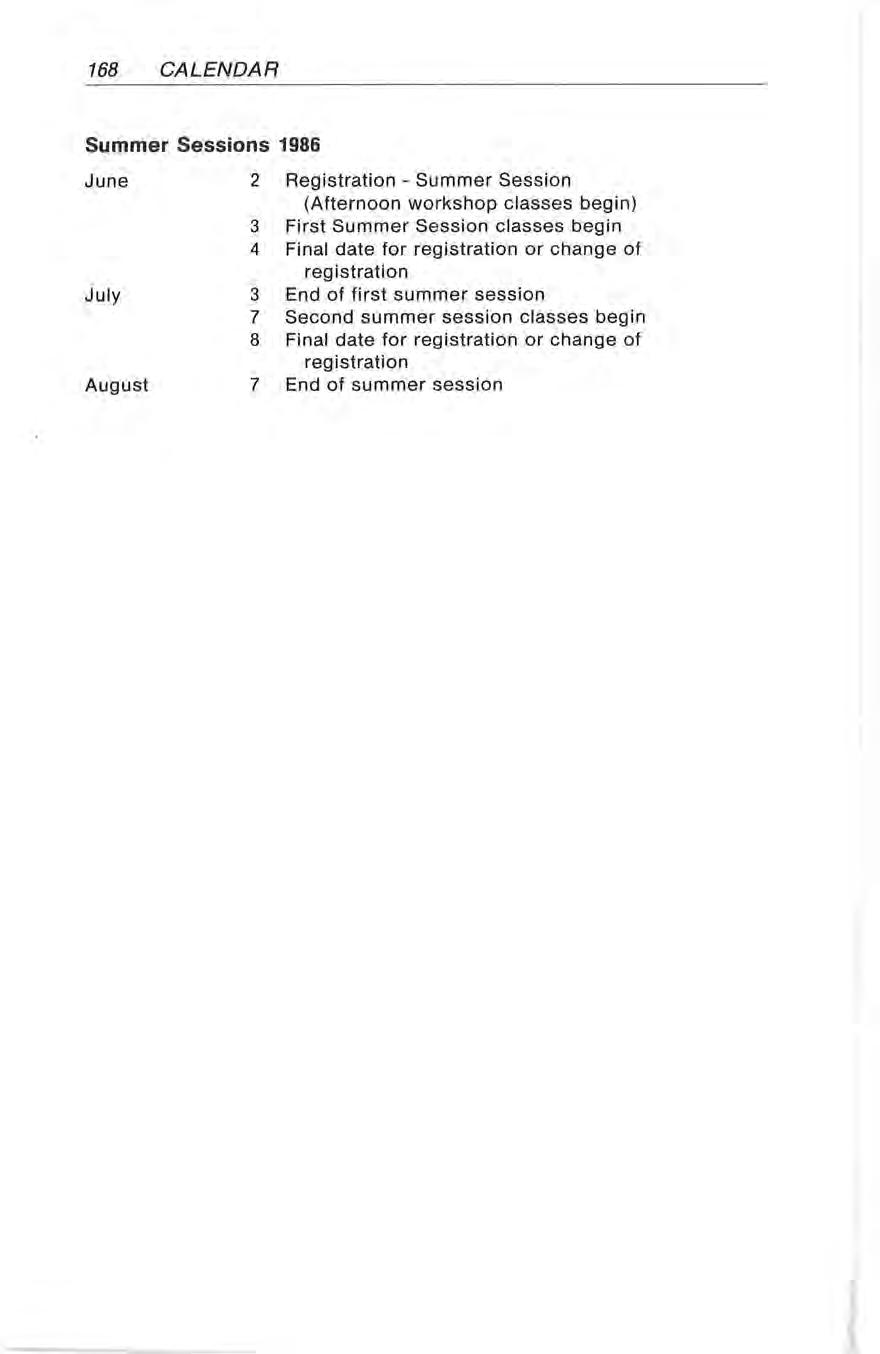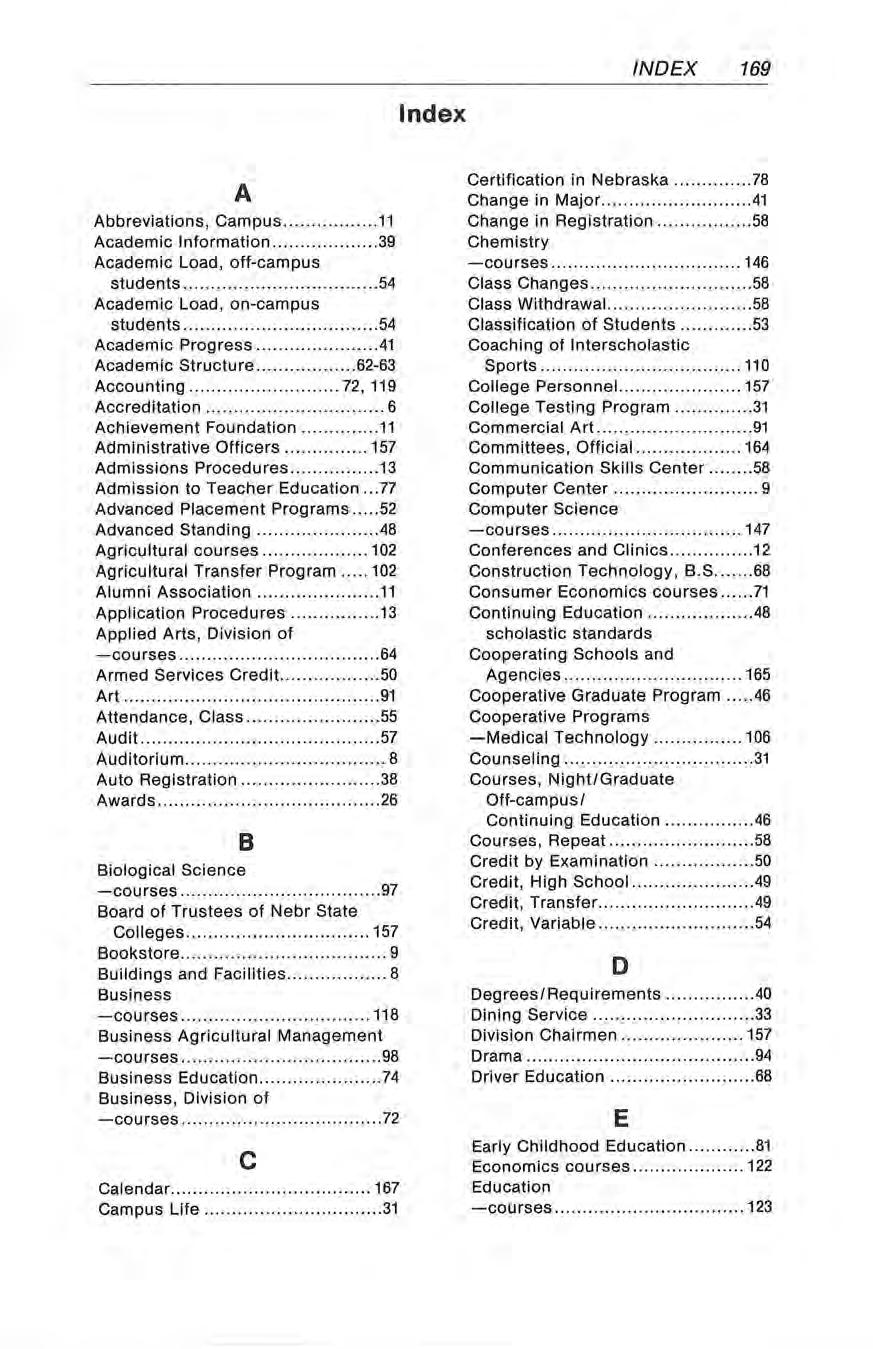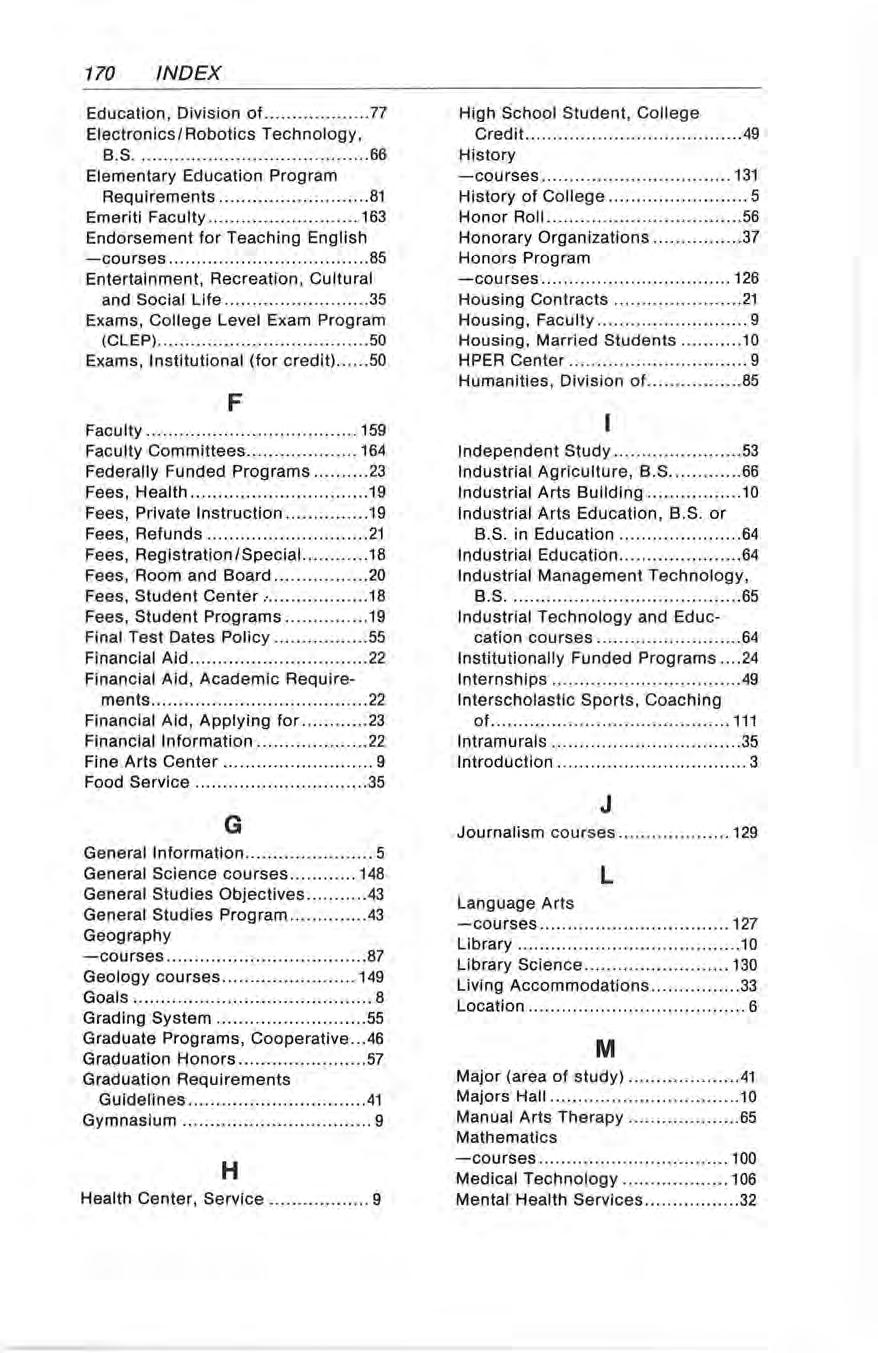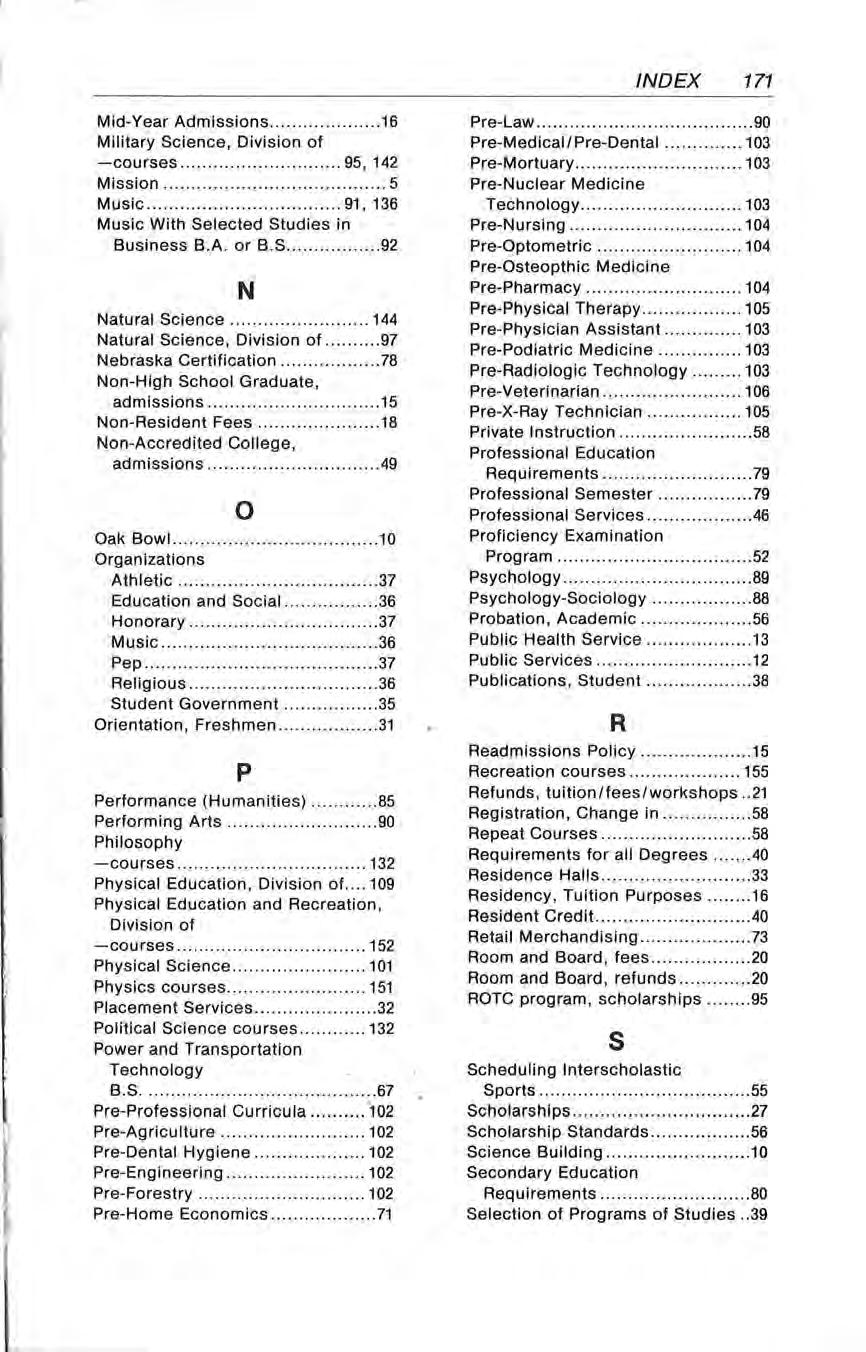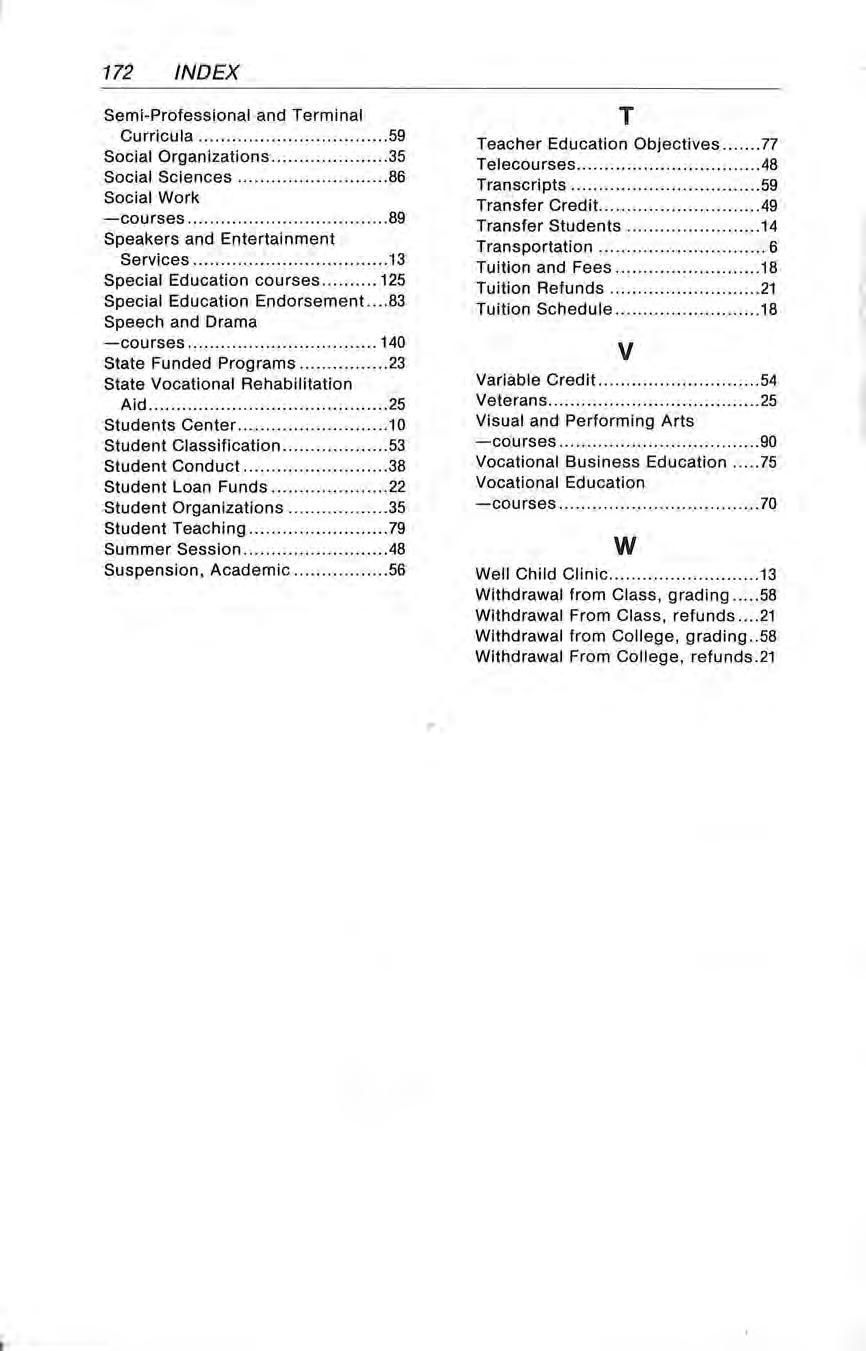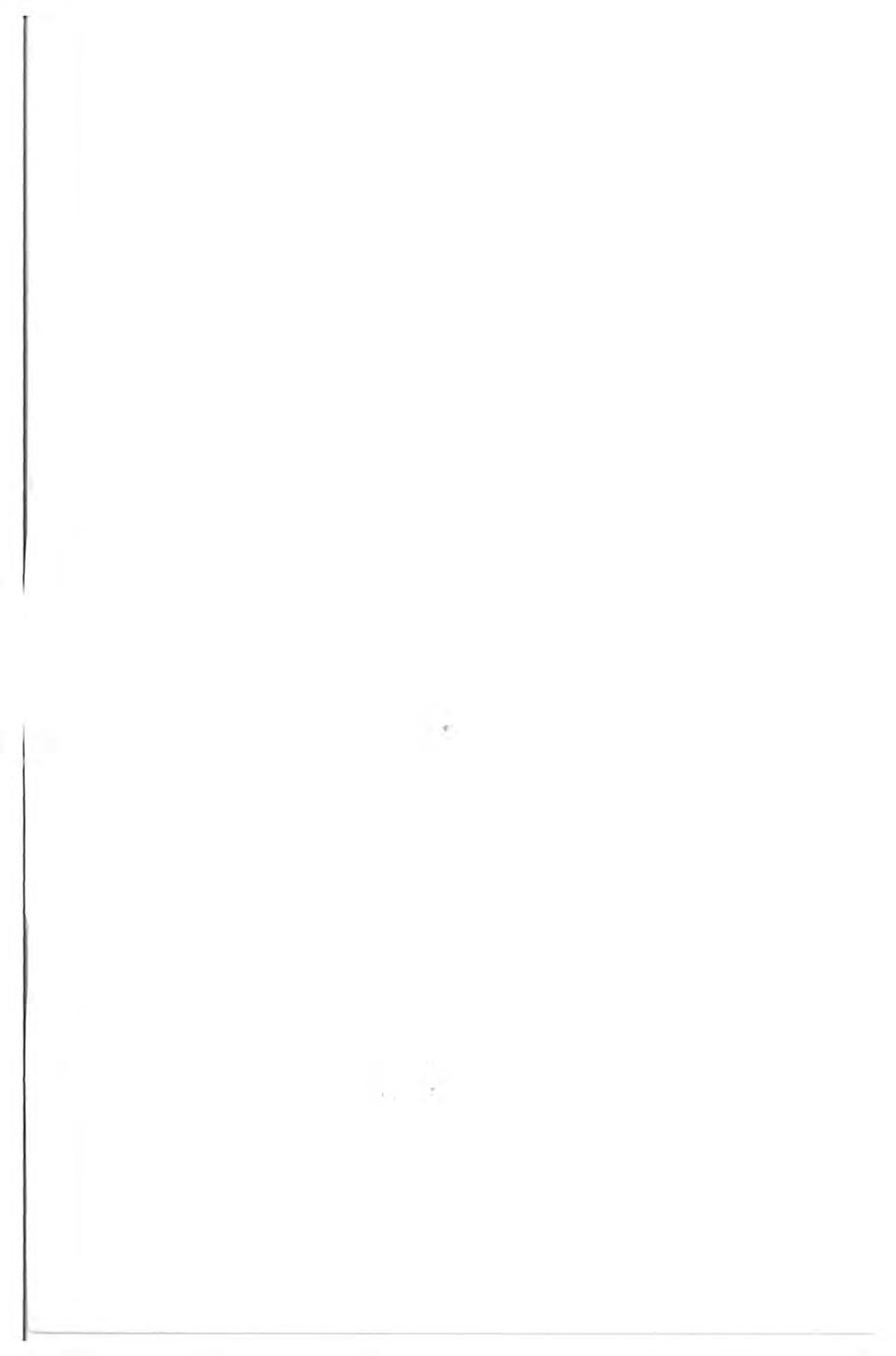




related to student retention and completion as required by the Higher Education Amendments of 1976 is available through the Dean of Student Affairs
No person attending Peru State College shall, on the grounds of race, age, color, national origin, handicap, or sex, be excluded from participation in, be denied benefit of, or be subjected to discrimination under any program or activity receiving federal financial assistance. Inquiries regarding these matters should be directed to:
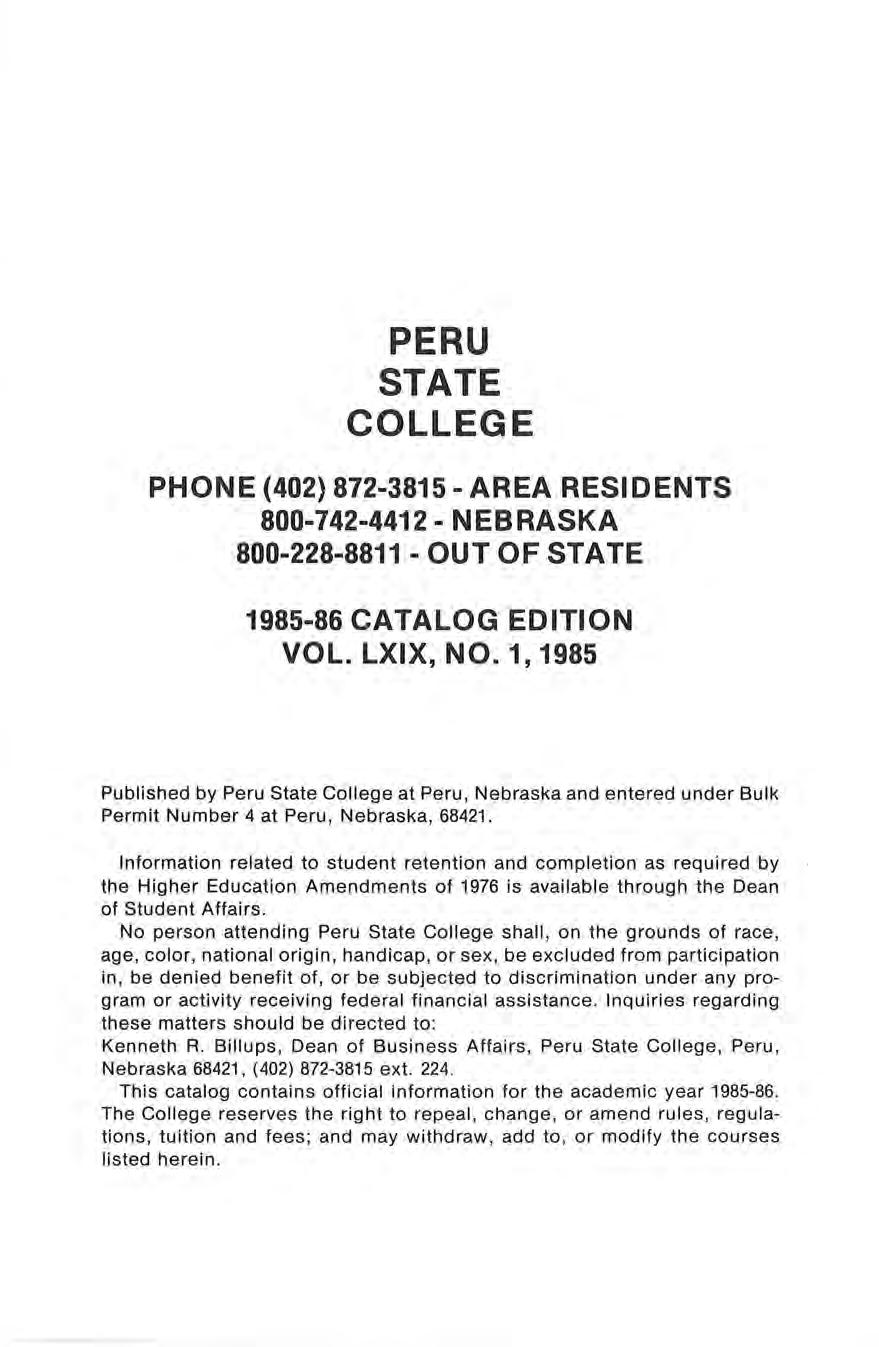
Kenneth R Billups, Dean of Business Affairs, Peru State College, Peru, Nebraska 68421, (402) 872 -3815 ext. 224 .
This catalog contains official information for the academic year 1985-86. The College reserves the right to repeal, change , or amend rules, regulations, tuition and fees ; and may withdraw , add to, or modify the courses listed herein .
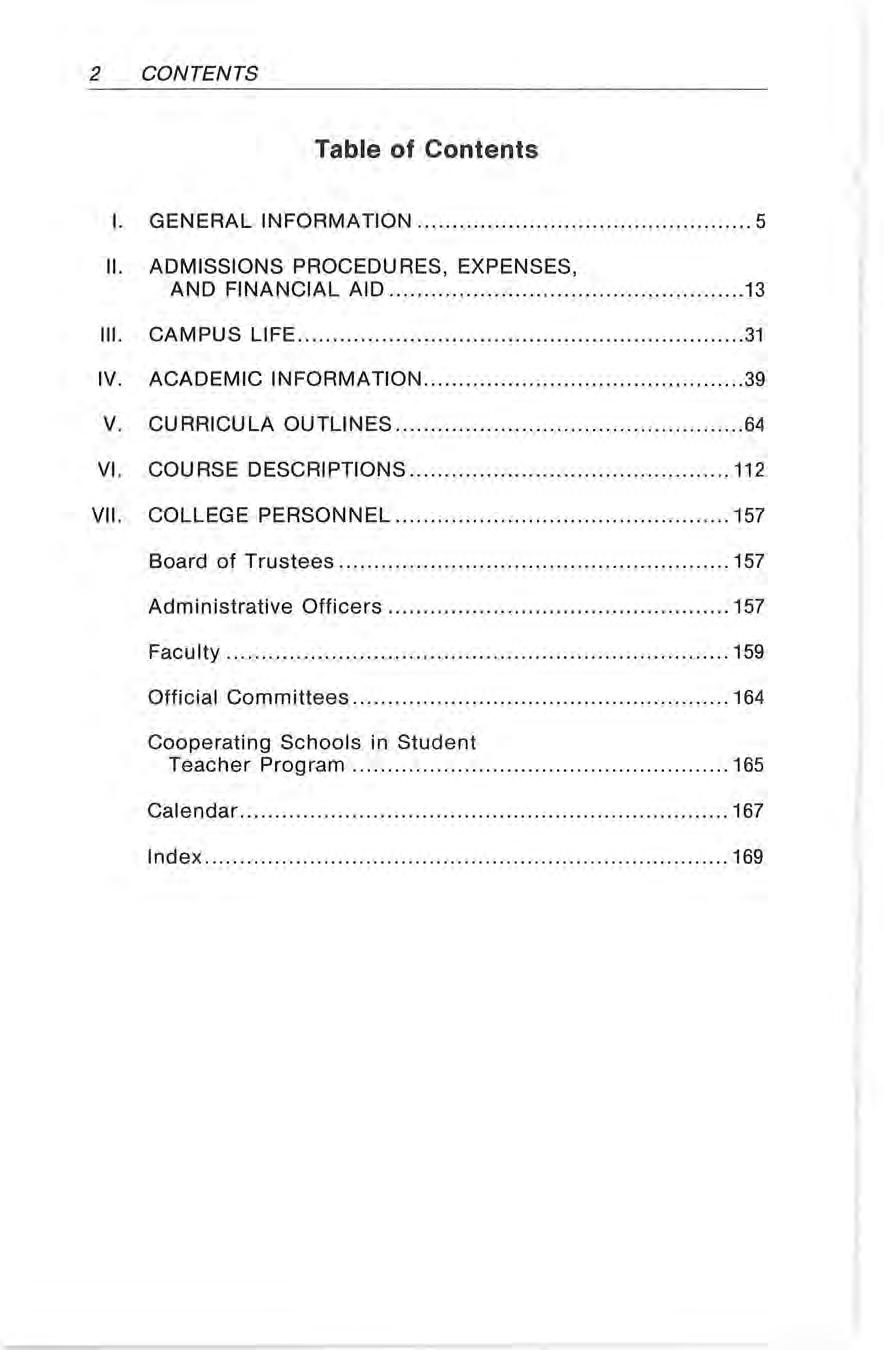
Peru State was founded in 1867 and is the oldest college in Nebraska and the third oldest teacher-training institution established west of the Missouri River . Peru was founded the same year Nebraska became a state. For more than a century thousands of young people have crossed the Campus of a Thousand Oaks and have gone forth to become teachers and leaders in business and industry in Nebraska and throughout the nation
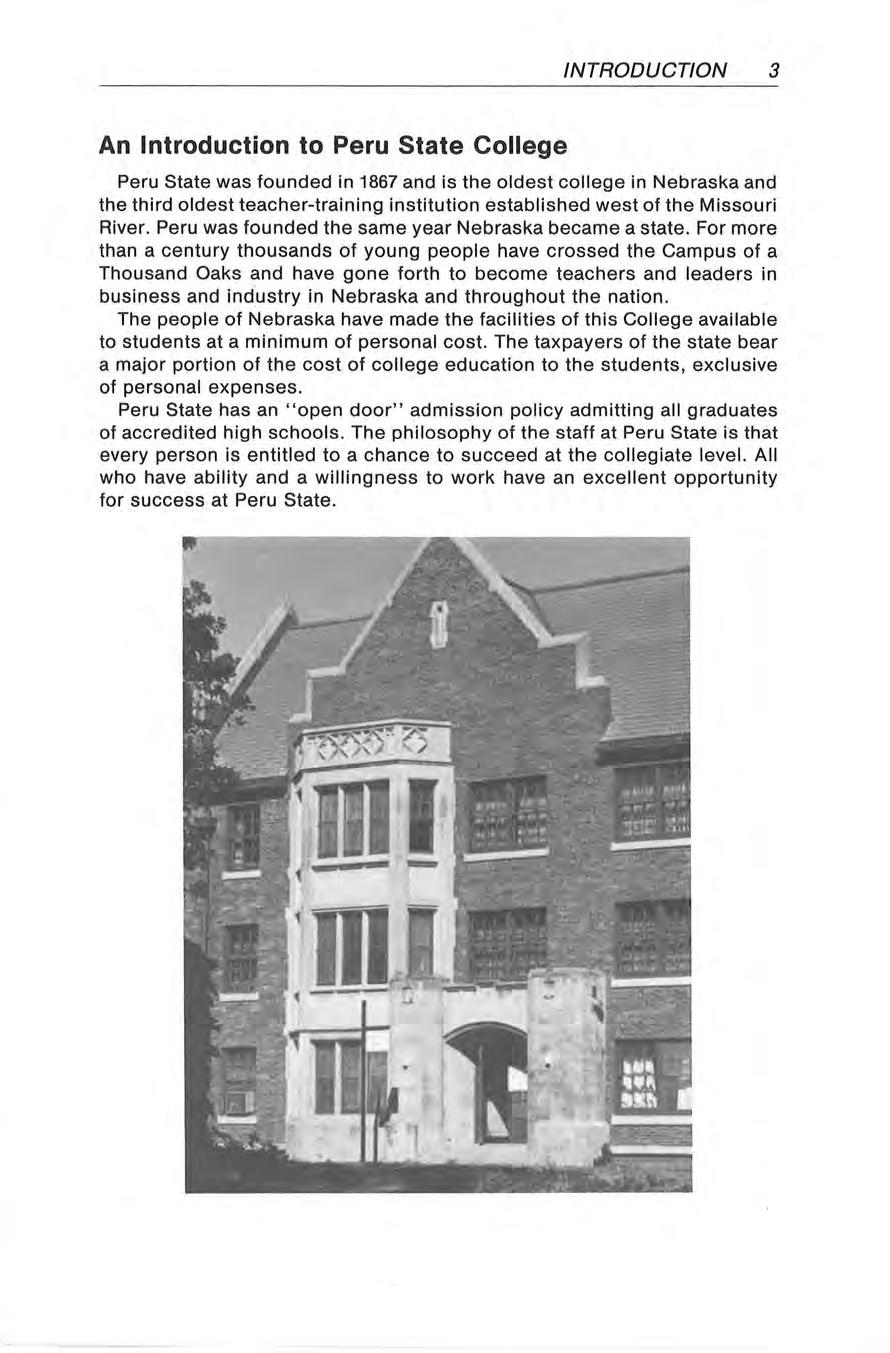
The people of Nebraska have made the facilities of this College available to students at a minimum of personal cost. The taxpayers of the state bear a major portion of the cost of college education to the students, exclusive of personal expenses.
Peru State has an "open door" admission policy admitting all graduates of accredited high schools. The philosophy of the staff at Peru State is that every person is entitled to a chance to succeed at the collegiate level. All who have ability and a willingness to work have an excellent opportunity for success at Peru State.
The College staff believe in academic excellence, in opportunities for personal growth, and in student self-determination consistent with the principles of a democratically organized society. Administrative intent is that college students be involved in the decisions made on campus which affect them. The educational experience provided by the College is designed to enable students to learn, equip themselves for meaningful careers, and become productive members of society .
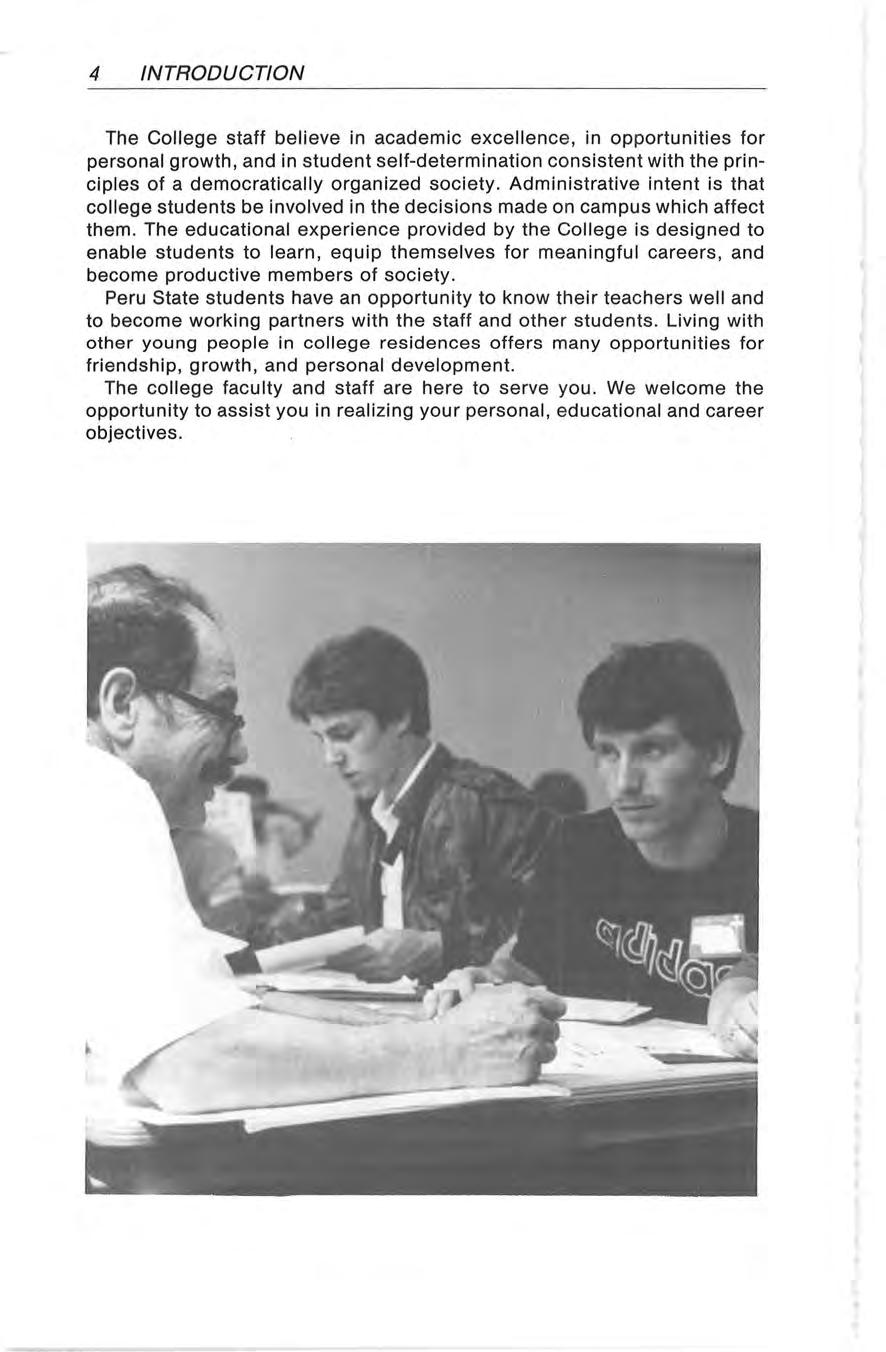
Peru State students have an opportunity to know their teachers well and to become working partners with the staff and other students . Living with other young people in college residences offers many opportunities for friendship, growth, and personal development.
The college faculty and staff are here to serve you . We welcome the opportunity to assist you in realizing your personal, educational and career objectives.
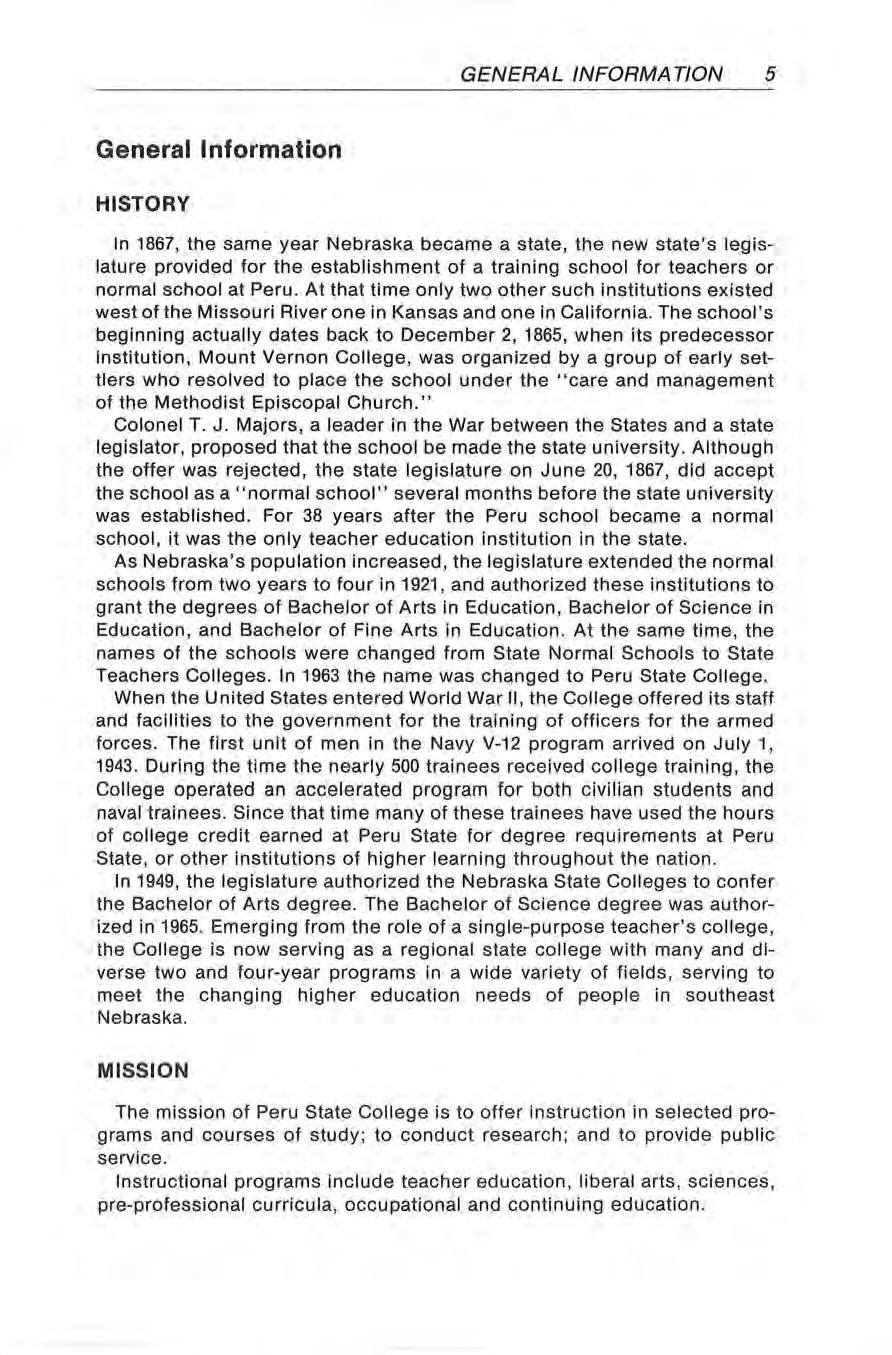
In 1867, the same year Nebraska became a state, the new state ' s legislature provided for the establishment of a training school for teachers or normal school at Peru. At that time only two other such institutions existed west of the Missouri River one in Kansas and one in California The school ' s beginning actually dates back to December 2, 1865 , when its predecessor institution, Mount Vernon College, was organized by a group of early settlers who resolved to place the school under the "care and management of the Methodist Episcopal Church "
Colonel T. J. Majors, a leader in the War between the States and a state legislator , proposed that the school be made the state university. Although the offer was rejected , the state legislature on June 20, 1867, did accept the school as a " normal school" several months before the state university was established For 38 years after the Peru school became a normal school, it was the only teacher education institution in the state
As Nebraska ' s population increased , the legislature extended the normal schools from two years to four in 1921 , and authori z ed these institutions to grant the degrees of Bachelor of Arts in Education, Bachelor of Science in Education, and Bachelor of Fine Arts in Education. At the same time , the names of the schools were changed from State Normal Schools to State Teachers Colleges In 1963 the name was changed to Peru State College
When the United States entered World War II, the College offered its staff and facilities to the government for the training of officers for the armed forces The first unit of men in the Navy V- 12 program arrived on July 1, 1943. During the time the nearly 500 trainees received college training, the College operated an accelerated program for both civilian students and naval trainees. Since that time many of these trainees have used the hours of college credit earned at Peru State for degree requirements at Peru State, or other institutions of higher learning throughout the nation
In 1949, the legislature authori z ed the Nebraska Sta t e Colleges to confer the Bachelor of Arts degree . The Bachelor of Science degree was authorized in 1965. Emerging from the role of a single - purpose teacher's college , the College is now serving as a regional state college with many and diverse two and four - year programs in a wide variety of fields, serving to meet the changing higher education needs of peopl e in southeast Nebraska
The mission of Peru State College is to offer in s truction in s elected programs and courses of study; to conduct research ; and to provide public service
In s tructional programs include teacher e ducation, liberal art s , s ciences, pre - professional curricula, occupational and continuing education
Research programs create new knowledge and provide a broader intellectual and factual basis for extended knowledge.
Public service activities enhance and promote effective living of the people served by the College through assisting in the solution of problems and in the development of increased skills
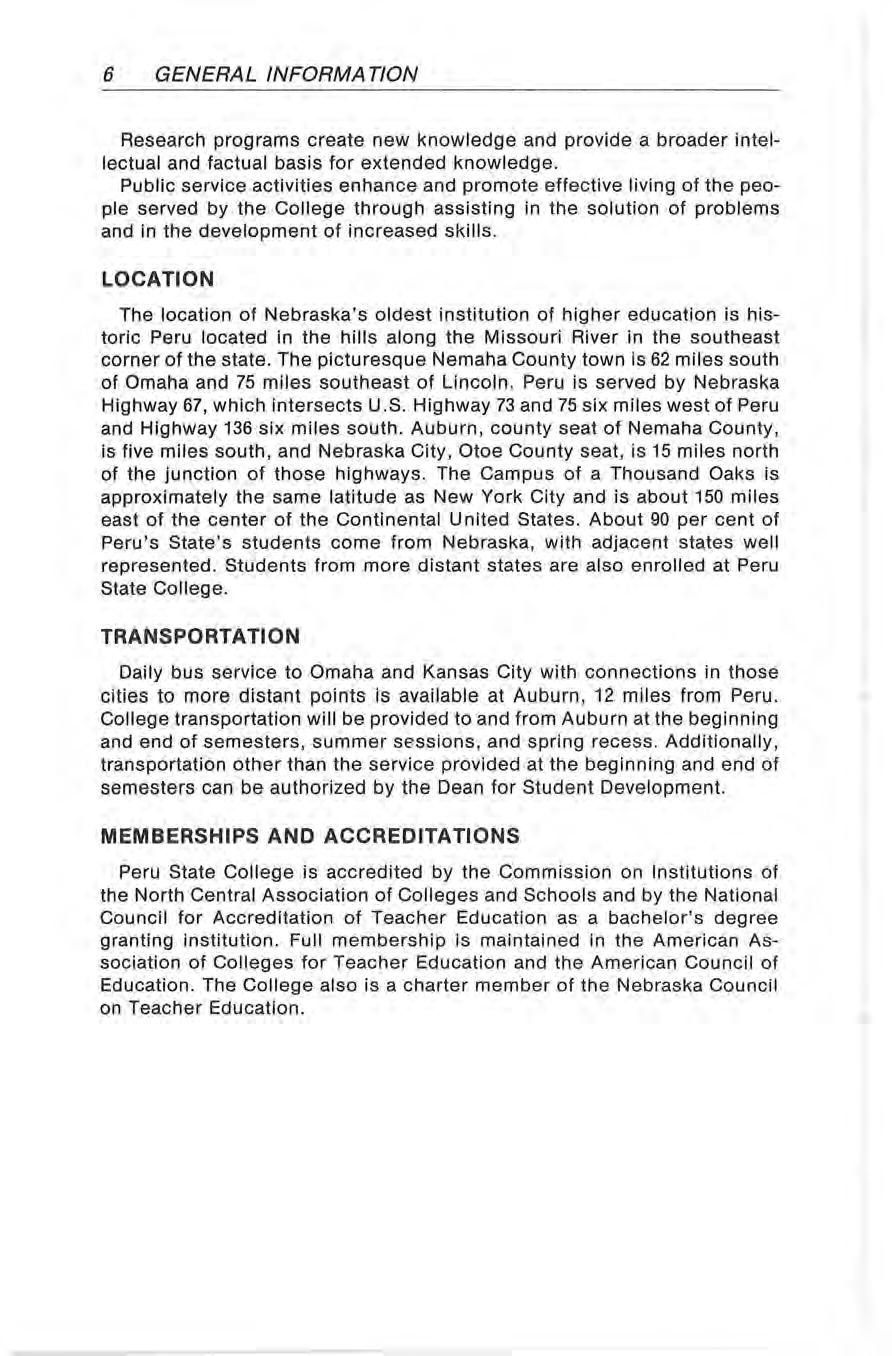
The location of Nebraska ' s oldest institution of higher education is historic Peru located in the hills along the Missouri River in the southeast corner of the state. The picturesque Nemaha County town i s 62 miles south of Omaha and 75 miles southeast of Lincoln. Peru is served by Nebraska Highway 67, which intersects U.S Highway 73 and 75 six miles west of Peru and Highway 136 six miles south Auburn, county seat of Nemaha County , is five miles south , and Nebraska City, Otoe County seat, is 15 miles nor t h of the junction of those highways . The Campus of a Thousand Oaks is approximately the same latitude as New York City and is about 150 miles east of the center of the Continental United States About 90 per cent of Peru ' s State ' s students come from Nebraska, with adjacent states well represented Students from more distant states are also enrolled at Peru State College.
Daily bus service to Omaha and Kansas City with connections in those cities to more distant points is available at Auburn, 12 miles from Peru. College transportation will be provided to and from Auburn at the beginning and end of semesters , summer sessions , and spring recess. Additionally , transportation other than the service provided at the beginning and end of semesters can be authorized by the Dean for Student Development.
Peru State College is accredited by the Commission on Institutions of the North Central Association of Colleges and Schools and by the National Council for Accreditation of Teacher Education as a bachelor ' s degree granting institution . Full membership is maintained in the American Association of Colleges for Teacher Education and the Ame r ican Council of Education The College also is a charter member of the Nebraska Council on Teacher Education
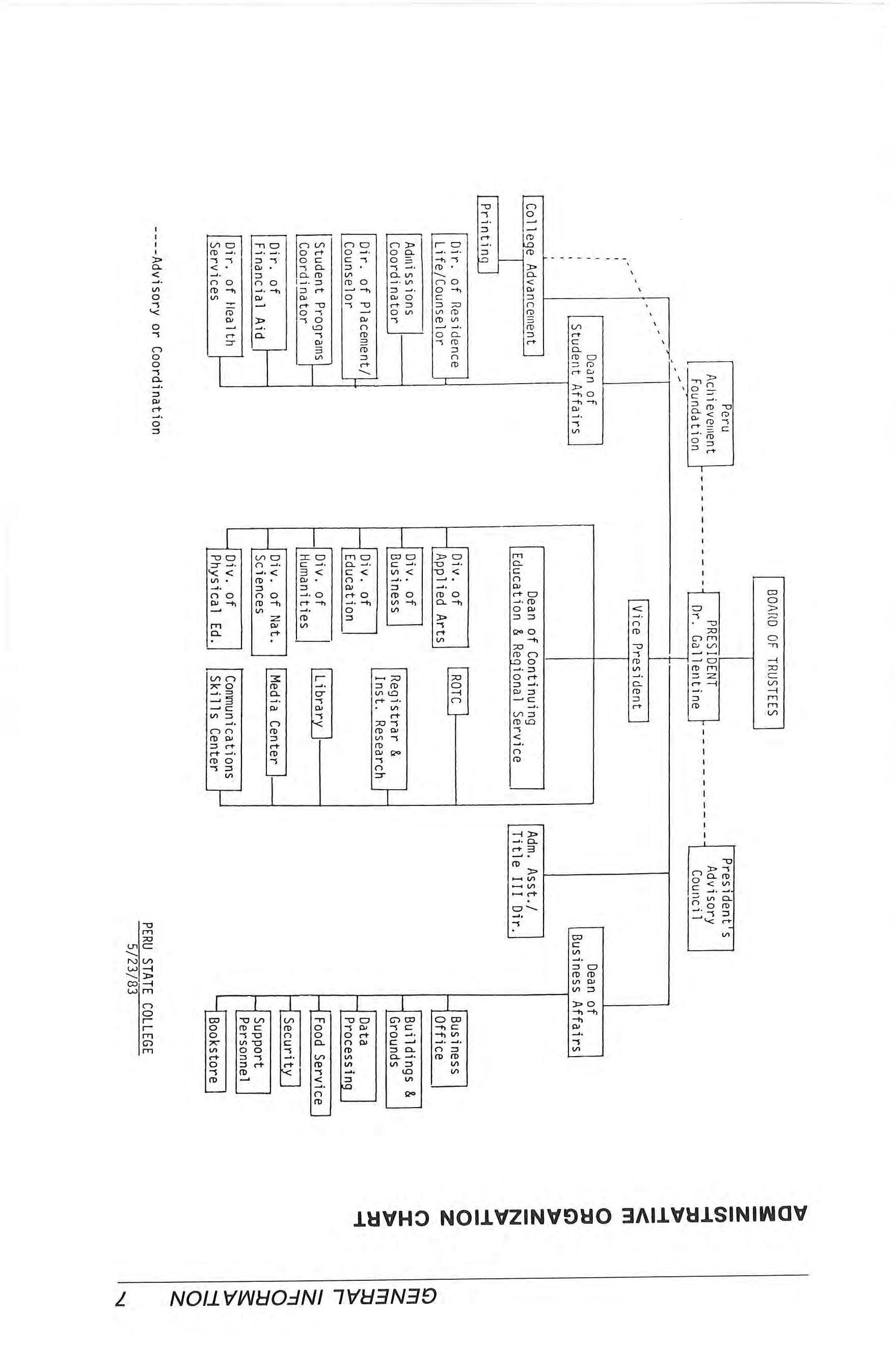
Peru State College is committed to the belief that all citizens are endowed with potential abilities which, if discovered and developed, will reflect to the benefit of that individual and to the populace at large Those who are exposed to the influence of the college should be encouraged to develop those potentials and concurrently encouraged to develop understanding of and appreciation of the contributions made by others.
Such individual development can be accomplished through formal studies and exposure to a variety of experiences both on and off campus. Appropriate and acceptable behavioral patterns are the result of reasonable mastery of knowledge ; acquisition of certain skills and techniques, appreciation and understanding of areas beyond narrow personal interests, and from meaningful religious and social experiences.
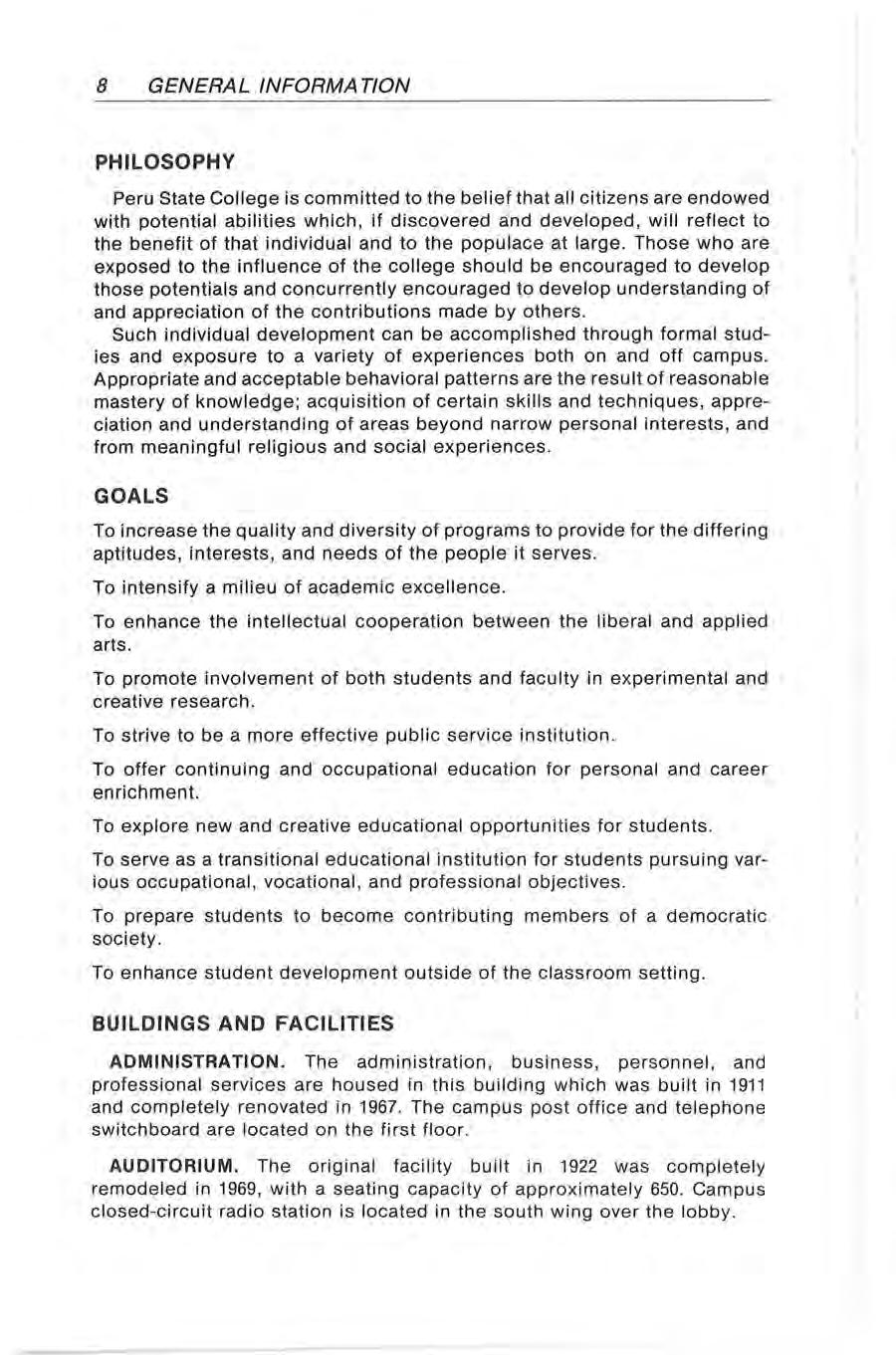
To increase the quality and diversity of programs to provide for the differing aptitudes, interests, and needs of the people it serves .
To intensify a milieu of academic excellence
To enhance the intellectual cooperation between the liberal and applied arts
To promote involvement of both students and faculty in experimental and creative research.
To strive to be a more effective public service institution.
To offer continuing and occupational education for personal and career enrichment.
To explore new and creative educational opportunities for students
To serve as a transitional educational institution for students pursuing various occupational, vocational, and professional objectives
To prepare students to become contributing members of a democratic society.
To enhance student development outside of the classroom setting.
ADMINISTRATION. The administration , business, personnel, and profess i onal services are housed in this building which was built in 1911 and completely renovated in 1967 The campus post office and telephone switchboard are located on the first floor.
AUDITORIUM. The original facility built in 1922 was completely remodeled in 1969, with a seating capacity of appro x imately 650 Campus closed-circuit radio station is located in the south wing over the lobby.
CENTENNIAL COMPLEX. The co-educational seven-unit complex is almost a community in itself, housing 232 students in six structures. Dedication of these facilities took place in 1967 during celebration of the College's Centennial year, each unit being named in honor of long - term faculty members. Students are housed in suites of two or three bedrooms, living room, and full bath.
Davidson, Palmer, Clayburn, Mathews Halls, accommodates both men and women.
COLLEGE BOOKSTORE. The College Bookstore is located on the lower floor of the Student Center. Current textbooks are carried in stock . School supplies are available at moderate prices.
COMPUTER CENTER. The Computer Center, located on the first floor in the Administration Building, is designed to serve students, faculty and the college administration as an instructional and administrative tool. This IBM computing system "understands" several programming languages, including Fortran, Cobol, RPG, and APL. The center is operated on an "open shop" basis, giving students hands-on experience in programming and operating modern computing equipment.
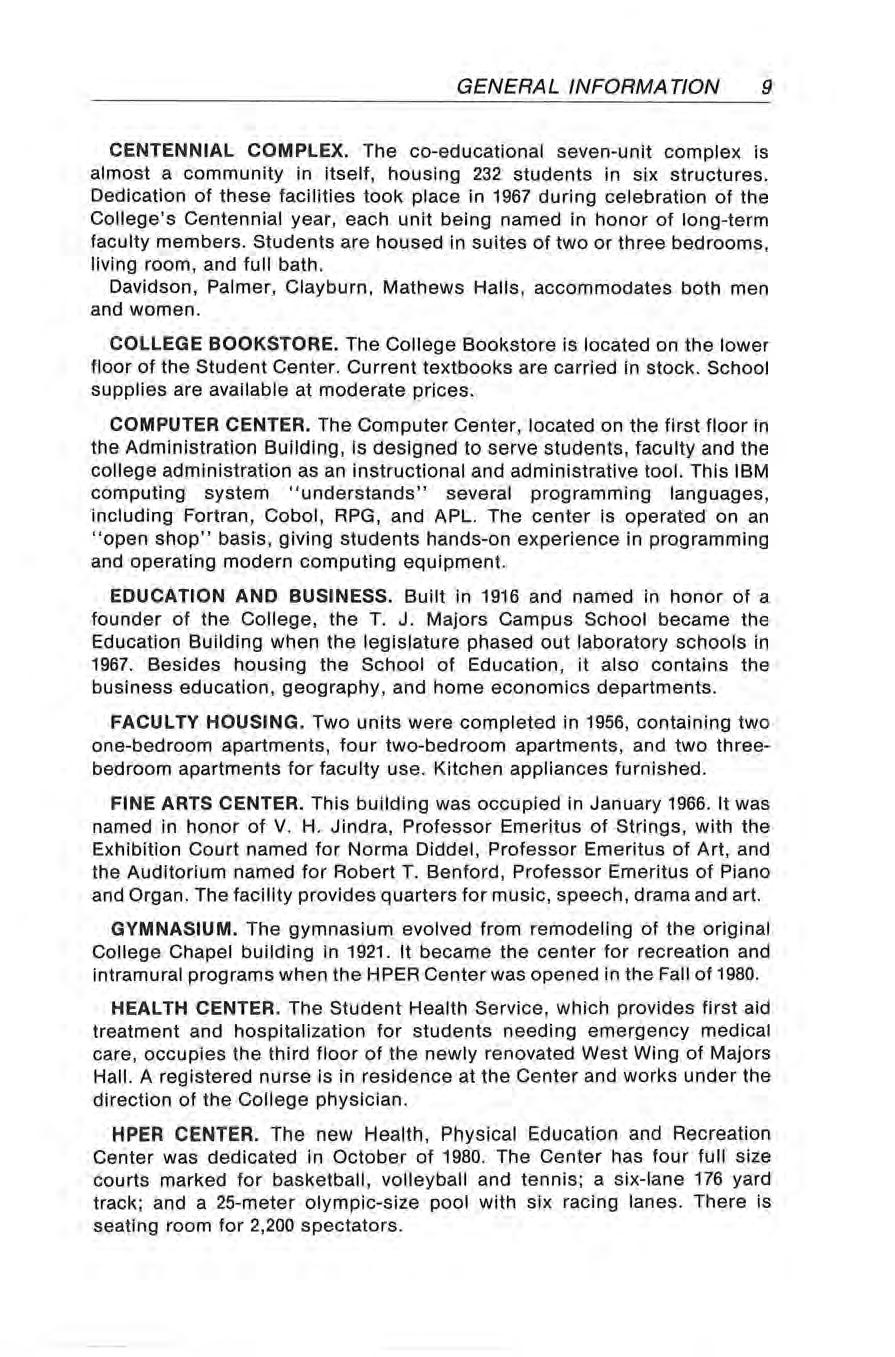
EDUCATION AND BUSINESS. Built in 1916 and named in honor of a founder of the College, the T. J. Majors Campus School became the Education Building when the legislature phased out laboratory schools in 1967. Besides housing the School of Education, it also contains the business education, geography, and home economics departments
FA CULTY HOUSING. Two units were completed in 1956, containing two one-bedroom apartments, four two-bedroom apartments, and two threebedroom apartments for faculty use. Kitchen appliances furnished.
FINE ARTS CENTER. This building was occupied in January 1966. It was named in honor of V. H. Jindra, Professor Emeritus of Strings, with the Exhibition Court named for Norma Diddel, Professor Emeritus of Art, and the Auditorium named for Robert T. Benford, Professor Emeritus of Piano and Organ The facility provides quarters for music, speech, drama and art.
GYMNASIUM. The gymnasiurT)__ evolved from remodeling of the original College Chapel building in 1921. It became the center for recreation and intramural programs when the HPER Center was opened in the .Fall of 1980.
HEALTH CENTER. The Student Health Service , which provides first aid treatment and hospitalization for students needing emergency medical care , occupies the third floor of the newly renovated West Wing , of Majors Hall. A registered nurse is in residence at the Center and works under the direction of the College physician
HPER CENTER. The new Health, Physical Education and Recreation Center was dedicated in October of 1980. The Center has four full size courts marked for basketball, volleyball and tennis; a six-lane 176 yard track ; and a 25-meter olympic - size pool with six racing lanes. There is seating room for 2,200 spectators.
INDUSTRIAL ARTS. The Industrial Arts Building was opened in 1960 and named for A.V. Larson, who had served as Chairman of the Industrial Arts Department for many years. This facility is used to provide training and equipment in power mechanics, electricity-electronics, industrial crafts, woodworking , metal working drafting, graphic arts, photography, and related areas.
LIBRARY. The original library was established in 1869. The first story of the present building was occupied in 1905 with a second story added in 1911. The interior of the building was completely torn out and replaced with modern stacks, reading rooms, audio-visual rooms, study carrels, seminar rooms in 1962, and now houses over 95,000 volumes.
MARRIED STUDENT HOUSING. Five housing units containing eight twobedroom apartments and six one-bedroom apartments , were completed for occupancy in 1956, in a park-like setting east of the Oak Bowl. All are furnished with basic kitchen equipment.
Nicholas Hall at Centennial Complex was converted to apartments for married students in 1970. Each apartment contains kitchen-dining area, living room, full bath, and one or two bedrooms. All are furnished.
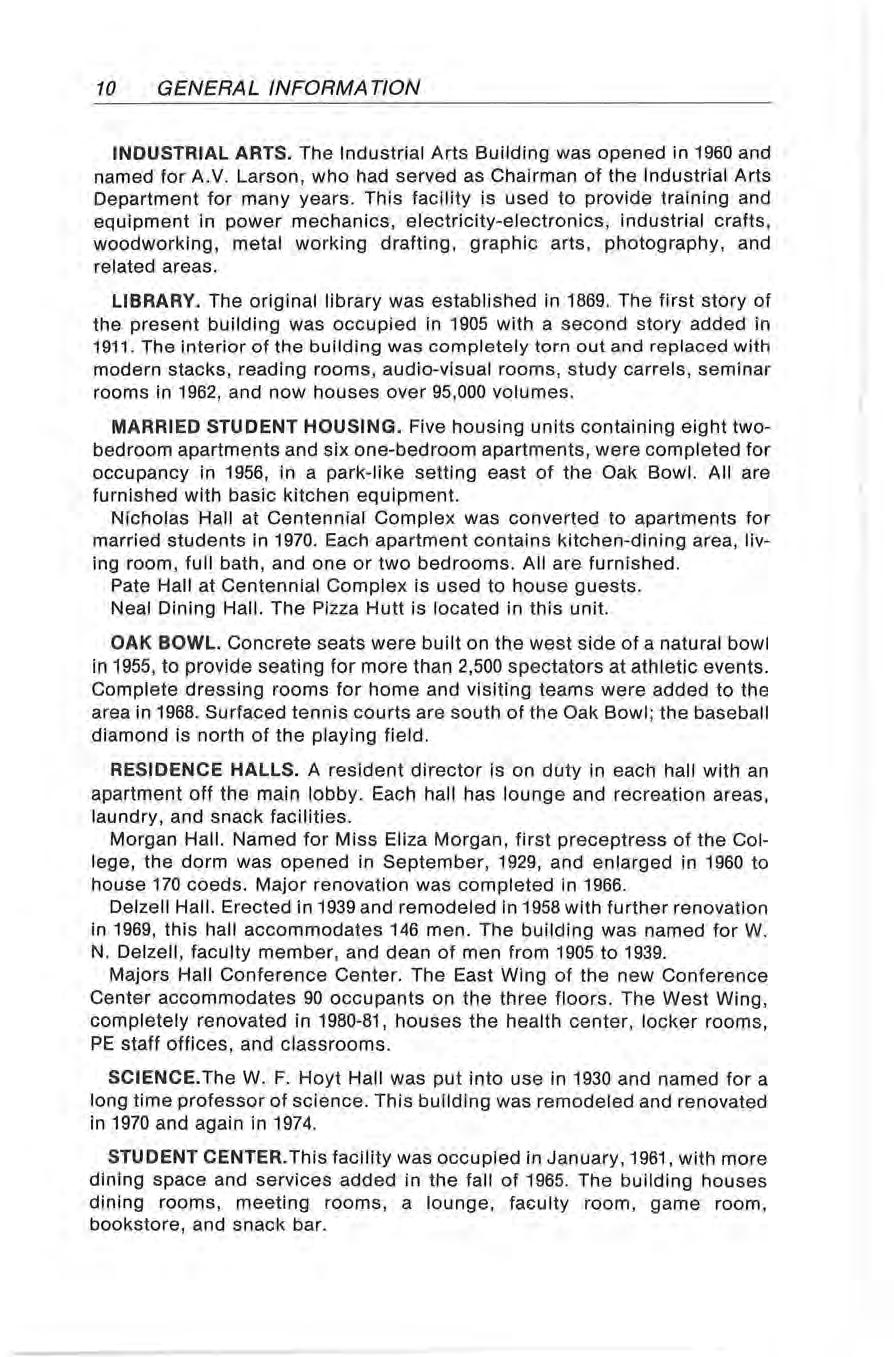
Pate Hall at Centennial Complex is used to house guests.
Neal Dining Hall. The Pizza Hutt is located in this unit.
OAK BOWL. Concrete seats were built on the west side of a natural bowl in 1955, to provide seating for more than 2,500 spectators at athletic events. Complete dressing rooms for home and visiting teams were added to the area in 1968. Surfaced tennis courts are south of the Oak Bowl; the baseball diamond is north of the playing field .
RESIDENCE HALLS. A resident director is on duty in each hall with an apartment off the main lobby. Each hall has lounge and recreation areas, laundry, and snack facilities.
Morgan Hall. Named for Miss Eliza Morgan, first preceptress of the College, the dorm was opened in September, 1929, and enlarged in 1960 to house 170 coeds. Major renovation was completed in 1966.
Delzell Hall. Erected in 1939 and remodeled in 1958 with further renovation in 1969, this hall accommodates 146 men. The building was named for W. N . Delzell, faculty member, and dean of men from 1905 to 1939.
Majors Hall Conference Center. The East Wing of the new Conference Center accommodates 90 occupants on the three floors The West Wing, completely renovated in 1980-81, houses the health center, locker rooms, PE staff offices, and classrooms.
SCIENCE.The W. F. Hoyt Hall was put into use in 1930 and named for a long time professor of science This building was remodeled and renovated in 1970 and again in 1974.
STUDENT CENTER.This facility was occupied in January, 1961, with more dining space and services added in the fall of 1965. The building houses dining rooms, meeting rooms, a lounge, faculty room, game room, bookstore, and snack bar.
Abbreviations for campus buildings are used frequently in listing rooms for class organization meetings. The first of the three-digit numbers used with the building abbreviation indicates the floor, and the second and third are the room number on that floor. For example, AD 101 would be room number one on the first floor of the Administration Building .
A-Auditorium
HPER-Health, Physical AD-Administration Building Education and ED-Education Building Recreation
FA-Fine Arts Center
G-Gymnasium
HG-Health Center
IA-Industrial Arts
L-Library
MH-Majors Hall
S-Science Building
SC-Student Center
Peru Alumni Association membership includes all graduates and former students of Peru State College. Local alumni chapters, organized in Omaha and Lincoln in 1955, in Denver in 1957, in Berkeley, California in 1958, in Los Angeles in 1961, and the 1000 Oaks Chapter in Peru, Nebraska in 1973, and in Otoe County Nebraska in 1980, sponsor activities in their areas with the assistance of the alumni office.
The Alumni Office. Located in the Administration Building, the office maintains a file on all graduates and many former students. Degree and diploma recipients are filed by classes as well as alphabetically and geographically . A collection of yearbooks, commencement programs, alumni publications and other memorabilia is available through the Office of College Relations. The office cooperates with the Library in maintenance of archival materials in the special collection room of the Library .
The Peru Stater, an alumni magazine, is distributed three times each year to alumni, former students, and friends of the College
As a result of the work of a group of alumni, the Peru Achievement Foundation was organized in June , 1955 , and incorporated as a non - profit corportation for educational and charitable purposes on May 21, 1962
Organized for the promotion and support of Peru State College, the Foundation has as its primary purpose: " to aid, assist, and promote the educational program, faculty, employees, students, and to encourage the attendance of worthy and deserving students, and to grant scholarships and student loans to deserving students ."
This purpose is accomplished through the solicitation and acceptance of "gifts , grants, devises and bequests of real or personal property, or both and to hold , administer, use and dispose of the same, both principal and income " from alumni and friends of the College.
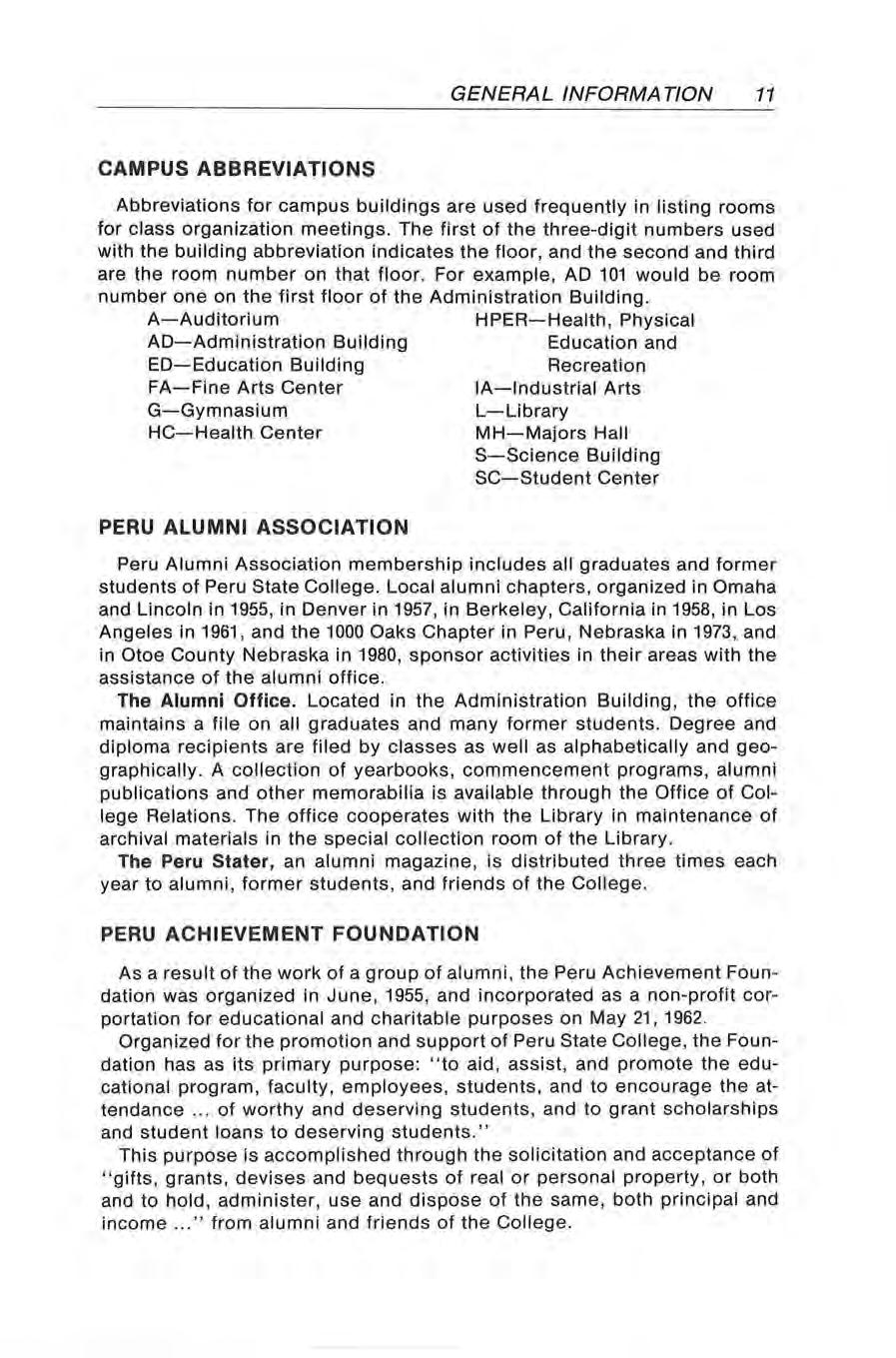
Since the beginning in 1955, the Peru Achievement Foundation has provided scholarships; administered scholarships for various organizations, individuals and groups; furnished all matching funds for the National Defense Student Loan Program; provided for the furnishings of the small dining room in the Student Center; and has in other ways promoted the College.
The primary purpose for maintaining student records at Peru State College is to assist students in their educational endeavors and to reflect institutional action. It is the policy of Peru State College to provide students the right to inspect, review, and challenge education records as provided in the Family Education Rights and Privacy Act of 1974 (Buckley Amendment)
A publication which contains detailed information about the Buckley Amendment is entitled "Access to and Dissemination of Information about Students at Peru State College." It is available upon request at the Office of Student Development. Students are also advised of their right to file complaints concerning alleged failures by the College to comply with the requirements of the Buckley Amendment. Complaints are to be addressed to this agency: The Family Education Rights and Privacy Act Office (F E.R.P.A.), Department of Health, Education and Welfare, 330 Independence Avenue, S. W., Washington, D.C. 20201.
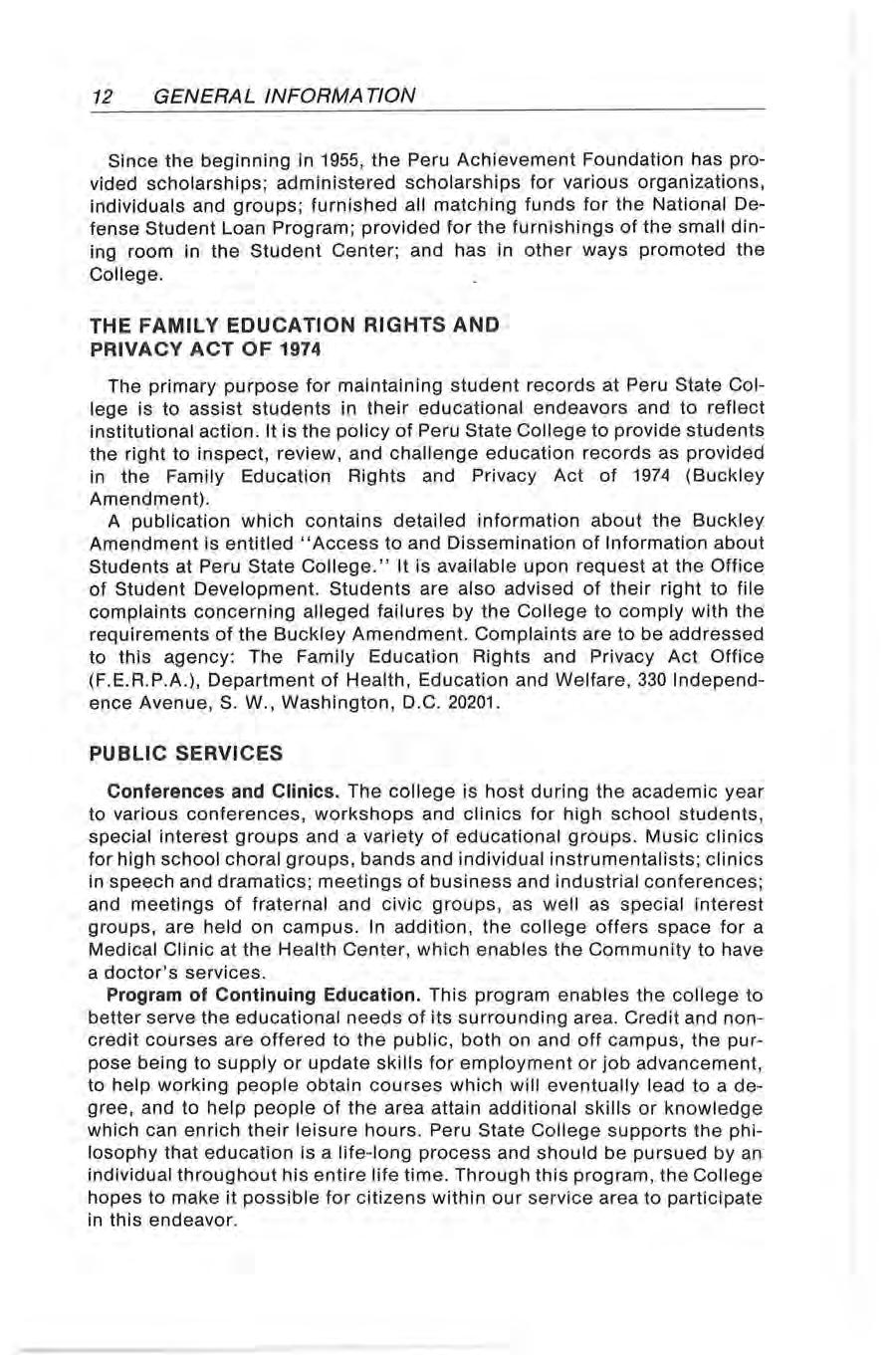
Conferences and Clinics. The college is host during the academic year to various conferences , workshops and clinics for high school students, special interest groups and a variety of educational groups. Music clinics for high school choral groups, bands and individual instrumentalists; clinics in speech and dramatics; meetings of business and industrial conferences; and meetings of fraternal and civic groups, as well as special interest groups, are held on campus . In addition, the college offers space for a Medical Clinic at the Health Center, which enables the Community to have a doctor's services.
Program of Continuing Education. This program enables the college to better serve the educational needs of its surrounding area. Credit and noncredit courses are offered to the public, both on and off campus, the purpose being to supply or update skills for employment or job advancement, to help working people obtain courses which will eventually lead to a degree, and to help people of the area attain additional skills or knowledge which can enrich their leisure hours. Peru State College supports the philosophy that education is a life-long process and should be pursued by an individual throughout his entire life time . Through this program, the College hopes to make it possible for citizens within our service area to participate in this endeavor
Speakers and Entertainment Services. Schools, civic, and educational organizations are invited to make use of speakers, programs, and entertainment available through the College. Faculty members are available to speak throughout the year, as well as for commencement addresses in high schools and in-service training sessions in the area schools. Musical and dramatic programs, demonstrations, debates, and lectures also may be arranged through the College
Well Child Clinic. Any child, preschool or schoo l age through high school, regardless of residence or income, is eligible to attend the Well Child Clinic at the College. The clinic, the first Friday of each month from 2 to 5 p.m. is conducted by the College in cooperation with the State Department of Health and Nemaha County Health Department.
Public Health Services. The Pap Smear Clinic is open to the public and is held monthly For current dates, contact the College Health Service. This clinic is conducted by the College in cooperation with the State Health Department and Family Health Services. Other medical services open to the public are family planning, cancer and venereal disease examination, and pregnancy testing.
Telecourses: Peru State College offers a range of credit and non-credit courses both over the local cable system and the state ETV network.
Admission to Peru State College is granted to any individual who has graduated from an accredited Nebraska high school and who has not previously attended college Out-of-state students who choose PSC generally have a good academic record in high school. The "open admissions" policy for Nebraska residents has proven time after time that highly motivated students can succeed at PSC although their academic performance in high school was below their capabilities. If you are in doubt about the likelihood of your success at PSC, you are encouraged to discuss your qualifications, goals and motivation with the experienced counselors in the Office of Admissions . For advice or for information about specific programs, please feel free to write, call or visit the Office of Admissions, Peru State College, Peru, Nebraska 68421 (phone 402/872 -3815, Ext. 221 or 289).
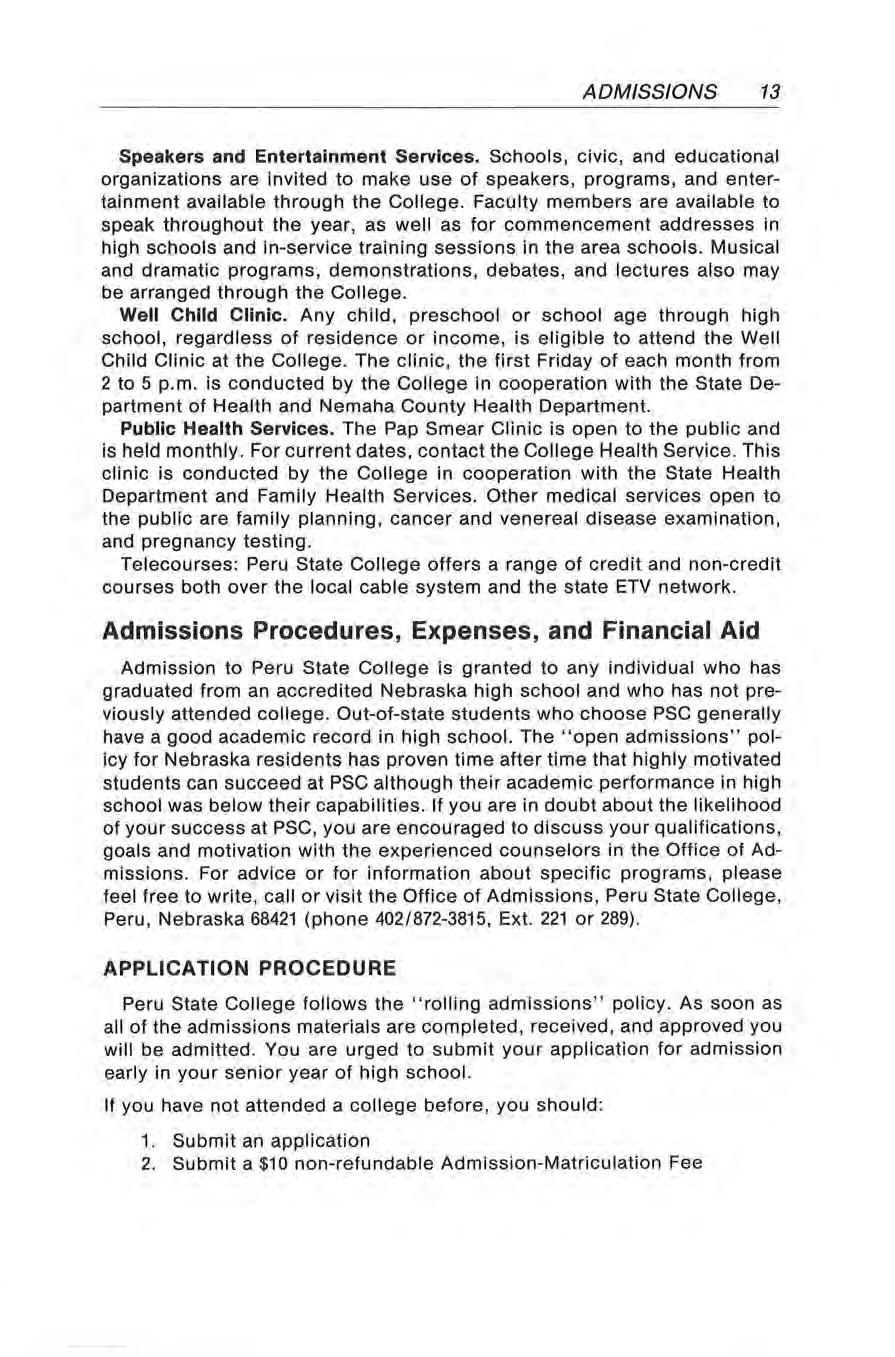
Peru State College follows the " rolling admissions" policy . As soon as all of the admissions materials are completed, received, and approved you will be admitted. You are urged to submit your application for admission early in your senior year of high school.
If you have not attended a college before, you should:
1. Submit an application
2. Submit a $10 non-refundable Admission-Matriculation Fee
3. Submit a high school transcript showing 6 or more completed semesters.
4. Designate Peru State College to receive ACT or SAT examination results if you have graduated from high school within the last academic year
Transfer Students - If you are a transfer student you may be admitted to PSC if you are eligible to return to the college or university last attended You should :
1. Submit an application
2. Submit a $10 non-refundable Admission - Matriculation Fee
3. Complete and return the Student Transfer Form mailed to you from the Office of Admissions.
4. Submit official transcripts from each college attended. If transcripts are not on file at the beginning of the semester, student is carried on probationary status.
5. Submit results of ACT or SAT if you graduated from high school within the last academic year
Applicants who have received an Associate of Arts degree or Associate of Science degree from an accredited community college will submit the same materials required of transfer applicants, as listed above. Associate of Arts programs are reviewed and approved by the Academic Affairs Commission of Peru State College.
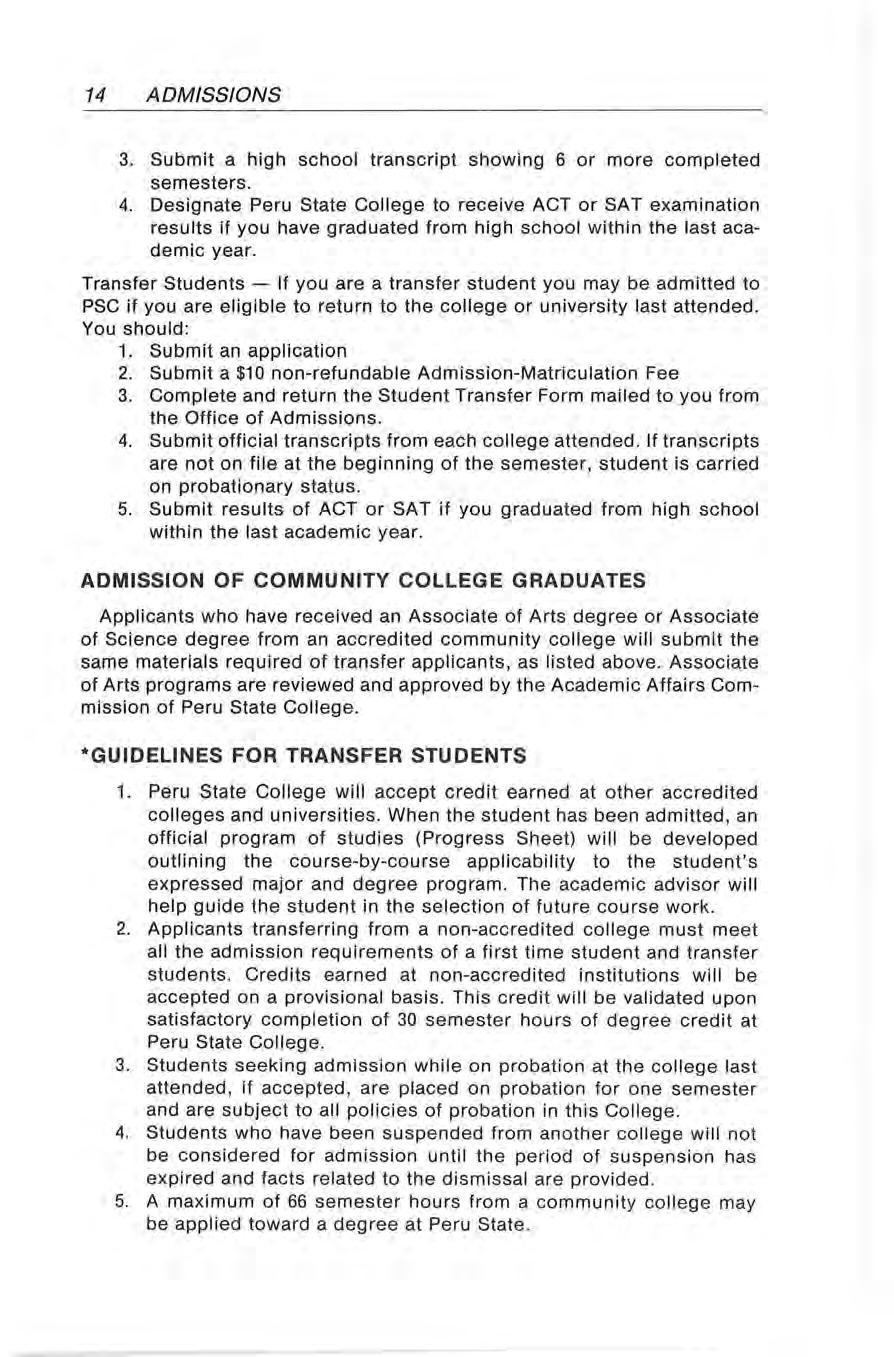
1. Peru State College will accept credit earned at other accredited colleges and universities. When the student has been admitted, an official program of studies (Progress Sheet) will be developed outlining the course-by-course applicability to the student's expressed major and degree program. The academic advisor will help guide the student in the selection of future course work.
2. Applicants transferring from a non - accredited college must meet all the admission requirements of a first time student and transfer students . Credits earned at non-accredited institutions will be accepted on a provisional basis. This credit will be validated upon satisfactory completion of 30 semester hours of degree credit at Peru State College .
3 Students seeking admission while on probation at the college last attended, if accepted , are placed on probation for one semester and are subject to all policies of probation in this College
4. Students who have been suspended from another college will not be considered for admission until the period of suspension has expired and facts related to the dismissal are provided
5 A maximum of 66 semester hours from a community college may be applied toward a degree at Peru State.
6. An applicant who has received the Associate of Arts degree may be determined as having met the General Studies requirements of Peru State College. Such programs are reviewed and approved by the Academic Affairs Commission of Peru State College.
*Students, who, upon entering Peru State College, already have a significant amount of credit hours toward their major will have their transcript reviewed by the respective chairperson in consultation with the Vice President to determine a possible requirement of 6-15 hours in designated coursework within that division.
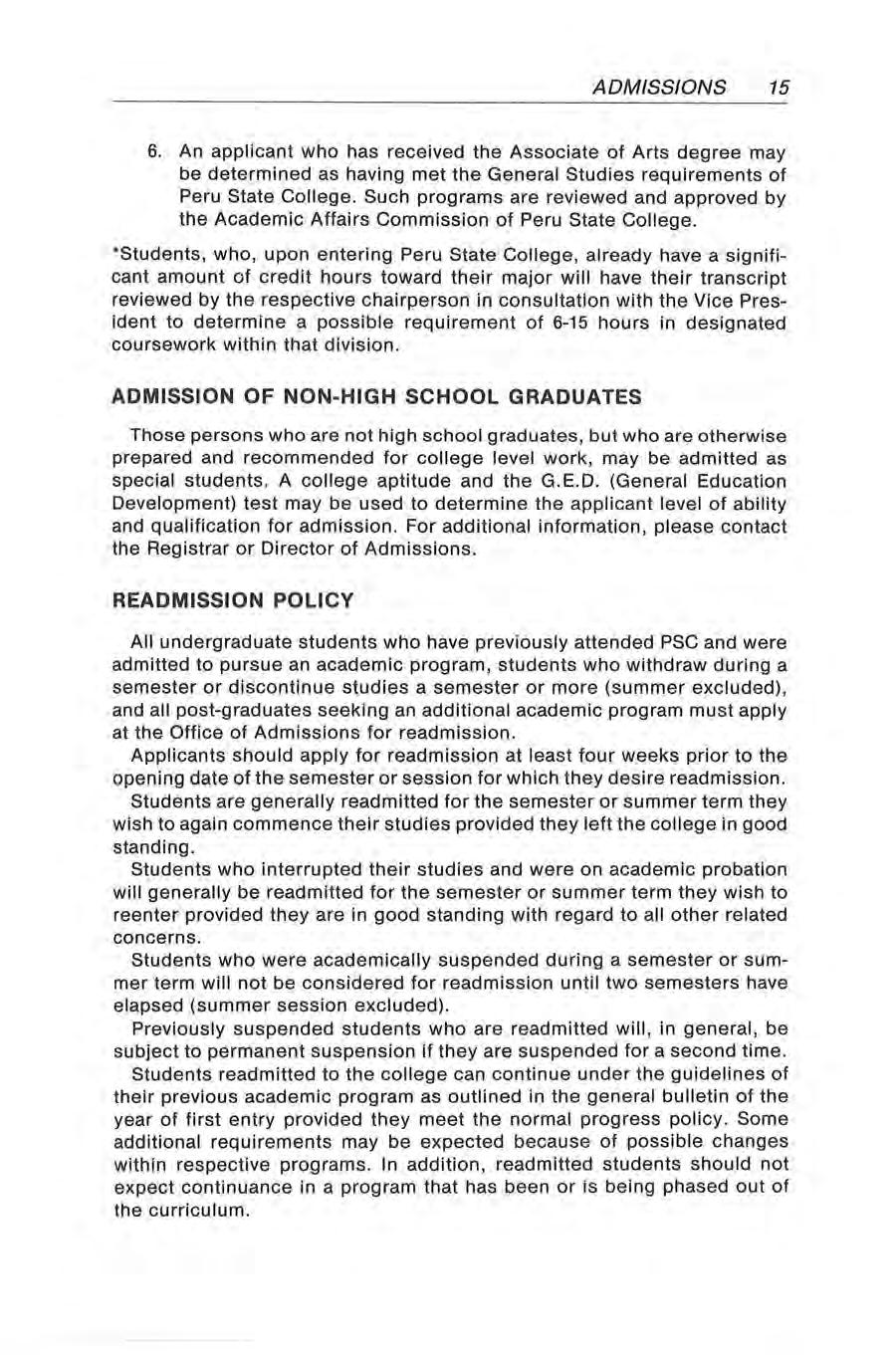
Those persons who are not high school graduates, but who are otherwise prepared and recommended for college level work, may be admitted as special students. A college aptitude and the G.E.D. (General Education Development) test may be used to determine the applicant level of ability and qualification for admission. For additional information, please contact the Registrar or Director of Admissions.
All undergraduate students who have previously attended PSC and were admitted to pursue an academic program, students who withdraw during a semester or discontinue studies a semester or more (summer excluded), and all post-graduates seeking an additional academic program must apply at the Office of Admissions for readmission.
Applicants should apply for readmission at least four weeks prior to the opening date of the semester or session for which they desire readmission.
Students are generally readmitted for the semester or summer term they wish to again commence their studies provided they left the college in good standing.
Students who interrupted their studies and were on academic probation will generally be readmitted for the semester or summer term they wish to reenter provided they are in good standing with regard to all other related concerns
Students who were academically suspended during a semester or summer term will not be considered for readmission until two semesters have elapsed (summer session excluded).
Previously suspended students who are readmitted will, in general, be subject to permanent suspension if they are suspended for a second time .
Students readmitted to the college can continue under the guidelines of their previous academic program as outlined in the general bulletin of the year of first entry provided they meet the normal progress policy . Some additional requirements may be expected because of possible changes within respective programs In addition, readmitted students should not expect continuance in a program that has been or is being phased out of the curriculum.
Readmitted students are subject to all college policy and regulations and those additional provisions determined as a condition for readmission.
APPEAL PROCEDURE. Former students denied readmission may appeal to the Academic Affairs Commission. The appeal shall be submitted in writing to the Vice President. The appeal should clearly and specifically indicate the grounds upon which the appeal is based
A student who completes his high school program at mid-year may avoid loss of time by entering Peru State at the beginning of the second semester. If this semester of work is followed with attendance in the summer session, the student may be classified as a sophomore for the following year. Transfer students will find that the transition to Peru State at midyear can be accomplished with minimal disruption to their educational program.
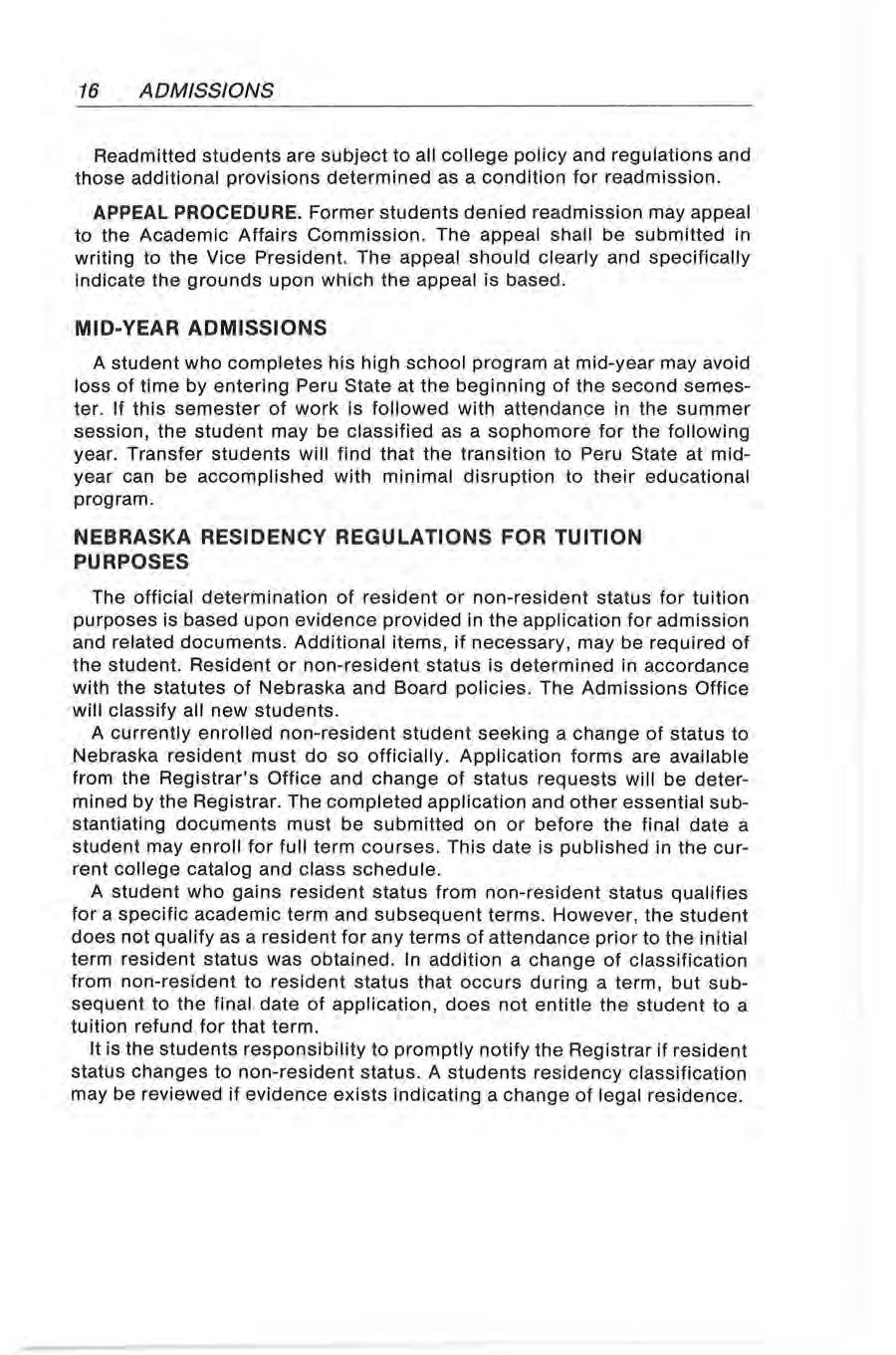
The official determination of resident or non-resident status for tuition purposes is based upon evidence provided in the application for admission and related documents. Additional items, if necessary, may be required of the student. Resident or non-resident status is determined in accordance with the statutes of Nebraska and Board policies. The Admissions Office will classify all new students.
A currently enrolled non-resident student seeking a change of status to Nebraska resident must do so officially. Application forms are available from the Registrar's Office and change of status requests will be determined by the Registrar. The completed application and other essential substantiating documents must be submitted on or before the final date a student may enroll for full term courses. This date is published in the current college catalog and class schedule.
A student who gains resident status from non-resident status qualifies for a specific academic term and subsequent terms However, the student does not qualify as a resident for any terms of attendance prior to the initial term resident status was obtained. In addition a change of classification from non-resident to resident status that occurs during a term, but subsequent to the final date of application, does not entitle the student to a tuition refund for that term.
It is the students responsibility to promptly notify the Registrar if resident status changes to non-resident status A students residency classification may be reviewed if evidence exists indicating a change of legal residence.
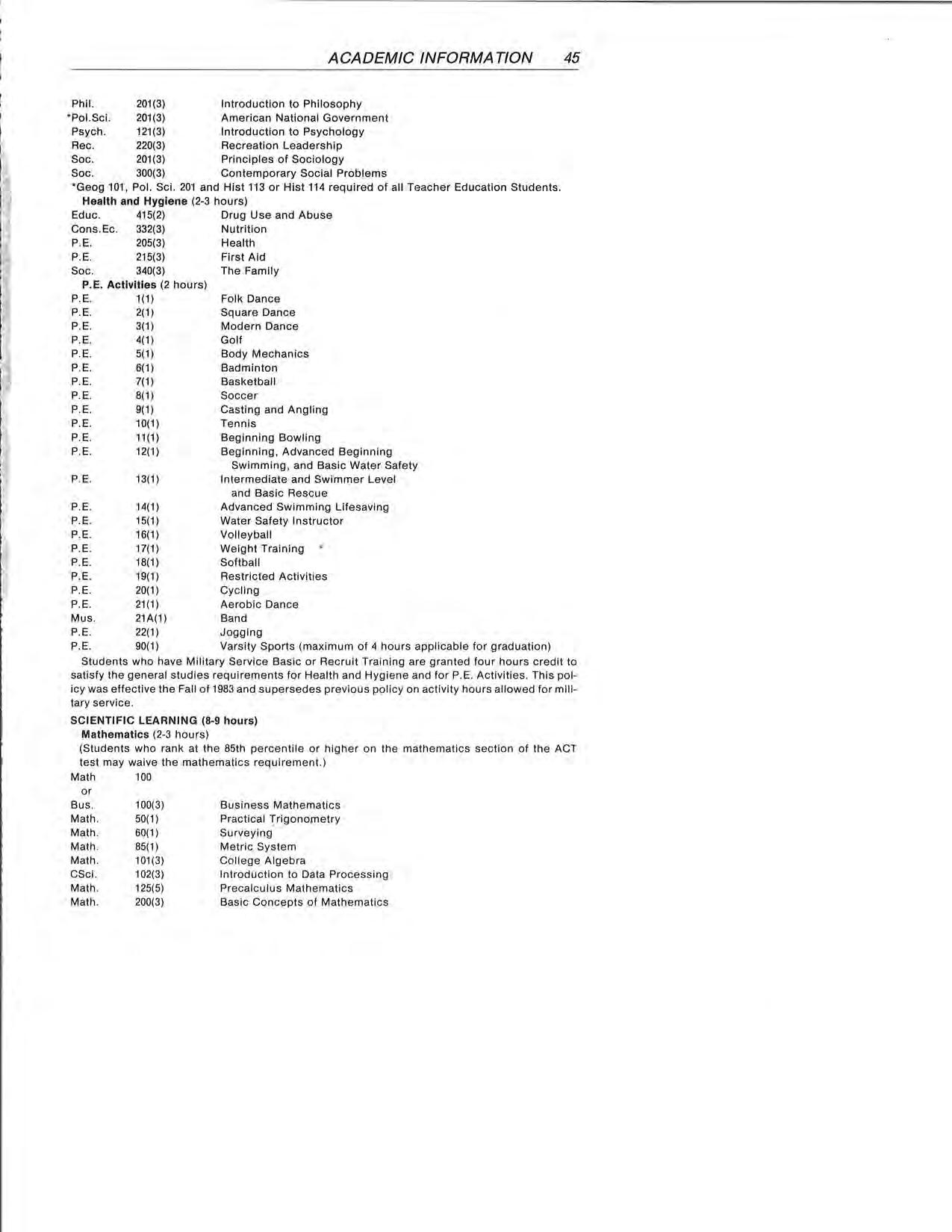
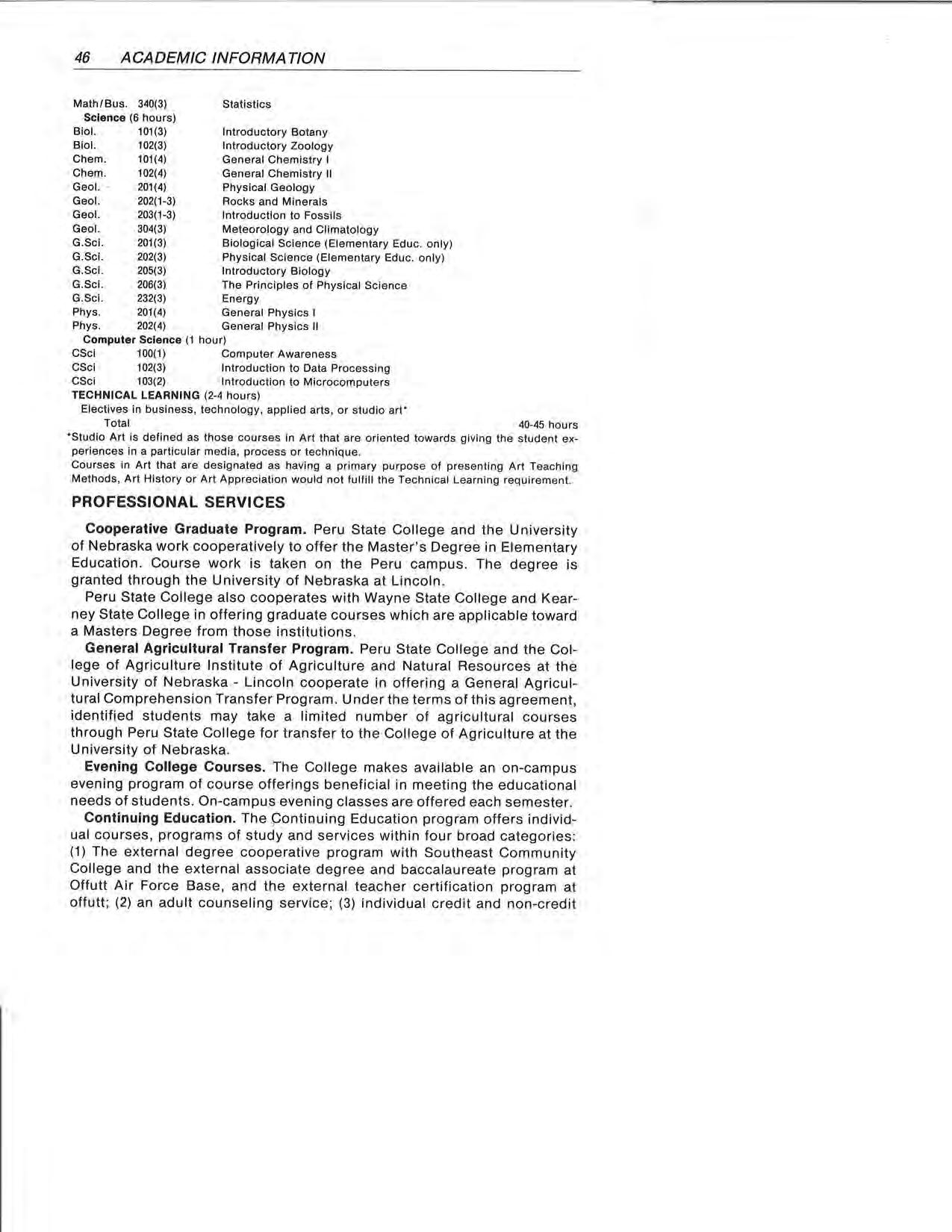
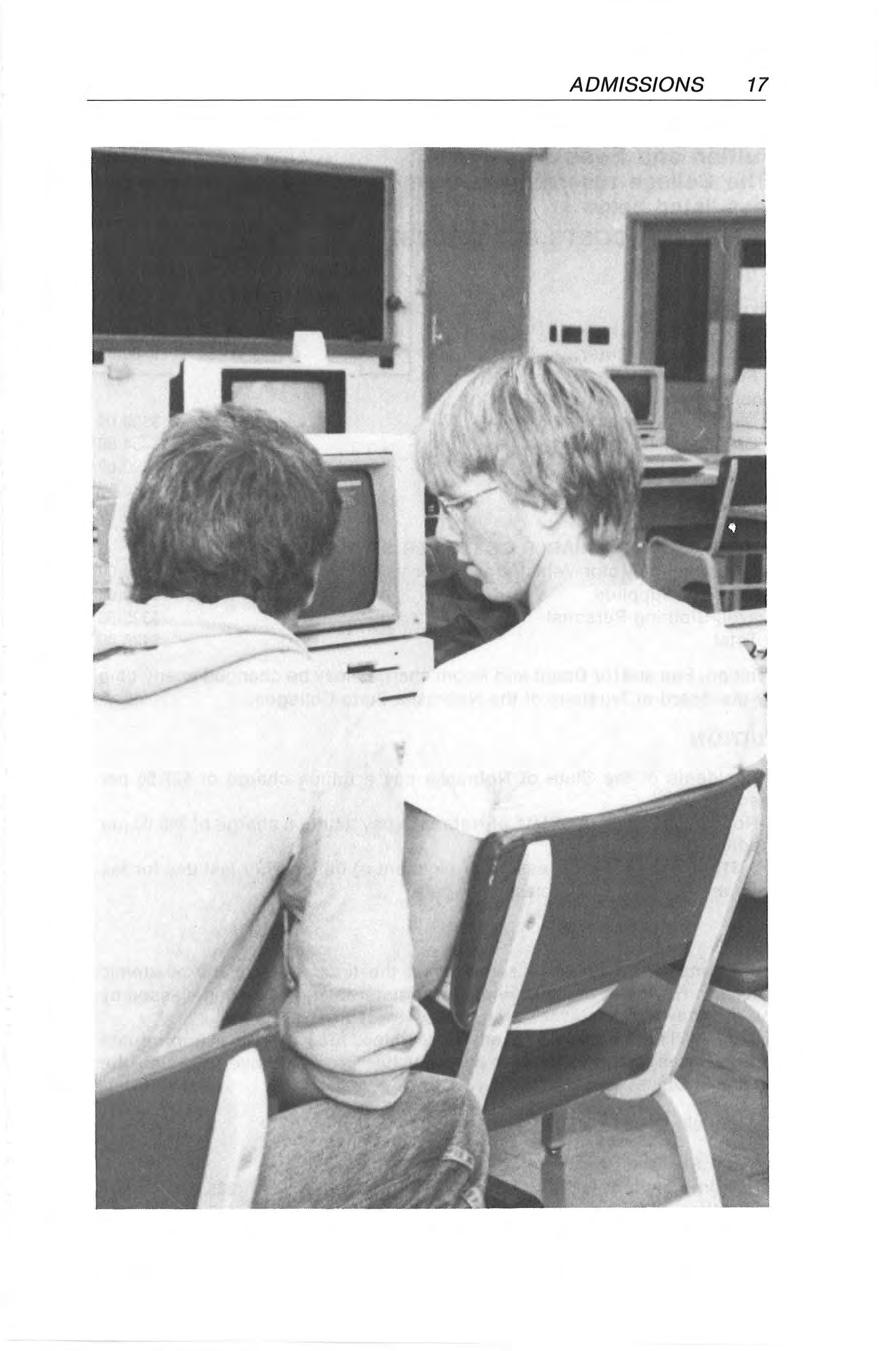
Tuition and Fees
(The College reserves the right to change the tuition and fees listed below.)
Fixed Costs
Tuition (15 credit hours)
Fees, Student Center, Programs, Health, ID Card Room (with roommate) Delzell or Morgan Hall Centennial Complex Meals
Total-Living at Delzell/Morgan
Total-Living at Complex
ESTIMATED VARIABLE COSTS PER SEMESTER Registration of Motor Vehicle (once per year)
* Tuition, Fee and/or Board and Room charges may be changed at any time by the Board of Trustees of the Nebraska State Colleges.
Residents of the State of Nebraska pay a tuition charge of $27.50 per credit hour.
Non-Residents of the State of Nebraska pay a tuition charge of $46 00 per credit hour .
A $10.00 fee will be assessed for payment of tuition after last day for fee payment as listed in the class schedule .
Fees must be paid each semester at the time listed in the academic calendar. However, students must be registered and attending classes by the final day to add classes as noted on class schedule.
Credit will not be awarded in any class unless fees are paid at appropriate time or arrangements for later payment has been approved through the Business Office .
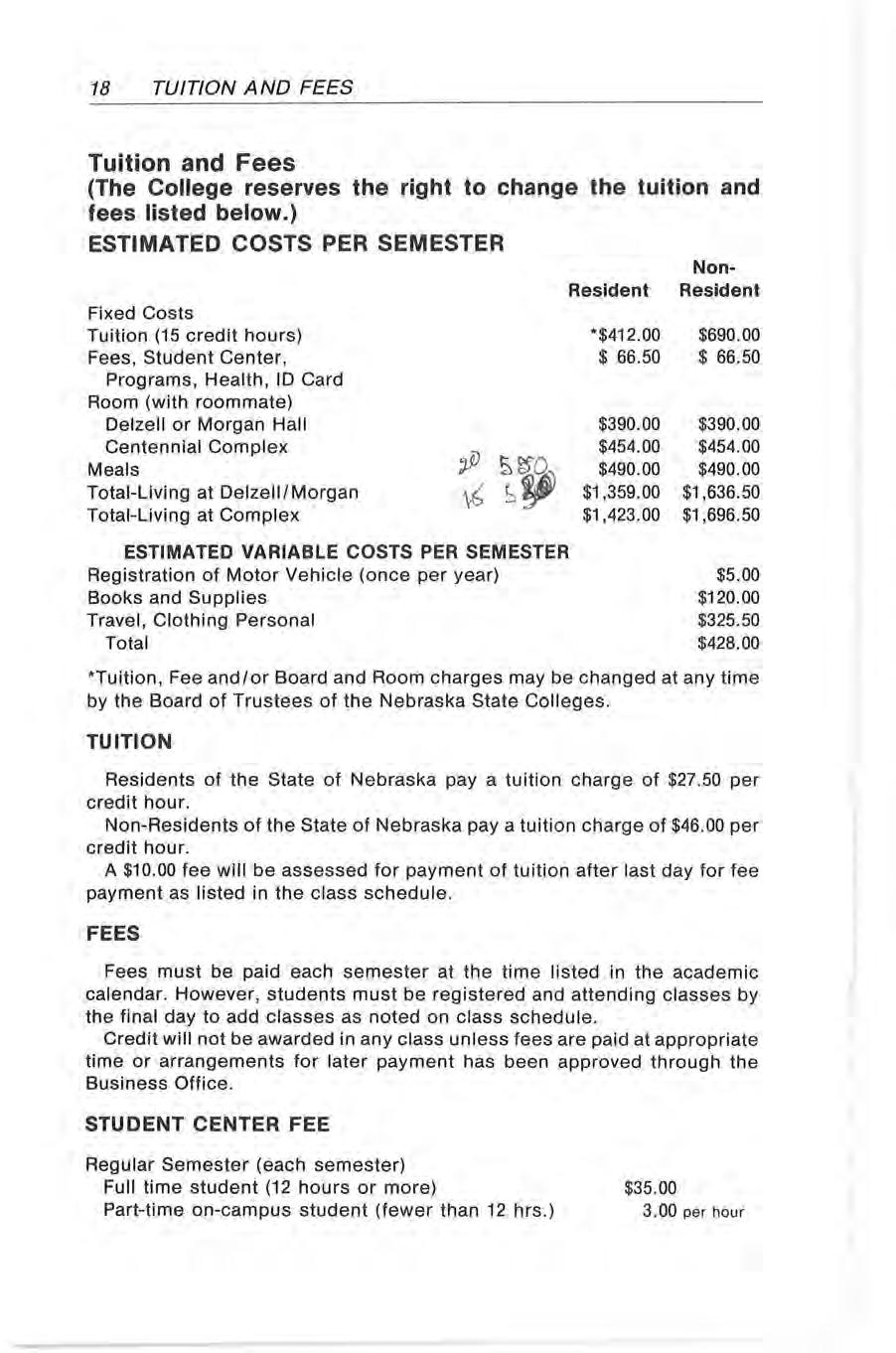
Regular Semester (each semester)
Full time student (12 hours or more)
Part-time on-campus student (fewer than 12 hrs.)
$35 .00 3.00 per hour
Short , special, or workshop course on campus 5.00 facility use fee
Summer Session
Full - time students
17.50
Short, special, or workshop course on campus 3.00 per hour
The Student Center Fee and facility use fee are not refundable
Regular semester (each semester)
(All students enrolled in seven or more hours)
The Student Programs Fee is not refundable.
Regular Semester (each semester)
(Under 7 hours - $1 00 per hour)
Summer Session
Full - Time Student (entire session)
Short, Special or Workshop Course
The Health Center Fee is not refundable
Identification Card
Regular Semester students enrolled in seven or more hours will be required to purchase a student
I.D Card for each academic year.
Motor Vehicle Registration
Every Regular Semester day student operating a motor vehicle on campus is required to register the vehicle with the College.
Admission - Matriculation Fee
An Admission-Matriculation fee of $10 must accompany all applications for admission. This fee is not refundable and it does not apply toward tuition. Paid
Once Only.
Late Registration Fee
Effective the first day of classes
Administration of CLEP Test
Private Music Lessons (per lesson)
(Charged to Non - Music Majors)
Graduate Fee
Includes cap and gown rental
Replacement of I.D Card
Dual Degree Transcript (after first copy)
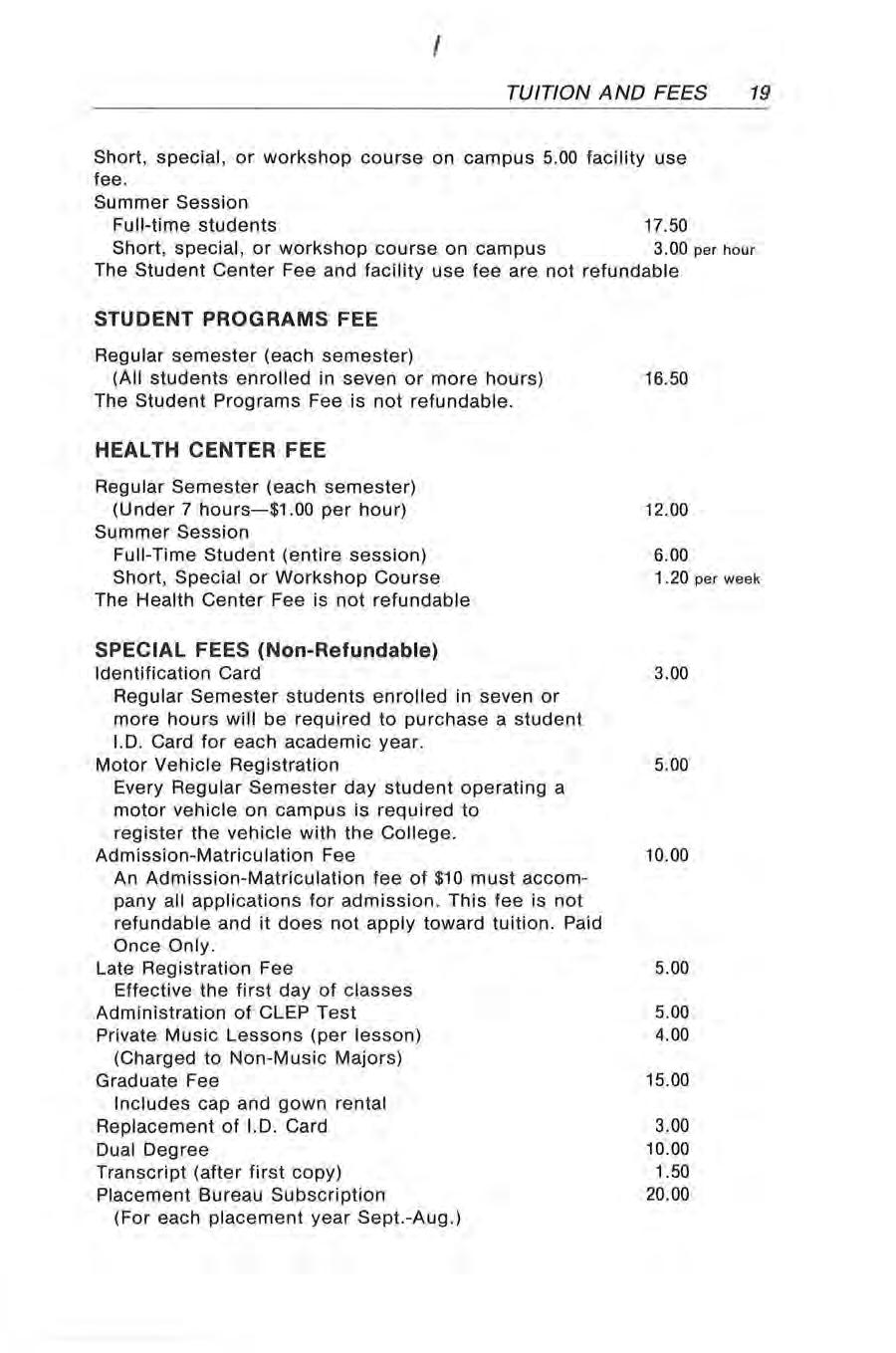
Placement Bureau Subscription
(For each placement year Sept. - Aug . )
16 50
Student Spouse Activity Ticket (per semester)
Course Fees
Some courses require additional materials , supplies or laboratory fees
BOARD AND ROOM
(Subject to Change)
Room and Board Rates
Room and Board: 20 Meal Plan
Delzell and Morgan Halls
Centennial Complex
Room and Board: 15 Meal Plan
Delzell and Morgan Halls
Centennial Complex
Room Only (juniors and seniors only)
Delzell and Morgan Halls
Centennial Complex
Private Room (optional)
1983 Summer Sessions (Per Session) (Room Only)
Room and Board Installment Plan
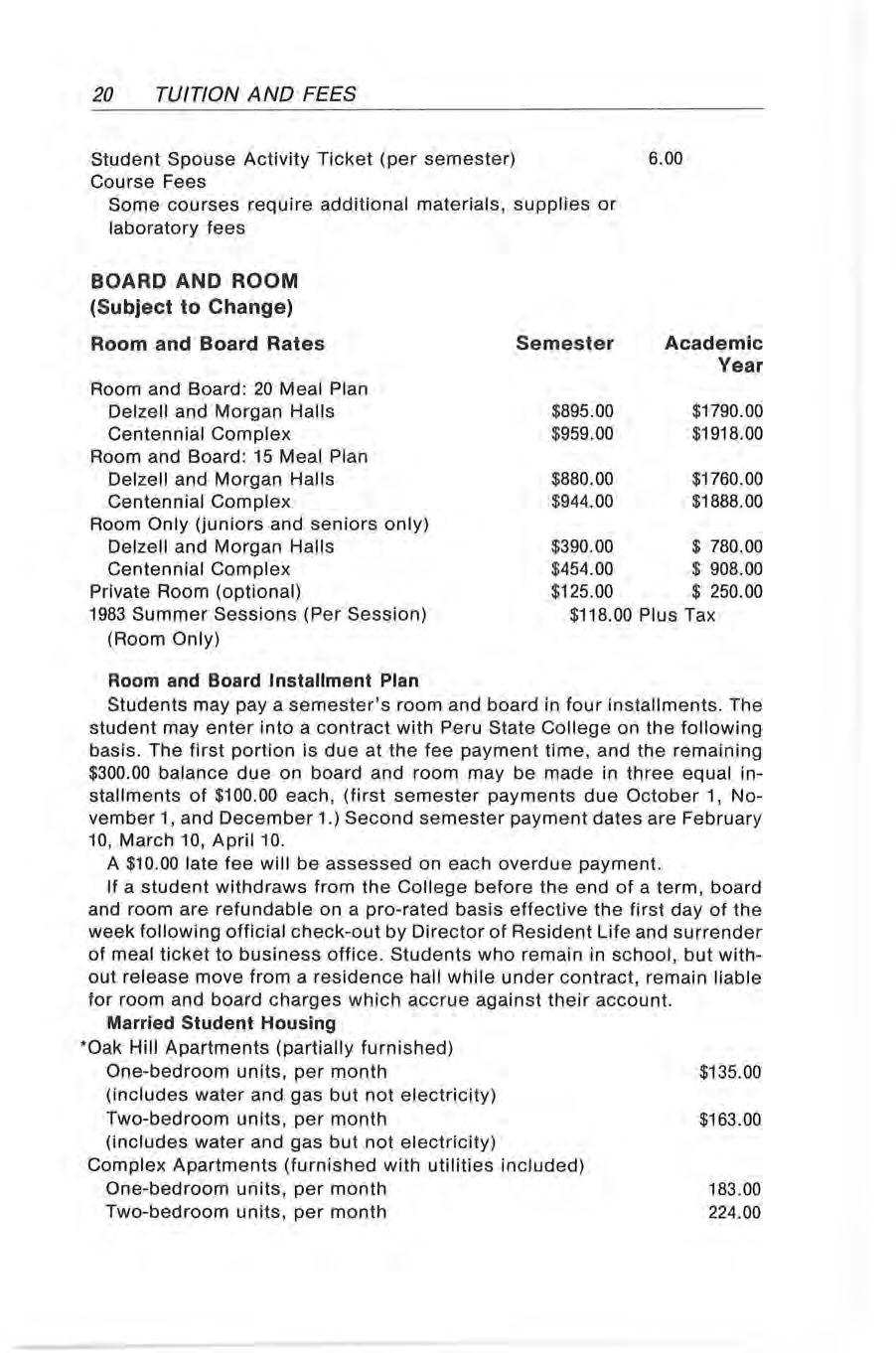
6 .00
Students may pay a semester 's room and board in four installments. The student may enter into a contract with Peru State College on the following basis . The first portion is due at the fee payment time, and the remaining $300 00 balance due on board and room may be made in three equal installments of $100 00 each, (first semester payments due October 1, November 1, and December 1 ) Second semester payment dates are February 10 , March 10, April 10 .
A $10 . 00 lat e fee will be assessed on each overdue payment.
If a student withdraws from the College before the end of a term, board and room are refundable on a pro-rated basis effective the first day of the week following official check-out by Director of Resident Life and surrender of meal ticket to business office. Students who remain in school , but without release move from a residence hall while under contract, remain liable for room and board charges which accrue against their account.
Married Student Housing
*Oak Hill Apartments (partially furnished)
One-bedroom units, per month
(includes water and gas but not electricity)
Two-bedroom units, per month
(includes water and gas but not electricity)
Complex Apartments (furnished with utilities includ ed)
One-bedroom units, per month
Two-bedroom units, per month
00
183 00
224 00
Pate Apartments (unfurnished with utilities included)
Two-bedroom units , per month
Three - Bedroom units, per month
* Plus tax on utilities. Oak Hill apartments are subject to surcharge based utility costs .
Housing Contracts
149.00
167.00 monthly utility
Every student residing in College residence halls or married student housing enters into a contract on forms provided by the College. Advance reservations are required and a deposit of $50 must accompany request for reservation This deposit is not refundable if the student fails to take up residence in the hall or housing facility for the full year for which the application was made. It is refundable, less deduction for damage to the buildings and/or equipment, at the end of the year , provided the student is in residence for the full year, or the student withdraws from the College because of reasons beyond his control, as determined by the College
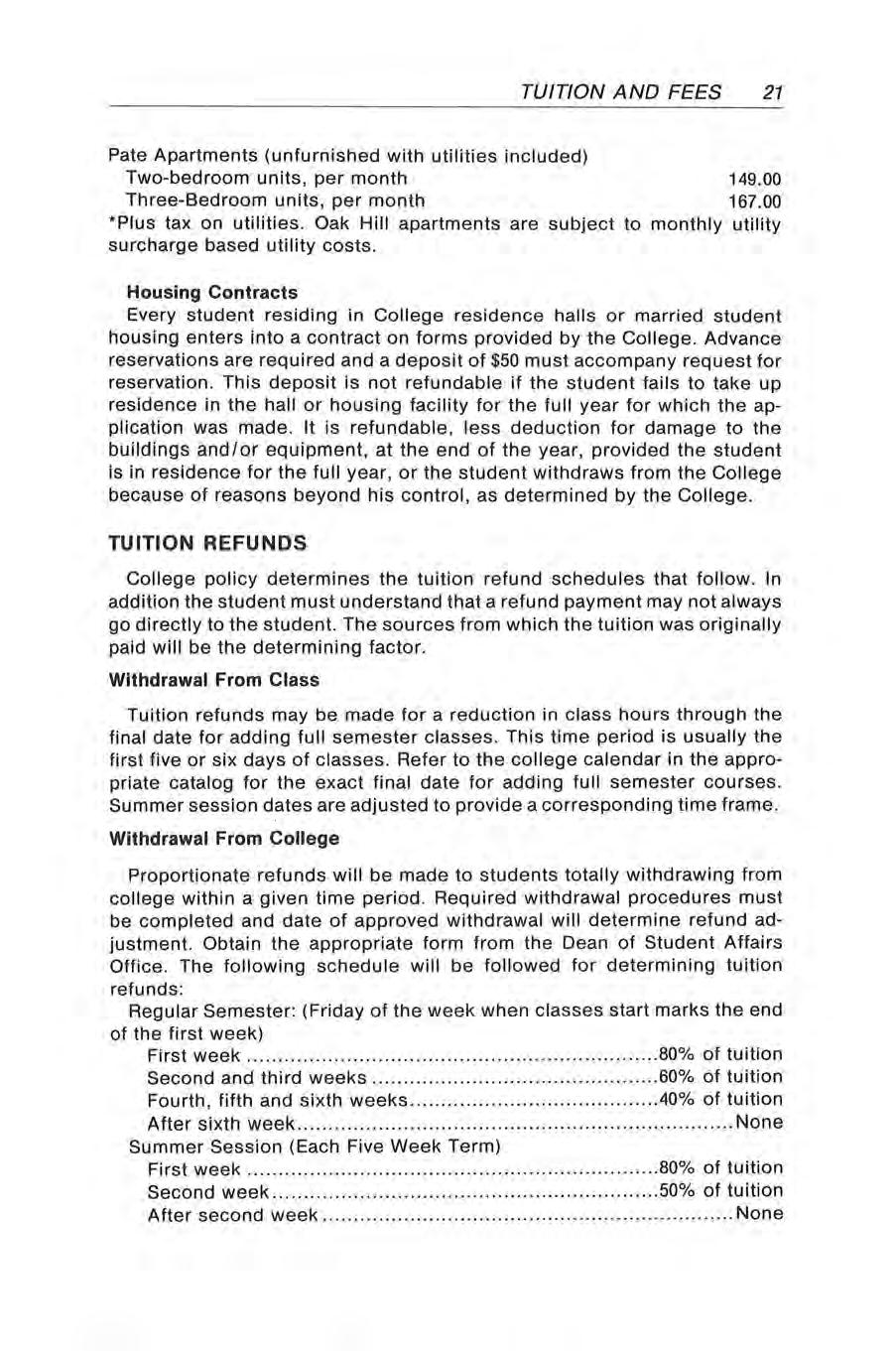
College policy determines the tuition refund schedules that follow . In addition the student must understand that a refund payment may not always go directly to the student. The sources from which the tuition was originally paid will be the determining factor.
Tuition refunds may be made for a reduction in class hours through the final date for adding full semester classes This time period is usually the first five or six days of classes. Refer to the college calendar in the appropriate catalog for the exact final date for adding full semester courses. Summer session dates are adjusted to provide a corresponding time frame
Proportionate refunds will be made to students totally withdrawing from college within a given time period. Required withdrawal procedures must be completed and date of approved withdrawal will determine refund adjustment. Obtain the appropriate form from the Dean of Student Affairs Office. The following schedule will be followed for determining tuition refunds:
(Friday of the week when classes start marks the end of the first week)
No refunds will be given after the class convenes for workshops of ten days or less Refund schedules for workshops of more than ten days will be prorated as a percentage of the class sessions remaining. No refunds will be given for any workshop after forty percent of the sessions have been held
Fees will not be refunded unless collected in error
The purpose of financial assistance is to provide students with sufficient funds to meet the costs of obtaining a college education beyond what they and their parents are expected to provide Thus, financial aid enables many students from low and middle income families to attend college who could not otherwise afford that opportunity
Most assistance granted is awarded according to the financial need of the applicant. (Financial need is the difference between the money a student and his parents can provide for an education and the costs of that education ) To be considered for assistance, the applicant must demonstrate financial need .
Financial assistance to qualified applicants is available in the form of loans, grants, scholarships, and college work . A student who qualified for one program of financial aid may not necessarily qualify for another.
"Financial packaging" permits the Director of Financial Aid to tailor a program of financial assistance to meet the monetary needs of the individual student for one academic year. A financial package is worked out on the basis of a careful estimate of the applicant's estimated resources and educational costs for the year.
A package usually consists of two or more types of aid but may not exceed the student's financial need. A financial aid package may include PELL Grant, National Direct Student Loan, College Work Study and Scholarships
Every student receiving financial assistance from any Federally funded and/or college Administered Financial Aid Program is required to maintain satisfactory academic standing and progress. The standards for satisfactory academic standing are published under "scholarship standards" in the academic information section of this catalog. The standards for Satisfactory Academic Progress as defined for Financial Assistance are published in the "College Student Handbook" and in the "Financial Aids Student Handbook".
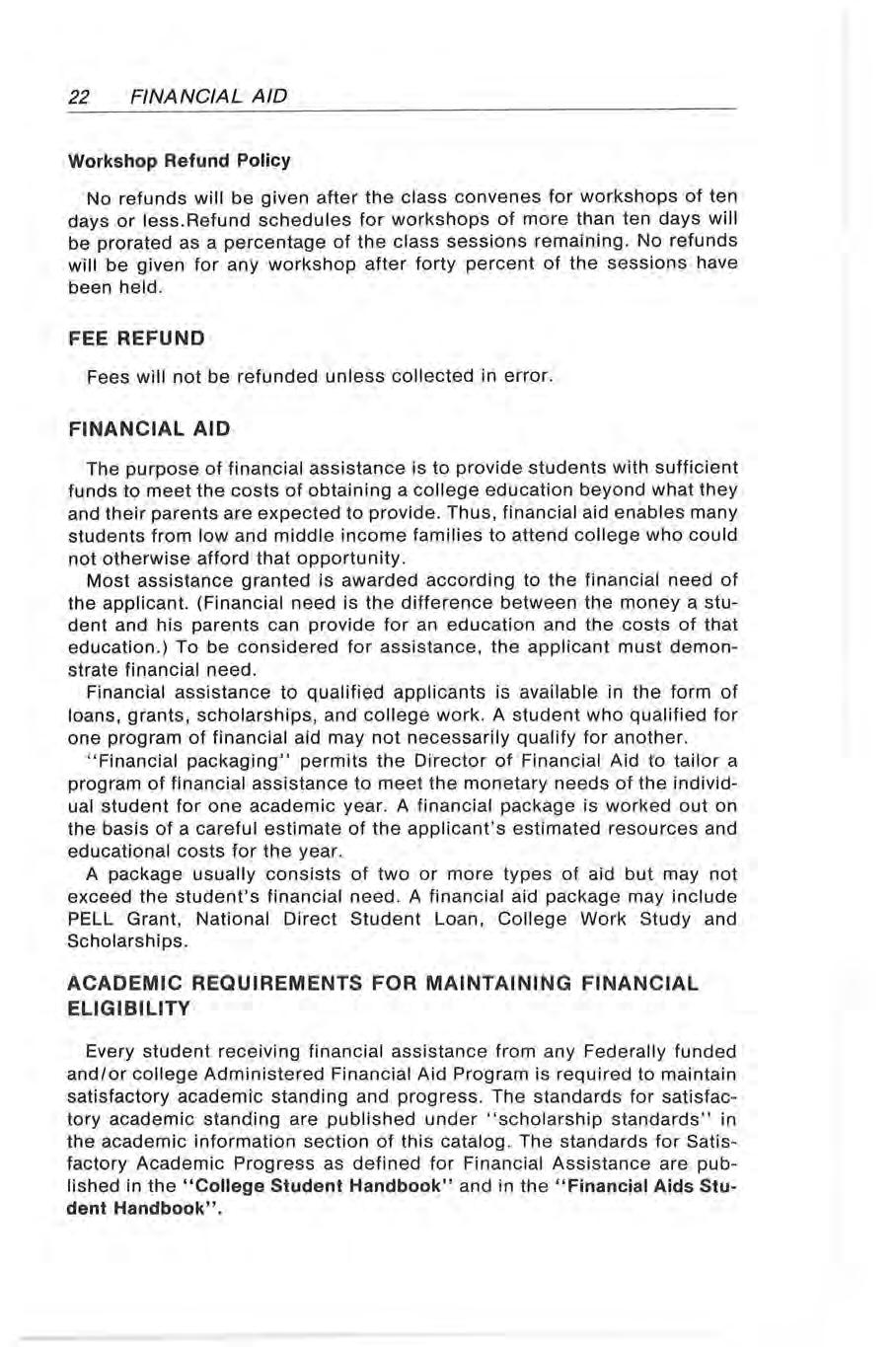
Any student who needs financial assistance, or desires to apply for a scholarship, should contact the Director of Financial Aid. Students are advised to begin the application procedure well before the deadline date, because establishing financial need is often a lengthy process. Applications for financial assistance for the coming year should be submitted to the Financial Aids office by April 1. A student is required to submit new application material each academic year
Pell Grant - Formerly Basic Educational Opportunity Grant. The Higher Education Amendments of 1980 changed the name Basic Educational Opportunity Grant to Pell Grant. The size of the grant is determined after considering the cost of attending the college and the Student Aid Index. This Index is determined from a Financial Statement which is a part of the Application.
Supplementary Educational Opportunity Grants provide for the giving of grants to students who are determined to be of exceptional financial need. Students in this category will be of such need that they will be unable to attend college without financial aid of this type.
The SEOG amounts range from $200 to $1000 a year, and can be no more than one-half of the total assistance given a student. The grant is "matched" with other financial aid to meet the student's financial need. Grants are awarded on a yearly basis, with the maximum duration of a grant being eight semesters.
College Work-Study is intended primarily for students from low-income families and permits them to earn a part of their college expenses. During the time they are attending classes full time, the student can work a maximum of 15 hours per week. During vacation periods the students may be allowed to work 40 hours per week . Work-Study jobs are usually on-campus, and are vital to the efficient operation of the College.
National Direct Student Loans are low interest, long term loans made to students who need financial assistance in meeting educational expenses To be eligible, the student must be in good standing and be registered as a half-time student.
Guaranteed Student Loans are loans which may be obtained through the commercial lending community. The student must be either from a family whose income is below $30,000 or who can demonstrate financial need
Parents Loan for Undergraduate Students-also referred to as Auxiliary Loan to assist students - allows parents of students to borrow through the Commercial Lending Community to assist in meeting educational cost of their children. Monthly installment begins 60 days after the loan has been obtained
Nebraska State Loan for Math and Science Teachers This loan was established by the State of Nebraska to assist Nebraska students who are studying to become math or science teachers in Nebraska. Information and applications may be obtained from the Nebraska Department of Education.
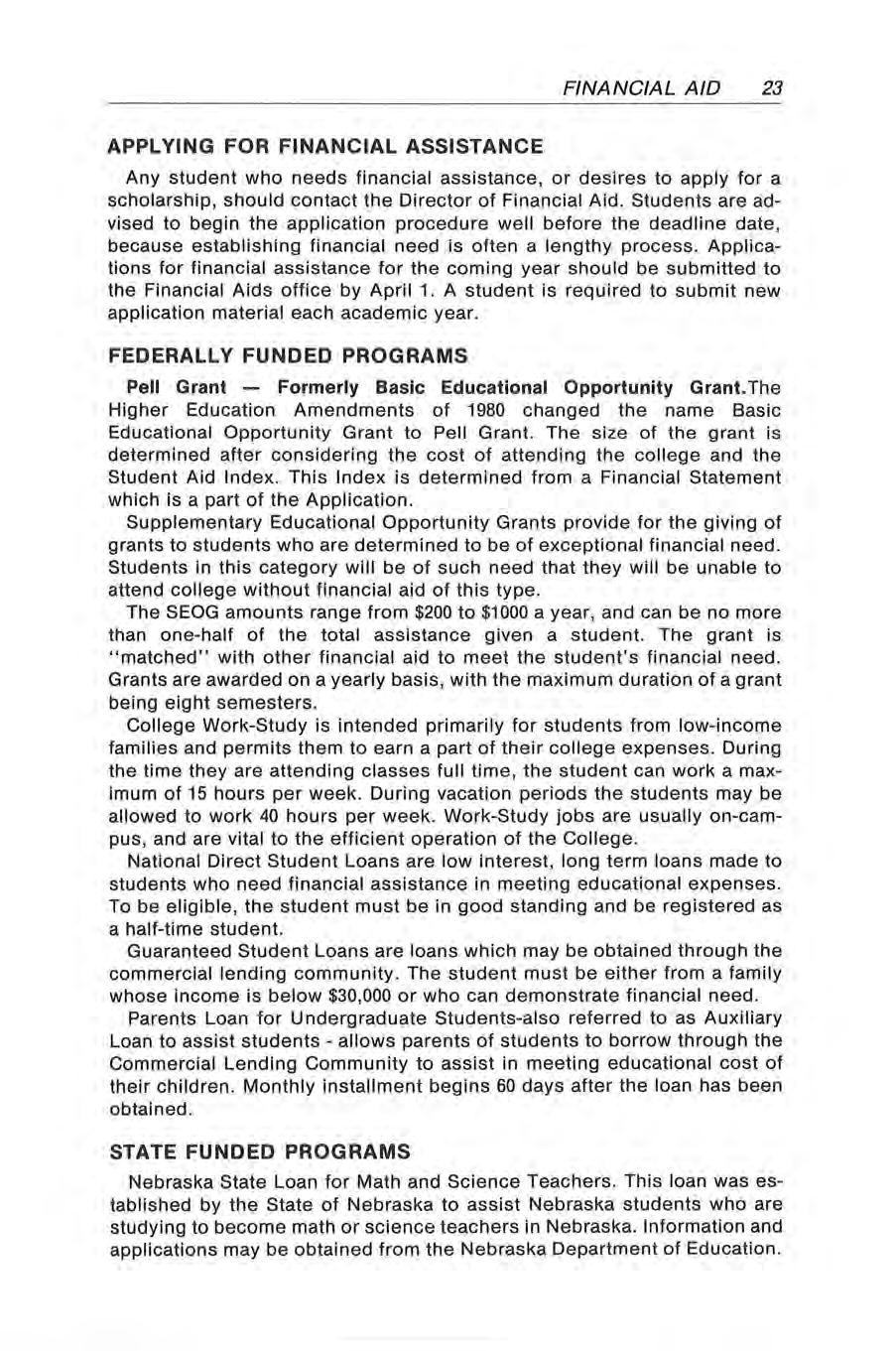
Tuition Assists for Members of the Nebraska National Guard. A limited number of members of the Nebraska National Guard may have three-quarters of their tuition paid for by the Guards. Guard persons must submit the proper paper work through their Guard Unit.
Military Reserves Tuition Waivers Select members of military reserve units in Nebraska may have one half of their tuition waived at Peru State College. The Reservist should obtain the proper paper work from the Reserve Unit.
Army ROTC Scholarships. The Army ROTC program has two or three years scholarships for students attending Peru State College. Interested students should contact the ROTC department.
College Work jobs are similar to the Work-Study jobs in pay scale, type of work performed, and hours worked.
Memorial Loan Funds established by various donors include: the $200 Willie Ethel Crone Loan Fund, established in 1943 by Miss Ruth Crone in memory of her mother; the $300 Harriet Louise Lindstrom Loan Fund, established in 1946 by the late C. R. Lindstrom and Mrs. Lindstrom in memory of their daughter; the Mrs. Eva Fischer Loan Fund provided in 1962 by a $500 bequest by the late Mrs Eva Fischer of Beatrice ; the Towne Loan Fund provided by a $1,411.24 bequest by the late Norman L. Towne of Bozeman, Montana, husband of the late Lola Howe Towne , class of 1906; the $250 Patricia Buethe Loan Fund, established in 1962 by friends of the late Mrs. L. Chris Buethe.
Loans from the College Loan Fund and Memorial Loan Fund are generally made on a short-term basis.
Sheridan Livermore Loan Fund. Those loans are provided at current bank interest rates to students who have completed a minimum of 60 hours of academic work at Peru State College, but have demonstrated financial responsibility, need short term loans to meet unexpected expenses or expenses related to relocation for employment.
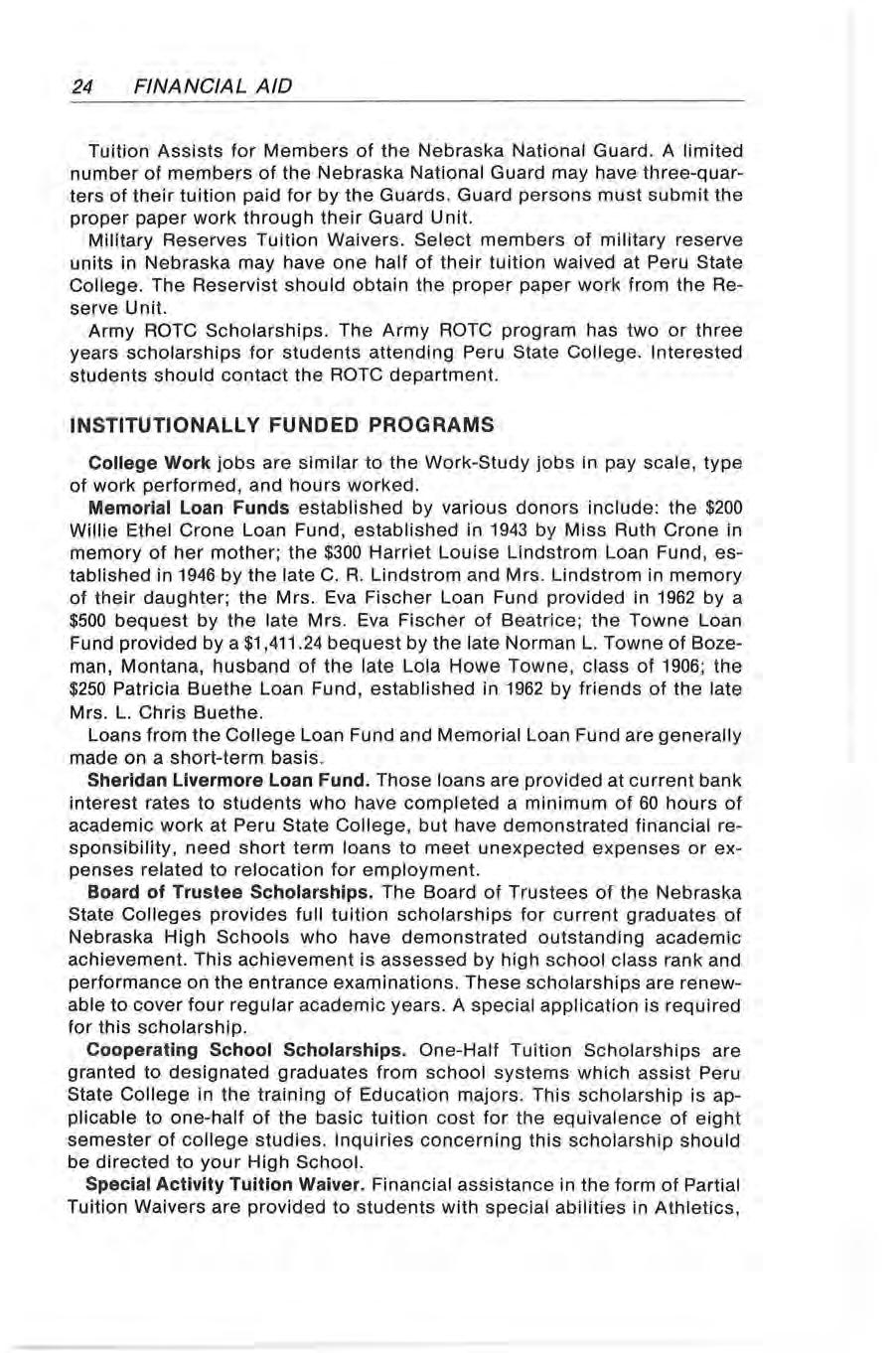
Board of Trustee Scholarships. The Board of Trustees of the Nebraska State Colleges provides full tuition scholarships for current graduates of Nebraska High Schools who have demonstrated outstanding academic achievement. This achievement is assessed by high school class rank and performance on the entrance examinations. These scholarships are renewable to cover four regular academic years. A special application is required for this scholarship .
Cooperating School Scholarships. One - Half Tuition Scholarships are granted to designated graduates from school systems which assist Peru State College in the training of Education majors. This scholarship is applicable to one-half of the basic tuition cost for the equivalence of eight semester of college studies. Inquiries concerning this scholarship should be directed to your High School.
Special Activity Tuition Waiver. Financial assistance in the form of Partial Tuition Waivers are provided to students with special abilities in Athletics,
Art, Debate , Drama, Journalism, Music, etc Applicants for these awards shou l d submit the Financial Aid Application indicating a desire to be considered for this scholarship . The applicant will then be contacted by the appropriate College official to determine the student's qualification. These are approved for only one academic year and may be renewed.
Special State of Nebraska Tuition Waiver. Partial Waivers are awarded to worthy students who have financial need.
Foreign Student Scholarships. Full - tuition scholarships are awarded annually to qualified undergraduate students who are citizens of other countries
Scholarships Awarded by the Peru Achievement Foundation. Through the generosity of alumni and friends of Peru State College, the Peru Achievement Foundation, Inc., awards scholarships which have been established on a permanent basis.
A listing of the amounts and qualifications for Scholarships that are awarded through the Foundation can be found at the conclusion of the information on Financial Aid.
Students may make application for a specific scholarship or any available scholarship on the College's scholarship application form, which may be obtained from the Office of the Director of Financial Aids.
Scholarships are granted by the Nebraska Congress of parents and Teachers to full-time students of the Nebraska State Colleges who are Nebraska residents training to become teachers. In order to be eligible for these scholarships which vary in number with available funds the student must have a pleasing personality, have high moral and social standards; and show an aptitude for teaching . Applications are sent to the College by the Nebraska Congress of Parents and Teachers shortly after the beginning of the fall semester
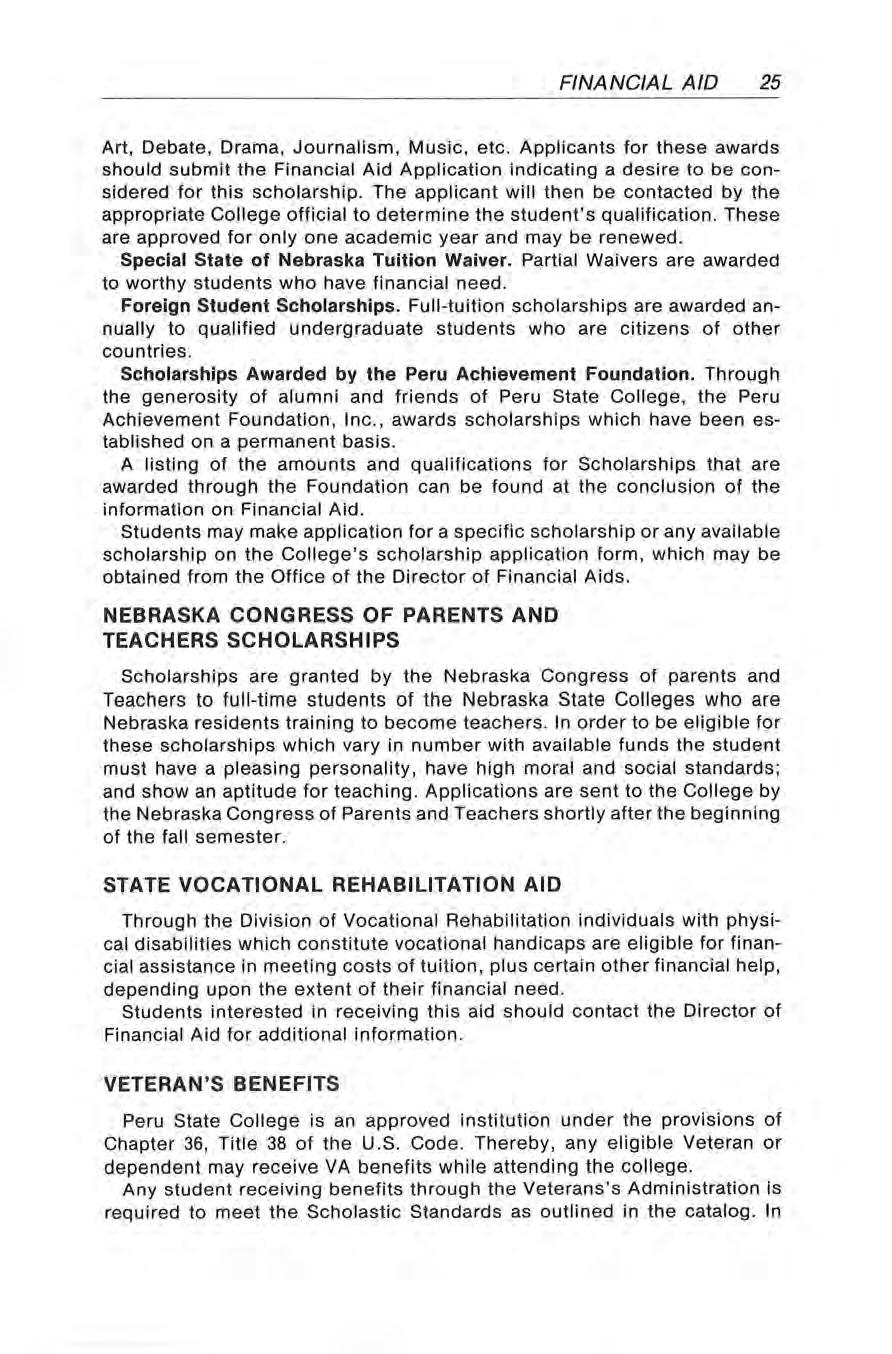
Through the Division of Vocational Rehabilitation individuals with physical disabilities which constitute vocational handicaps are eligible for financial assistance in meeting costs of tuition , plus certain other financial help, depending upon the extent of their financial need.
Students interested in receiving this aid should contact the Director of Financial Aid for additional information
Peru State College is an approved institution under the provisions of Chapter 36, Title 38 of the U S Code Thereby, any eligible Veteran or dependent may receive VA benefits while attending the college
Any student receiving benefits through the Veterans's Administration is required to meet the Scholastic Standards as outlined in the catalog In
addition students receiving benefits through the Veterans Administration are required to make normal progress toward their educational objectives as defined in the college catalog . For more informa t ion contact the Financial Aid office at Peru State College.
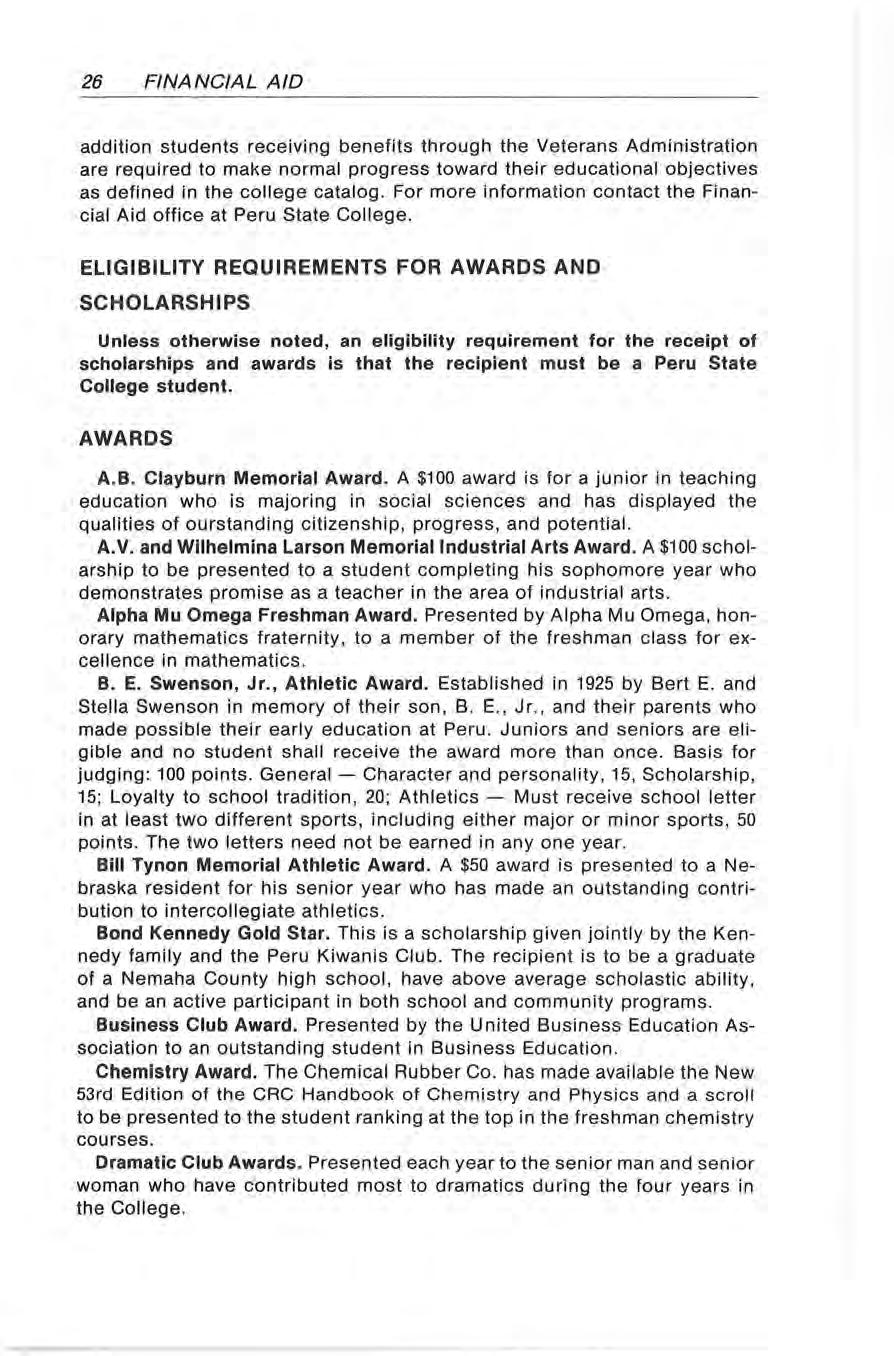
Unless otherwise noted, an eligibility requirement for the receipt of scholarships and awards is that the recipient must be a Peru State College student.
A.B. Clayburn Memorial Award. A $100 award is for a junior in teaching education who is majoring in social sciences and has displayed the qualities of ourstanding citizenship, progress, and potential.
A.V. and Wilhelmina Larson Memorial Industrial Arts Award. A $100 scholarship to be presented to a student completing his sophomore year who demonstrates promise as a teacher in the area of industrial arts.
Alpha Mu Omega Freshman Award. Presented by Alpha Mu Omega , honorary mathematics fraternity, to a member of the freshman class for excellence in mathematics .
B. E. Swenson, Jr., Athletic Award. Established in 1925 by Bert E. and Stella Swenson in memory of their son, B. E. , Jr. , and their parents who made possible their early education at Peru. Juniors and seniors are eligible and no student shall receive the award more than once Basis for judging: 100 points. General - Character and personality, 15 , Scholarship, 15 ; Loyalty to school tradition , 20; Athletics - Must receive school letter in at least two different sports , including either major or minor sports, 50 points. The two letters need not be earned in any one year
Bill Tynon Memorial Athletic Award. A $50 award is presented to a Nebraska resident for his senior year who has made an outstanding contribution to intercollegiate athletics.
Bond Kennedy Gold Star. This is a scholarship given jointly by the Kennedy family and the Peru Kiwanis Club . The recipient is to be a graduate of a Nemaha County high school, have above average scholastic ability, and be an active participant in both school and community programs
Business Club Award. Presented by the United Business Education Association to an outstanding student in Business Education.
Chemistry Award. The Chemical Rubber Co has made available the New 53rd Edition of the CRC Handbook of Chemistry and Physics and a scroll to be presented to the student ranking at the top in the freshman chemistry courses
Dramatic Club Awards. Presented each year to the senior man and senior woman who have contributed most to dramatics during the four years in the College.
Helen E. Cole Pollard Founders Award. Presented at spring honors convocation to the senior who during his collegiate career has demonstrated loyalty and service to the College.
John C. Christ Award. An award established in honor of Dr John C. Christ, Professor of Biological Science. The award of fifty dollars is to be given to an outstanding high school senior who plans to major in the natural sciences at Peru State College .
Kappa Delta Pi Educational Award. Presented by the Beta Mu Chapter of Kappa Delta Pi, national honorary educational fraternity, to the freshman whose scholarship and professional attitude are outstanding.
Louise Mears Geographical Award. Presented to a student with high scholastic performance in the field of geography.
Lura Hendricks Eichler Memorial Kindergarten Education Award. The $50 award is presented annually to a student who has demonstrated ability, aptitude, and interest in kindergarten education.
Mac Dunning Industrial Arts Award. A $75 annual cash grant to an outstanding student in the area of industrial arts.
Neal S. Gomon Award. The Neal S. Gomon Award is presented annually to the Pedagogian staff member who is voted most outstanding in his contributions to the paper.
Pearl A. Kenton Language Arts Award. A $50 award is presented annually to an outstanding student majoring in the area of language arts.
Sigma Tau Delta Award. Students of high scholastic standing who have shown an outstanding interest in literature and have properly submitted samples of their original writings may be presented memberships in Sigma Tau Delta.
Silas Summers Writing Award. The Sigma Tau Delta National honorary Eng lish fraternity, and the English Club present cash awards for the best original written contributions Winning scripts may be published in the Sifting Sands.
Zelma R. Wonderly Award. An annual award of $50 to the outstanding second grade student teacher.
The Peru Achievement Foundation administers several scholarship funds. These scholarships are made available through contribution from Alumni and Friends of Peru State College to recognize students for their academic achievements.
Ada Crooker Memorial Scholarship. Estab lished in memory of Ada Crooker who taught business courses at Auburn High School for several years. The recipient must be a female graduate of Auburn High School who is majoring in Business at Peru State College
Albert Brady Scholarship. Established by the Peru State College Letterman's Club and Friends of Albert Brady to provide a scholarship to a B iology Major with athletic ability
Arthur R. Majors Memorial Scholarship. Established in memory of Arthur R. Majors a 1951 graduate of Peru State College who was an active educator
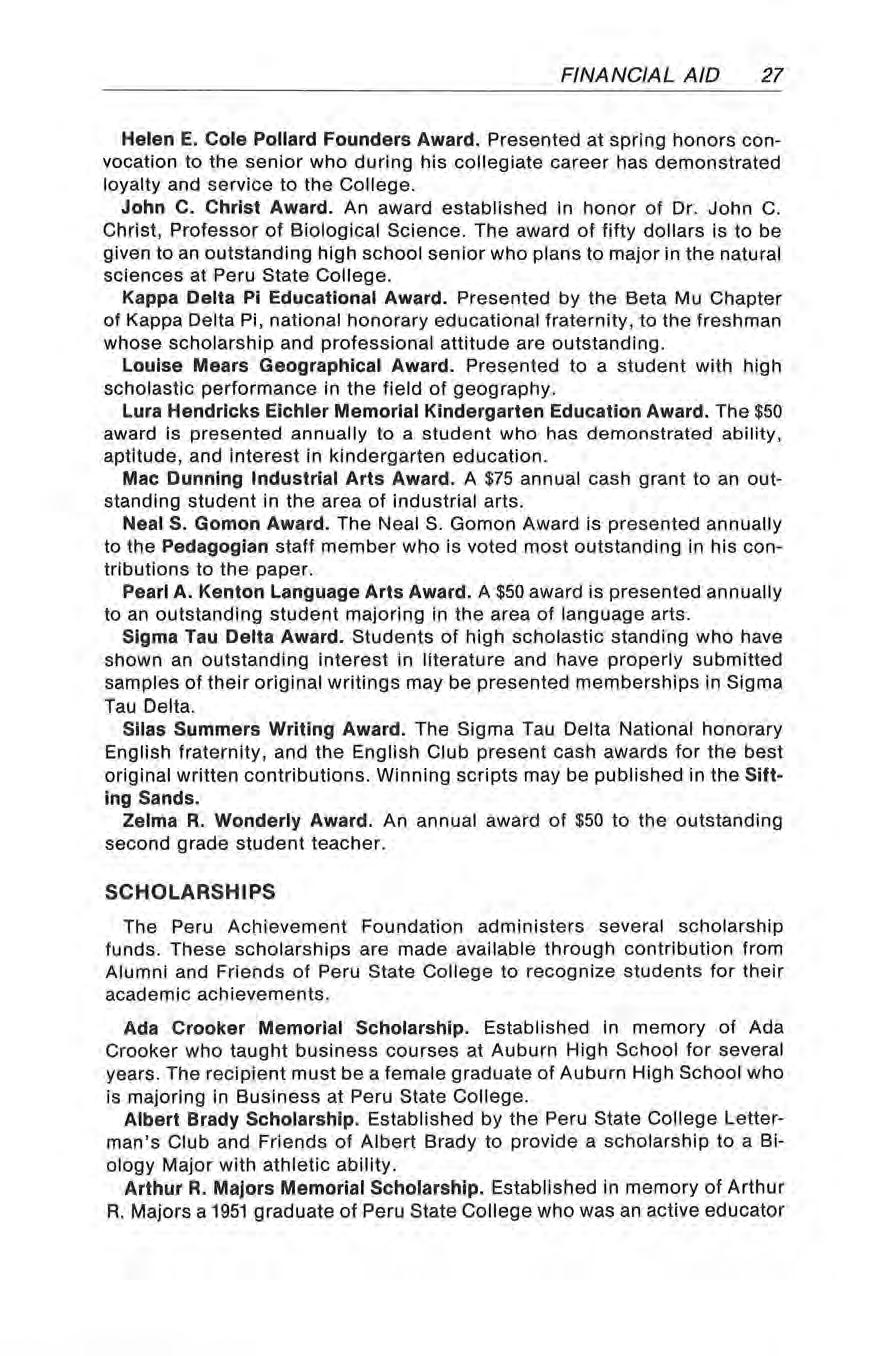
for 43 years. Mr. Majors was a strong supporter of Peru State college and the Peru Achievement Foundation. This scholarship i s awarded to a student majoring in Biology, Chemistry or Physics.
Bath Family Memorial Scholarships. Established in 1967 by Mrs. Minnie Bath in memory of her husband John Bath and her two sons Edward J. and Robert L. Bath . Selection is made based on academic achievement.
Benjamin Harrison Memorial Scholarship. This scholarship was established by the family of Benjamin Harrison, class of 1907 to provide scholarships to worthy Peru State College students.
C. C. and Erma Wilson Choyce Scholarship. This scholarship was established by Mr. and Mrs . C. C. Choyce to provide academic recognition for Peru State College Students. Mr. Choyce attended Peru State in 1919 and Mrs. Choyce graduated in 1920.
Charles Andrews Memorial Scholarship. This scho l arship fund was established as a memorial to Char les Andrews a 1914 graduate of Peru State Col leg e. These scholarships are awarded to incoming freshman based on academic promise and may be renewed for additional years dependent on the students grade point average.
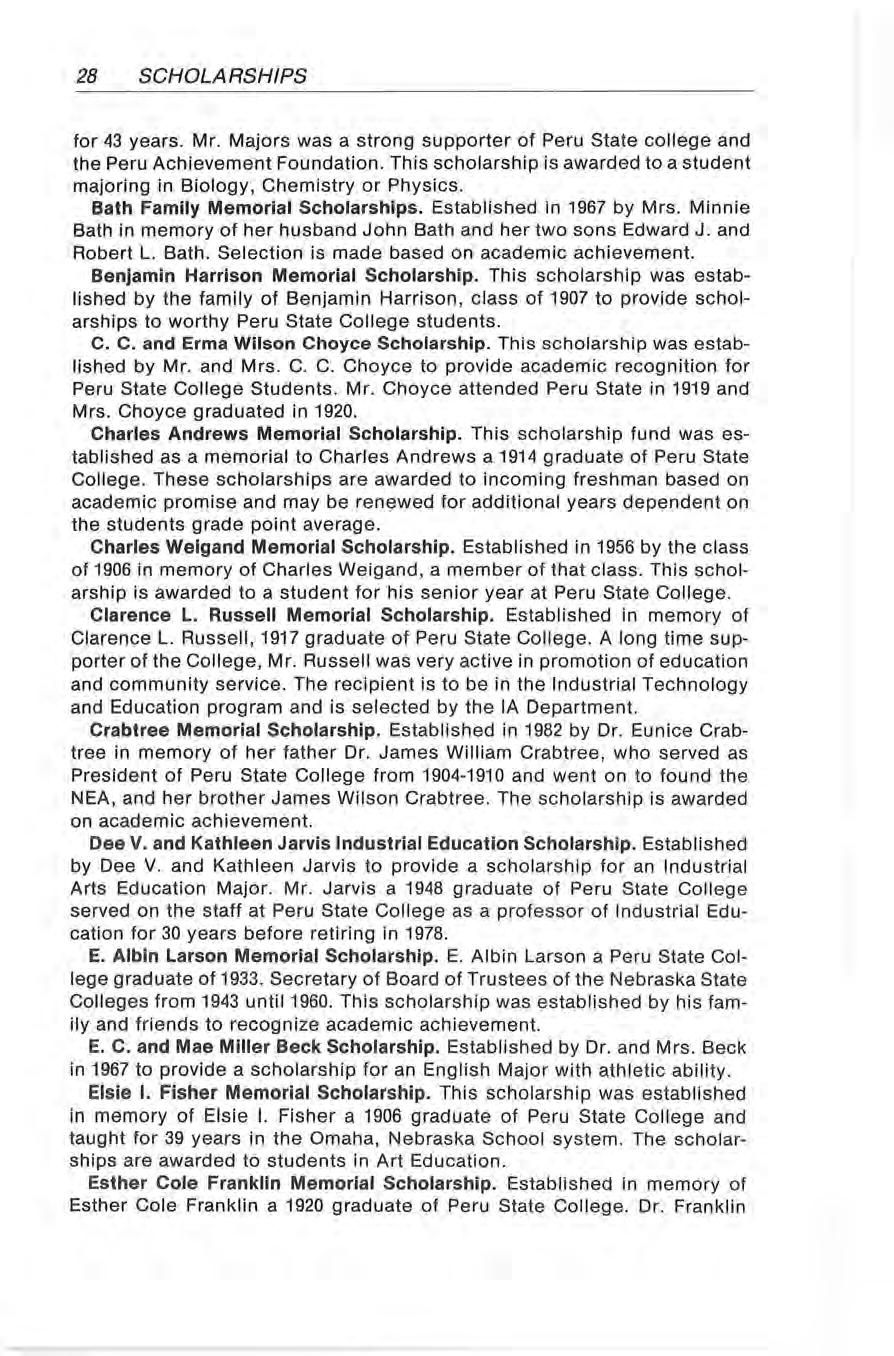
Charles Weigand Memorial Scholarship. Established in 1956 by the class of 1906 in memory of Charles Weigand, a member of that class. This scholarship is awarded to a student for his senior year at Peru State College.
Clarence L. Russell Memorial Scholarship. Established in memory of Clarence L. Russe ll , 1917 graduate of Peru State College A long time supporter of the College, Mr Russell was very active in promotion of education and community service. The recipient is to be in the Industrial Techno logy and Education program and is selected by the IA Department.
Crabtree Memorial Scholarship. Estab lished in 1982 by Dr. Eunice Crabtree in memory of her father Dr James William Crabtree, who served as President of Peru State College from 1904-1910 and went on to found the NEA, and her brother James Wilson Crabtree. The scholarship i s awarded on academic achievement.
Dee V. and Kathleen Jarvis Industrial Education Scholarship. Established by Dee V. and Kathleen Jarvis to provide a scholarship for an Industrial Arts Education Major. Mr . Jarvis a 1948 graduate of Peru State College served on the staff at Peru State Col l ege as a professor of Industrial Education for 30 years before retiring in 1978.
E. Albin Larson Memorial Scholarship. E. Albin Larson a Peru State College graduate of 1933. Secretary of Board of Trustees of the Nebraska State Colleges from 1943 until 1960. This scholarship was established by his family and friends to recognize academic achievement
E. C. and Mae Miller Beck Scholarship. Established by Dr. and Mrs. Beck in 1967 to provide a scholarship for an English Major with athletic ability.
Elsie I. Fisher Memorial Scholarship. This scholarship was estab li shed in memory of Elsie I. Fisher a 1906 graduate of Peru State College and taught for 39 years in the Omaha, Nebraska School system . The scholarships are awarded to students in Art Education
Esther Cole Franklin Memorial Scholarship. Established in memory of Esther Cole Franklin a 1920 graduate of Peru State College. Dr. Franklin
was recognized as a distinguished alumni in 1977. Awarded to an outstanding student at Peru State College.
Ernest J. Rawson Memorial Industrial Education Scholarship. Established by the family of Ernest J. Rawson, a member of the class of 1938. Mr Rawson taught Industrial Education at the High School and college level for many years before his retirement in the late 1970's.
Evan Van Zant Teacher Education Scholarship. Established in memory of Mr. Evan Van Zant, Professor of Education from 1961 to 1980 Selected by the Education Department based on academic excellence, dedication to the teaching profession and aptitude for teaching.
First Federal Savings and Loan of Lincoln. This scholarship is provided by First Federal Savings and Loan of Lincoln to students at Peru State College .
G. Holt "Pop" Steck Memorial Music Scholarship. Established to provide a scholarship to a Music student at Peru State College G Holt "Pop" Steck served as Professor of Music at Peru State College from 1928 to 1943.
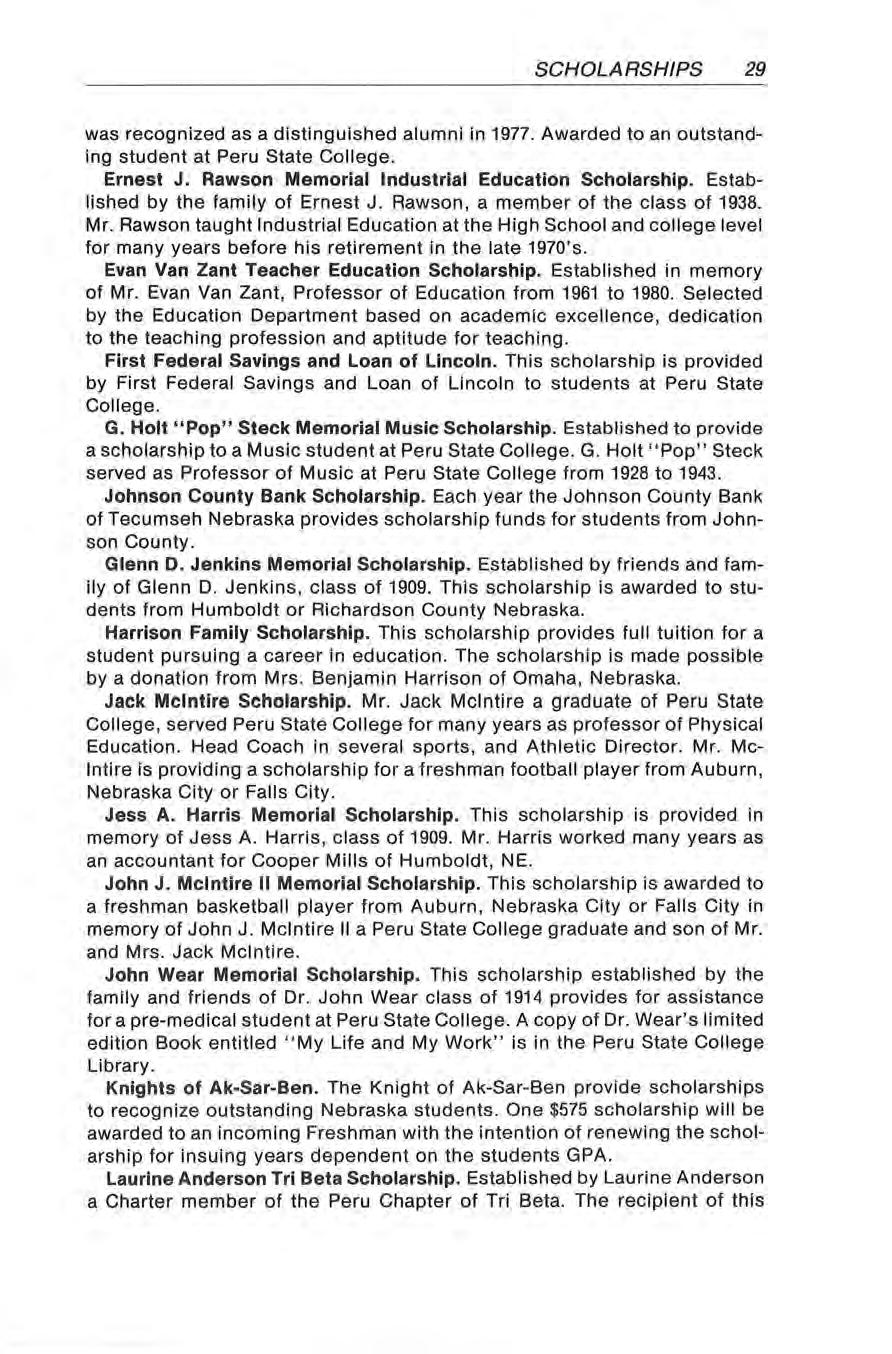
Johnson County Bank Scholarship. Each year the Johnson County Bank of Tecumseh Nebraska provides scholarship funds for students from Johnson County.
Glenn D. Jenkins Memorial Scholarship. Established by friends and family of Glenn D. Jenkins, class of 1909 This scholarship is awarded to students from Humboldt or Richardson County Nebraska. Harrison Family Scholarship. This scholarship provides full tuition for a student pursuing a career in education. The scholarship is made possible by a donation from Mrs. Benjamin Harrison of Omaha , Nebraska.
Jack McIntire Scholarship. Mr. Jack McIntire a graduate of Peru State College, served Peru State College for many years as professor of Physical Education . Head Coach in several sports, and Athletic Director. Mr. McIntire is providing a scholarship for a freshman football player from Auburn, Nebraska City or Falls City.
Jess A. Harris Memorial Scholarship. This scholarship is provided in memory of Jess A. Harris, class of 1909. Mr. Harris worked many years as an accountant for Cooper Mills of Humboldt, NE.
John J. McIntire II Memorial Scholar ship. This scholarship is awarded to a freshman basketball player from Auburn, Nebraska City or Falls City in memory of John J. McIntire II a Peru State College graduate and son of Mr. and Mrs. Jack McIntire.
John Wear Memorial Scholarship. This scholarship established by the family and friends of Dr. John Wear class of 1914 provides for assistance for a pre - medical student at Peru State College. A copy of Dr. Wear's limited edition Book entitled "My Life and My Work" is in the Peru State College Library
Knight s of Ak-Sar-Ben . The Knight of Ak-Sar-Ben provide scholarships to recognize outstanding Nebraska students. One $575 scholarship will be awarded to an incoming Freshman with the intention of renewing the scholarship for insuing years dependent on the students GPA .
Laurin e Anderson Tri Beta Scholarship. Established by Laurine Anderson a Charter member of the Peru Chapter of Tri Beta. The recipient of this
$100 scholarship is chosen by the Natural Science Department and must be a Biology Major as well as a member of Tri Beta.
Lena Huff Memorial Scholarship. Established as a memorial for Lena Huff a 1909 graduate of Peru State College This scholarship is awarded on bases of scholastic excellence.
Lillian Jewell Barnes or Alice Jewell Warnock Memorial Scholarship. Established in memory of Lillian Jewell Barnes class of 1903 and 1920 and her sister Alice Jewell Warnock class of 1927 for students with high academic achievement.
Louise Mears Memorial Scholarship. A scholarship to a geography student is provided for by Revenue from the sale of Louise Mears' Book "Hills of Peru." Louise Mears graduated from Peru State College in 1895 and was on the staff of Peru State College from 1906 until 1912 .
MENC Scholarship. The Peru Alumni of the Music Education National Conference provides scholarship (s) to Music students attending Peru State College Application is made through the Chairman of the Music Department.
Mr. and Mrs. W. R. Pate Scholarship. This scholarship is provided by the family of Mr. and Mrs W.R. Pate for students with high academic achievement. Dr. Pate served as the President of the College from 1923 to 1946.
Nona Palmer Business Education Scholarship. This scholarship is awarded to a Business Education student in memory of Nona Palmer a 1910 graduate who served as a professor of Business at Peru State College from 1915 until 1960.
Oliver Stevenson Memorial Scholarship. Established by Mrs. Oliver Stevenson a friend of Peru State College in memory of her husband. This fund provides scholarships to students at Peru State College who have demonstrated academic excellence.
Pearl Morgan Bulter Memorial Scholarship. Estblished by Joy Elmer Morgan in memory of his sister who attended Peru State College in 1905. The scholarship provides all tuition and fees as funds allow .
Phyllis Davidson Memorial Scholarship. This scholarship was established in memory of Phyllis Davidson who served Peru State College from 1929 to 1957 as Professor of Women's Physical Education.
Ruth Mathews Memorial Scholarship . This scholastic award is made in memory of Mrs . Ruth Mathews who was professor of Health Education from 1943 to 1960.
Schottenhamel Memorial Scholarship. Dr. and Mrs George Schottenhamel established this scholarship in memory of Dr. Schottenhamel's parents who reside in Dupage County in Illinois. Dr. Schottenhamel served Peru State College as professor of Social Sciences from 1958 until his retirement in 1981.
Standford and Hattie Clements Scholarship. Established by the family of Mr. and Mrs. Clements to provide scholarships for students from Southeast Nebraska who are interested in pursuing a career in teaching Math and Science.
Victor H. Jindra Memorial Scholarship. The estate of Victor H. Jindra professor of Music at Peru State College from 1923 until 1961 established a scholarship for students in music.
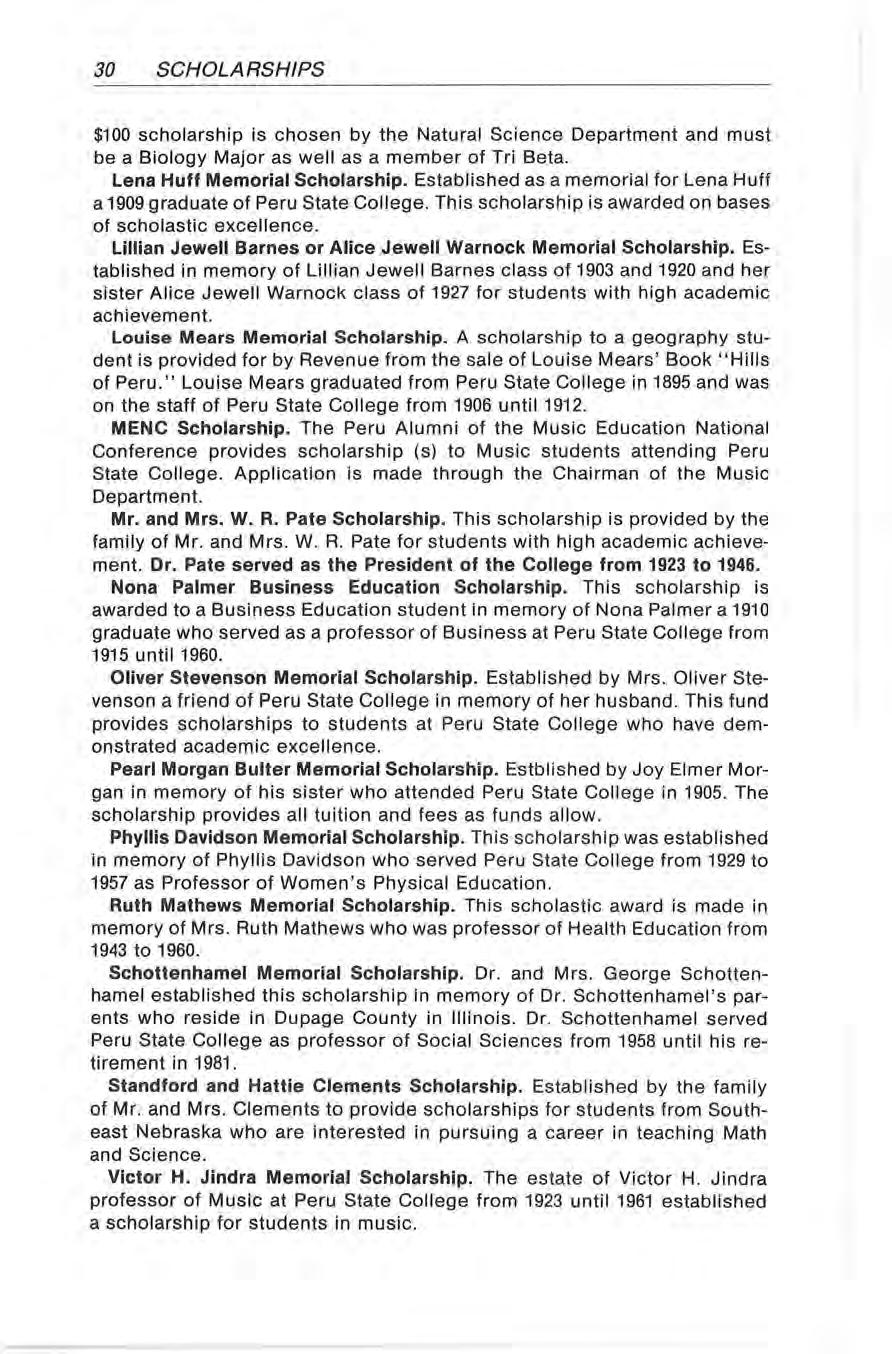
Vincent Sabatinelli Memorial Scholarship. This scholarship to a freshmen football player is awarded in memory of Vincent Sabatinelli a former member of the Peru State Football squad who gave his life in the service of his country in Vietnam
Wheeler Language Arts Scholarship. Provided by Mr. and Mrs. Dennis Wheeler to be awarded to a Language Arts major at Peru State College
Wm. Henry Wortman Memorial Scholarship. Established by the friends and family of Wm. Henry Wortman. This scholarship is awarded to minority students with preference given to Native Americans
The College has, as its constant goal, the task of adapting its educational opportunities to the interests, needs, and abilities of each student.
Each student is assigned to a faculty advisor who is qualified to advise him in his field Students needing advice before the opening of the college year are invited to arrange a conference with the Admissions Office of the College by definite appointment.
Prior to the opening of classes, the College arranges a program which is designed to give special attention to the problems of students who are entering the College Both freshmen and transfer students are invited to attend. The program acquaints students and their parents with the new environment and offers a helpful introduction to campus life. Students are assigned to faculty advisors who are available to assist them with academic planning for their college career. These advisors help students define goals to be reached in college and give information regarding appropriate curriculums and courses. Opportunity to meet members of the faculty and other members of the student body is afforded through social events
The Student Life Handbook is published in the late summer by the Office of Residence Life. The publication serves as a guide to campus living. Included in the handbook is a calendar of events, a list of Policies and Procedures, and Student Rights and Responsibilities
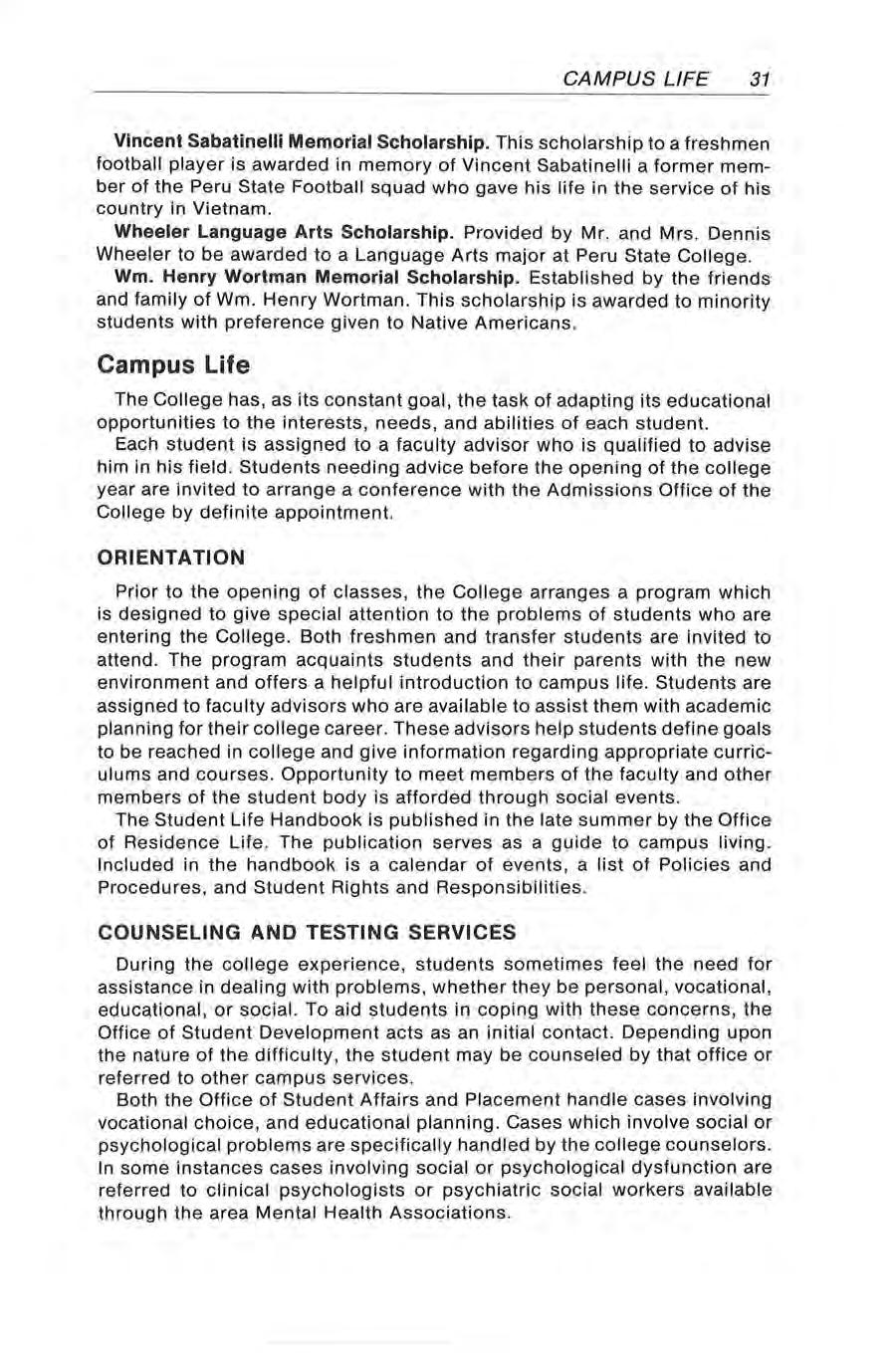
During the college experience, students sometimes feel the need for assistance in dealing with problems , whether they be personal, vocational, educational, or social. To aid students in coping with these concerns, the Office of Student Development acts as an initial contact. Depending upon the nature of the difficulty, the student may be counseled by that office or referred to other campus services
Both the Office of Student Affairs and Placement handle cases involving vocational choice, and educational planning Cases which involve social or psychological problems are specifically handled by the college counselors In some instances cases involving social or psychological dysfunction are referred to clinical psychologists or psychiatric social workers available through the area Mental Health Associations.
In addition to the above services, pastoral counseling is available through the auspices of the United Ministries of Higher Education Students needing tutoring, study skills counseling, or help in developmental reading may be referred to the Communication Skills Center.
The Office of Placement and Career Development routinely administers the American College Testing Program (ACT), the College Level Examination Program (CLEP), and the National Teachers Examination.
The Placement Center at Peru State College offers a wide range of services available to all students and alumni in career preparation. It assists students in contacting employers through campus interviews, job referrals, job-seeking techniques and by supporting their job applications through documentation and records. The Center also provides informal assistance to students leaving the college to seek summer employment or part-time work, by helping them identify potential employers
The career/occupational library in the Center provides students with a background of general and specific information, related to their field of study, for interviewing purposes and graduate study programs. Also it includes assistance in the form of brochures and pamphlets in constructing resumes and letters of application.
Also, in cooperation with the Nebraska Association of Schools, Colleges and University Staffing (NASCUS), there is available the Placement Vacancy Bulletin which is published and mailed to those registered for the service by a centralized program in Lincoln. This centralized service provides not only the vacancies reported to Peru State College but also those reported to other Colleges and Universities in Nebraska.
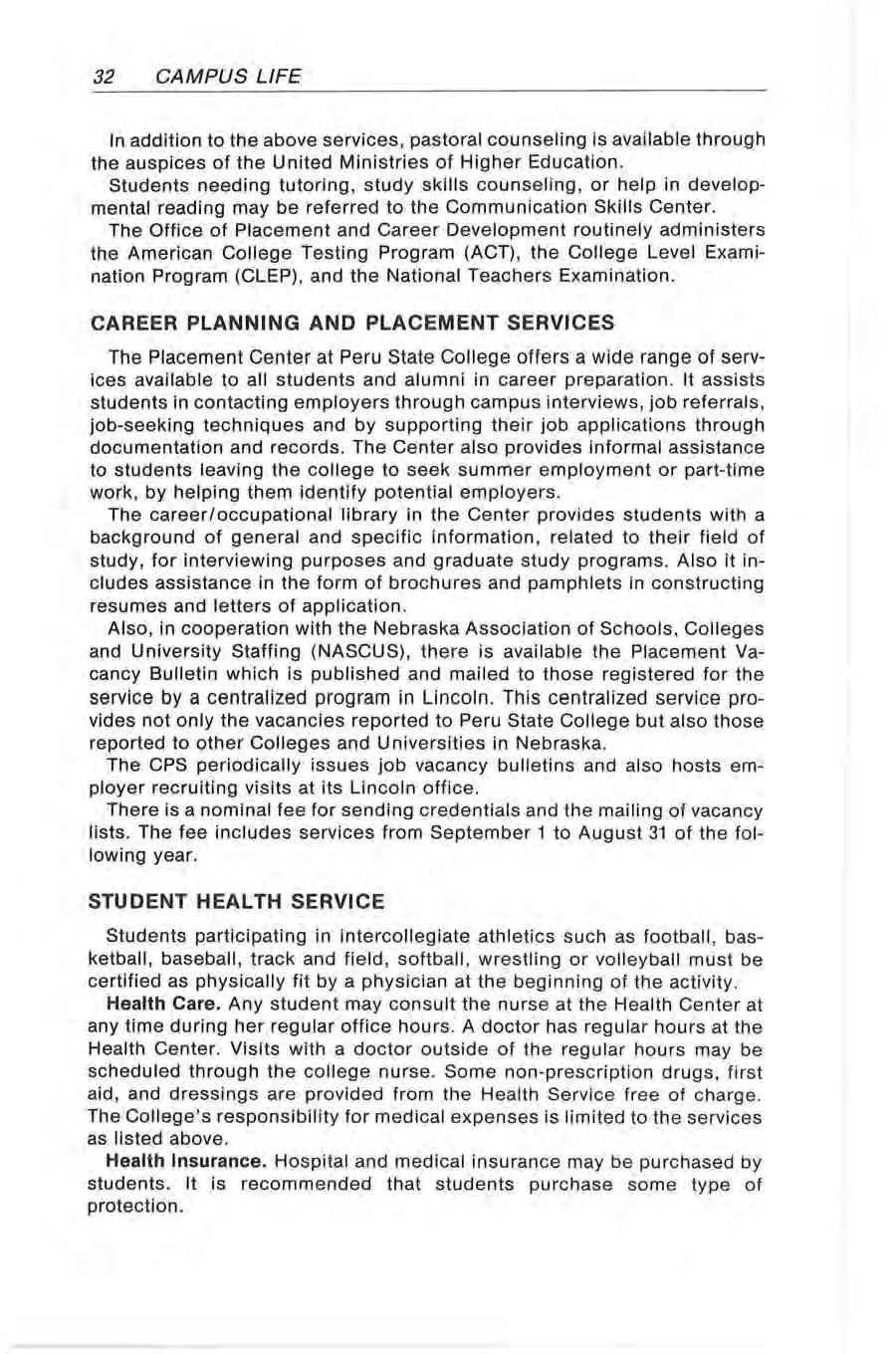
The CPS periodically issues job vacancy bulletins and also hosts employer recruiting visits at its Lincoln office.
There is a nominal fee for sending credentials and the mailing of vacancy lists. The fee includes services from September 1 to August 31 of the following year.
Students participating in intercollegiate athletics such as football, basketball, baseball, track and field, softball, wrestling or volleyball must be certified as physically fit by a physician at the beginning of the activity.
Health Care. Any student may consult the nurse at the Health Center at any time during her regular office hours. A doctor has regular hours at the Health Center. Visits with a doctor outside of the regular hours may be scheduled through the college nurse. Some non-prescription drugs, first aid, and dressings are provided from the Health Service free of charge
The College's responsibility for medical expenses is limited to the services as listed above.
Health Insurance. Hospital and medical insurance may be purchased by students. It is recommended that students purchase some type of protection.
All requests for information concerning living accomodations and requests for room reservations in one of the residence halls should be directed to the Office of Residence Life. A schedule of room and board rates is listed in the Financial Information Section.
Residence Halls Living in a residence hall is not just like living at home. It is an experiment in group behavior where give and take must occur. Therefore, the residence halls have been developed to provide the best possible environment for all variables of student experiences.
There are many advantages to living in the residence halls, the most obvious being the availability of educational and recreational facilities. The library, laboratories , music practice rooms, workrooms, and the recreational centers are only a five to ten minute walk from any residence hall.
Residence hall living affords considerable freedom for students. Parttime para-professional staffing supervise and assist students. Educational and social programs augment the academic program and help students learn to live with other individuals. These programs provide the assistance that a student may need to adjust to the total College environment.
Peru State College offers a variety of alternative living situations from which a student may choose. There are coeducational and noncoeducational halls, various visitation policies, and differences in the physical layout of the halls.
Students are responsible for supplying their own linen and bedding, including pillows and mattress pads Residents are welcome to bring other personal belongings from home such as radios, stereos, etc. Hot plates and air conditioners are not allowed.
The lower level of each hall is equipped with kitchen facilities, washers and dryers, and recreation equipment such as pool and ping pong tables.
All unmarried freshman and sophomore students under the age of 22, except those living with parents or guardians, must live in college residence halls . Exceptions to this will be handled by the College on an individual basis with requests concerning specific terms and conditions of the residence hall contract refer to the Housing Handbook which may be obtained from the Office of Residence Life.
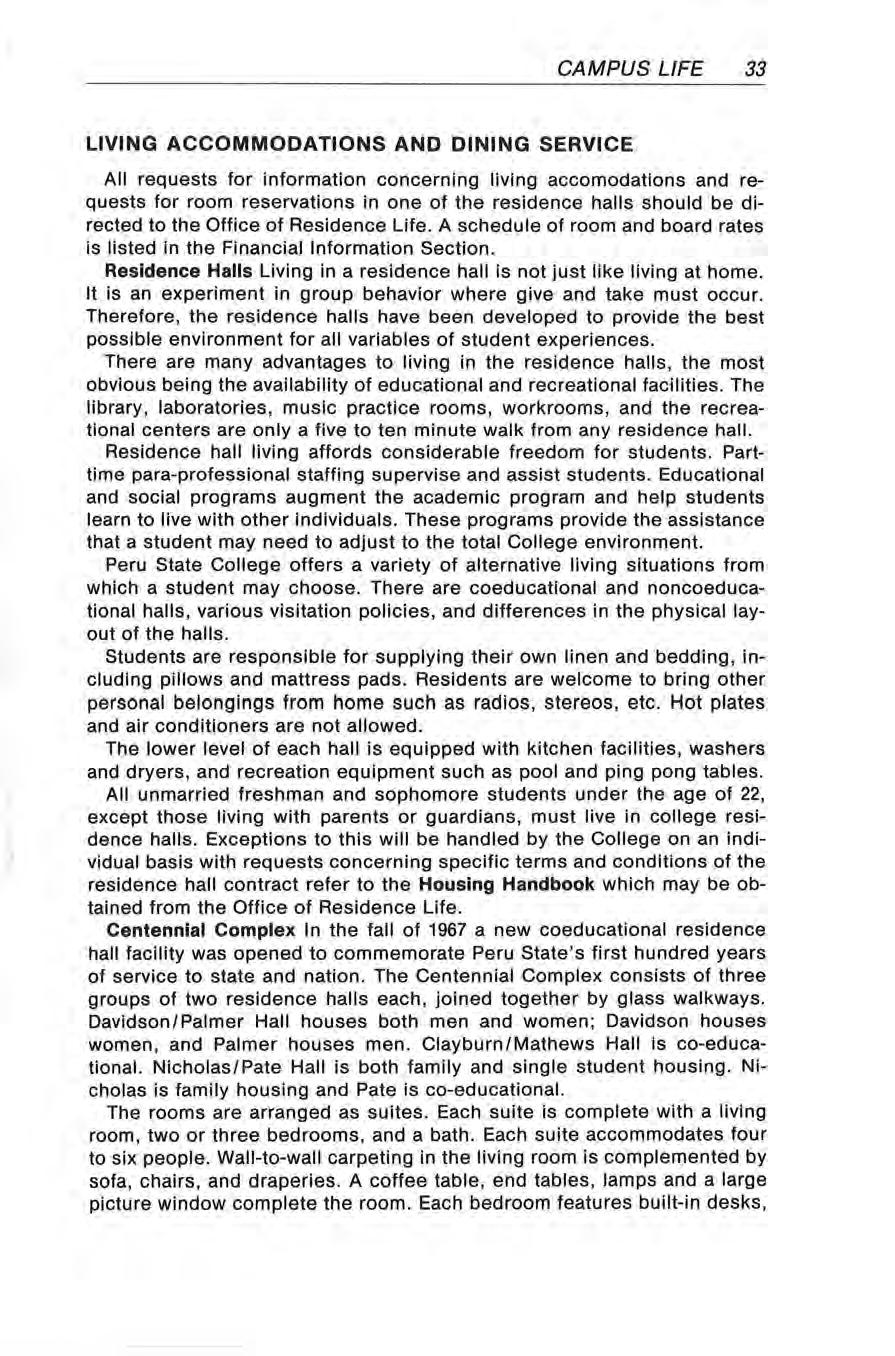
Centennial Complex In the fall of 1967 a new coeducational residence hall facility was opened to commemorate Peru State's first hundred years of service to state and nation. The Centennial Complex consists of three groups of two residence halls each, joined together by glass walkways. Davidson/Palmer Hall houses both men and women; Davidson houses women, and Palmer houses men. Clayburn/Mathews Hall is co-educational. Nicholas/Pate Hall is both family and single student housing. Nicholas is family housing and Pate is co - educational.
The rooms are arranged as suites. Each suite is complete with a living room, two or three bedrooms, and a bath. Each suite accommodates four to six people. Wall-to-wall carpeting in the living room is complemented by sofa, chairs, and draperies. A coffee table, end tables, lamps and a large picture window complete the room. Each bedroom features built-in desks,
study lights, and bookcases, plus twin beds with mattresses and box springs , dressers, chairs , drapes and closets with shelves, providing ample storage space
Delzell Hall Delzell Hall, a Gothic-styled structure , houses approximately 150 men . The spacious living room is furnished with sofas, chairs , a television set, and a fireplace.
There are four floors of rooms arranged as combination sleeping and study rooms. Each room houses two students. A built- in combination dresser and desk, a bookcase, and a bulletin board are furnished each s t udent as well as a metal frame twin bed with box springs and innerspring mattress, draperies , and a waste basket. In addition to a large walk - in closet, a lavatory, and a medicine cabinet, which are shared with the roommate, each student is provided with an individual built-in wardrobe. There is a large shower roqm of ceramic tile and marble centrally located on each floor.
Eliza Morgan Hall Eliza Morgan Hall, located in the northwest corner of the campus was opened in 1929 . The recently renovated "L" shaped building has four floors and houses approximately 170 women. The carpeted living room is furnished with sofas, chairs, and a piano.
All rooms are arranged as combination sleeping and study rooms for two students Each student is furnished with a desk, a metal frame twin bed with box springs, innerspring mattress, and draperies In addition , each student shares with her roommate a large walk-in closet, lavatory , and medicine cabinet. There is a large shower room centrally located on each floor
Married Student Housing Unfurnished one and two bedroom units are available in Oak Hill Housing Each unit is equipped with a stove and a refrigerator
Furnished one and two bedroom apartments are available at the Centennial Complex . Laundry facilities are centrally located for use by all residents.
College operated housing for married students is leased on an annual basis, with the rent payable monthly in advance A deposit is required and is refundable at the end of the lease period provided the property is left in good condition. Inquiries concerning these facilities should be directed to the Office of Residence Life
Majors Hall Conference Center This air conditioned facility is an ennexation to the new physical education building There are three floors of rooms, each room housing two individuals, for a total capacity of 80 occupants. Each room is furnished with draperies, two desks, two metal frame twin beds with box springs, and innerspring mattresses. There is a large shower room centrally located on each floor.
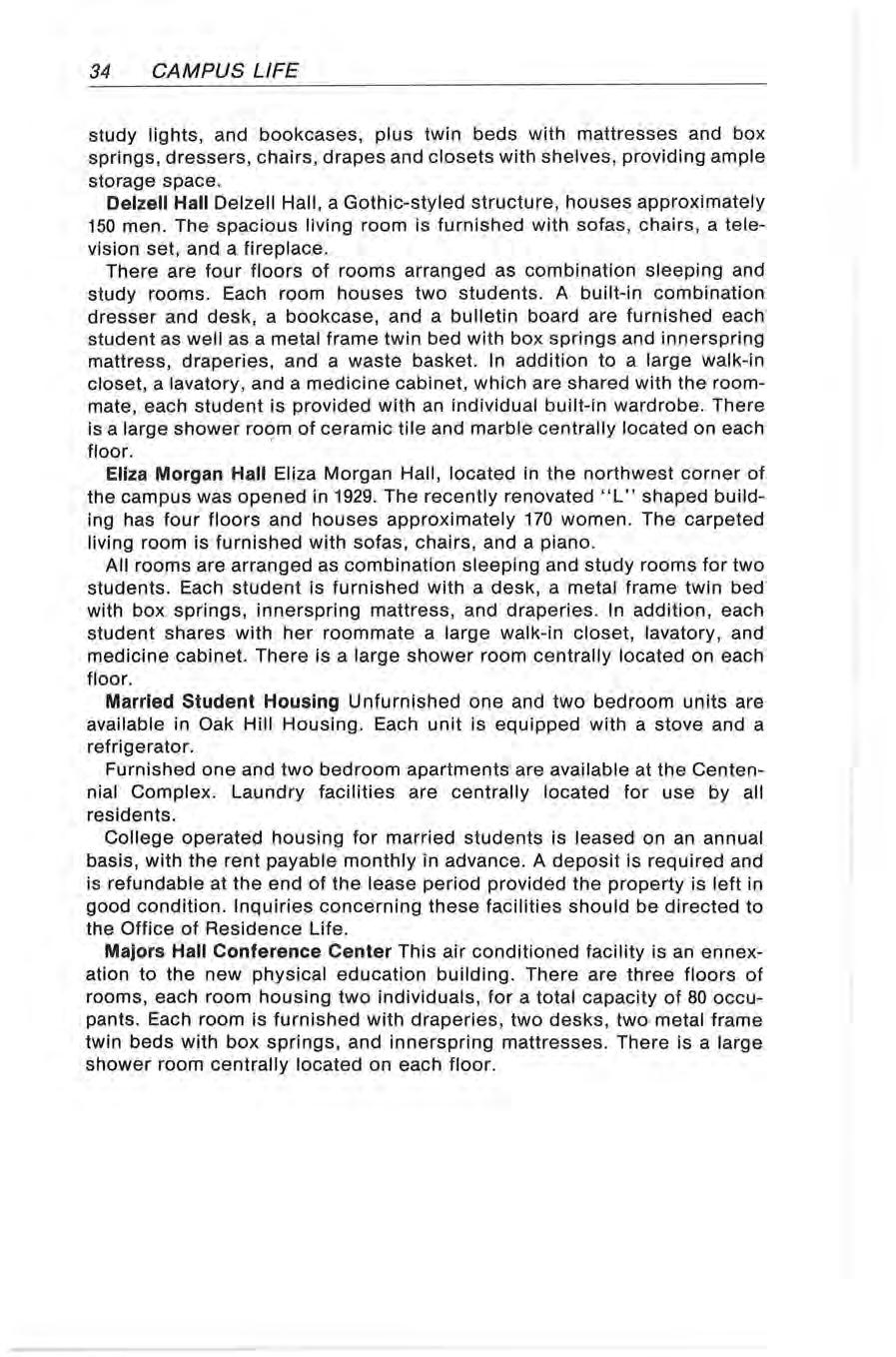
Food Service Air conditioned food service areas are located in the Student Center. The main dining room in the Student Center is open seven days a week for regular meal service to residents of the halls, faculty, staff, guests, and visitors. There are two meal plans for dormitory students (1) Mini Plan-This plan provides for fifteen (15) meals beginning with breakfast on Monday and ending with dinner on Friday. (2) Maxi Plan-This provides for twenty (20) meals, three (3) meals a day, Monday through Saturday, noon dinner and an evening soup and sandwich bar on Sunday.
All meals are nutritiously designed, keeping in mind that variety, appetite appeal and, most importantly, good taste are all key factors in a satisfactory meal.
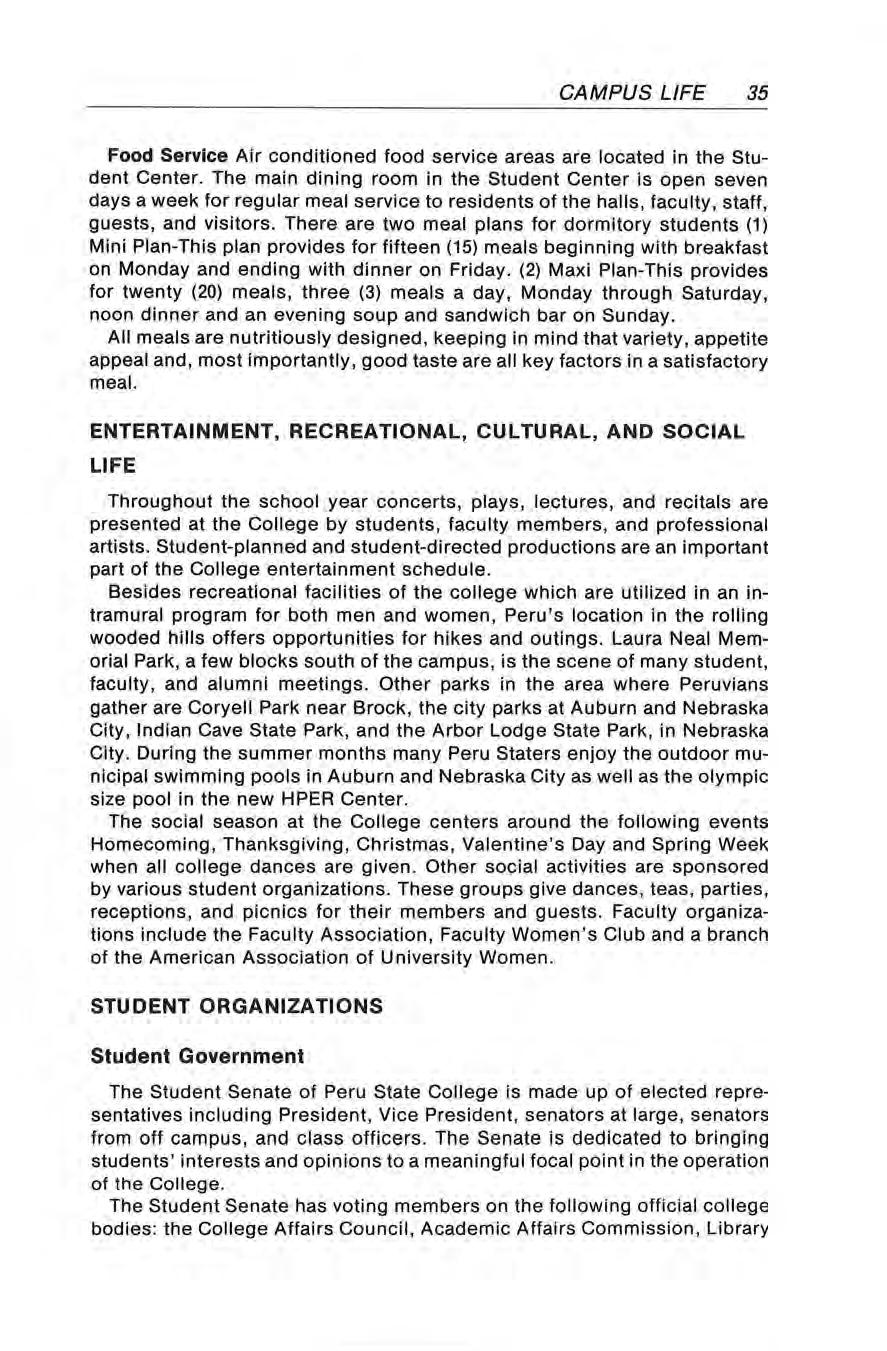
Throughout the school year concerts, plays, lectures, and recitals are presented at the College by students, faculty members, and professional artists . Student-planned and student-directed productions are an important part of the College entertainment schedule.
Besides recreational facilities of the college which are utilized in an intramural program for both men and women, Peru's location in the rolling wooded hills offers opportunities for hikes and outings. Laura Neal Memorial Park, a few blocks south of the campus, is the scene of many student, faculty, and alumni meetings. Other parks in the area where Peruvians gather are Coryell Park near Brock, the city parks at Auburn and Nebraska City, Indian Cave State Park, and the Arbor Lodge State Park, in Nebraska City. During the summer months many Peru Staters enjoy the outdoor municipal swimming pools in Auburn and Nebraska City as well as the olympic size pool in the new HPER Center.
The social season at the College centers around the following events Homecoming, Thanksgiving, Christmas, Valentine's Day and Spring Week when all college dances are given. Other social activities are sponsored by various student organizations. These groups give dances, teas, parties, receptions, and picnics for their members and guests. Faculty organizations include the Faculty Association, Faculty Women's Club and a branch of the American Association of University Women.
The Student Senate of Peru State College is made up of elected representatives including President, Vice President, senators at large, senators from off campus, and class officers. The Senate is dedicated to bringing students' interests and opinions to a meaningful focal point in the operation of the College.
The Student Senate has voting members on the following official college bodies: the College Affairs Council, Academic Affairs Commission, Library
Committee, Teacher Education Committee, Instructional Relations Committee and Student Affairs Commission. Student Senate offices are located in the Old Gymnasium.
RESIDENTAL HALL COUNCILS are representative councils selected by the residents of the men's and women's residence halls, respectively. The governing bodies of the halls handle problems and plan social activities for the residents.
The CIRCLE K CLUB is a Kiwanis-affiliated service organization which is dedicated toward the betterment and advancement of the campus and community.
The PERU PLA YEAS, one of the state's oldest dramatic organizations, throughout its existence has presented to the College community the best in drama.
INDUSTRIAL ARTS CLUB is devoted to promoting interest in the Industrial Arts and Vocational Education. Membership is open to students with an interest in Industrial Arts.
The PERU SOCIAL SCIENCE SOCIETY strives to provide an informal setting for socialization and discussion.
STUDENT EDUCATION ASSOCIATION is an organization for potential teachers. It is affiliated with the Nebraska State Education Association and the National Education Association. The activities of the association are devoted to the improvement of education.

The ENGLISH CLUB promotes the mastery of written expression, encourages worthwhile reading, and fosters a fellowship among students specializing in the English language or literature.
PHI BETA LAMBDA. The local chapter, Epsilon Tau, is a business fraternity affiliated at both the state and national levels. Membership is open to all students interested in business.
DEL TA SIGMA PHI. Men's Greek social organization.
DEL TA KAPPA CHI. Women's Greek letter social organization.
ART CLUB. Social club for Art Majors and students interested in Art.
THE AGRICULTURE CLUB promotes the importance of agriculture to both rural and urban residents.
THE WILDLIFE CLUB promotes the importance of maintaining wildlife in the community.
Three religious groups are available to Peru Staters. These groups are the Fellowship of Christian Athletes, United Ministry to Higher Education (has a house off campus for meetings and social events), and Campus Crusade for Christ.
The PERU CHORUS, open to all students, is devoted to the study and performance of good choral literature.
The BAND PROGRAM is divided into three divisions - the Marching Band, the Concert Band, and the Instrumental Ensembles.
STUDENT M.E.N.C. The Student Chapter of the Nebraska Music Educators Association and the Music Educators National Conference is open to all students interested in music. The club sponsors instrumental and vocal clinics and other musical productions annually.
The "P" CLUB membership is made up of Peru State College students who have lettered in any intercollegiate sport. The fostering of good sportsmanship is the club's purpose.
The WOMEN'S ATHLETIC ASSOCIATION is open to students interested in women's physical education and athletics.
The FELLOWSHIP OF CHRISTIAN ATHLETES (FCA) is an organization open to all student-athletes interested in sharing their belief in God.
PERU STATE COLLEGE CHEERLEADERS are chosen after a tryout before a panel of faculty and staff. They lead chants and boost spirit at athletic events.
ALPHA CHI, national honor society, recognizes academic scholarship, good reputation and character. Honorees are selected from the top ten percent of both the juniors and senior classes .
ALPHA MU OMEGA, honorary mathematics fraternity, aims to develop and promote interest in the study of mathematics. Students who have or are currently enrolled in analytical geometry with above average grades in mathematics are eligible for membership.
EPSILON Pl TAU, honorary professional fraternity for education in Technology, selects students of junior or senior standing based on grade point average in the industrial arts as well as a specified average grade in other fields.
KAPPA DEL TA Pl, a national honorary education fraternity, is open to men and women of junior standing ranking in the upper quintile of the class and who show evidence of a continued interest in the field of education.
PHI ALPHA THETA, national honorary history fraternity, is open to those of high scholastic standing who have more than 12 hours history.
SIGMA TAU DEL TA, national honorary English fraternity was granted the Phi Alpha Chapter of Peru State College a charter in 1926 Students who demonstrate an interest in literature and creative writing, and who are above average in scholarship are eligible for membership. The local fraternity aids the English Club in publishing Sifting Sands.
BETA BETA BETA, professional honorary biology fraternity, is open to juniors and seniors whose field of concentration is biological science. Candidates for membership must be above average in scholarship and must plan to make biology their permanent interest.
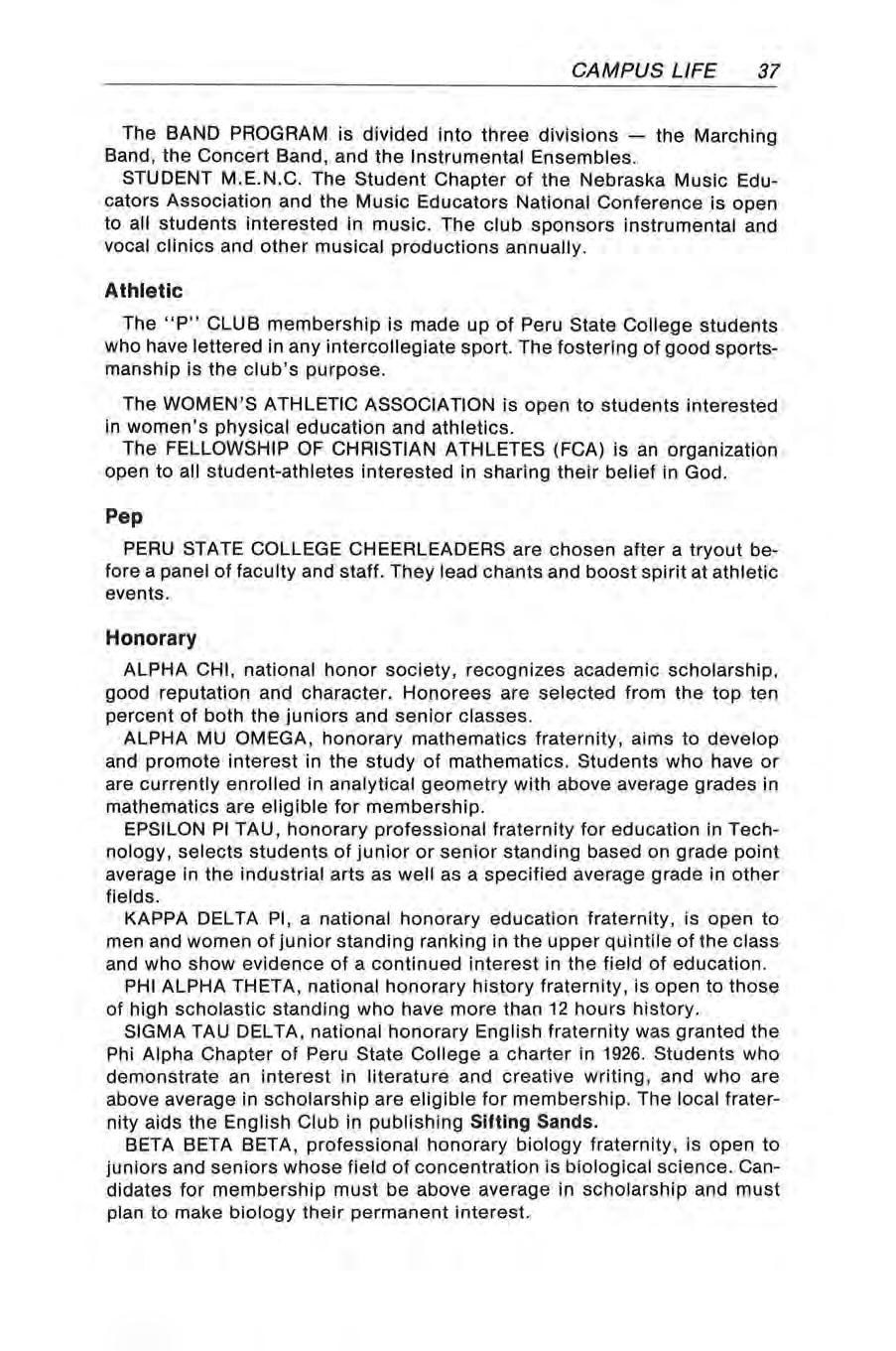
LAMBDA DEL TA LAMBDA is an honorary fraternity for all people who are interested in physical science.
WHO'S WHO Among Students in American Universities and Colleges annually determines the number of students with senior standing in the College who may be selected for this honor. These honorees are selected by a committee of students and faculty on the basis of scholarship, leadership and participation in academic and extracurricular activities, citizenship and service to the College, and promise of future usefulness in business and society.
The Pe dagogian is the official college newspaper. It is published during the academic year under the supervision of the journalism instructor Although contributions are welcomed, the majority of the writing and editing is done by the students in journalism classes.
Th e Student Life Handbook is published in the late summer by the Office of Student Development. The publication serves as a guide to campus living for all students
Sifting Sands is a magazine of student writing published each spring by the English Club and Sigma Tau Delta .
Each student is expected to conduct himself in accordance with the regulations of the college and such laws of the City, State , and Federal Governments as apply to matters of personal conduct.
The College reserves the right to exclude at any time students whose conduct is deemed undesirable or injurious to the best interests of the College, or of the student.
For detailed information regarding student conduct, see Student Rights and Responsibilities and other information contained in the Student Life Handbook.
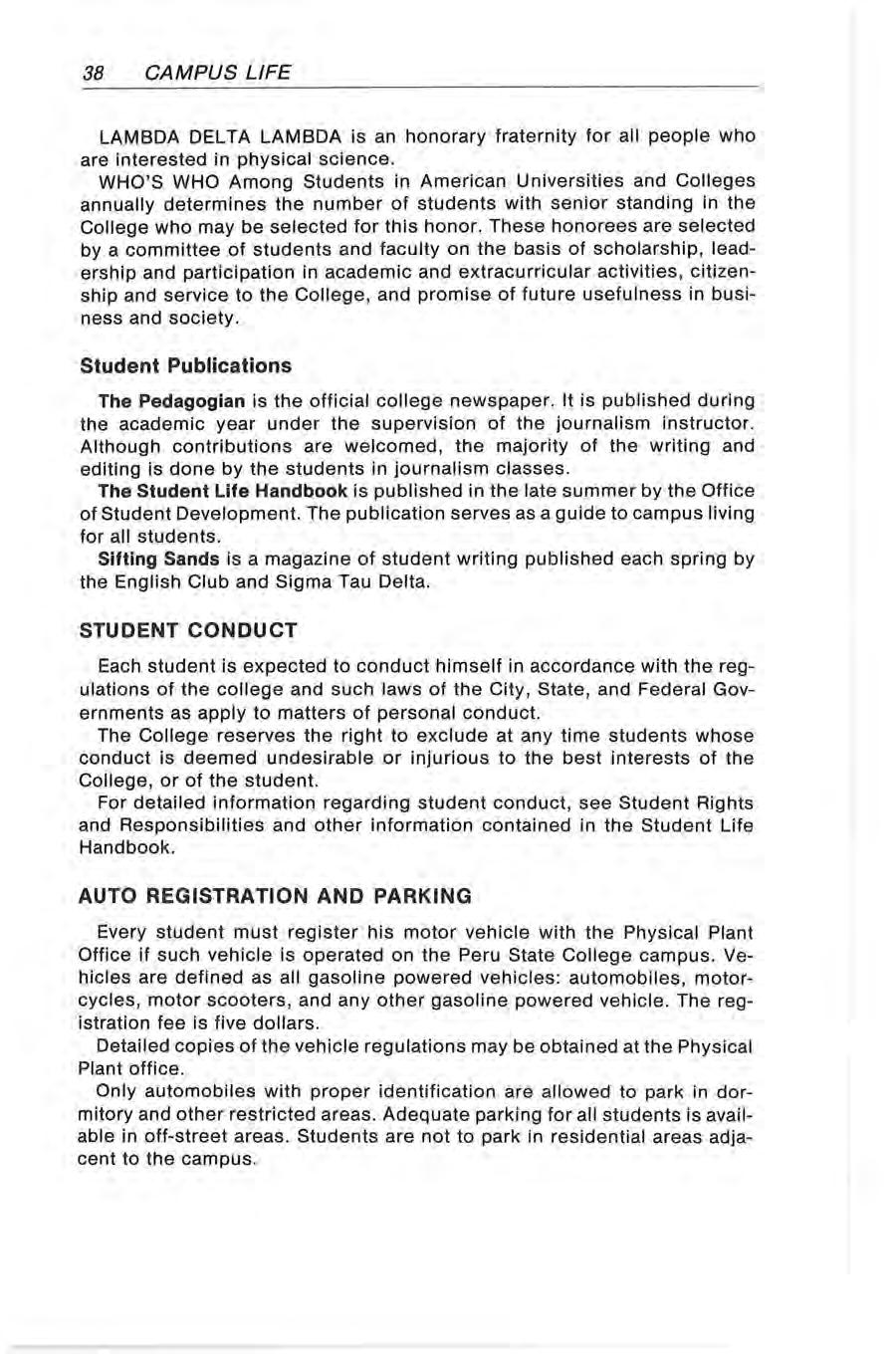
Every student must register his motor vehicle with the Physical Plant Office if such vehicle is operated on the Peru State College campus Vehicles are defined as all gasoline powered vehicles : automobiles, motorcycles , motor scooters, and any other gasoline powered vehicle. The registration fee is f ive dollars.
Detailed copies of the vehicle regulations may be obtained at the Physical Plant office
Only automobiles with proper identification are allowed to park in dormitory and other restricted areas. Adequate parking for all students is available in off-street areas Students are not to park in residential areas adjacent to the campus
The College is supported by the State of Nebraska for the purpose of meeting the educational needs at the Post-secondary level for the citizens of the State. The College is a multi-purpose regional institution with a broad variety of programs in general liberal arts, teacher education, and a variety of pre-professional programs culminating in the Bachelor of Arts, Bachelor of Science, a Bachelor of Technology degree or the Associate of Arts degree in Early Childhood Education . The College also provides programs of instruction for adults in learning centers throughout southeast Nebraska.
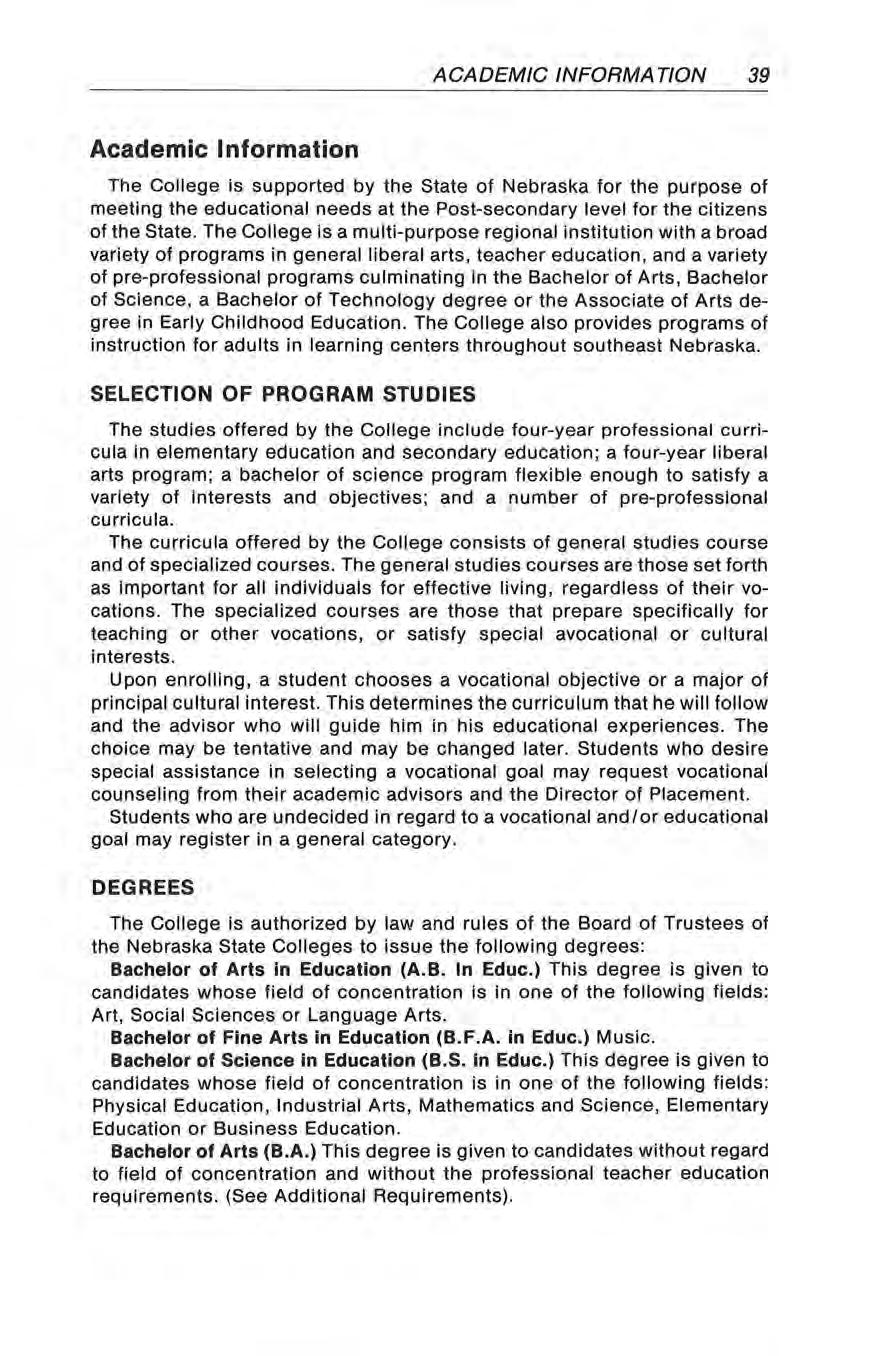
The studies offered by the College include four-year professional curricula in elementary education and secondary education; a four-year liberal arts program; a bachelor of science program flexible enough to satisfy a variety of interests and objectives; and a number of pre-professional curricula.
The curricula offered by the College consists of general studies course and of specialized courses. The general studies courses are those set forth as important for all individuals for effective living, regardless of their vocations. The specialized courses are those that prepare specifically for teaching or other vocations, or satisfy special avocational or cultural interests.
Upon enrolling, a student chooses a vocational objective or a major of principal cultural interest. This determines the curriculum that he will follow and the advisor who will guide him in his educational experiences. The choice may be tentative and may be changed later Students who desire special assistance in selecting a vocational goal may request vocational counseling from their academic advisors and the Director of Placement. Students who are undecided in regard to a vocational and/or educational goal may register in a general category.
The College is authorized by law and rules of the Board of Trustees of the Nebraska State Colleges to issue the following degrees:
Bachelor of Arts in Education (A.B. In Educ.) This degree is given to candidates whose field of concentration is in one of the following fields: Art, Social Sciences or Language Arts.
Bachelor of Fine Arts in Education (B.F.A. in Educ.) Music.
Bachelor of Science in Education (B.S. in Educ.) This degree is given to candidates whose field of concentration is in one of the following fields : Physical Education, Industrial Arts, Mathematics and Science, Elementary Education or Business Education.
Bachelor of Arts (B.A.) This degree is given to candidates without regard to field of concentration and without the professional teacher education requirements. (See Additional Requirements).
Bachelor of Science (B.S.) This degree is granted to candidates without regard to field of concentration and without the professional teacher education requirements.
Bachelor of Technology. This is an alternative degree for candidates who transfer from other institutions, having completed a prescribed one or twoyear technical program. Students may elect to meet requirements for this degree rather than the usual requirements for the B A or B.S. (See special requirements)
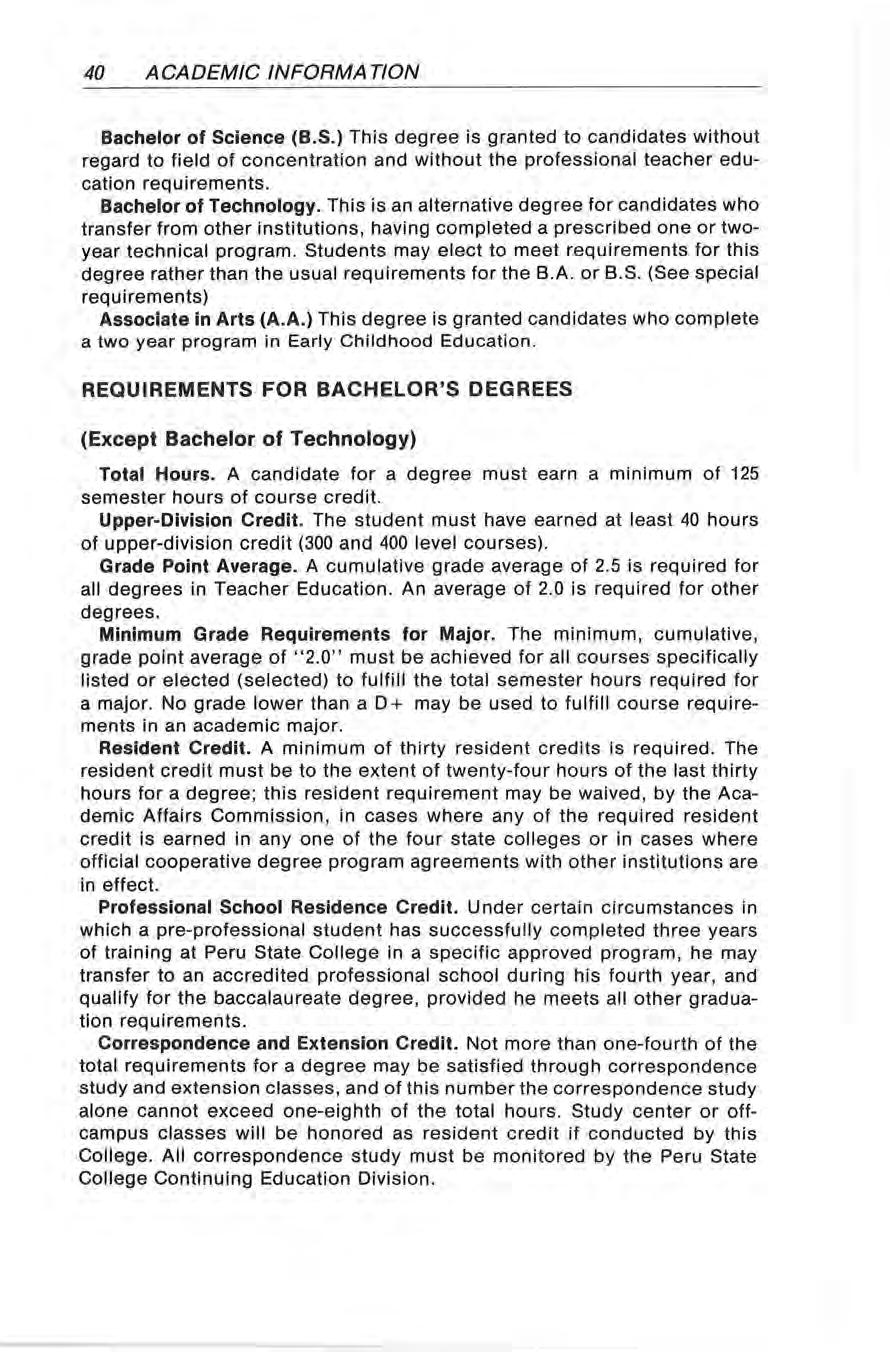
Associate in Arts (A.A.) This degree is granted candidates who complete a two year program in Early Childhood Education
Total Hours. A candidate for a degree must earn a minimum of 125 semester hours of course credit.
Upper-Division Credit. The student must have earned at least 40 hours of upper-division credit (300 and 400 level courses).
Grade Point Average. A cumulative grade average of 2.5 is required for all degrees in Teacher Education An average of 2.0 is required for other degrees
Minimum Grade Requirements for Major. The minimum, cumulative, grade point average of "2.0" must be achieved for all courses specifically listed or elected (selected) to fulfill the total semester hours required for a major . No grade lower than a D + may be used to fulfill course requirements in an academic major
Resident Credit. A minimum of thirty resident credits is required. The resident credit must be to the extent of twenty-four hours of the last thirty hours for a degree; this resident requirement may be waived, by the Academic Affairs Commission, in cases where any of the required resident credit is earned in any one of the four state colleges or in cases where official cooperative degree program agreements with other institutions are in effect.
Professional School Residence Credit. Under certain circumstances in which a pre-professional student has successfully completed three years of training at Peru State College in a specific approved program, he may transfer to an accredited professional school during his fourth year, and qualify for the baccalaureate degree, provided he meets all other graduation requirements.
Correspondence and Extension Credit. Not more than one-fourth of the total requirements for a degree may be satisfied through correspondence study and extension classes, and of this number the correspondence study alone cannot exceed one-eighth of the total hours. Study center or offcampus classes will be honored as resident credit if conducted by this College. All correspondence study must be monitored by the Peru State College Continuing Education Division .
Major. Each degree candidate must complete the general studies program, a major (Teacher education candidates must complete one field endorsement or two subject endorsements.), and supporting courses in keeping with his educational objective .
Independent Study. A maximum of six (6) hours of Independent Study counts toward graduation.
Normal Progress. To maintain normal progress a student must complete the graduation requirements as outlined in a catalog issued not more than seven years previous to the end of the term in which the student expects to complete his work. In case normal progress is not maintained, the student will be expected to follow requirements in the current catalog.
Application for Degrees. Each candidate upon enrolling for the final course requirements in a semester or term, shall complete an application through the Registrar's office setting forth the degree(s), major(s) and payment of fee for graduation . This application must be completed within the first five weeks of the semester or within the first two weeks of the first summer session.
Students who elect to change their major at a point beyond the sophomore year should be aware of the probability of their graduation date being extended Also, it may be necessary for the student to follow the requirements in the current bulletin, rather than the one in effect at the time the student was admitted to the college in pursuit of a degree program
Academic Progress forms are maintained to guide and record the student's progress toward his graduation. Two copies are maintained, one by the Registrar's office and the second by the student. The accuracy of each registration and the completion of all requirements are the responsibility of the student.
In general, students will follow the graduation requirements as outlined in the bulletin current at the time of their admission to the college in pursuit of a degree program. Students whose progress toward a degree has been irregular or interrupted to a point where normal progress has not been maintained will meet the requirements of graduation in the most recent bulletin Students for whom a progress sheet has been made, and who are making normal progress toward a degree, will continue in their original bulletin.

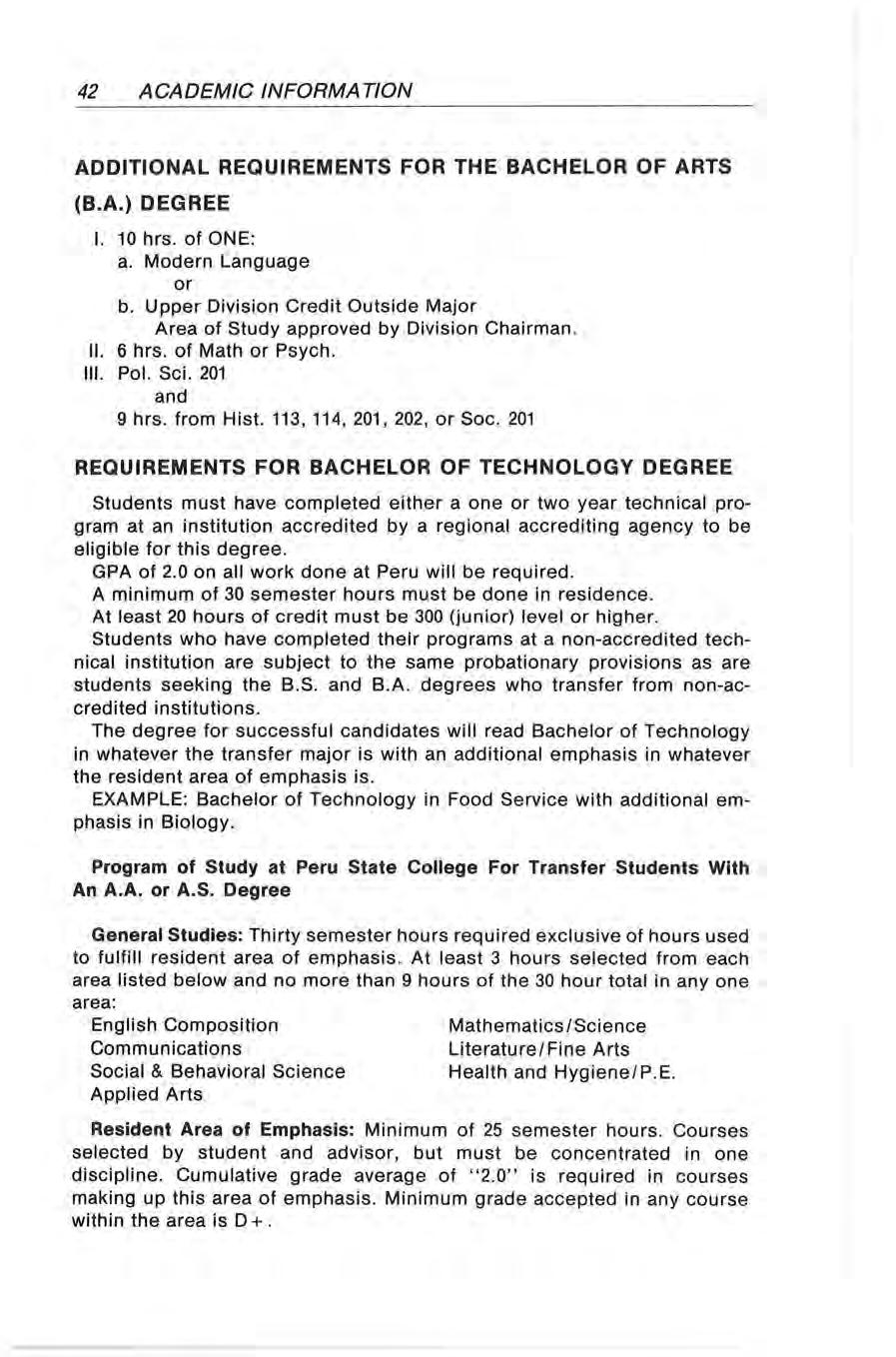
I. 10 hrs . of ON E :
a. Modern Language or
b. Upper Division Credit Outside Major Area of Study approved by Division Chairman.
II. 6 hrs. of Math or Psych
Ill. Pol. Sci. 201 and
9 hrs from Hist. 113, 114 , 201, 202, or Soc 201
Students must have completed either a one or two year technical program at an institution accredited by a regional accrediting agency to be eligible for this degree.
GPA of 2.0 on all work done at Peru will be required .
A minimum of 30 semester hours must be done in residence.
At least 20 hours of credit must be 300 (junior) level or higher.
Students who have completed their programs at a non-accredited technical institution are subject to the same probationary provisions as are students seeking the B.S. and B.A. degrees who transfer from non-accredited institutions .
The degree for successful candidates will read Bachelor of Technology in whatever the transfer major is with an additional emphasis in whatever the resident area of emphasis is.
EXAMPLE: Bachelor of Technology in Food Service with additional emphasis in Biology
Program of Study at Peru State College For Transfer Students With An A.A. or A.S. Degree
General Studies: Thirty semester hours required exclusive of hours used to fulfill resident area of emphasis . At least 3 hours selected from each area listed below and no more than 9 hours of the 30 hour total in any one area:
English Composition Communications
Social & Behavioral Science
Applied Arts
Mathematics/ Science
Literature/Fine Arts
Health and Hygiene/P.E.
Resident Area of Emphasis: Minimum of 25 semester hours Courses selected by student and advisor, but must be concentrated in one discipline. Cumulative grade average of " 2.0" is required in courses making up this area of emphasis. Minimum grade accepted in any course within the area is D +
Transfer Technical Major: 60 semester hours maximum. This is the maximum number of hours from the A.A or A.S. degree applicable toward the 125 hours required for the Bachelor of Technology Degree.
Directed Electives to Total 125 Hours: Hours may be selected from general studies beyond the required 30 hours; additional courses supportive of the resident area of emphasis or the transfer technical major, or others as directed by the advisor.
Program of Study at Peru State College For Transfer Students Who Have Completed A Designated One Year Program General Studies: Thirty semester hours required exclusive of hours used to fulfill resident area of emphasis At least three hours selected from each area listed below and no more than 9 hours of the 30 hour total in any one area.
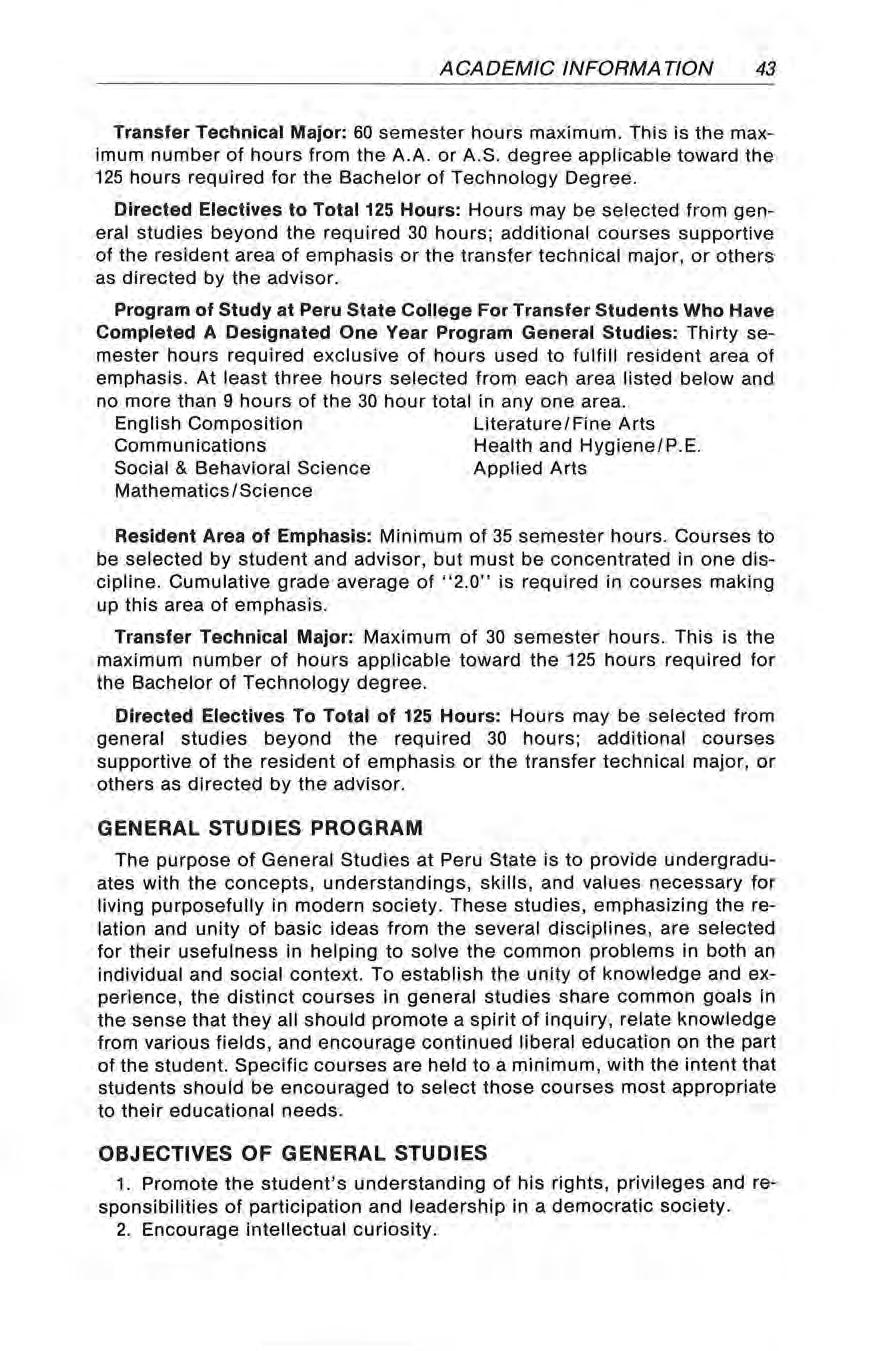
English Composition
Literature/Fine Arts
Communications Health and Hygiene/P.E.
Social & Behavioral Science
Mathematics /Science
Applied Arts
Resident Area of Emphasis: Minimum of 35 semester hours. Courses to be selected by student and advisor, but must be concentrated in one discipline Cumulative grade average of "2.0" is required in courses making up this area of emphasis
Transfer Technical Major: Maximum of 30 semester hours This is the maximum number of hours applicable toward the 125 hours required for the Bachelor of Technology degree.
Directed Electives To Total of 125 Hours: Hours may be selected from general studies beyond the required 30 hours; additional courses supportive of the resident of emphasis or the transfer technical major, or others as directed by the advisor.
The purpose of General Studies at Peru State is to provide undergraduates with the concepts, understandings, skills, and values necessary for living purposefully in modern society . These studies, emphasizing the relation and unity of basic ideas from the several disciplines, are selected for their usefulness in helping to solve the common problems in both an individual and social context. To establish the unity of knowledge and experience, the distinct courses in general studies share common goals in the sense that they all should promote a spirit of inquiry, relate knowledge from various fields, and encourage continued liberal education on the part of the student. Specific courses are held to a minimum, with the intent that students should be encouraged to select those courses most appropriate to their educational needs.
1. Promote the student's understanding of his rights, privileges and responsibilities of participation and leadership in a democratic society .
2. Encourage intellectual curiosity.
3 Increase the student's ability to apply abstract knowledge to practical and concrete situations.
4. Provide the opportunity to understand his interaction with his environment.
5. Provide opportunity to develop physical, social and emotional maturity.
6. Increase the student's ability to read and listen with critical comprehension.
7. Increase his ability to convey ideas, feelings and/or experiences to others with clarity.
8. Provide the opportunity to establish educational and vocational goals.
9. Encourage the growth of desirable leisure time activities .

Courses may be used in only one category to satisfy the General Studies Program requirements.
HUMANISTIC LEARNING· 15-16 hours
Lib Sci. 100 (1) Introduction to Media and Library English Composition (6 hours)
(Students who rank at the 85th percentile or higher on the English portion of the ACT test may waive the Eng. 101 requirement.)
Eng. 101(3) English Composition
Eng 302(3) English Composition
Literature (3)
'Eng. 202(3) Appreciation of Literature
Eng 318(3) Neo-Classical Writers
Eng 323(3) Victorian Period
Eng 325(3) American Literature II
'Required of all Teacher Education Students
Communications (3)
Speh. 152(3)
Speh. 254(3)
Journ 260(3)
Fine Arts (2-3)
Fundamentals of Speech Public Speaking Broadcast Journalism
Art 306(2) Art Appreciation
Art 317(3) Art History I
Art 318(3) Art History II
Mus. 311(2) Music Appreciation and History of Music
Mus. 406(3) History of Music
SOCIAL LEARNING - 16-17 hours
Social and Behavioral Science (12 hours) (No more than 6 hours in history)
Econ. 333(3) Economic History of the U.S.
'Geog. 101(3) Principles of Physical Geography
Geog 103(3) Cultural Geography
'Hist. 113(3) History of the U.S. to 1865
'Hist. 114(3) History of the U.S. Since 1865
Hist. 201(3) World Civilization to 1500
Hist. 202(3) World Civilization Since 1500
Hist. 455(3) Twentieth Century Russia
Hist. 303(3) The U S in the 20th Century
Hist. 467 or
Pol.Sci. 467(3) Far East
courses offered at learning centers in service area, and (4) a variety of residential workships, seminars and courses offered in the Majors Hall Conference Center.
External degree programs are offered on the Southeast Community College Beatrice and Fairbury campuses. Students may take as many as sixtysix hours of credit with Southeast Community College before transferring into the Peru State College program for the completion of their degrees. Peru State College offers the remaining courses needed for the degrees on the Southeast campus at Fairbury and Beatrice, making use of both resident and adjunct faculty, so that students may complete the B.S. d~gree granted by Peru State College without actual residency on the Peru campus. However, students from those campuses are also offered the option of coming to the Peru campus if they so desire. A Transfer Handbook serves as a guide for both student and advisor, listing the equivalencies of courses offered by both institutions and also listing the specific course requirements for each degree, as well as outlining the procedures for admission, registration, tuition and fees, and other matters relevant to acceptance into the program. Students in this external degree program, who upon entering Peru State College already have a significant amount of credit hours toward their major, will have their transcripts reviewed by the appropriate chairperson in consultation with the Vice President to determine a possible requirement of 16-15 hours in designated coursework within that division to be taken from Peru College.
In cooperation with the Offutt Air Force Base Education Office, Peru State College offers a series of courses leading to the Associate of Arts degree in Early Childhood Education, the Bachelor of Technology degree, and Professional education courses leading to certification at both the elementary and secondary level.
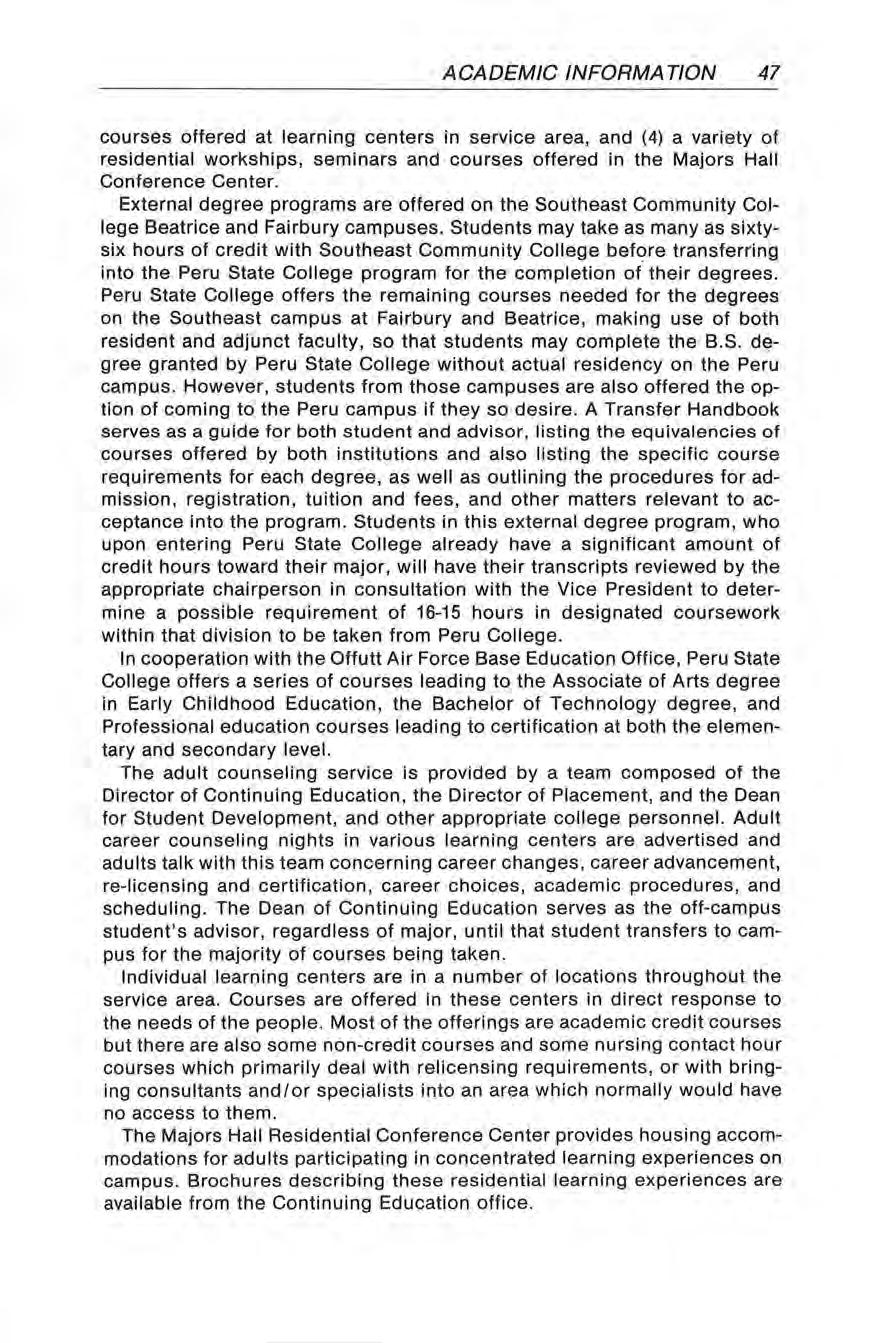
The adult counseling service is provided by a team composed of the Director of Continuing Education, the Director of Placement , and the Dean for Student Development, and other appropriate college personnel. Adult career counseling nights in various learning centers are advertised and adults talk with this team concerning career changes, career advancement, re-licensing and certification, career choices, academic procedures, and scheduling. The Dean of Continuing Education serves as the off-campus student's advisor, regardless of major, until that student transfers to campus for the majority of courses being taken.
Individual learning centers are in a number of locations throughout the service area. Courses are offered in these centers in direct response to the needs of the people Most of the offerings are academic credit courses but there are also some non-credit courses and some nursing contact hour courses which primarily deal with relicensing requirements, or with bringing consultants and/or specialists into an area which normally would have no access to them.
The Majors Hall Residential Conference Center provides housing accommodations for adults participating in concentrated learning experiences on campus. Brochures describing these residential learning experiences are available from the Continuing Education office.
For specific listings of courses and their locations, a Schedule of Classes brochure is printed each fall, spring, and summer term. All courses are monitored for quality control in order to maintain a consistency with campus quality. The Continuing Education Division maintains offices in the Education Building, and is staffed five days per week, 8:00 a.m. to 5:00 p.m. Telephone 872-3815, extension 241 or 201. For information about specific courses and/or registration, toll free numbers are provided - (Nebr-800742-4412) ( out-of-state-800-228-8811)
Continuing Education Scholastic Standards. Institutional scholastic standards as outlined in the college catalog shall be applied to students working through the Continuing Education program who have applied and been accepted for admission to the college in the pursuit of a bachelor's degree/associate dgree. Following acceptance for admission, the student's cumulative grade point average will be examined for purposes of meeting scholastic standards at intervals of each fifteen semester hours attempted until the completion of the degree.
Students meeting the above requirements are also eligible for the honor roll in any semester in which they have completed twelve or more semester hours with Peru State College.
Summer Session. A 10-week summer session is divided into two fiveweek terms. Students may take a maximum of 15 semester hours during the ten week session, with at maximum of 9 hours in one five week session. Courses are available which make it possible for a recent high school graduate to begin his post secondary education during the summer. Request for information concerning the summer session and summer school bulletin should be directed to the Director of Summer Sessions.
A number of workshops are scheduled during both summer sessions. Workshops are normally scheduled to run four days, for each credit hour.
A separate summer schedule listing all courses and workshops is published each spring semester. Contact the Director of Summer Sessions, Peru State College for a copy.
In the Spring Semester of 1983-84 Peru State College began offering televised courses for credit on a state-wide basis. These courses, which are counted as resident credit, will be offered each spring, summer, fall. For current informaion on televised course offerings, contact Mr. Paul Kruse on the toll free number - 800-742-4412 in Nebraska and 800-228-8811 out-ofstate .
This implies attainment beyond the minimum for admission to the College. The status may be acquired by (1) presenting work completed in another college; (2) demonstrating proficiency in a certain field, thus removing the requirement of certain prerequisites. The latter may be with or without credit.
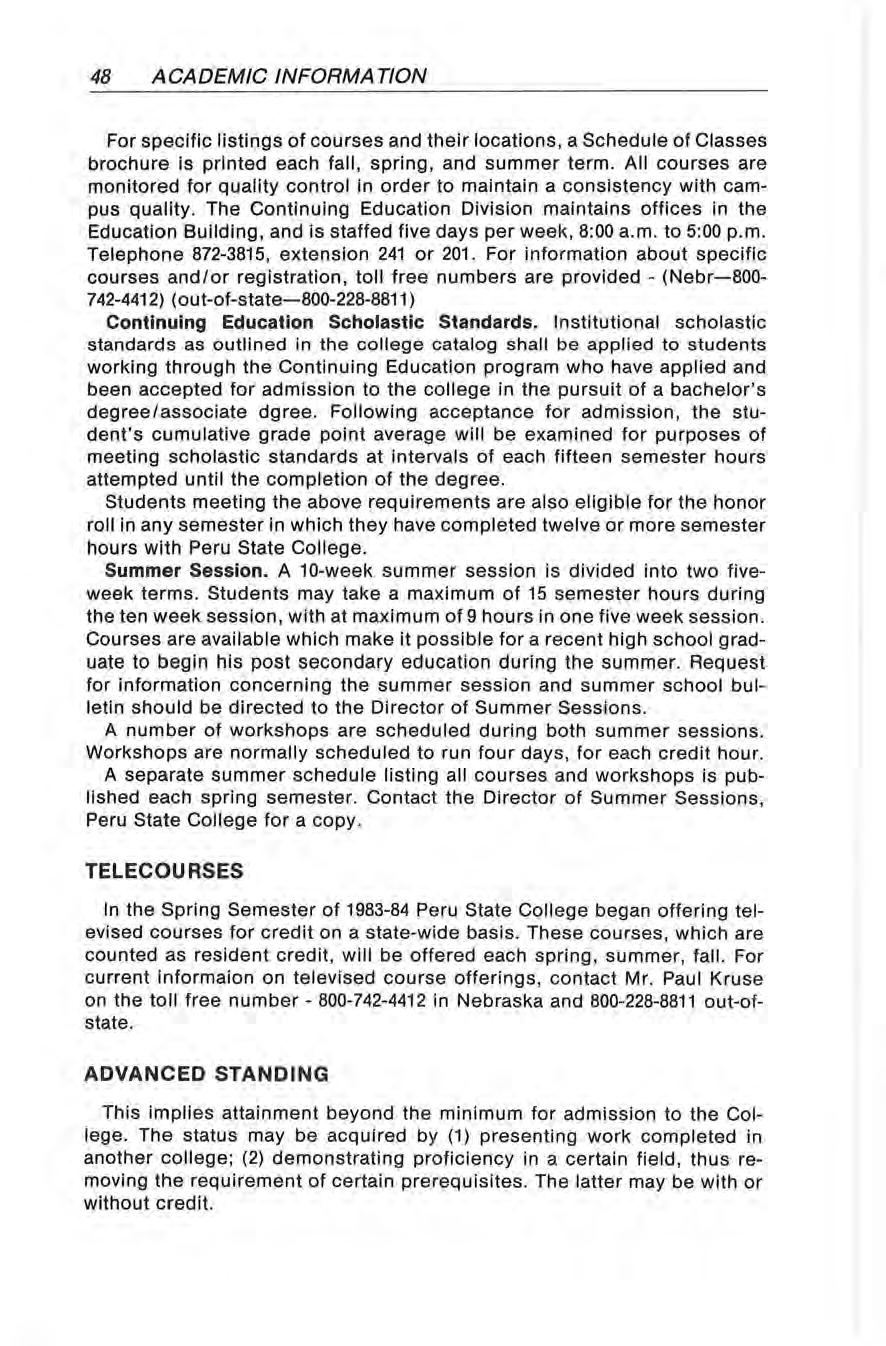
The following are minimum standards for all internships offered. Divisions may impose additional standards.
A. A minimum of forty clock hours of on the job experience is required for each semester hour of credit.
8. The agency supervisor is expected to oversee the student at least twenty percent of the work time each week
C. A college supervisor is to observe the students a minimum of one clock hour for each semester hour.
D No direct classroom time is specified.
Peru State College will accept in transfer credit earned at another accredited college or university. The official transcript from the sending institution must report in credit hours. Credit earned on an interim basis at another college while essentially a student at Peru State College , provided prior approval has been received from the appropriate division chairperson, is also applicable to this policy. Required forms are available at the Registrar ' s Office.
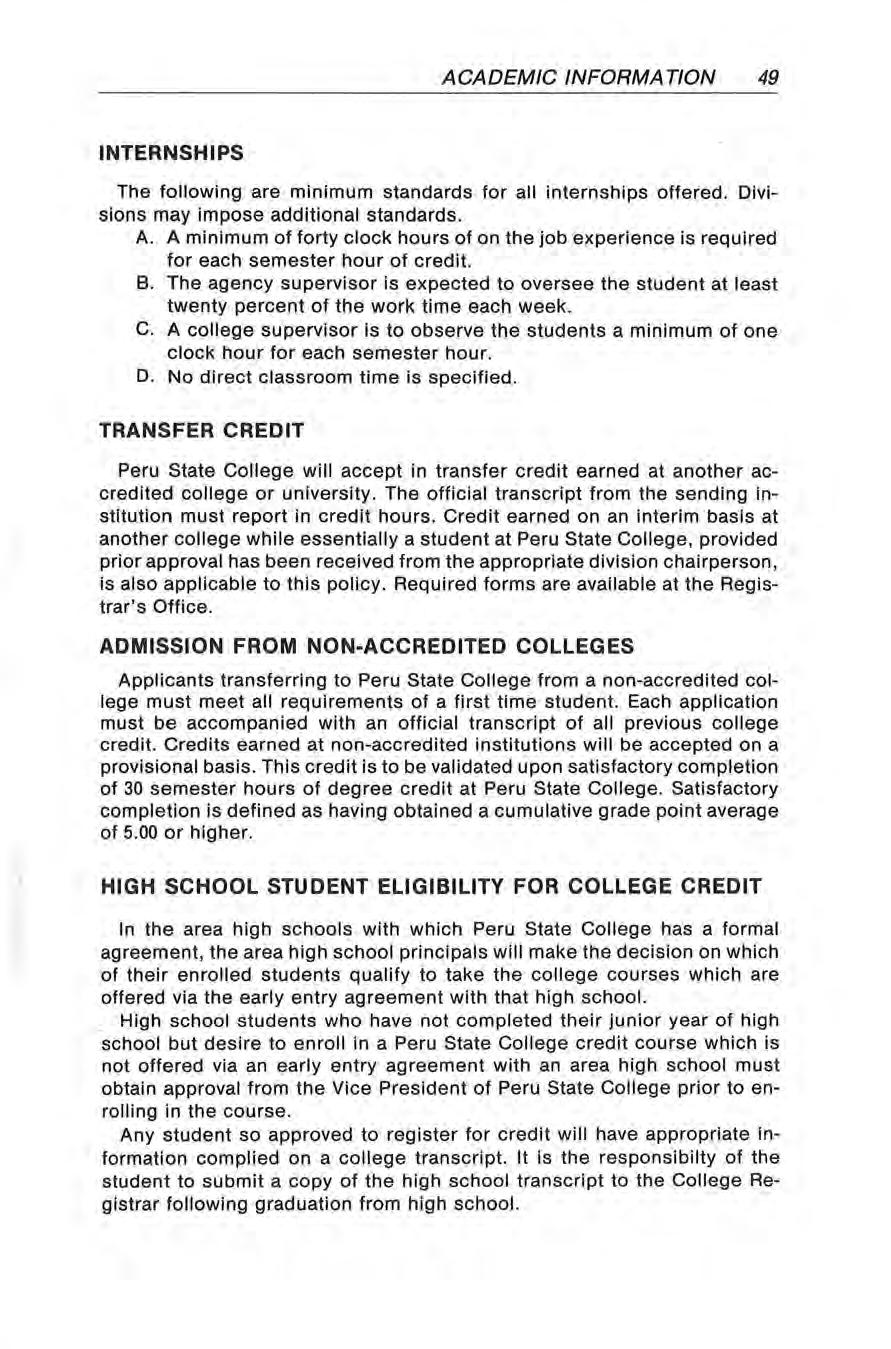
Applicants transfer r ing to Peru State College from a non-accredited college must meet all requirements of a first time student. Each application must be accompanied with an official transcript of all previous college credit. Credits earned at non - accredited institutions will be accepted on a provisional basis. This credit is to be validated upon satisfactory completion of 30 semester hours of degree credit at Peru State College. Satisfactory completion is defined as having obtained a cumulative grade point average of 5.00 or higher.
In the area high schools with which Peru State College has a formal agreement, the area high school principals will make the decision on which of their enrolled students qualify to take the college courses which are offered via the early entry agreement with that high school.
High schoo·I students who have not completed their junior year of high school but desire to enroll in a Peru State College credit course which is not offered via an early entry agreement with an area high school must obtain approval - from the Vice President of Peru State College prior to enrolling in the course .
Any student so approved to register for credit will have appropriate information complied on a college transcript. It is the responsibilty of the student to submit a copy of the high school transcript to the College Registrar following graduation from high school.
A veteran of the armed forces who has received an honorable discharge from active duty will generally be granted credit for his military experiences in accordance with the recommendations of the American Council on Education.
Peru State College's Policy on awarding college credit based on examination (for those who have not participated in scheduled course work) is as follows:
Credit hours generated through approved procedure for determining extra-institutional learning shall be considered transfer credits, and the same transfer of credit policies that pertain to similar or dissimilar institutions will be applied.
A maximum of 66 semester· hours, individually or collectively may be applicable to the 125 semester hour minimum required for a bachelors degree, unless otherwise specified .
You may receive credit hours in a single subject only once. Taking a similar subject test in another testing program will not allow you to receive additional credit hours. Example: Taking a Business Law test in the DANTES test program and the CLEP would not give you more than 3 credit hours. Only one test in a similar subject will be honored for credit if the passing score is achieved.
Institutional Examinations
Students, due to experience and/or personal improvement may qualify for credit in lower division courses through the procedure of an interview and a written examination provided the examination is made available by the respective academic divisions and a copy is on file in the office of the Vice President prior to the student taking the examination. The student must go through an interview to satisfy a faculty committee that he has had a formal or informal experience in which the course content may have been met. The student will be given a written comprehensive examination.
The amount of credit to be allowed, the course for which substitution, if any, is made, and the particular graduation requirements which may be satisfied, will be determined by the chairperson of the division. The student must register for the courses and pay the tuition charges before writing the examination.
A student may earn credit by examination through the CLEP Program. CLEP Subject examinations are open to any student (meeting permission requirements) who wishes to take them. The purpose of CLEP testing is to assist those students whose background experience has enabled them to learn the material covered by the course in question Credit for the course can be obtained without using a semester's time to repeat that which a student already knows via a course . Each student is responsible
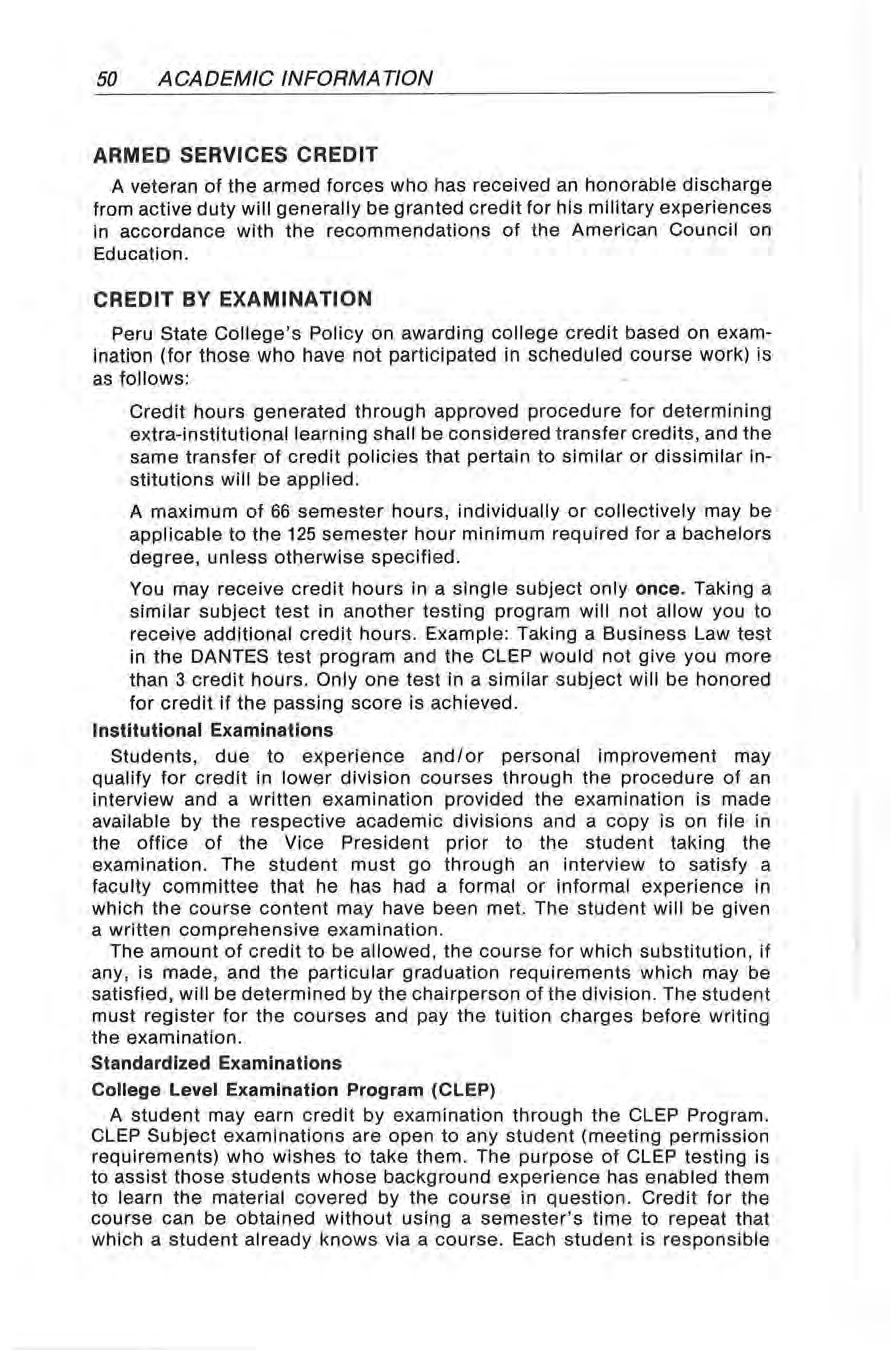
for submitting two fees for each CLEP test taken, and the student must obtain the minimum acceptable score in order to receive credit for the course in question.
* The essay portions are not required for any of the subject examinations. For complete information on procedures, check with the Office of Placement or the Division Chairperson representing the student's field .
DANTES Program (Defense Activity Nontraditonal Education Support)
DANTES tests are used by the military to give personnel the opportunity to earn college credits for education gained outside the classroom . Peru does not do DANTES testing, but will accept credit by means of DANTES testing in those subjects listed below - provided the minimum acceptable score is met.
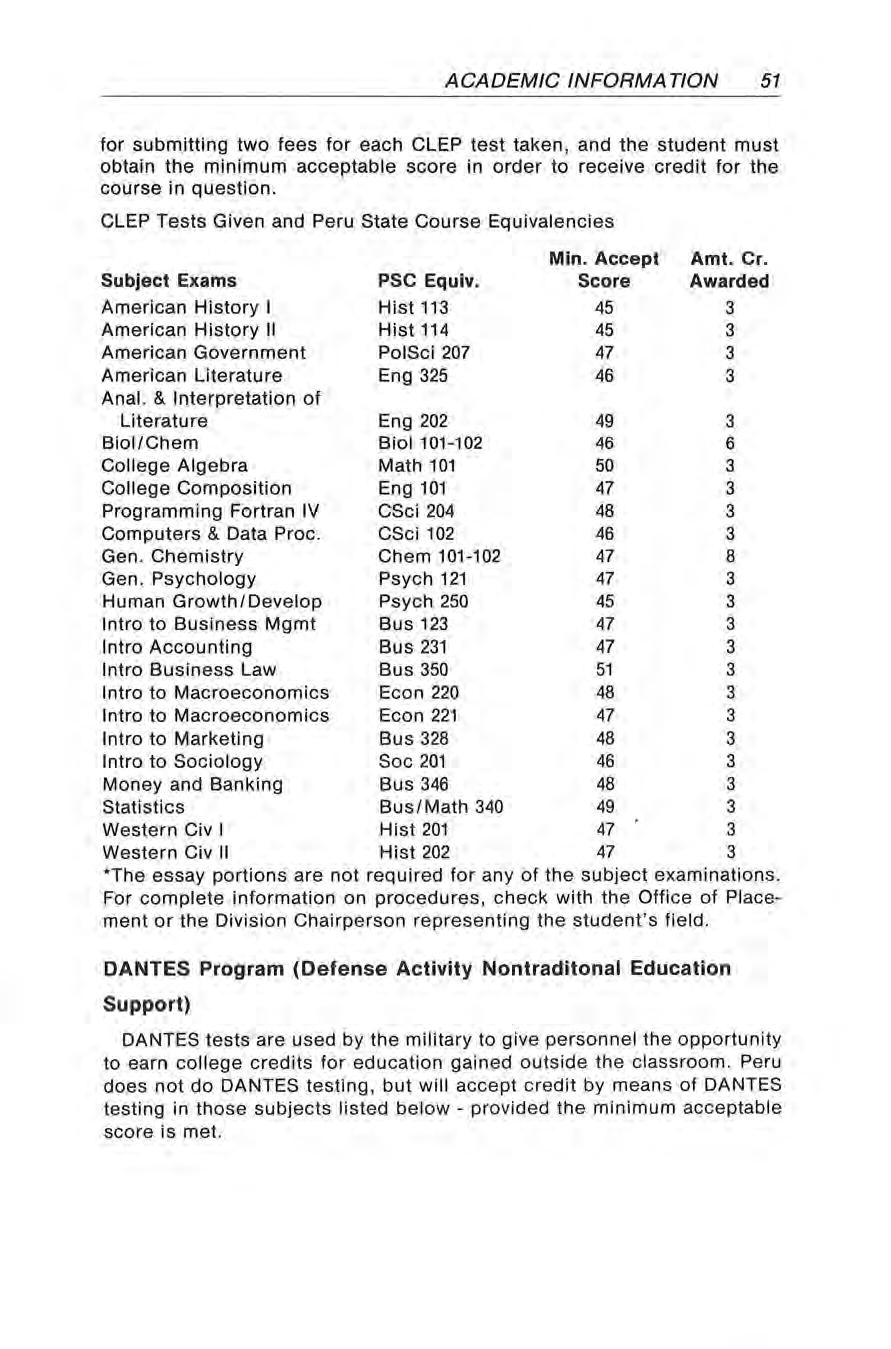
Profic i ency Examination Program (PEP)
Students may earn credit by examination for Peru State College Courses as spec i f i ed be l ow by achieving a score at or above t h e designated leve l on the PEP Examinat i on
D = Letter grade you need to receive to meet score requirements for cred i t to be received.
This is a program of college-level courses and exams for secondary school students. High Schoo l students in AP coursework who achieve the acceptable score leve l on their AP examination may receive credit at Peru State as l isted below.
·•For credit to be awarded at Peru State , the students must score at least a 3 on their examination
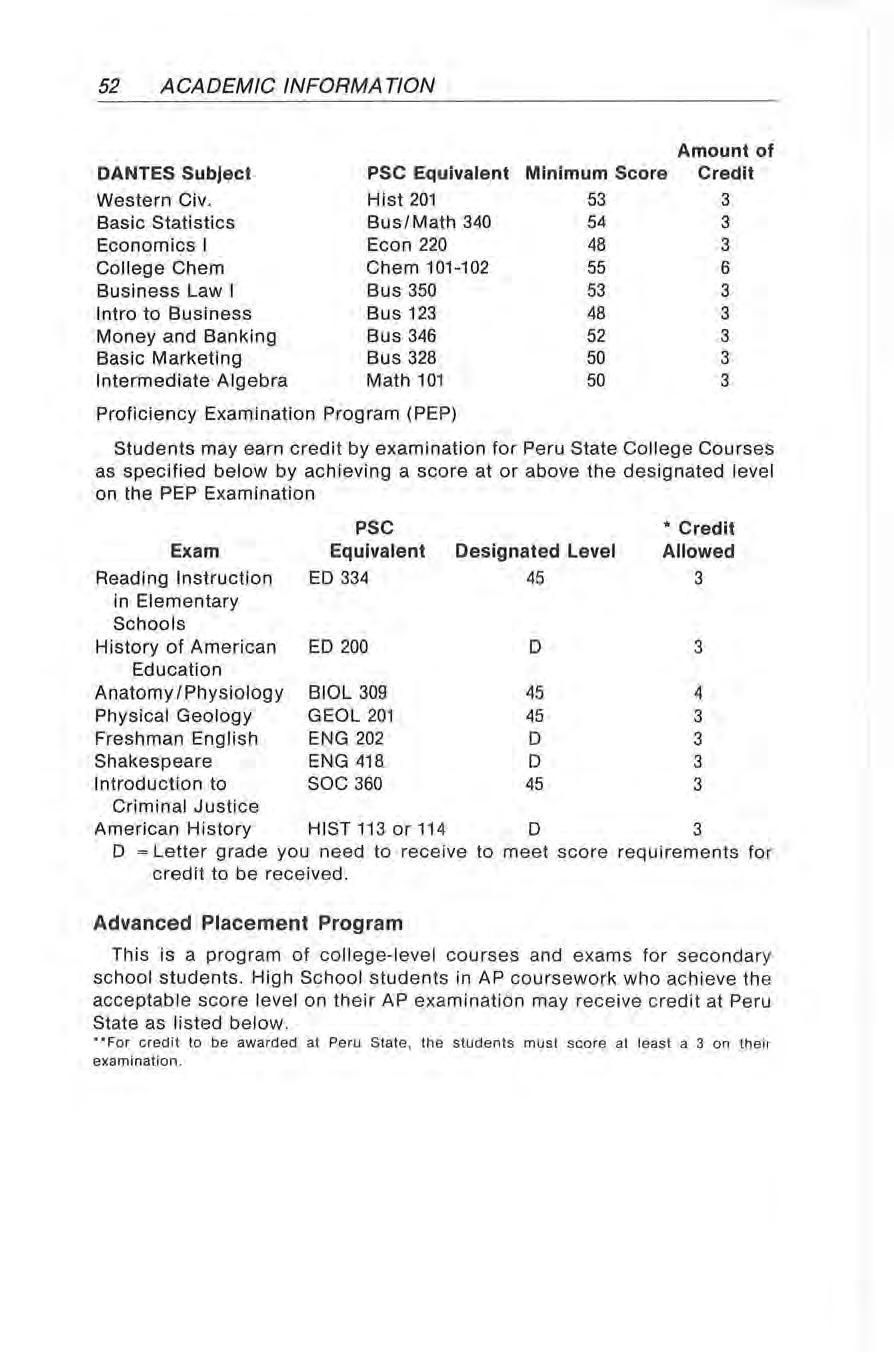
Advanced Placement Courses
American History
History
Art History
Art Studio
Biology
Chemistry
Computer Science
Language and Composition
Literature and Composition
Foreign Languages
Calculus (AB)
Calculus (BC)
Physics:
General Physics (AB)
Physics (CC)
Music:
Peru State College Equivalent
* No Equiva lent No Equiva lent
Art 318 or Art 306
Art 101
Biology 101-102
Chemistry 101-102
CSci 204 & 206
English 101
Eng lish 202
No Equivalent
Math 309
Math 309 - 310
Phys 201-202
Phys 201-202
Literature Mus 311
Theory
Mus 101
European History No Equiva lent
•cred it may be awarded even though there is no Peru State College course equiva lent.
1. No more than six (6) hours of Independent Study courses may be counted toward graduation.
2. No more than three (3) hours of Independent Study courses may be taken each semester.
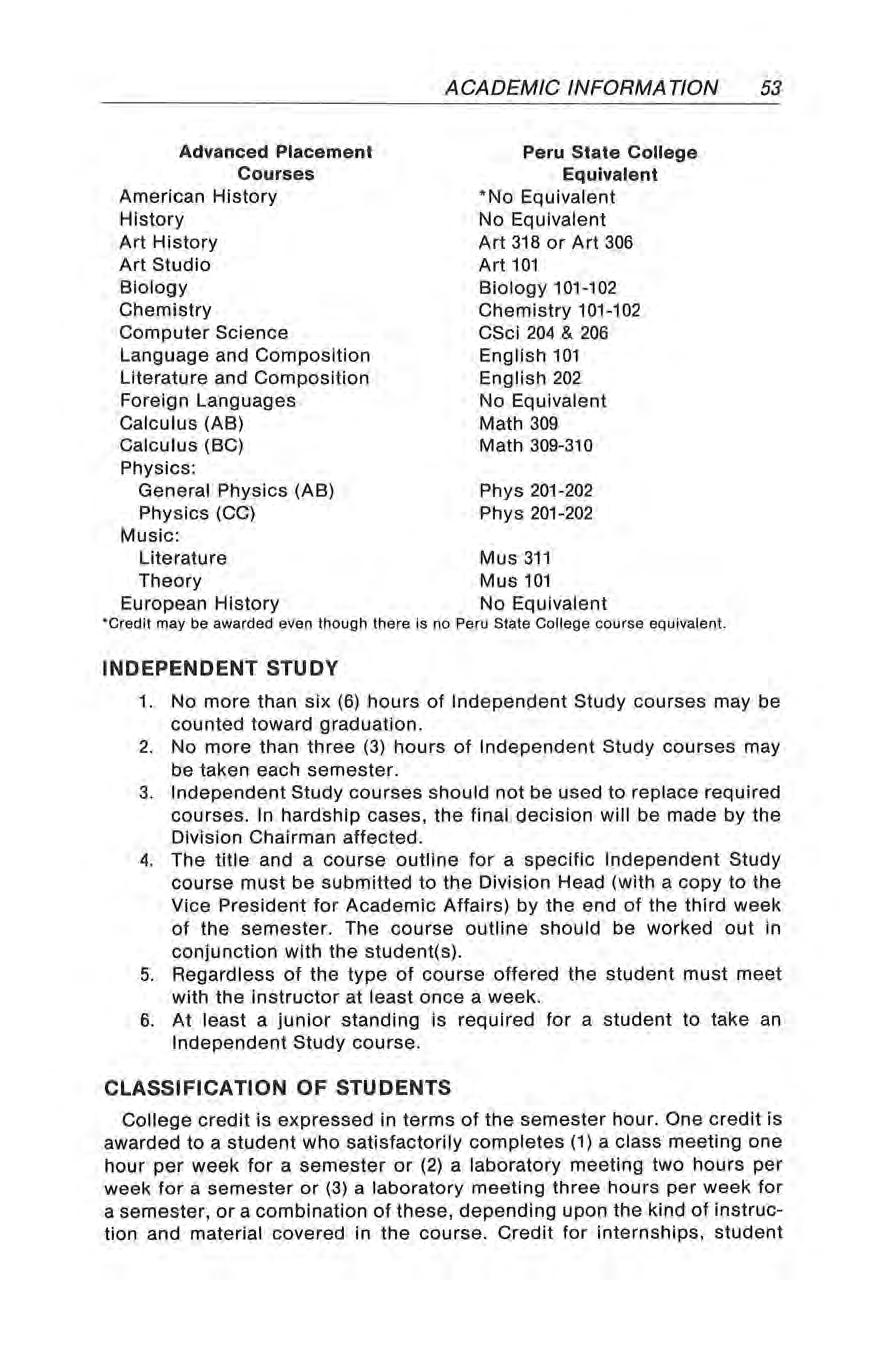
3 Independent Study courses should not be used to replace required courses. In hardship cases, the final decision will be made by the Division Chairman affected
4. The title and a course outline for a specific Independent Study course must be submitted to the Division Head (with a copy to the Vice President for Academic Affairs) by the end of the third week of the semester. The course outline should be worked out in conjunction with the student(s).
5. Regardless of the type of course offered the student must meet with the instructor at least once a week.
6 At least a junior standing is required for a student to take an Independent Study course.
College credit is expressed in terms of the semester hour. One credit is awarded to a student who satisfactorily completes (1) a class meeting one hour per week for a semester or (2) a laboratory meeting two hours per week for a semester or (3) a laboratory meeting three hours per week for a semester, or a combination of these, depending upon the kind of instruction and material covered in the course . Credit for internships, student
teaching and like curriculum offerings are determined using other appropriate standards
Students are classified according to the following levels:
Freshmen O to 29 credits
Sophomores 30 to 59 credits
Juniors 60 to 89 credits
Seniors 90 and over
Post Graduates: Students who have a bachelors degree or higher and are earning additional undergraduate credit.
On Campus Students :
A full time student is one who is enrolled for 12 hours or more during a semester However, the normal class load for a student expecting to complete the bachelors degree within eight semesters (4 years) is 15 to 16 hours. The maximum load without special permission is 17 hours Students with a grade point average of 3.50 for t he previous semester may apply to the Registrar for one additional hour, making a total of 18 An excess of 18 hours up to and including the 21st hour must be approved by the chairperson of the division in which the student is majoring. The maximum of 21 hours may not be exceeded
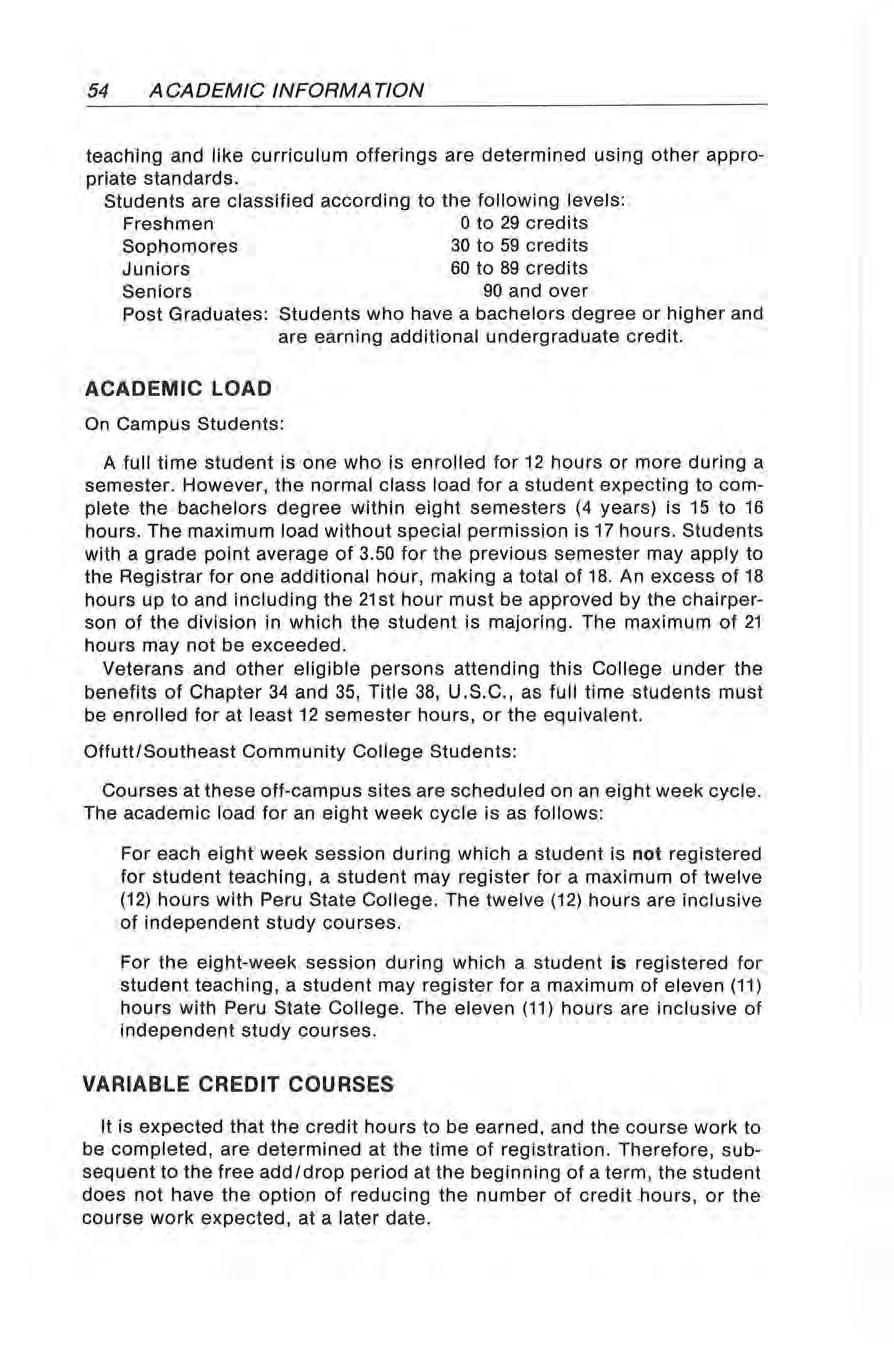
Veterans and other eligible persons attending this College under the benefits of Chapter 34 and 35, Title 38, U .S.C., as full time students must be enrolled for at least 12 semester hours, or the equivalent.
Offutt/Southeast Community College Students :
Courses at these off-campus sites are scheduled on an eight week cycle. The academic load for an eight week cycle is as follows:
For each eight week session during which a student is not registered for student teaching, a student may register for a maximum of twelve (12) hours with Peru State College . The twelve (12) hours are inclusive of independent study courses.
For the eight-week session during which a student is registered for student teaching, a student may register for a maximum of eleven (11) hours with Peru State College The eleven (11) hours are inclusive of independent study courses.
It is expected that the credit hours to be earned, and the course work to be completed, are determined at the time of registration. Therefore, subsequent to the free add/drop period at the beginning of a term, the student does not have the option of reducing the number of credit .hours, or the course work expected, at a later date.
Students are expected to attend classes regularly, arrive punctually, and do all assigned work in each class. The student agrees to this when he/ she registers for a course. Attendance is a privilege and a responsibility represented not only by the student's investment, but also by a significant investment by the State.
When it becomes necessary for a student to miss a class, he/she has the responsibility of notifying the instructor in advance of the absence whenever possible The faculty member has the prerogative of allowing the student to make arrangements for make-up and completion of the work missed during the absence.
The instructor has the right to base a portion of the student's grade on attendance. An instructor must present his grading practices in writing to both students and to the appropriate division chairman during the first week of each semester.
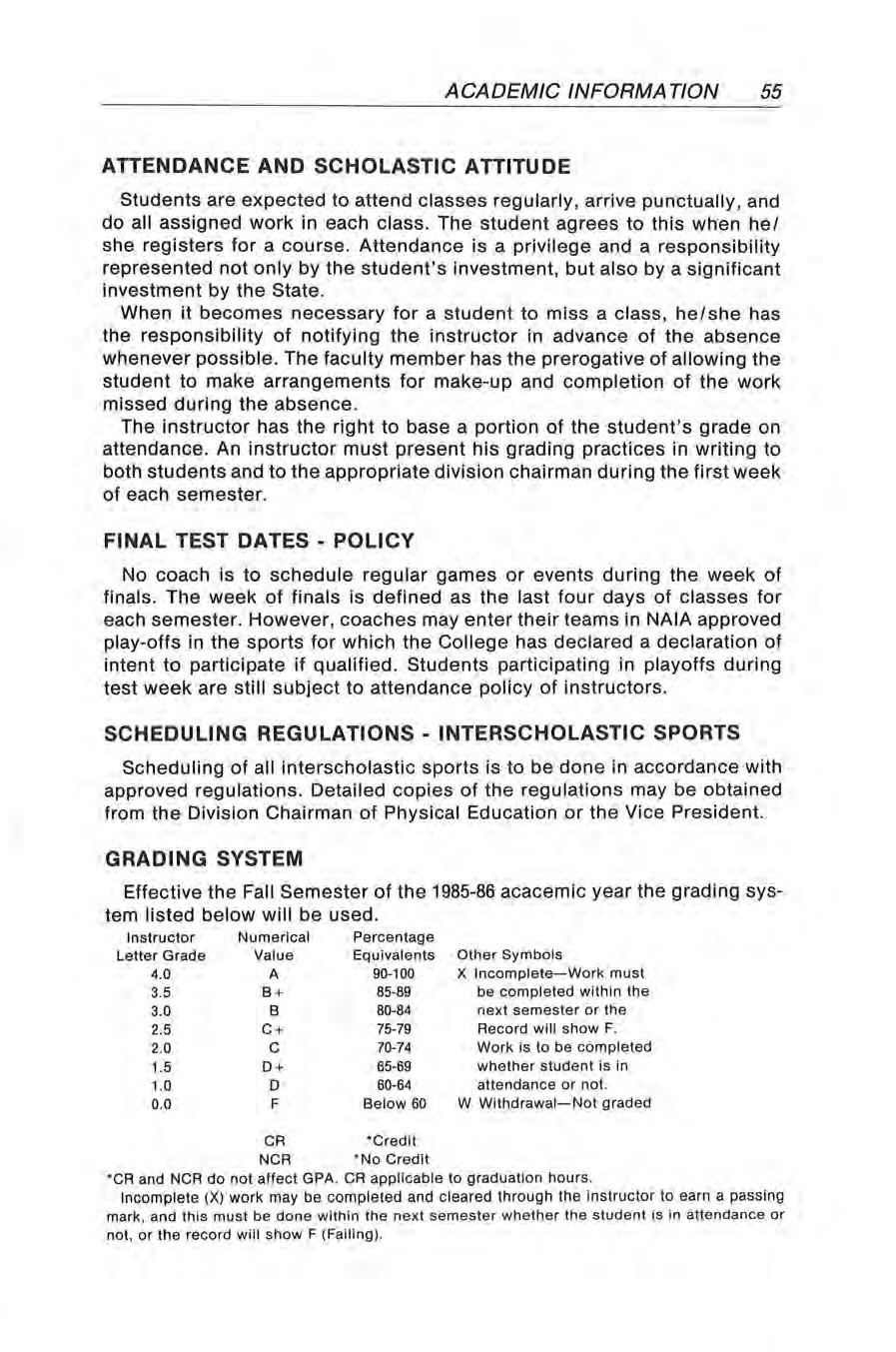
No coach is to schedule regular games or events during the week of finals. The week of finals is defined as the . last four days of classes for each semester. However, coaches may enter their teams in NAIA approved play-offs in the sports for which the College has declared a declaration of intent to participate if qualified. Students participating in playoffs during test week are still subject to attendance policy of instructors.
Scheduling of all interscholastic sports is to be done in accordance with approved regulations. Detailed copies of the regulations may be obtained from the Division Chairman of Physical Education or the Vice President.
Effective the Fall Semester of the 1985-86 acacemic year the grading system listed below will be used.
• cR and NCR do not affect GPA CR applicable to graduation hours
Incomplete (X)'work may be completed and cleared through the instructor to earn a passing mark , and this must be done within the ne x t s e mest e r whether th e stud e nt i s in att e ndance or not, or the record will show F (Failing)
A candidate for a baccalaureate degree must earn at least 125 semester hours with a minimum grade point average of 2.00. A minimum GPA of 2.5 must be earned for degrees in Education. A candidate for the Associate of Arts degree must earn at least 60 semester hours with a minimum grade point average of 2.00.
To provide early information to students in regard to their academic work, grades are reviewed at the end of each nine weeks. A mid - term report for low or failing work is provided the student. A student receiving this notification should confer with the instructor, his faculty advisor , and the Dean for Student Development.
A student to be in good standing academically must maintain the required . GPA for the respective degree being pursued. Should a student's GPA be 1.00-1.99 at the end of the semester, the student is notified he is on academic probation for the next semester and will be subject to academic suspension if his GPA is still under 2.0 at the end of the probationary semester. Academic suspension is generally for two semesters
If a student's GPA is below 1 .00 at t he end of any term, he will be academically suspended.
A student who has been academically suspended at the close of a semester may attend the subsequent summer session at Peru State. If the appropriate cumulative GPA (2.00 or higher) is achieved the student may enroll for the next semester
Students suspended for academic or social reasons are to apply at the Office of Admissions for readmission.
Students readmitted following academic suspension must maintain an average of 2.0 or higher for all course work taken for the term of re-entry and each following term until the required composite G.P.A. of 2 0 has been achieved. Failure to meet the above condition for a term will result in academic suspension. A student who has been suspended twice is generally not considered for readmission
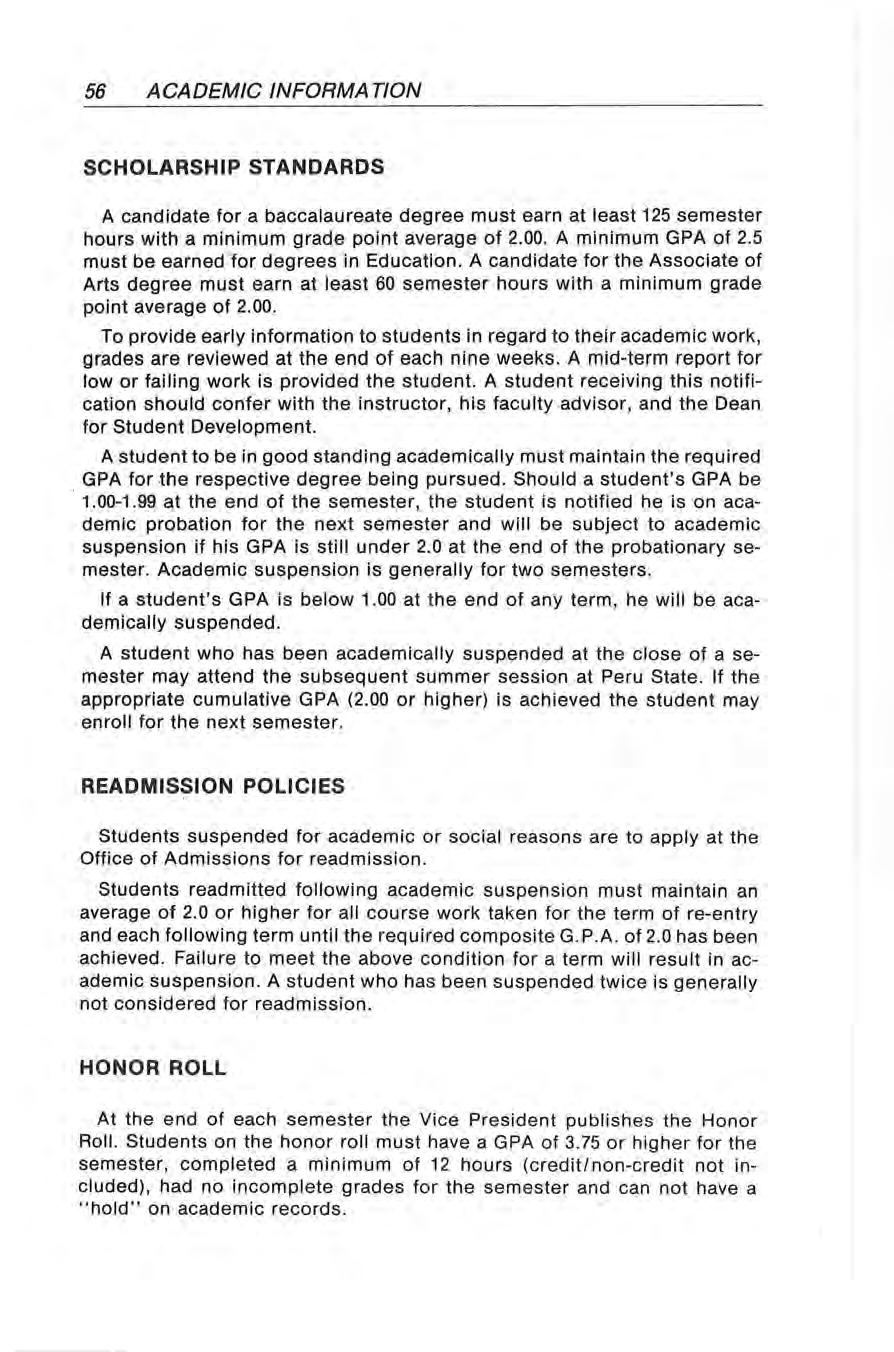
At the end of each semester the Vice President publishes the Honor Roll. Students on the honor roll must have a GPA of 3.75 or higher for the semester, completed a minimum of 12 hours (credit/non-credit not included) , had no incomplete grades for the semester and can not have a "hold" on academic records .
The purpose of each course is to challenge students, not by difficult examinations and heavy reading assignments, but by presenting challenging ideas and new perspectives on traditional topics . An honors course should be the beginning of each student's lifetime interest in the serious and difficult issues of our day.
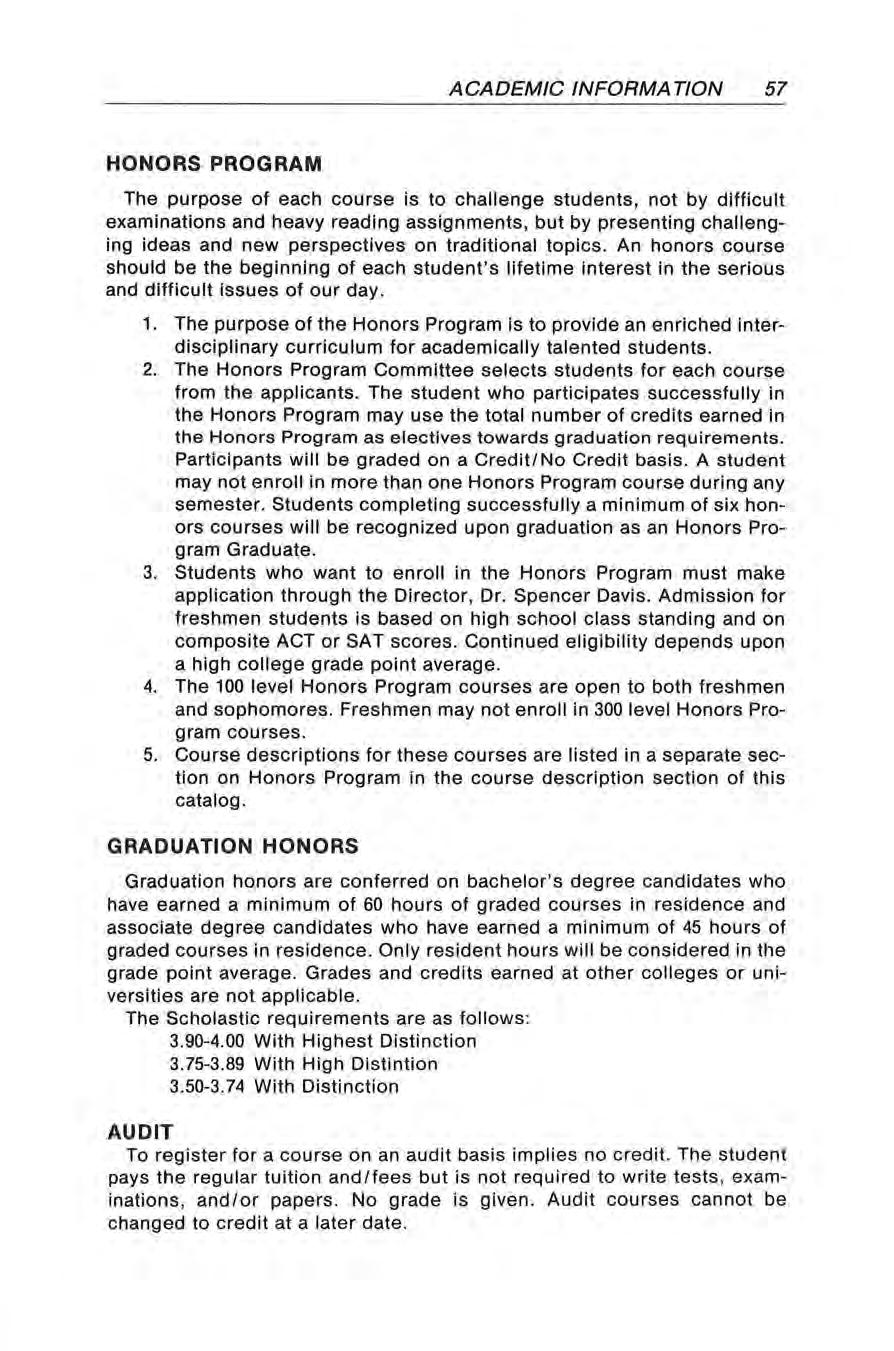
1. The purpose of the Honors Program is to provide an enriched interdisciplinary curriculum for academically talented students.
2 The Honors Program Committee selects students for each course from the applicants. The student who participates successfully in the Honors Program may use the total number of credits earned in the Honors Program as electives towards graduation requirements . Participants will be graded on a Credit/ No Credit basis. A student may not enroll in more than one Honors Program course during any semester Students completing successfully a minimum of six honors courses will be recognized upon graduation as an Honors Program Graduate.
3 Students who want to enroll in the Honors Program must make application through the Director, Dr. Spencer Davis. Admission for freshmen students is based on high school class standing and on composite ACT or SAT scores. Continued eligibility depends upon a high college grade point average
4. The 100 level Honors Program courses are open to both freshmen and sophomores . Freshmen may not enroll in 300 level Honors Program courses .
5. Course descriptions for these courses are listed in a separate section on Honors Program in the course descr i ption section of this catalog
Graduation honors are conferred on bachelor's degree candidates who have earned a minimum of 60 hours of graded courses in residence and associate degree candidates who have earned a minimum of 45 hours of graded courses in residence Only resident hours will be considered in the grade point average . Grades and credits earned at other colleges or universities are not applicable.
The Scholastic requirements are as follows:
3.90 - 4. 00 With Highest Distinction
3.75-3 .89 With High Distintion
3 50- 3 74 With Distinction
To register for a course on an audit basis implies no credit. The student pays the regular tuition and/fees but is not required to write tests, examinations , and/or papers. No grade is given Audit courses cannot be changed to credit at a later date
Private instruction is available in music. Music students will receive private instruction without charge, in relation to their major Other students will pay the rate per lesson as listed in the Financial Information section of catalog .
A student may and is urged to repeat any course in which he has failed. The initial course and "F" grade are not removed from the student's permanent record. However, the repeat grade is used to determine the GPA There may be occasions when a student chooses to repeat a course purely for review, to be taken on an audit basis, without a change of grade
The college maintains this center in the Education Building. Professional staff members are available to assist students and faculty members.
The accuracy of each registration as related to class periods, sections, days and other possible conflicts is the responsibility of the student. Also, the ultimate responsibility for the meeting of all requirements rests with the student. In the event change in program is unavoidable following a registration, the student must secure the approval of the advisor and the instructor. No full semester courses may be added subsequent to the published final date for adding courses When applicable a tuition refund will be made during the official add period.
A student finding it necessary to withdraw from a class following the final date for adding courses and before the last four weeks of the semester must notify his advisor and the instructor and must officially withdraw at the Registrar's Office. Official withdrawal prior to the last four weeks of the semester will be recorded as "W" on the permanent record . Students withdrawing without official approval will be graded " F"
Withdrawal during the last tour weeks prior to the time of the final examination will result either in a grade of "W" or "F" depending on the grade at the time of withdrawal. The student does not withdraw via the Registrar's Office. The matter is determined by the instructor The instructor reports the grade of " W" or "F" on the grade report form submitted to the Registrar's Office at the close of the term
If it is necessary for a student to withdraw from College, he secures the appropriate form from the Dean of Student Affairs. This form must be presented to identified members of the faculty for their signatures. Propor-
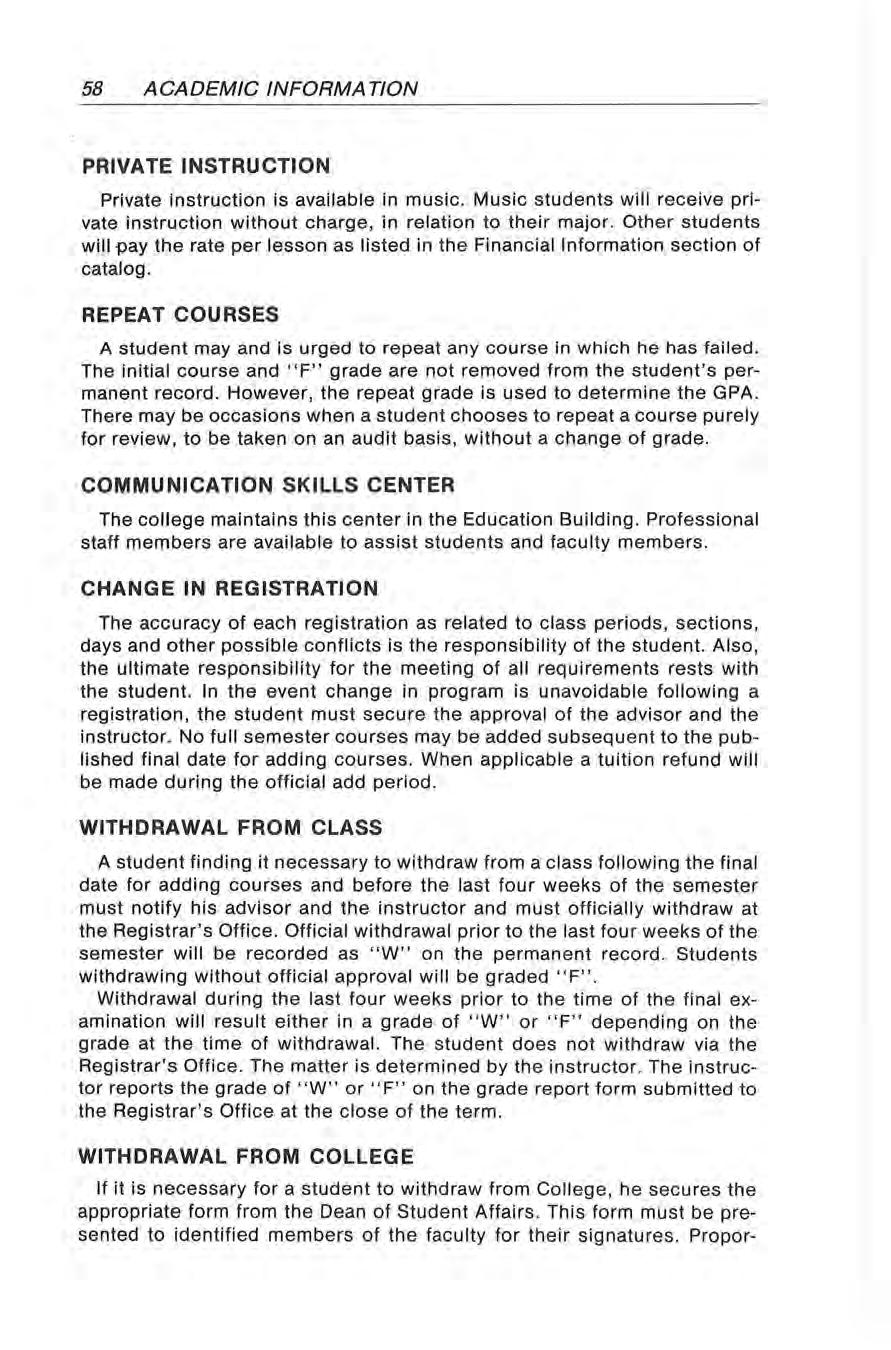
tionate tuition refunds will be made to students withdrawing from college within a given period according to the refund schedule. Complete withdrawal from college prior to the last four weeks of the term will be recorded as "W" on the permanent record for all enrolled classes. Withdrawal during the last four weeks of the term is not acceptable unless requested by the college or other extenuating circumstances exist.
Each student may request and receive one free transcript of his academic record. A fee is charged for each additional transcript. No transcript will be issued if the student has not met all financial obligations to the College or has a hold on the academic record. Transcript requests must be in written form.
Most professional schools require for entrance two or more years of college credit in general education or basic liberal arts courses which vary only slightly from one profession to another. Since such work is required for the professional curricula in training teachers, this College offers a variety of courses that serve as pre-professional education. Suggested among these are those for prospective doctors, dentists, pharmacists, optometrists, nurses, veterinarians, lawyers, engineers, agriculturists, foresters, morticians, business executives, journalists and others. A student following a pre-professional program is urged to secure a bulletin from the institution to which he intends to transfer in order that specific requirements will be met. The various pre-professional programs are described under the appropriate school.
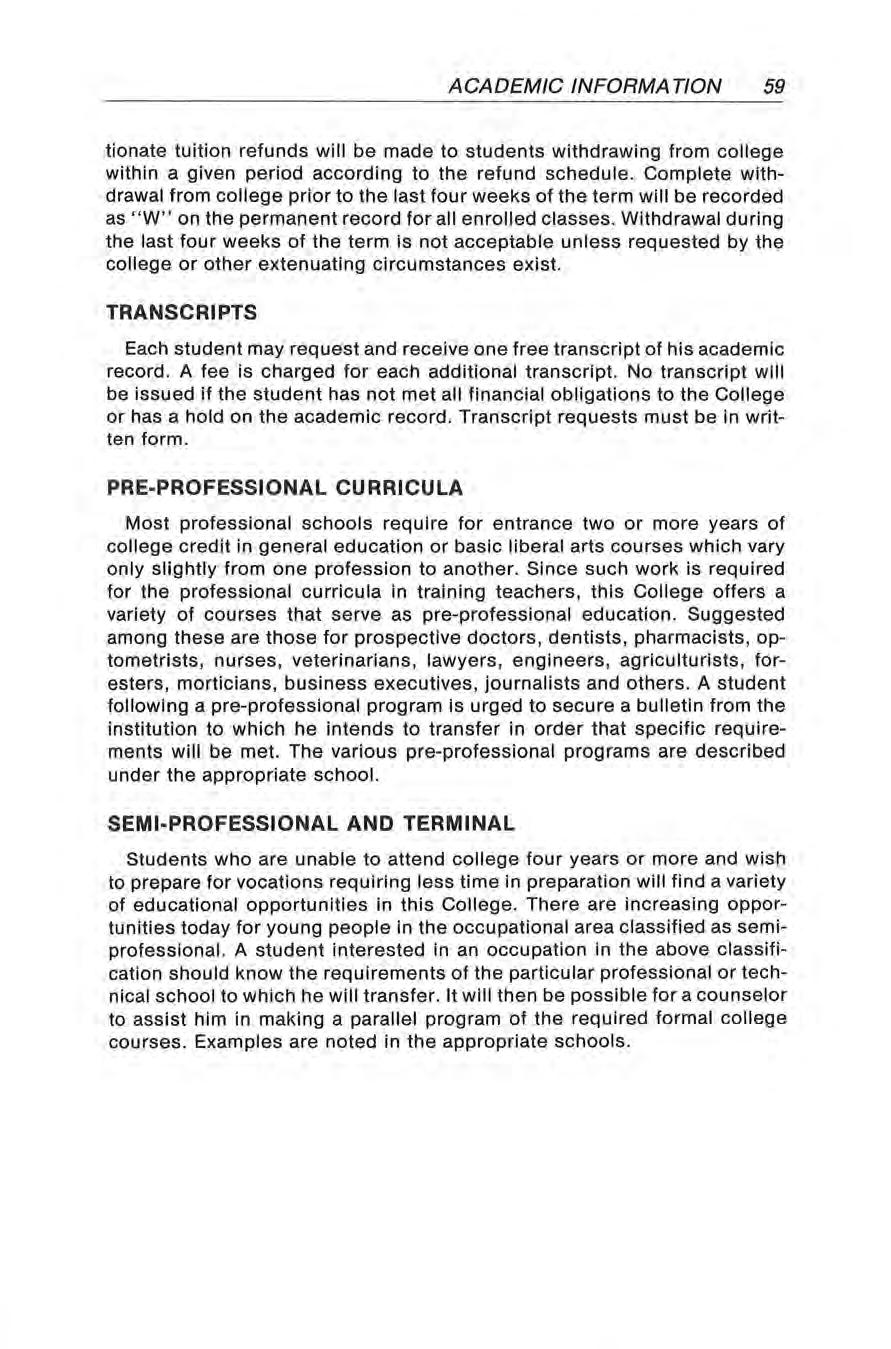
Students who are unable to attend college four years or more and wish to prepare for vocations requiring less time in preparation will find a variety of educational opportunities in this College. There are increasing opportunities today for young people in the occupational area classified as semiprofessional. A student interested in an occupation in the above classification should know the requirements of the particular professional or technical school to which he will transfer. It will then be possible for a counselor to assist him in making a parallel program of the required formal college courses. Examples are noted in the appropriate schools.
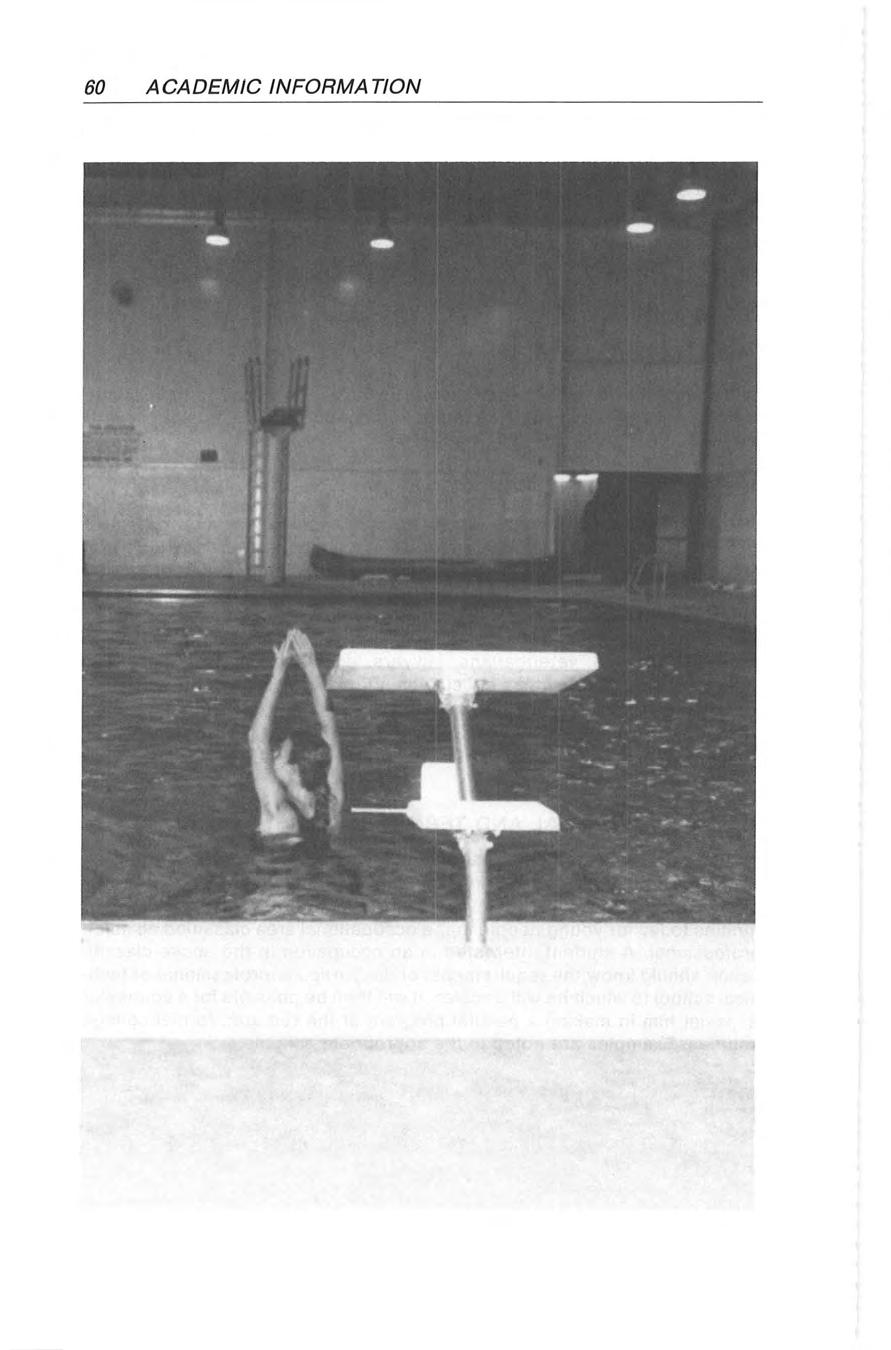
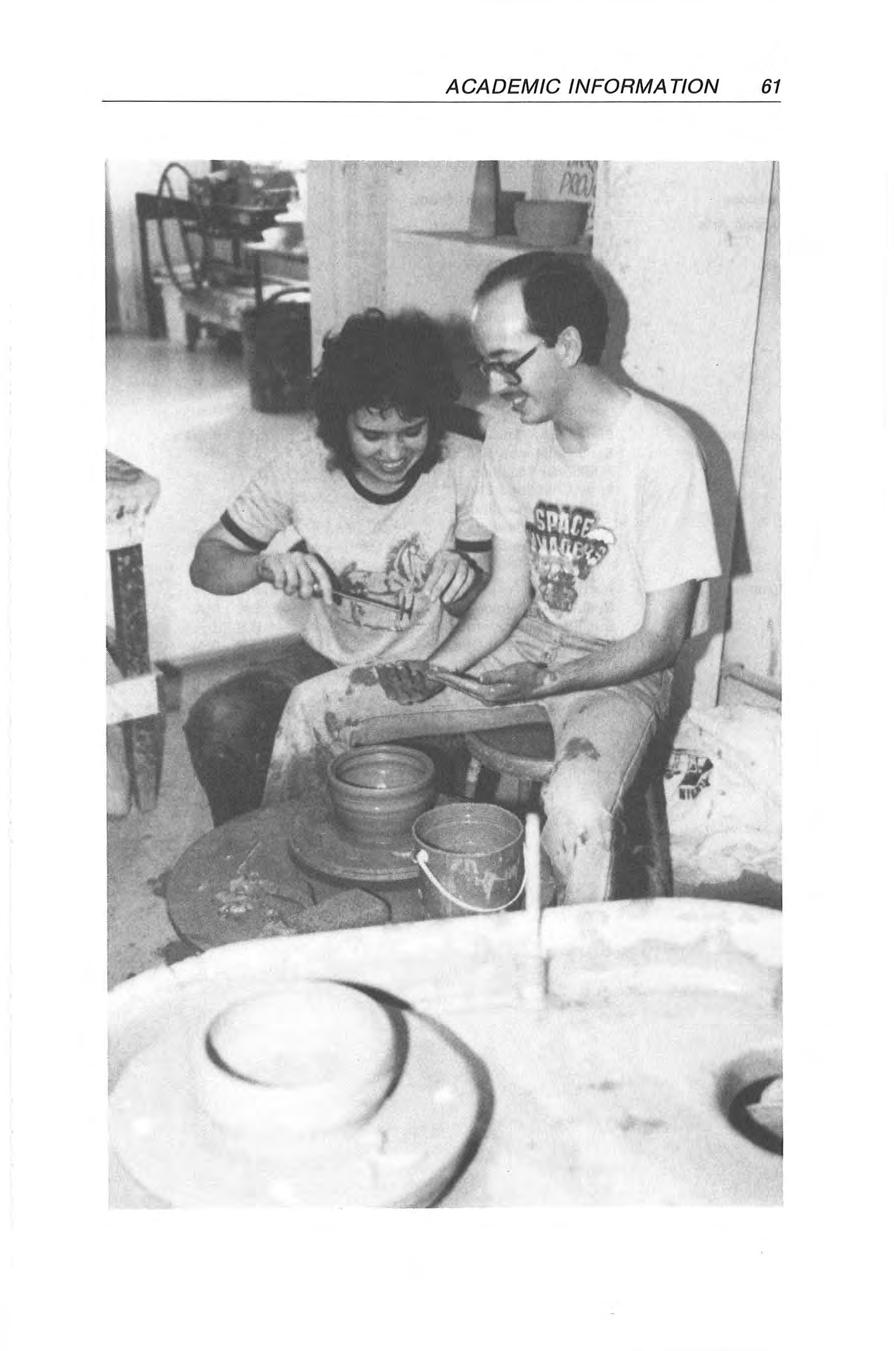
Applied Arts
Programs of Study
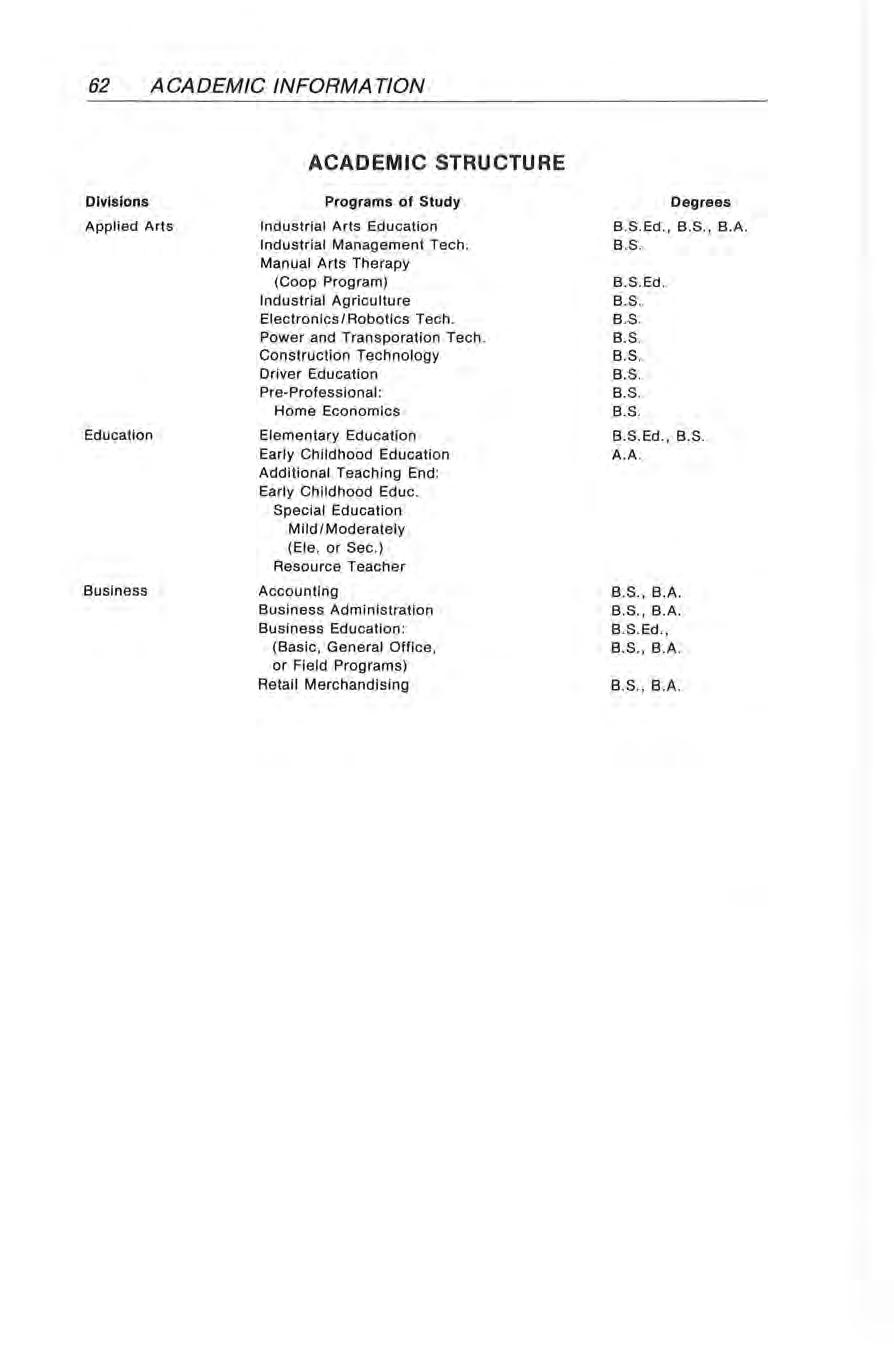
Industrial Arts Education
Industrial Management Tech
Manual Arts Therapy (Coop Program)
Industrial Agriculture
Electronics/Robotics Te c h.
Power and Transporation Tech.
Construction Technology
Driver Education
Pre-Professional : Home Economics
Education
Elementary Education
Early Childhood Education
Additional Teaching End :
Early Childhood Educ. Special Education Mild/Moderately (Ele. or Sec )
Resource Teacher
Business
Accounting
Business Administration
Business Education: (Basic, General Office , or Field Programs)
Reta i l Merchandising
Divisions
Natural Science
Programs of Study
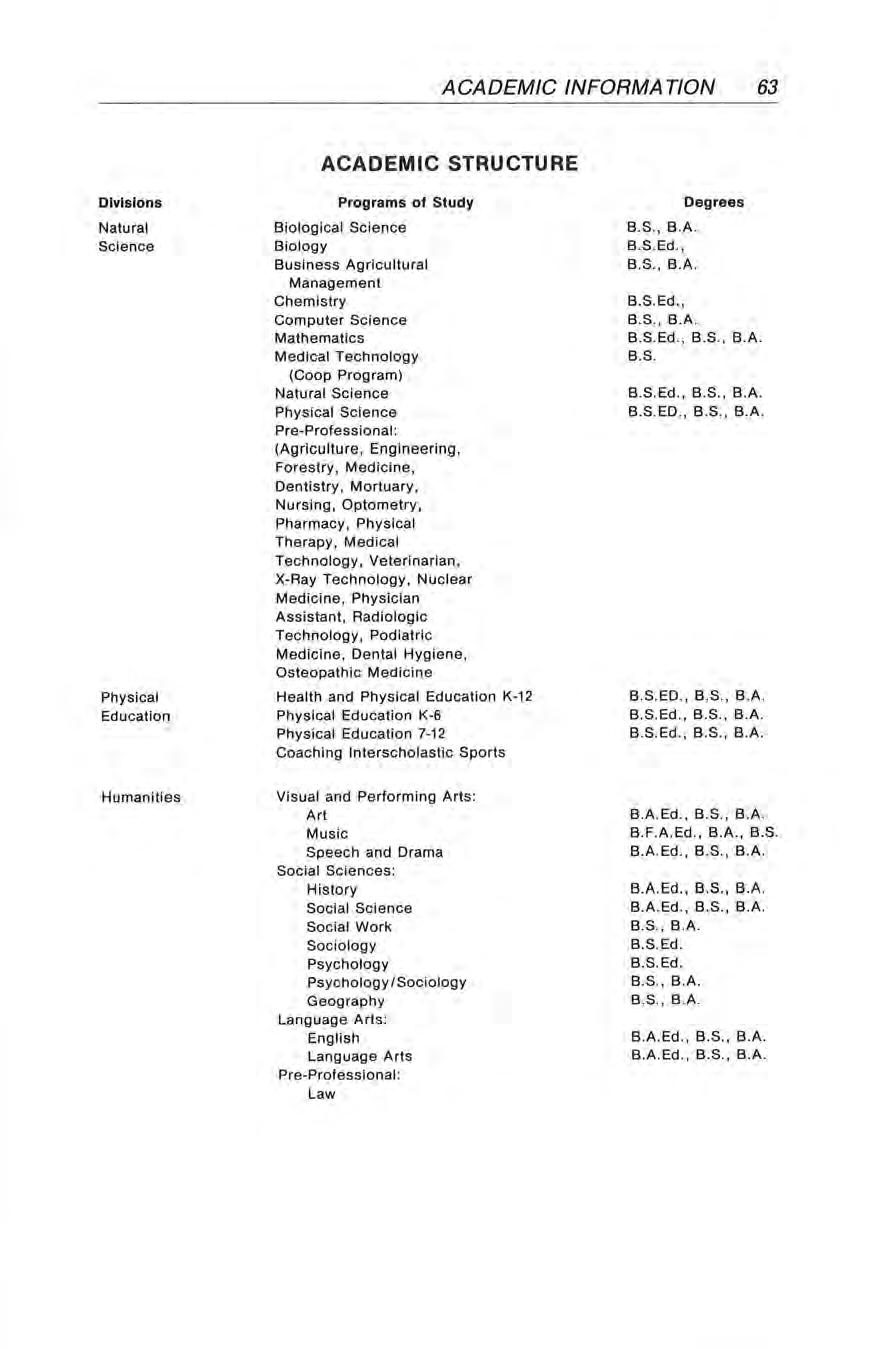
Biological Science
Biology
Business Agricultural Manag e ment
Chemistry
Computer Science
Mathematics
Medical Technology (Coop Program)
Natural Science
Physical Science
Pre-Professional : (Agriculture, Engineering, Forestry, Medicine , Dentistry , Mortuary , Nursing, Optometry, Pharmacy, Physical Therapy, Medical Technology , Veterinarian, X-Ray Technology , Nuclear Medicine, Physician
Assistant , Radiologic Technology , Podiatric Medicine , Dental Hygiene, Osteopathic Medicine
Physical Education
Health and Physical Education K-12
Physical Education K-6
Physical Education 7- 12 Coaching Interscholastic Sports
Humanities
Visual and Performing Arts :
Music Speech and Drama
Social Sciences: History Social Science
Social Work
/Sociology
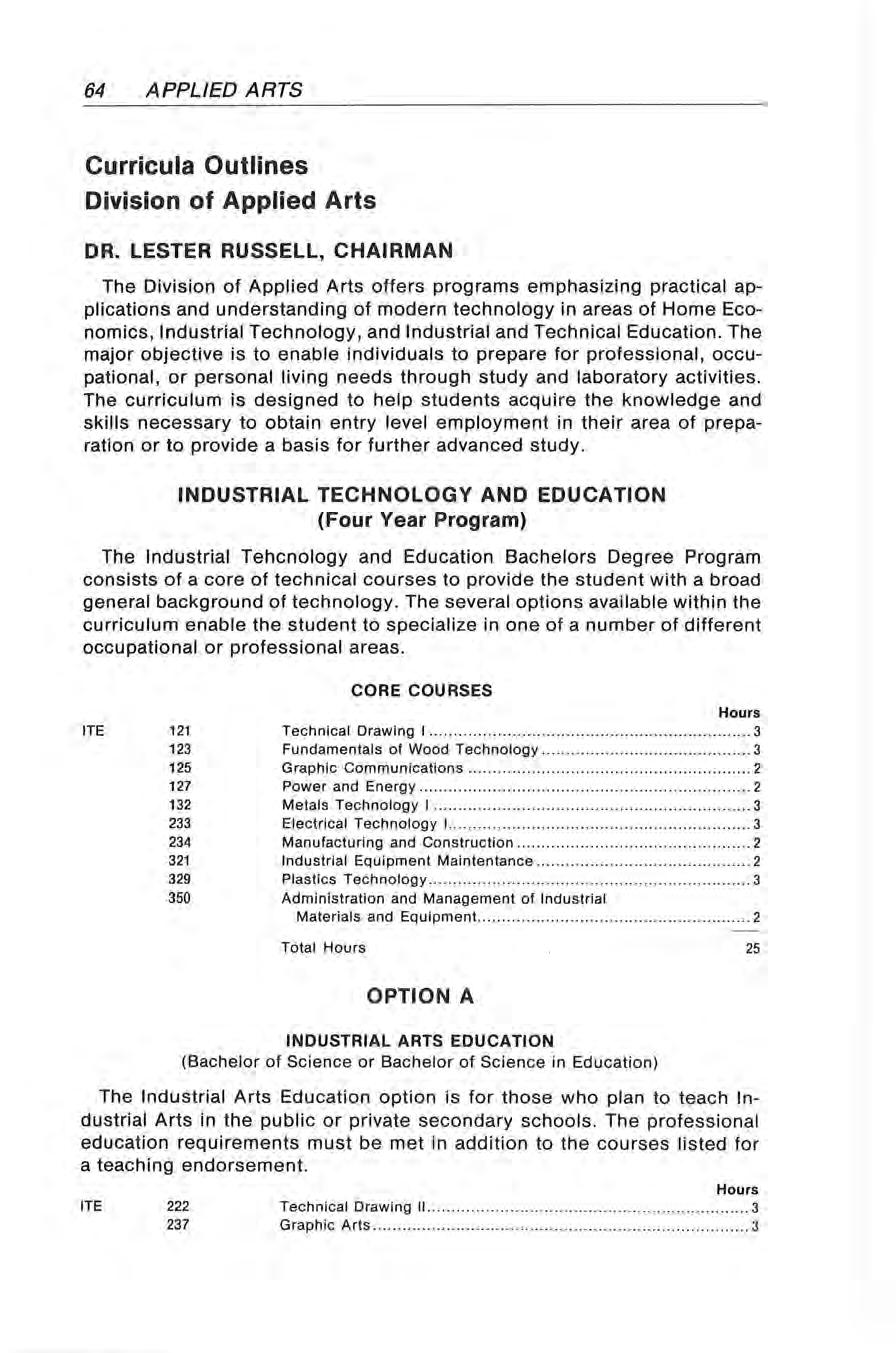
The Division of Applied Arts offers programs emphasizing practical applications and understanding of modern technology in areas of Home Economics, Industrial Technology, and Industrial and Technical Education. The major objective is to enable individuals to prepare for professional, occupational, or personal living needs through study and laboratory activities. The curriculum is designed to help students acquire the knowledge and skills necessary to obtain entry level employment in their area of preparation or to provide a basis for further advanced study.
The Industrial Tehcnology and Education Bachelors Degree Program consists of a core of technical courses to provide the student with a broad general background of technology. The several options available within the curriculum enable the student to specialize in one of a number of different occupational or professional areas .
INDUSTRIAL ARTS EDUCATION (Bachelor of Science or Bachelor of Science in Education)
The Industrial Arts Education option is for those who plan to teach Industrial Arts in the public or private secondary schools The professional education requirements must be met in addition to the courses listed for a teaching endorsement.
Students who have or are pursuing a Bachelor of Science in Education degree with an option in Industrial Arts Education may take additional training in Manual Arts Therapy This program is in cooperation with the Veterans Administration Center Hospital at Wadsworth, Kansas .
The student spends six weeks at the hospital as an intern. Upon graduation and successful completion of the internship, the student is eligible for G S. 7 Civil Service rating. Details of the program may be obtained from the Division Chairman.
INDUSTRIAL MANAGEMENT TECHNOLOGY (Bachelor of Science Degree)
The curriculum for the Industrial Management Technology option is designed for students whose main objective is preparation for technician and managerial positions in industry. The curriculum has been developed to include a combination of technical s1nd business courses in order to prepare the graduate for employment in an industrial enterprise
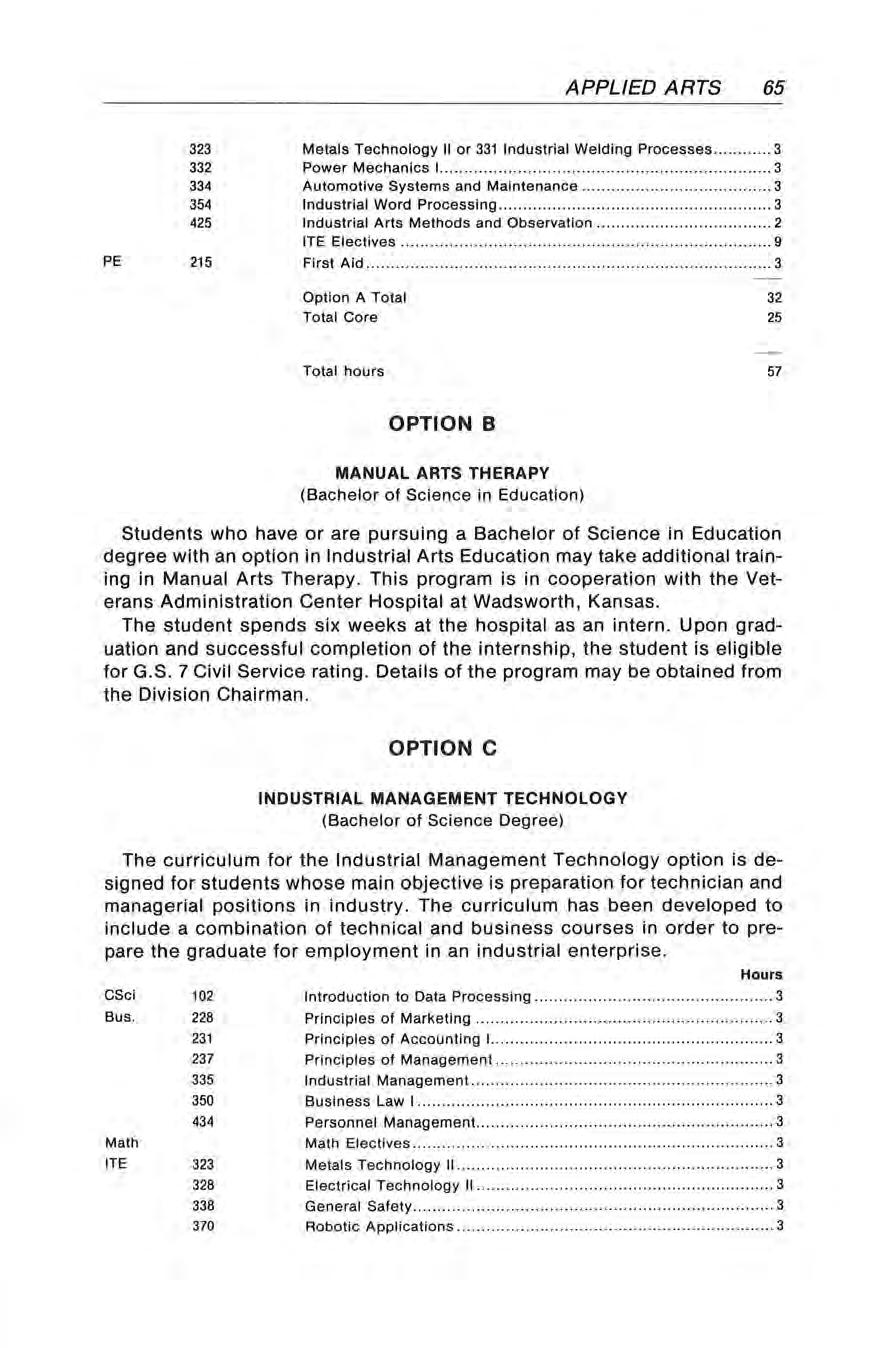
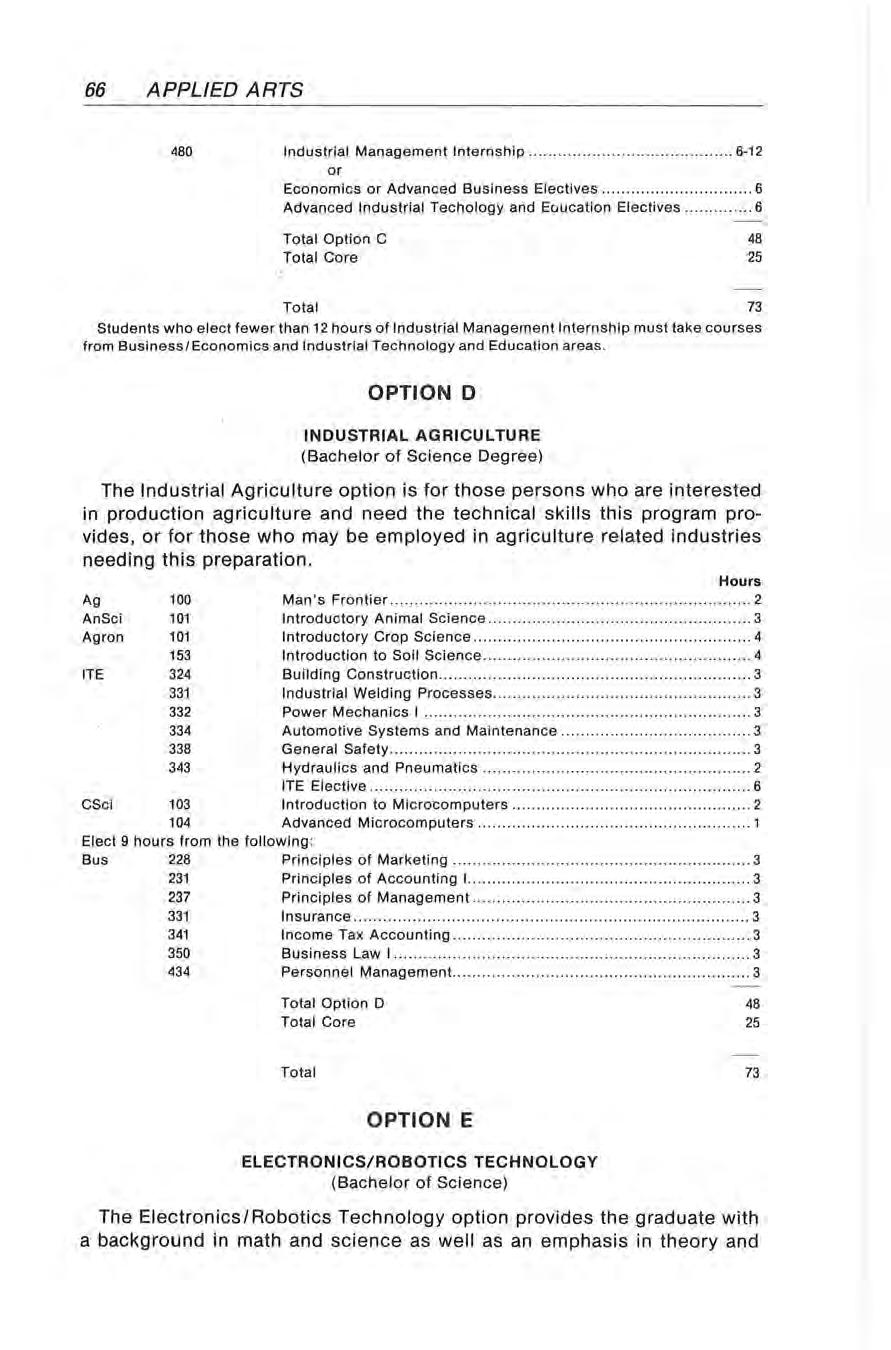
The Industrial Agriculture option is for those persons who are interested in production agriculture and need the technical skills this program provides, or for those who may be employed in agriculture related industries needing this preparation.
The Electronics/Robotics Technology option provides the graduate with a background in math and science as well as an emphasis in theory and
laboratory work in electronics and robotics technology. Graduates may qualify for positions in technical sales, supervision of technicians, supervision of maintenance, or similar positions dealing with electronics or
.
The Power and Transportation Technology option provides the education necessary to qualify for positions of technical supervision, and technical sales or service. The curriculum includes technical studies in power and transportation, math,
and business courses.
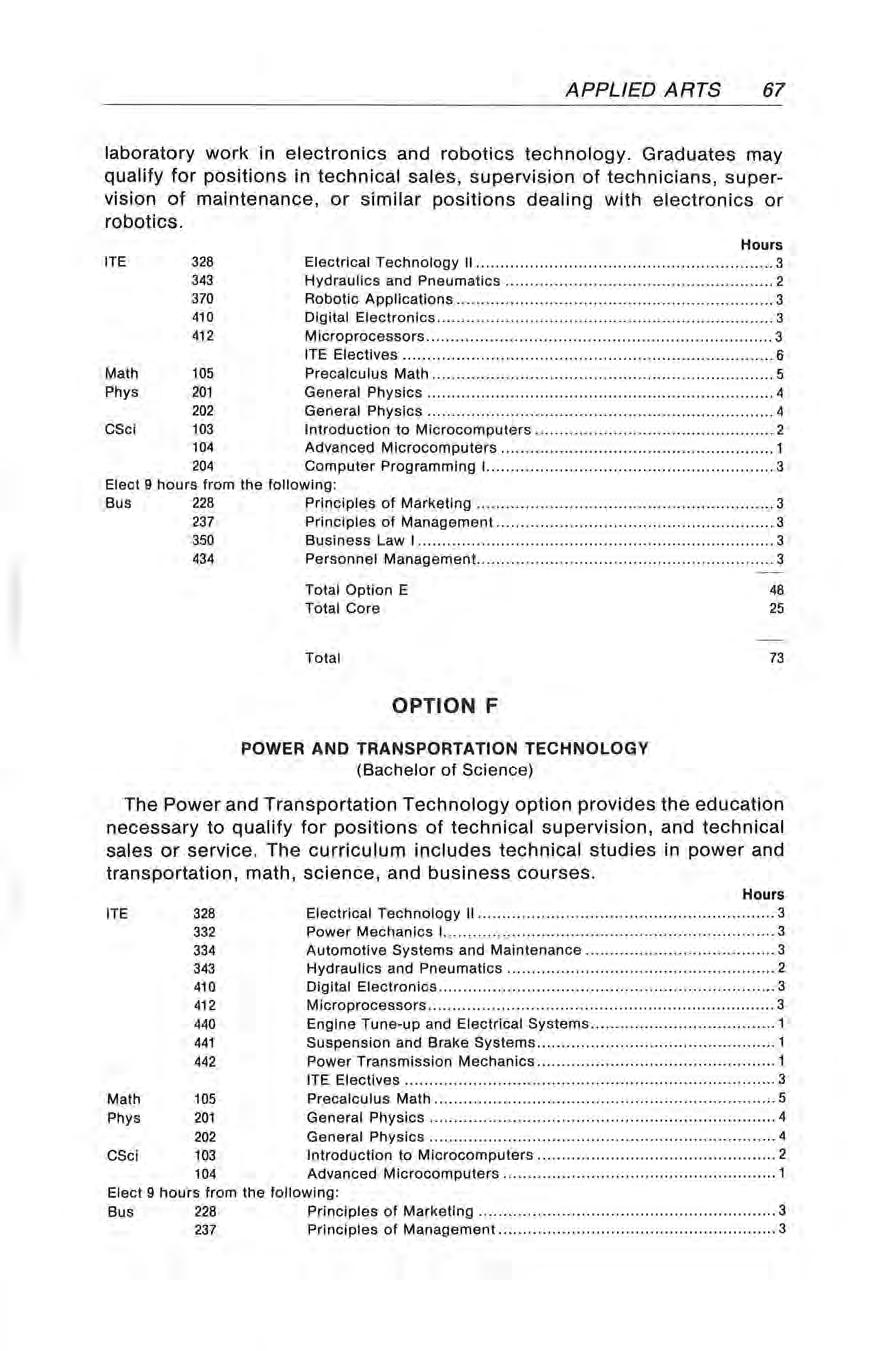
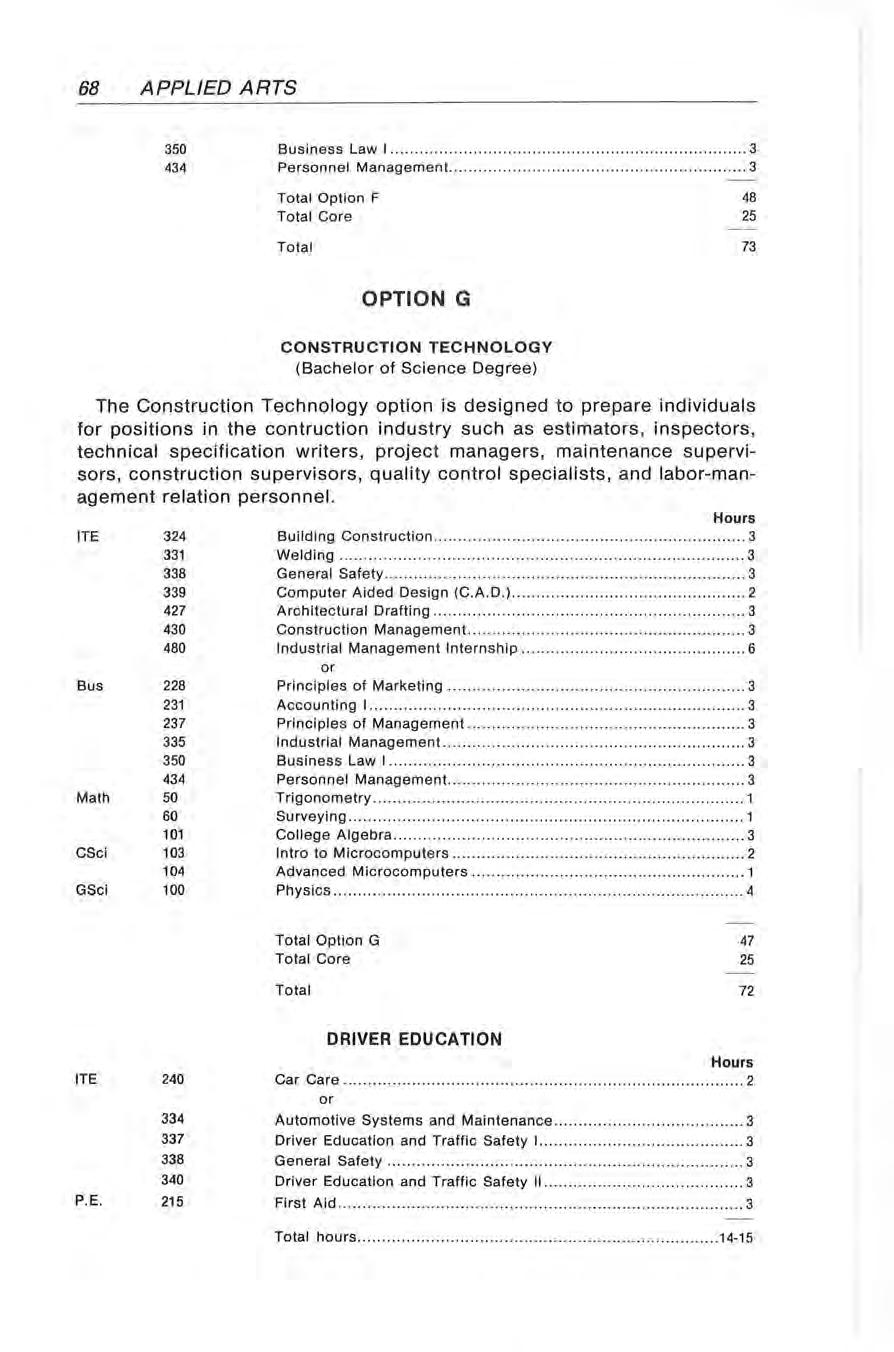
To qual if y for an e nd orseme n t in driver educatio n a person must c omp l ete a broad field or two subject areas An addit i o n a l requirement for the endorsement is a valid Nebraska driver's li cense
Indu stria l Educa tion students who plan to interrupt their academic programs before completing the baccalaureate degree are ad vis e d to select courses from the following list during the first two years.
These courses may better prepare the individual for industrial emp loyment. The core courses provide a broad area of preparation. The courses which provide an emphasis in construction, drafting , electricity, metals, or automotive further enhance employment possibilities
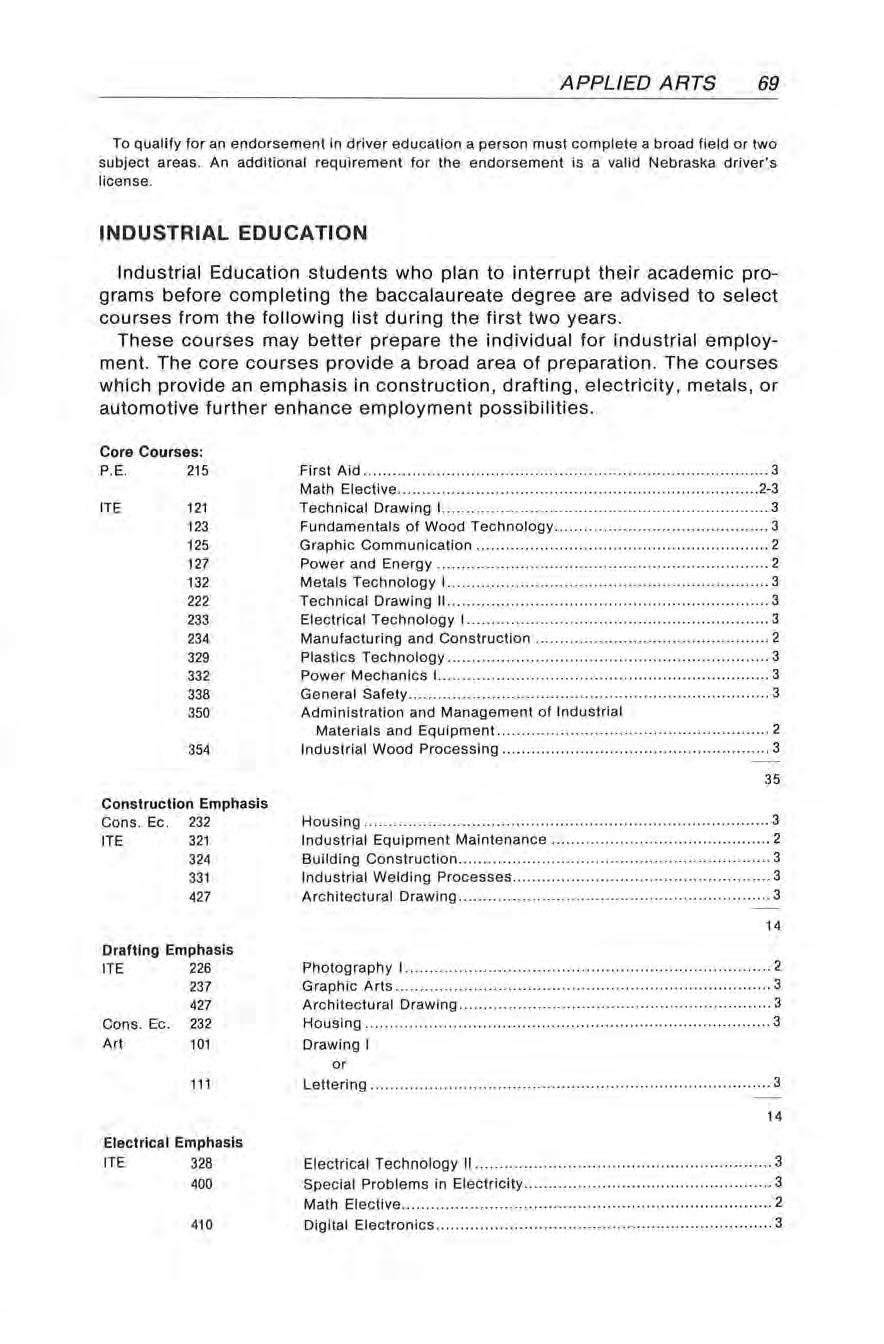
For those seeking an endorsement in Vocational Trades and Industrial Education, the following is required in addition to the general degree program.
1 A major in Industrial Arts.
2 A minimum of 12 semester hours in area of specialization, e.g. , carpentry, auto mechanics, etc
3. Six hours from the following vocational courses:
a Vocational · Education 441 /541
b Vocational Education 442/542
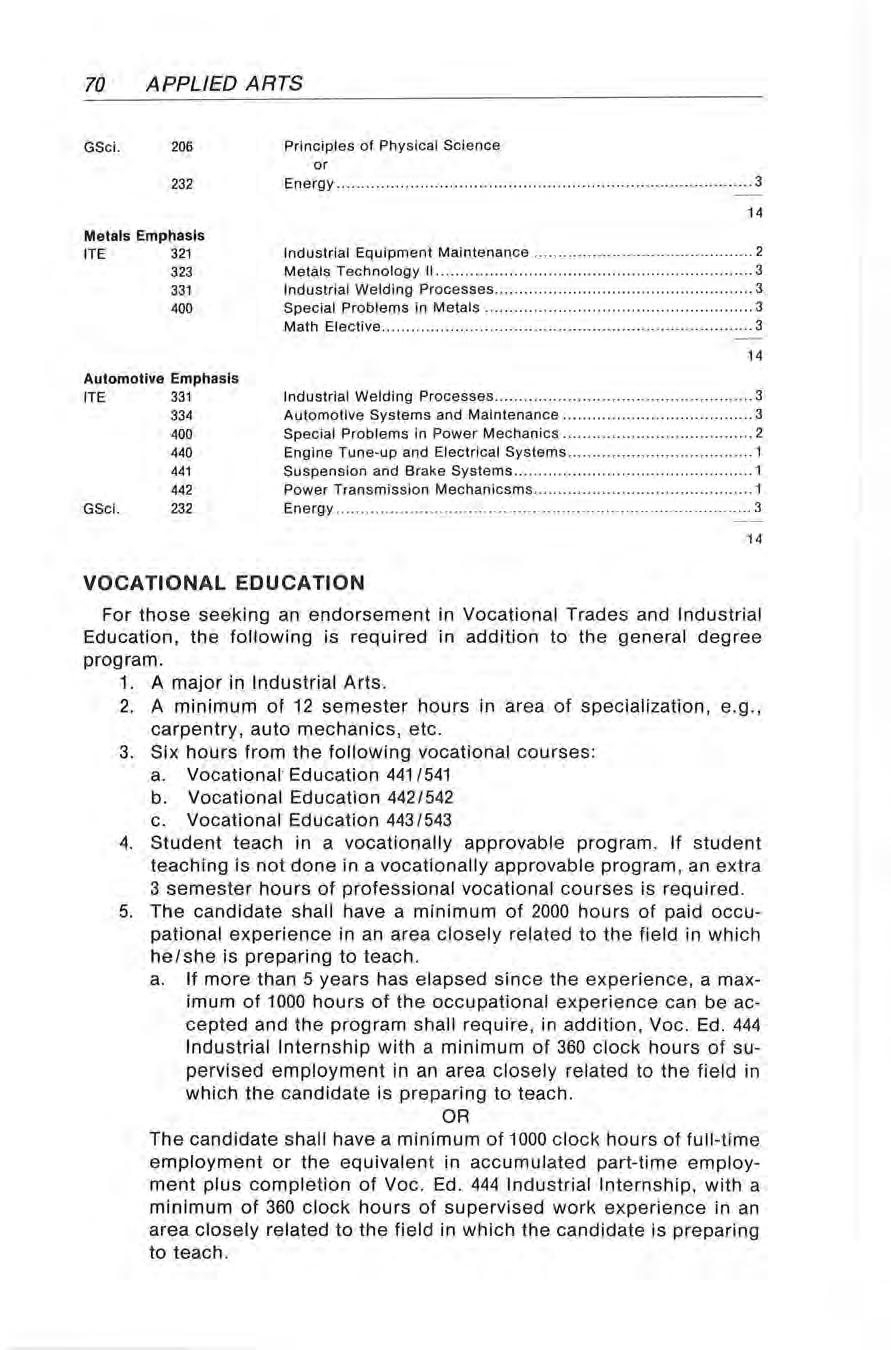
c Vocational Education 443/543
4. Student teach in a vocationally approvable program. If student teaching is not done in a vocationally approvable program , an extra 3 semester hours of professional vocational courses is required.
5 The candidate shall have a m i nimum of 2000 hours of paid occupational experience in an area closely related to the field in which he/she is preparing to teach .
a. If more than 5 years has elapsed since the e x perience , a ma ximum of 1000 hours of the occupational e x perience can be accepted and the program shall require, in addition , Voe Ed. 444 Industrial Internship with a minimum of 360 clock hours of supervised employment in an area closely related to the field in which the candidate is preparing to teach . OR
The candidate shall have a minimum of 1000 clock hours of full-tim e employment or the equivalen t in accumulated part-time employment plus completion of Voe . Ed. 444 Industrial Internship , with a minimum of 360 clock hours of supervised work e x perience in an area closely related to the field in which the candidate is preparing to teach
The following program is suggested for pre-professional home economic s students The catalog of the intended transfer college or university s hould be consulted to insure that basic academic requirements are being met.
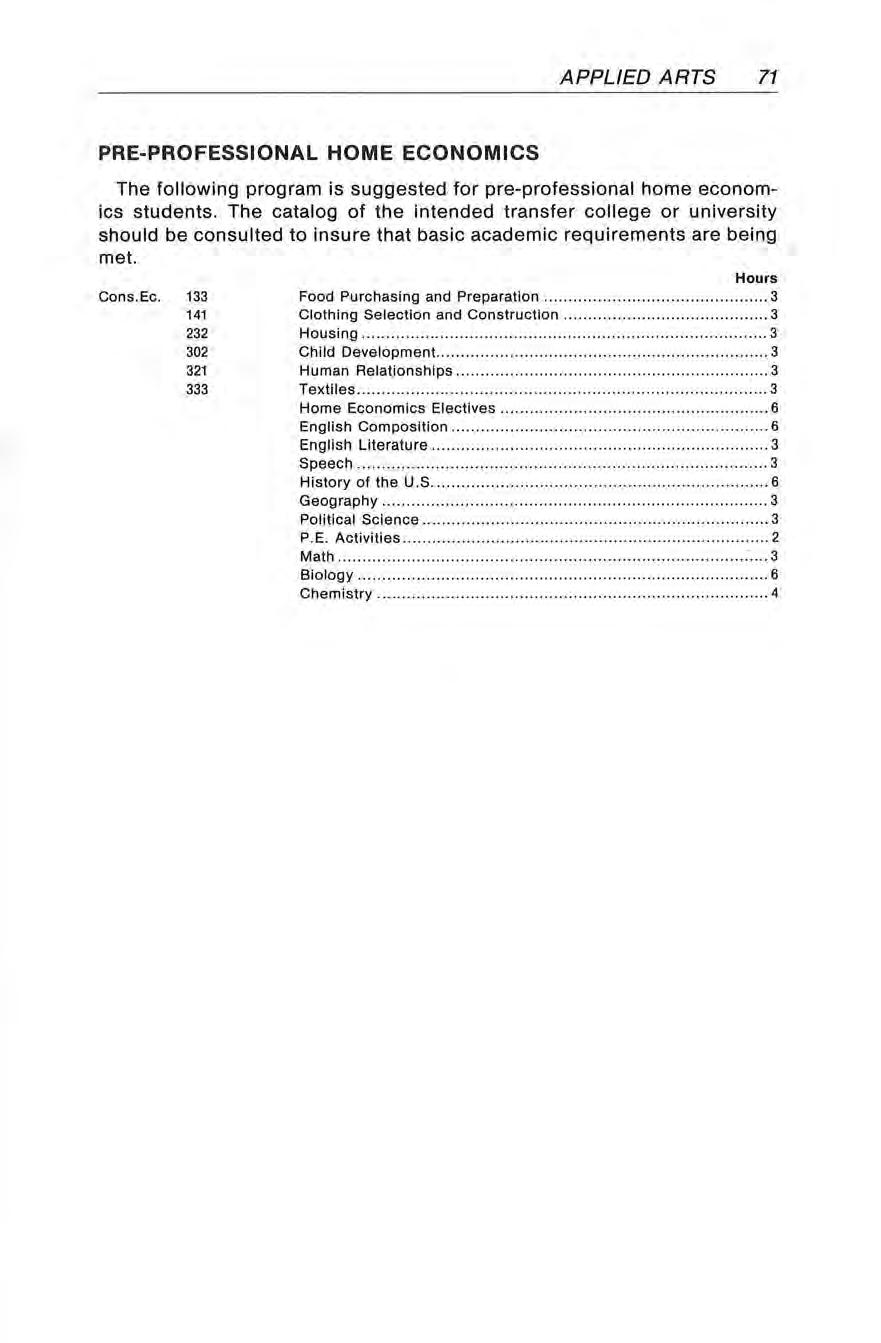
The Division of Business offers programs to prepare students for a wide range of occupations in commerce, industry , and business teacher education. The programs are designed to provide marketable skills and knowledge, preparation for advancement on the job, and background for graduate study . B.A. and S.S. degrees are offered in Business Administration and Business Education

The Business Administration program is taken with a choice of options - Accounting, Management, and Retail Merchandising.
The Business Education degree is offered with subject endorsements in Basic Business and General Office or as a Field Endorsement.
•students who score at the 85th percentile or above on the mathematical section of the ACT test may waive Business Math 100 If Business Math 100 is waived the student must elect an additional 3 hours in Business
The following courses are excluded : Bus 220 , 222, 235, 334 , and 425 A higher level math is preferred if student has the background
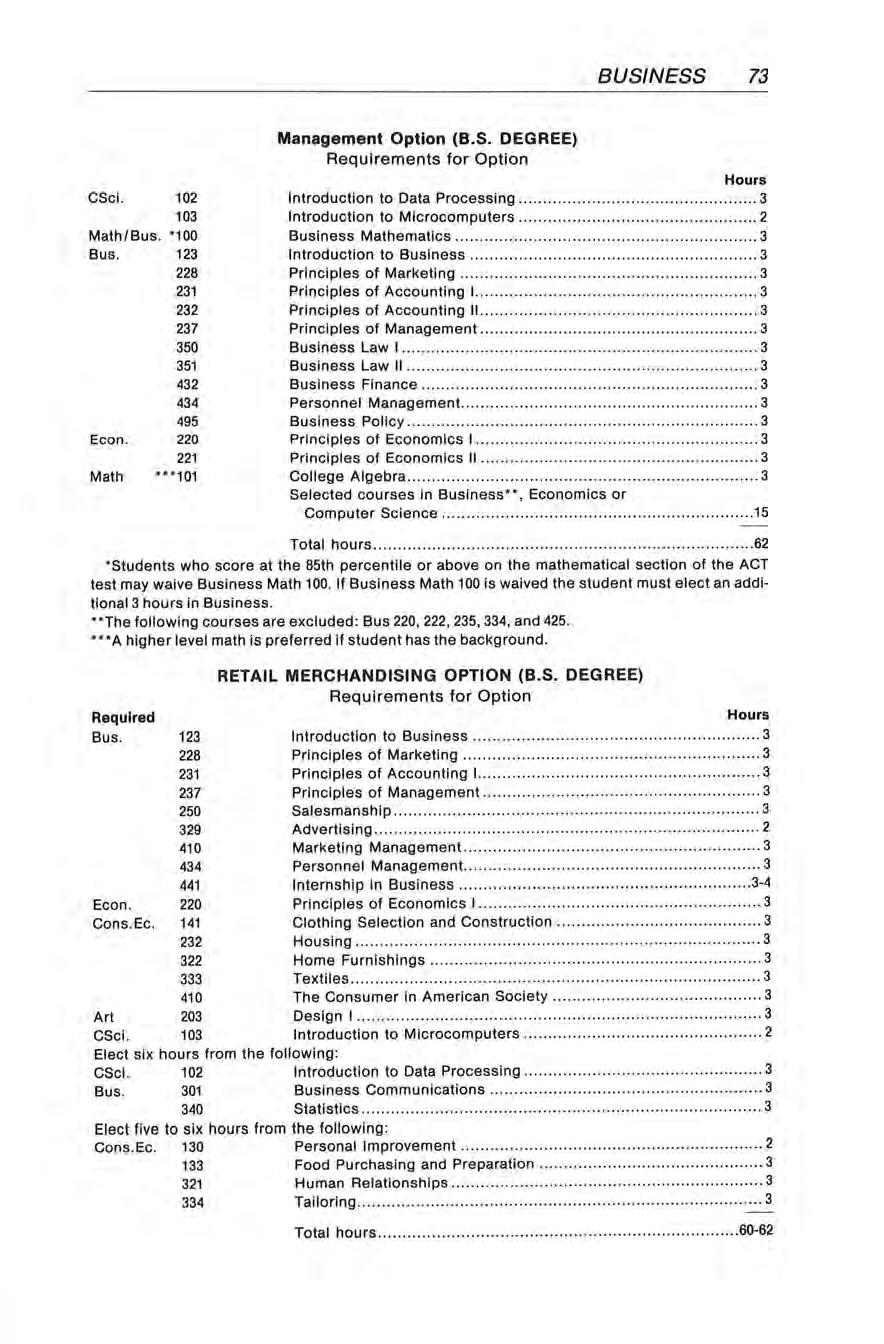
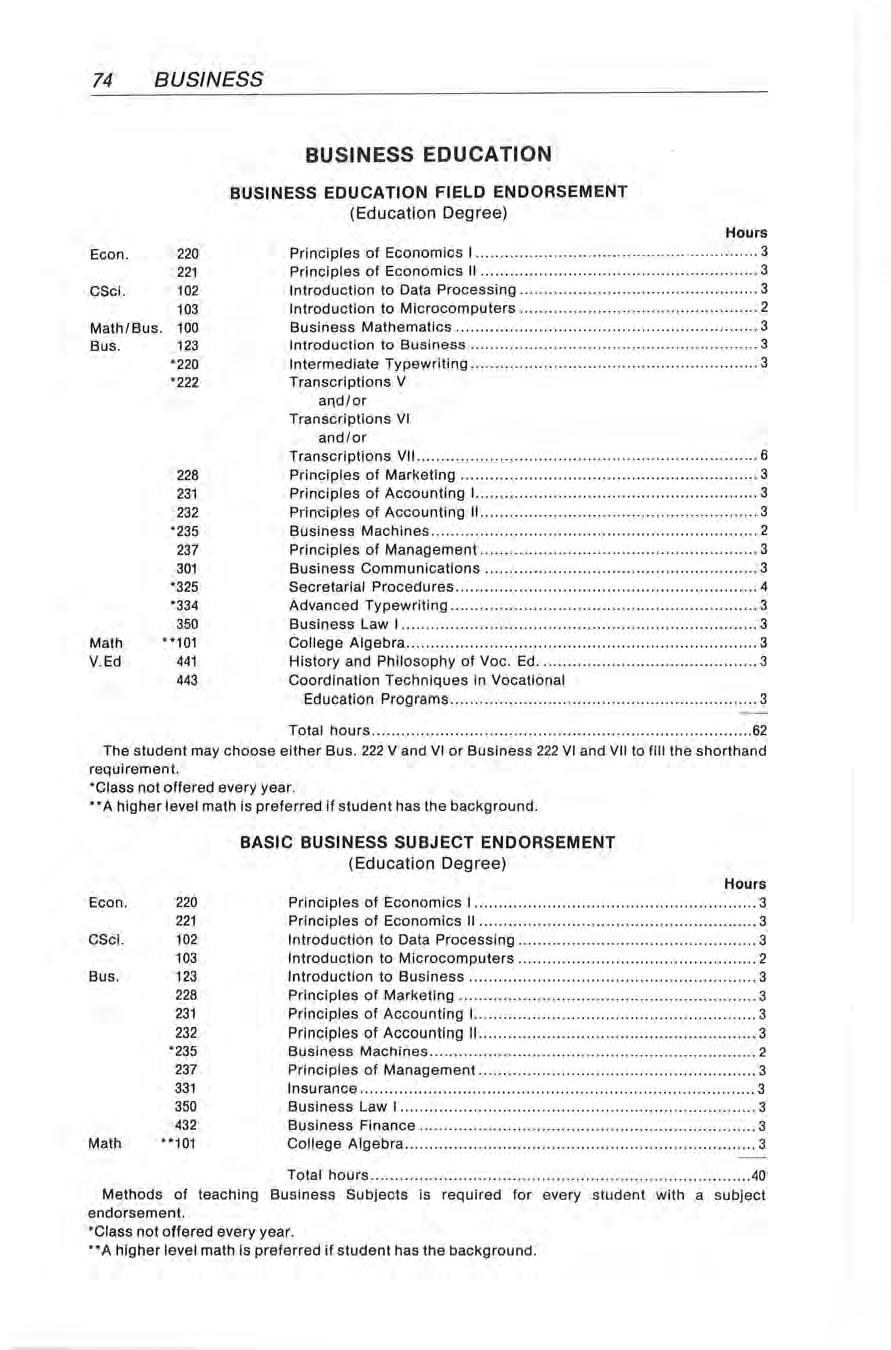
Methods of teaching Business Subjects is required for every student with a subject endorsement.
•class not offered every year
.. A higher l eve l math preferred if student has the background.
For those seeking an endorsement in Vocational Business Educat ion the following is required in addition to the general degree requirements .
1. Complete a Basic Business Subject Endorsement and a General Office Subject Endorsement, OR complete a Business Education Field Endorsement.
2. Six hours of professional vocational courses
a Vocational Education 441 /541
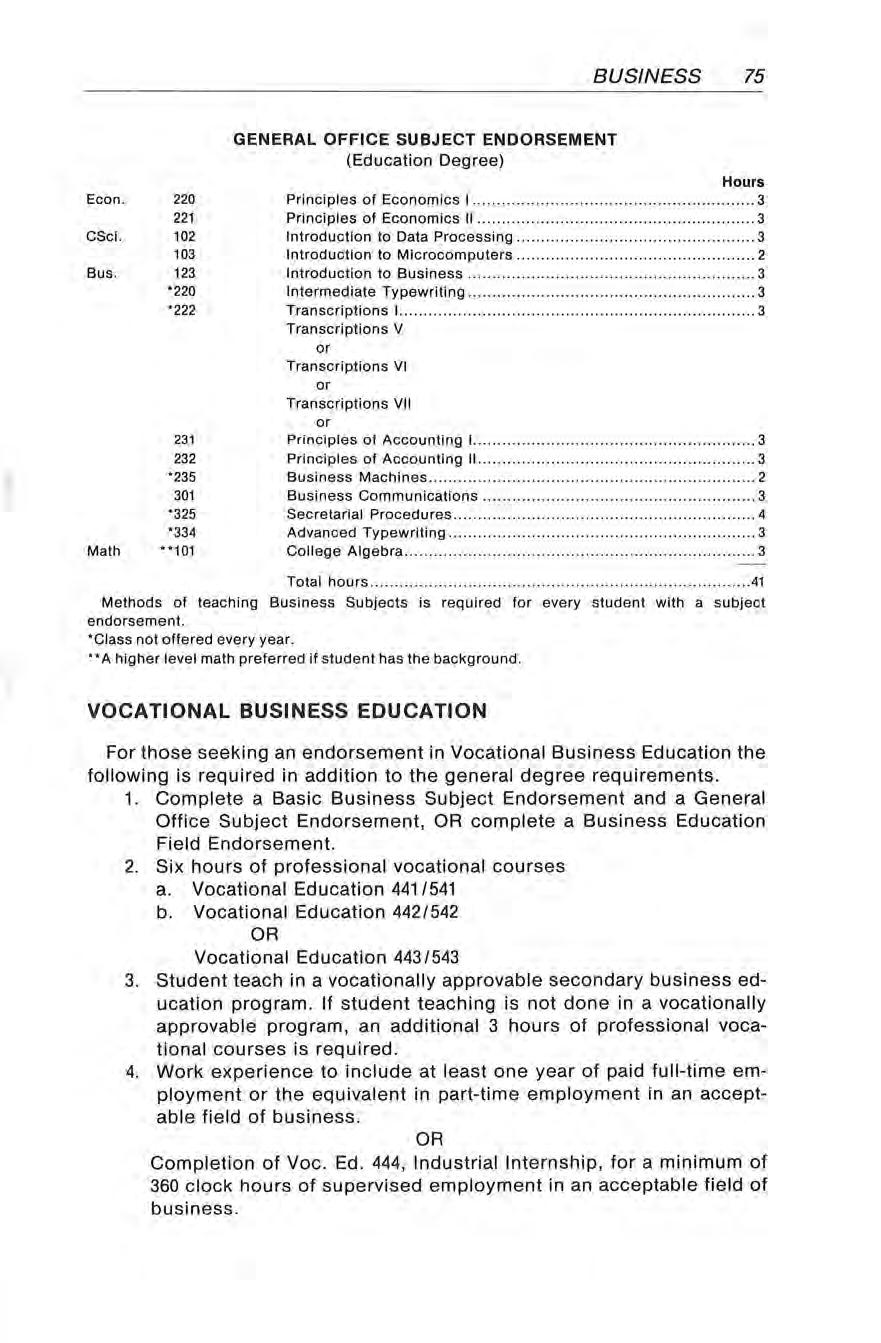
b. Vocational Education 442/542 OR Vocational Education 443/543
3. Student teach in a vocationally approvab le secondary business education program. If student teaching is not done in a vocationally approvable program, an additional 3 hours of professional vocational courses is required.
4. Work experience to include at least one year of paid full-time employment or the equivalent in part - time employment in an acceptable field of business.
OR Completion of Voe Ed 444, Industrial Internship, for a minimum of 360 clock hours of supervised employment in an acceptable field of business.
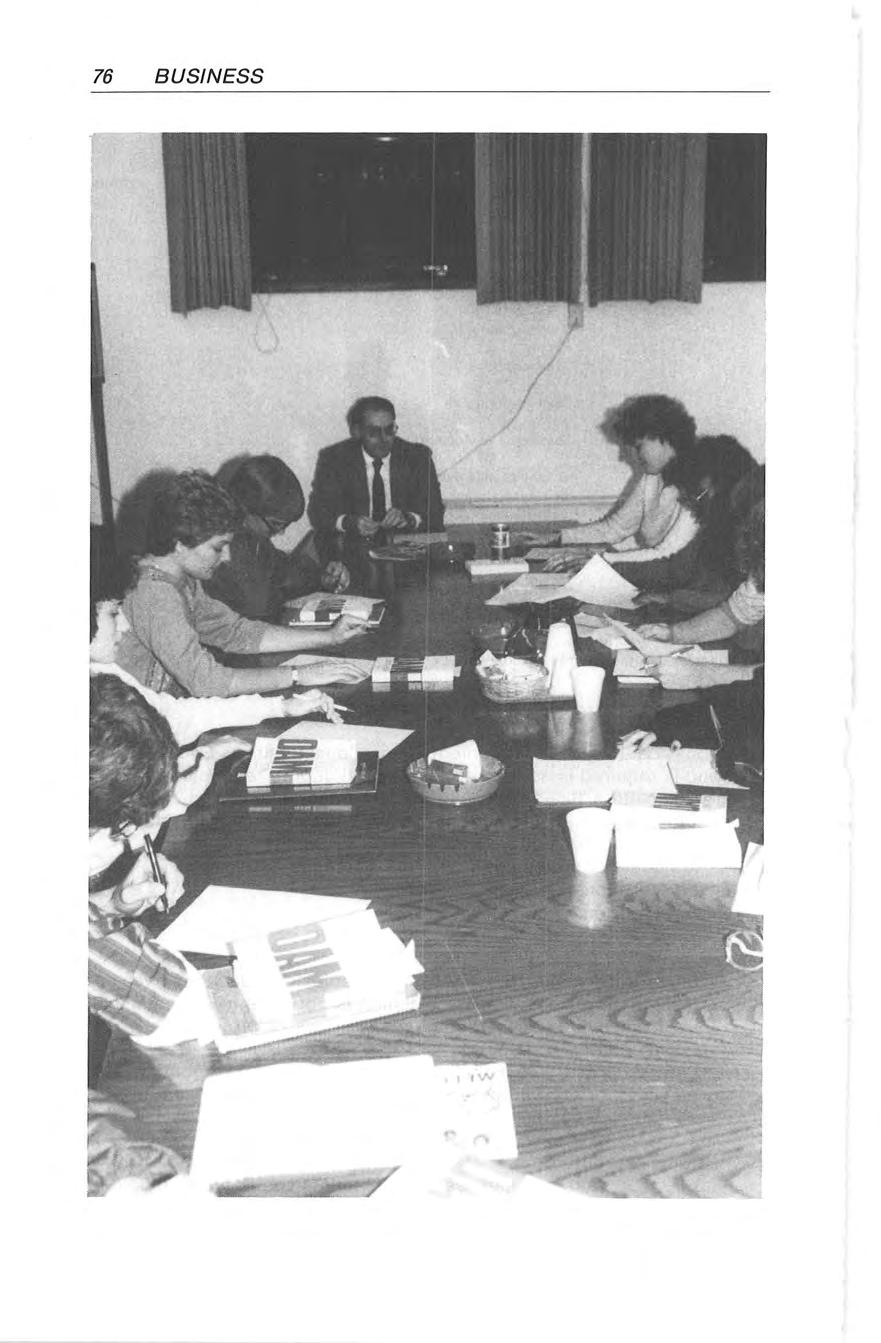
The Division of Education has as its primary responsibility the preparation of effective teachers. The focus, then, of the teacher education curriculum is upon the acquisition and development of effective instructional skills by each student in the program.
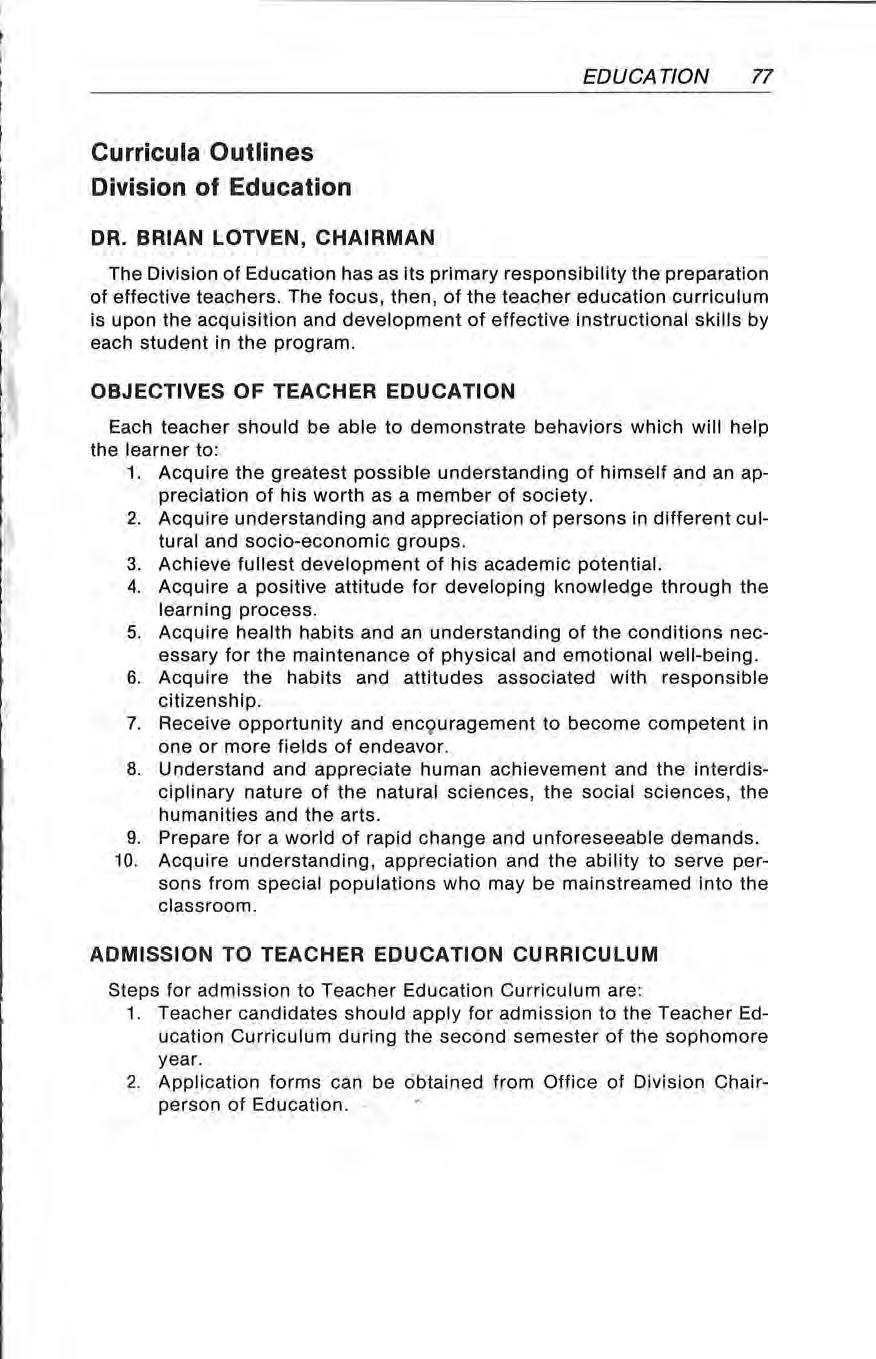
Each teacher should be able to demonstrate behaviors which will help the learner to:
1. Acquire the greatest possible understanding of himself and an appreciation of his worth as a member of society.
2. Acquire understanding and appreciation of persons in different cultural and socio - economic groups.
3. Achieve fullest development of his academic potential.
4. Acquire a positive attitude for developing knowledge through the learning process.
5. Acquire health habits and an understanding of the conditions necessary for the maintenance of physical and emotional well-being.
6. Acquire the habits and attitudes associated with responsible citizenship.
7. Receive opportunity and enc9uragement to become competent in one or more fields of endeavor.
8. Understand and appreciate human achievement and the interdisciplinary nature of the natural sciences, the social sciences, the humanities and the arts.
9. Prepare for a world of rapid change and unforeseeable demands
10 . Acquire understanding, appreciation and the ability to serve persons from special populations who may be mainstreamed into the classroom.
Steps for admission to Teacher Education Curriculum are:
1. Teacher candidates should apply for admission to the Teacher Education Curriculum during the second semester of the sophomore year
2. Application forms can be obtained from Office of Division Chairperson of Education ,
3. Upon completion and return of application forms to Chairperson , Division of Education, an appointment for an Interview with the designated member of the Teacher Education Committee should be made. Each teacher candidate will be informed by the Teacher Education Committee of his admission or denial to Teacher Education.
4. A teacher candidate may request a hearing before the Teacher Education Committee by making written application to the Chairman, Division of Education.
1. Free from social probation.
2. Overall Grade Point Average of at least 2.50.
3. A minimum GPA of 3.0 in all professional education courses.
4 Recommended by persons who by virtue of past associations are in a position to know the student as a prospective teacher.
5. Evidence of proficiency in English and Mathematics as indicated by scores at or above the fiftieth percentile on the ACT Program in the areas of English and Mathematics. Students with scores less than this are required to achieve a score of 35 or better on the Missouri College English Test.
6. Satisfactory interview will be conducted by representative of Division of major emphasis
A student may apply for admission to the Teacher Education Curriculum before the student: (1) meets the Grade Point Average of 2 5 (2) is free from social probation. No formal action will be taken by the Teacher Education Committee until the deficiencies have been rectified.
Information rega r ding teaching certificates may be obtained from the Chairman of the Division of Education or from the Director of Teacher Certification, State Department of Education, Lincoln, Nebraska, 68509 .
All applicants are hereby advised that meeting academic or graduation requirements does not automatically complete requirements for institutional endorsement.
According to Nebraska Teacher Certification, the College has the responsibility of endorsing qualified persons for certificates. This responsibility has been delegated J <? the Teacher Education Committee. An endorsement indicates the grad,e lev ~ I , subject field or area of specialization for which the teacher was especially prepared, and implies that the applicant has met appropriate standards of scholarship , sound mental and physical health, good citizenship, and moral character.
Application for certification with the appropriate earned endorsements is made on "call back day " during the student teaching experience .
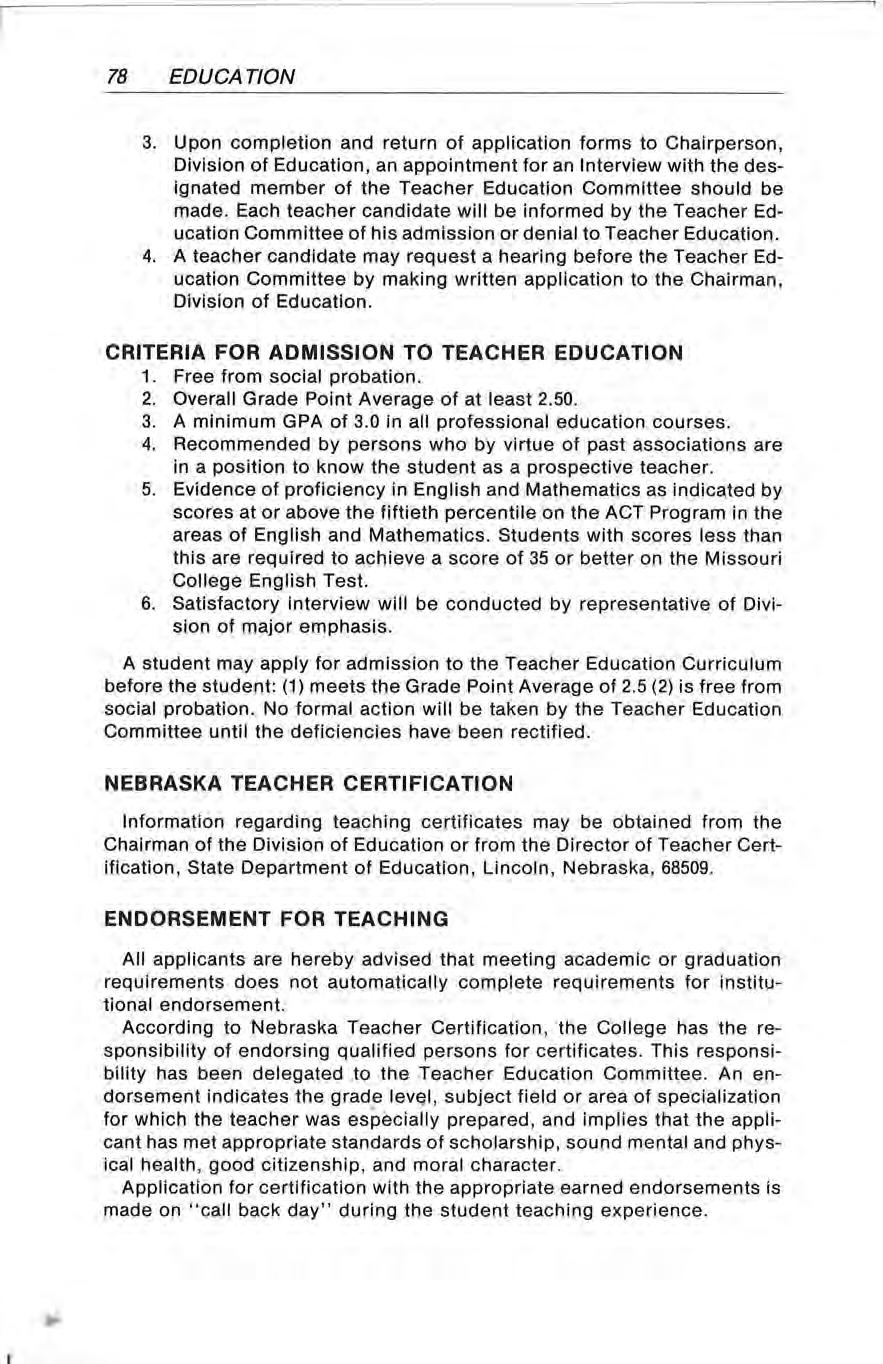
Candidates must submit application for the Professional Semester be~ fore the end of the junior year.
To be eligible for assignment to student teaching, the student must meet the following requirements.
1. The student must have been accepted into the teacher education curriculum and have maintained the GPA required for admission to teacher education.
2. The student must maintain all minimum criteria for admission to teacher education as a prerequisite to the professional semester.
3. The student must present evidence that sufficient credits for the degree will have been earned one calendar year from the date of entry into the Professional semester.
4. The student must have completed the following:
Psych 121 Introduction to Psychology
Ed 200 Foundations of Education
Psych 205 Educational Psychology
Ed 207 Practicum Methods Courses
5. Each application for the professional semester must be approved by:
1. Members of the Teacher Education Committee
2. Division Chairman for each major
3. Chairman, Division of Education
The Division of Education is responsible for offering the required professional education courses, exclusive of Secondary Special Methods, for all elementary and secondary majors.
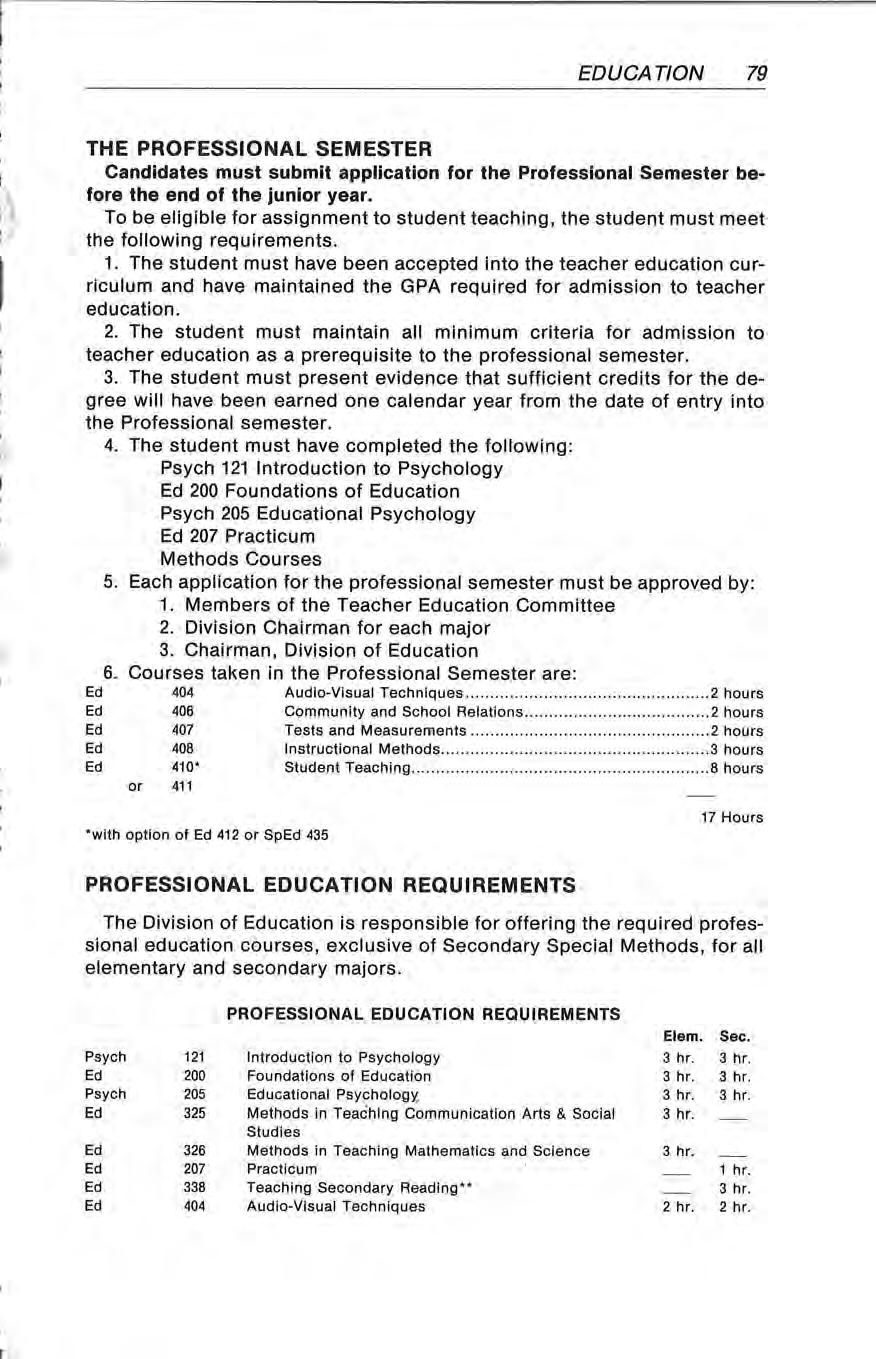
All students seeking an endorsement in secondary educat i on must take Pol. Sci. 201, American National Government: Geog. 101, Principles of Physical Geography; Eng.202, Appreciation of Literature; and 3 hrs. of American History.
In addition to all general and professional education requirements, the student must complete a major in one field or two subjects as designated below.
Art (K -12)
*Business Education (7-12)
Health and Physical Educ (7-12)
* Industrial Arts (7-12)
Languange Arts (7-12)
Mathematics (7-12)
Music (K-12)
Natural Science (7-12)
••social Science (7-12)
Sociology (7-12)
Special Education (7-12)
Speech/ Drama (7-12)
Basic Business (7-12)
Biology (7-12)
Chemistry (7-12)
English (7-12)
General Office Education (7-12)
History (7-12)
Physical Education (K-6) (7-12)
Psychology (7-12)
Additional teaching endorsements in Coaching, Driver ' s Education , and Computer Science are offered to complement any of the above areas
* Vocational certification is available upon completion of required work e x perience and Vocational Education classes Trades and Industry endorsement is available.
** Additional endorsements possible-History, Geography, Economics, Political Science , Psychology and Sociology
The Rules for the Issuance of Certificates and Permits to Teach, Counsel, Supervise and Administer in Nebraska Schools (Rule 21) states that after September, 1981 one subject field or two subjects or special education categories or combinations thereof are required for the initial issuance of the Pre - Standard Teaching ' certificate in Nebraska.
Degree candidates seeking •a t e aching endorsement at the secondary level are further advised that to teach in a field outside of the major in a school accredited by the North Central Association, 24 hours are generally required . This latter condition does not necessarily imply that the candidate will qualify for a second endorsement.
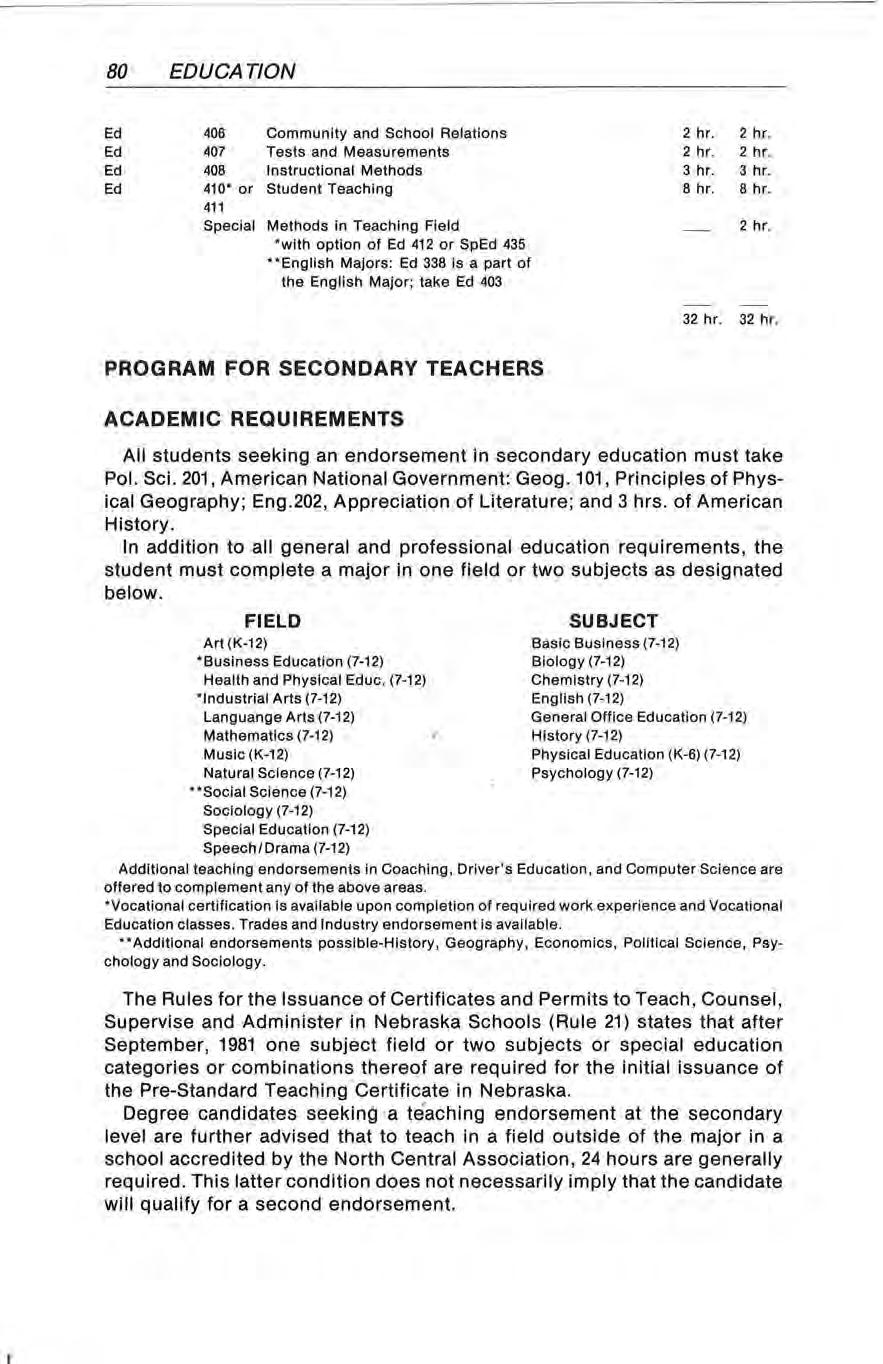
The Division of Education offers four year degree programs in Elementary Education, Elementary Education with an endorsement in Early Childhood Education , Elementary or Secondary Education with an endorsement in Special Education.
Requirements for Major
In addition to all general and professional education requirements, students must complete the following academic requirements The candidate must also earn 24 hours in one academic area, and 15 hours in each of two additional areas commonly taught in the elementary schools, along with 15 hours (electives). These "areas" represent the various instructional division of the College American History and American National Government are required of all students seeking
CHILDHOOD EDUCATION
Academic Requirements
The curriculum leading directly to a Bachelor of Science in Education degree for elementary majors with an endorsement in early childhood education is designed for those who wish to prepare for teaching in day care , preschool or kindergarten programs. The Curriculum follows the program for elementary teachers (which meets the academic requirements for elementary teaching certification) and requires the following sequence of courses which may be used in lieu of the 24 hour block ordinarily required in elementary education.
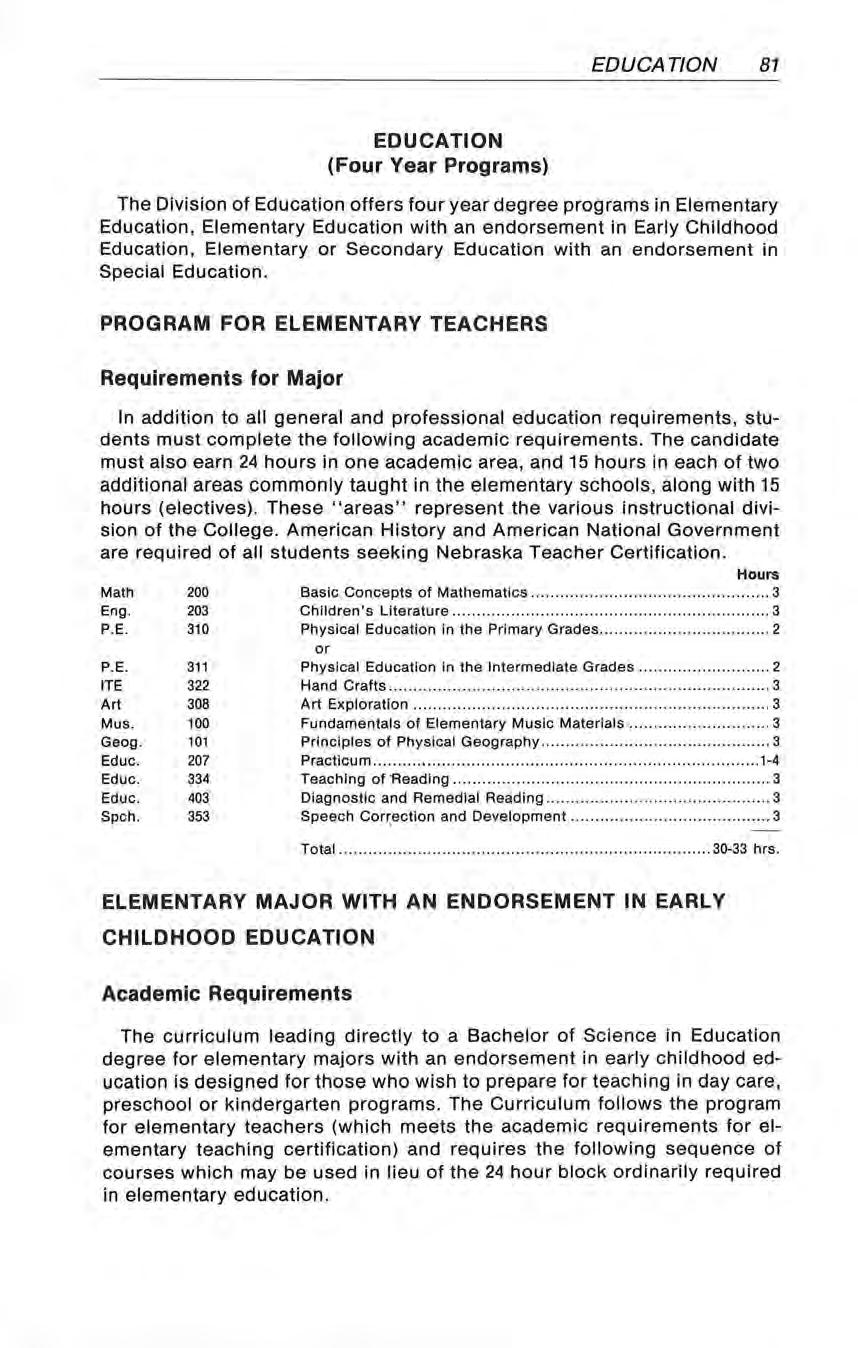
Ac ademic Requirements
The curriculum leading to a Bachelo r of Science in Education degree for elementary education majors with an endorsement in special education is designed for those who (1) wish to prepare for teaching the mild/moderately handicapped; and (2) wish to prepare as a resource teacher. The Curriculum follows the program for elementary or secondary teachers and requires the following sequence of courses . This sequence of courses may be used i n lieu of the 24 hour block ordinarily required in elementary education
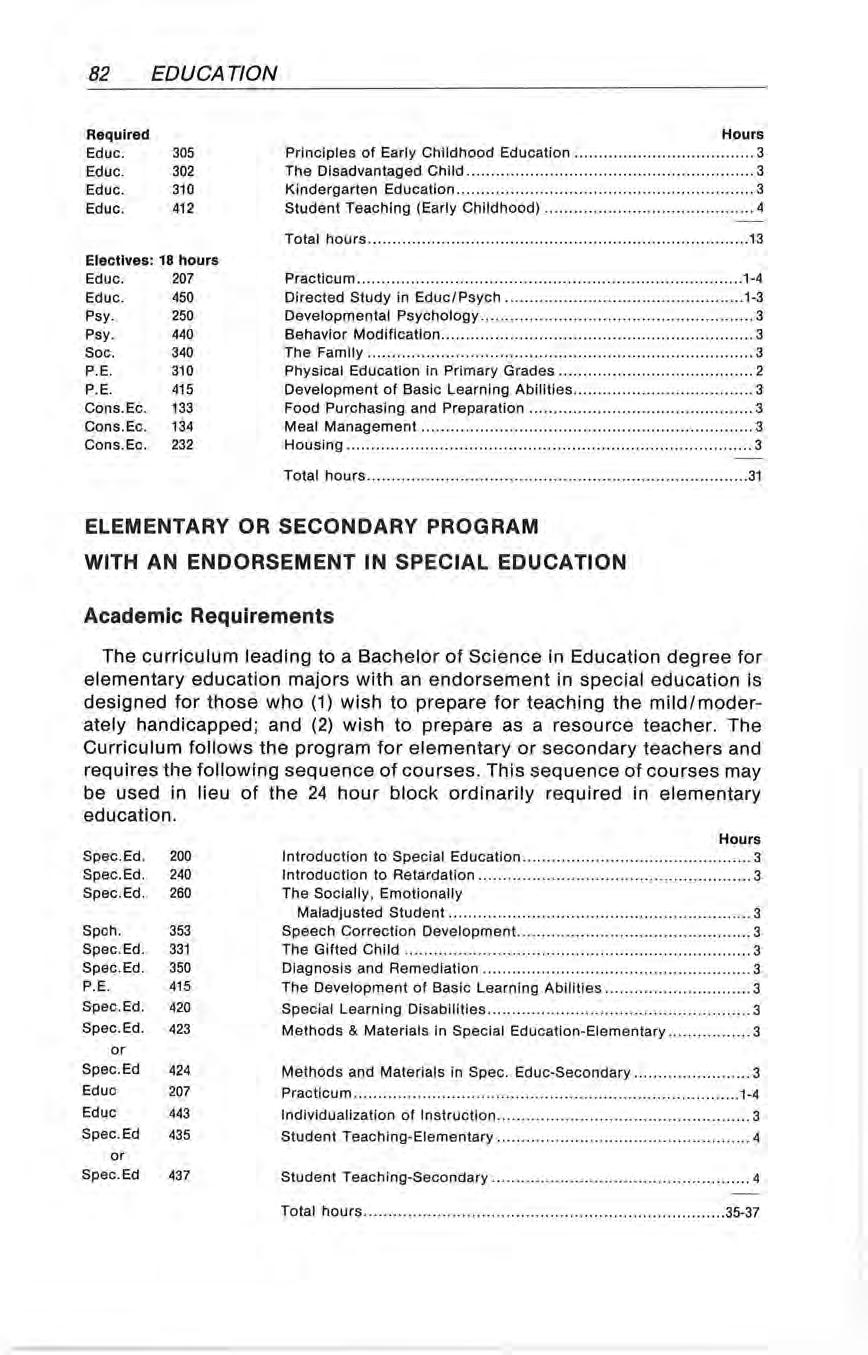
(Two Year Program)
The Department of Education offers an Associate of Arts degree program in Early Childhood Education. The curriculum is designed to prepare paraprofessionals for positions in early childhood education.
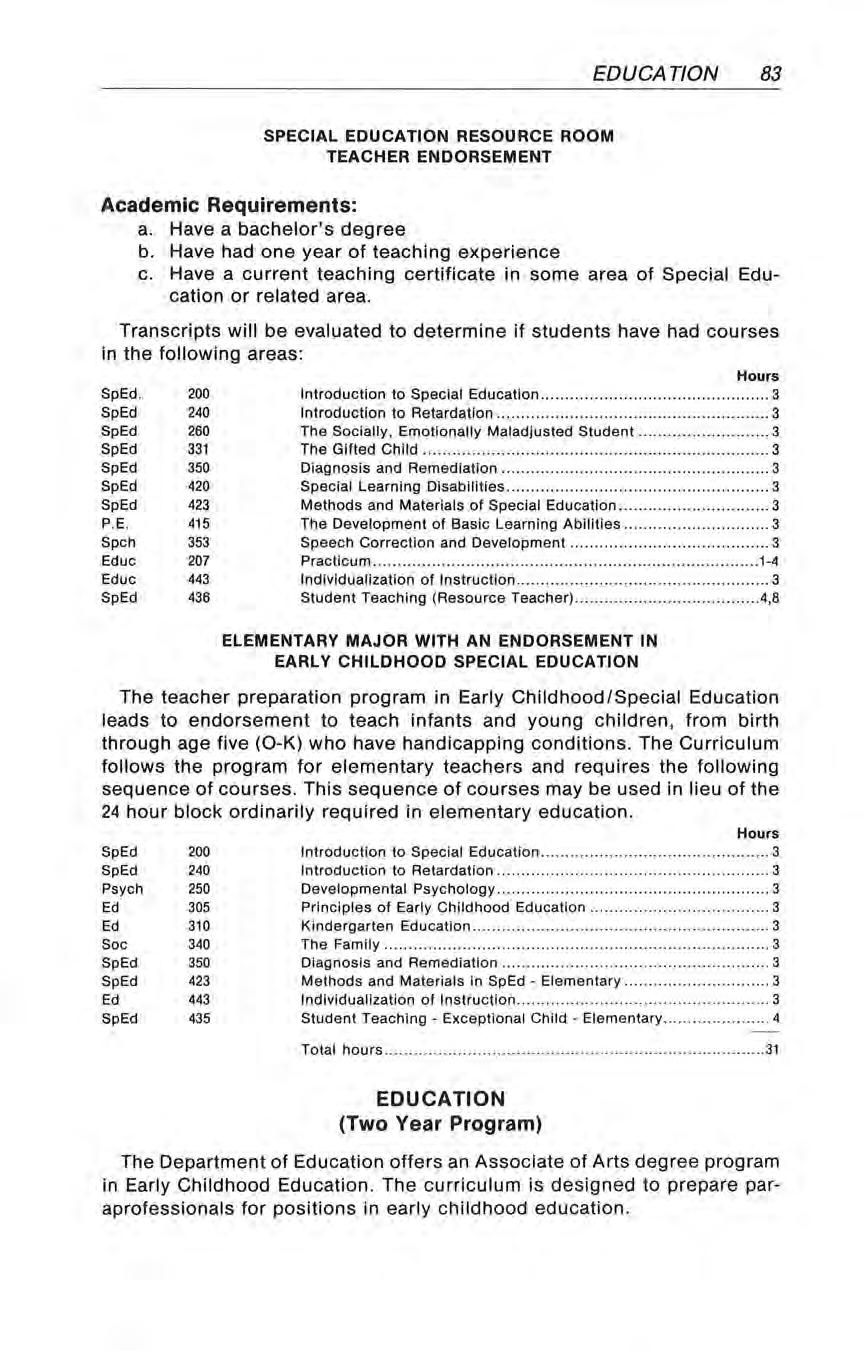
A ll co u rses carry fu ll cred i t to w ard the Bac h e lo r of Science deg r ee and ma y be app li ed to a reg ul ar fo ur-yea r pr o gra m. St u de n ts are e n c our aged to u l t i mate l y p ur sue the bacca l a u reate degree. Specia l pro v isi o ns of this program when offered at Offutt Air Base are o u t l ined i n the August 3, 1982 minutes of Academic Affa i rs.
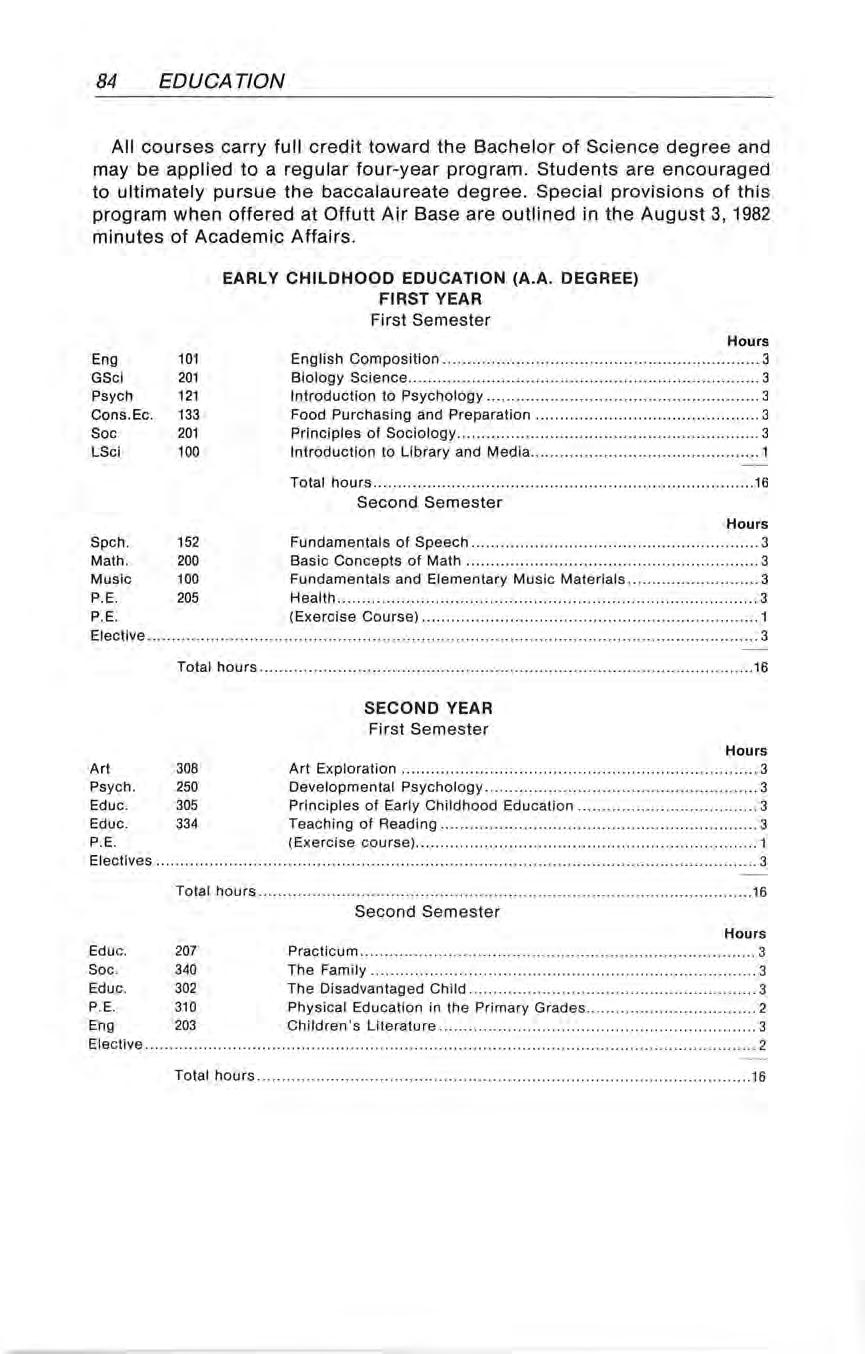
The Division of Humanities offers programs in Language Arts, Social Sciences, and Visual and Performing Arts.
A common core of courses has been developed for each of these three areas. This core is based upon meeting specific degree requirements and providing a background for teaching or for a career in a variety of professions. The Language Arts area includes English and the broader area of the Language discipline The Social Sciences include , in addition to the general Social Science area, options in Geography, History, Psychology, Sociology and Social Work . The Visual and Performing Arts area provides opportunities for specializing in Art, Music or Speech and Drama.
Four year programs are offered which lead to the Bachelor of Arts and Bachelor of Science Degrees in either Education or Liberal Arts
The Language Arts program provides the education necessary for either a field endorsement or subject endorsement in English Students planning to teach only in the English area might well seek the field endorsement. Those wishing to include a related area in addition to English might choose the subject endorsement.
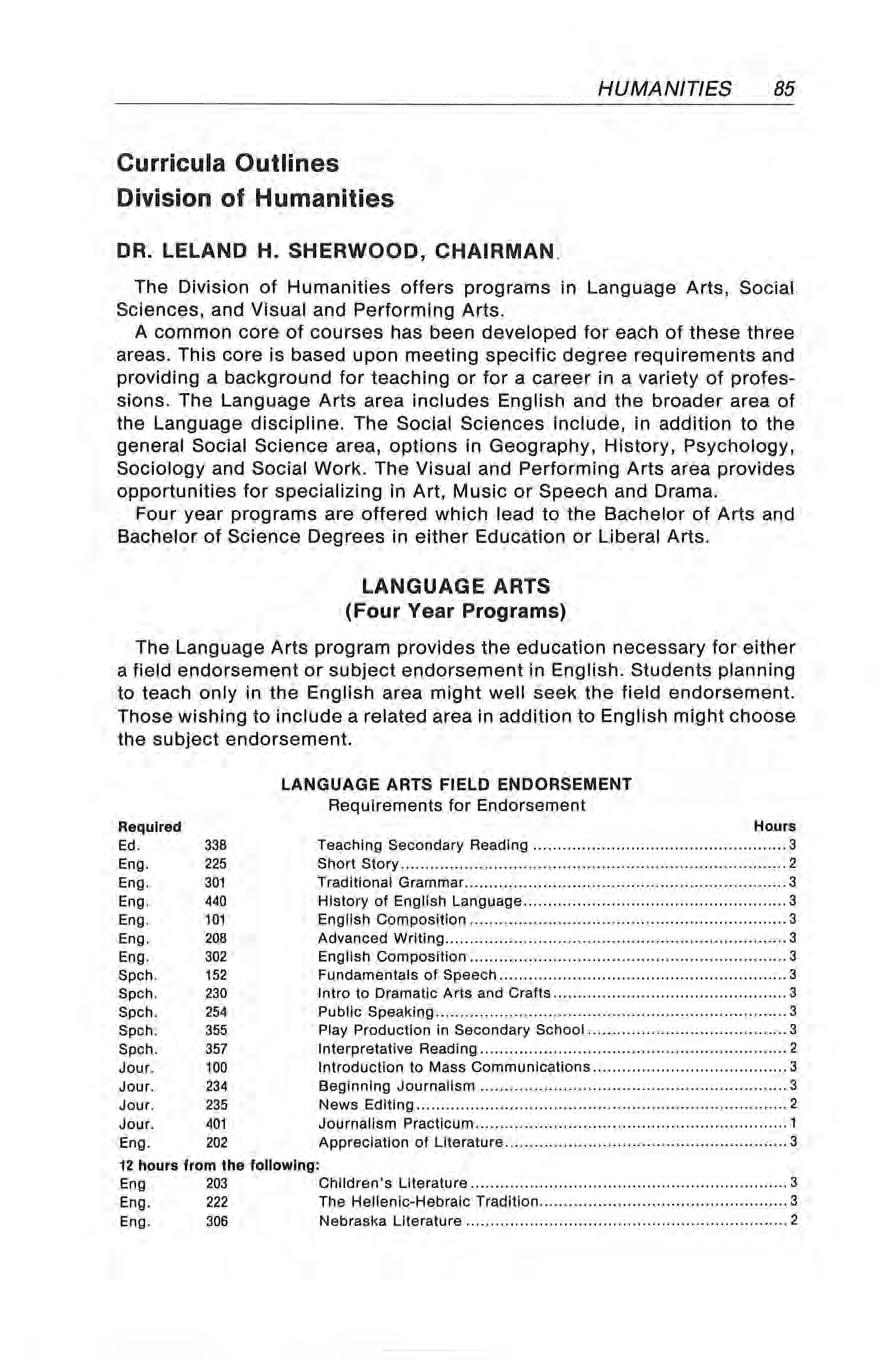
(Four Year Program)
The Social Science area offers a wide range of degree programs in both teaching and non - teaching professions. Those wishing to teach may specialize in History, Social Science,
, or Sociology, while those seeking non-teaching degrees may select from
chology-Sociology and Social Work.
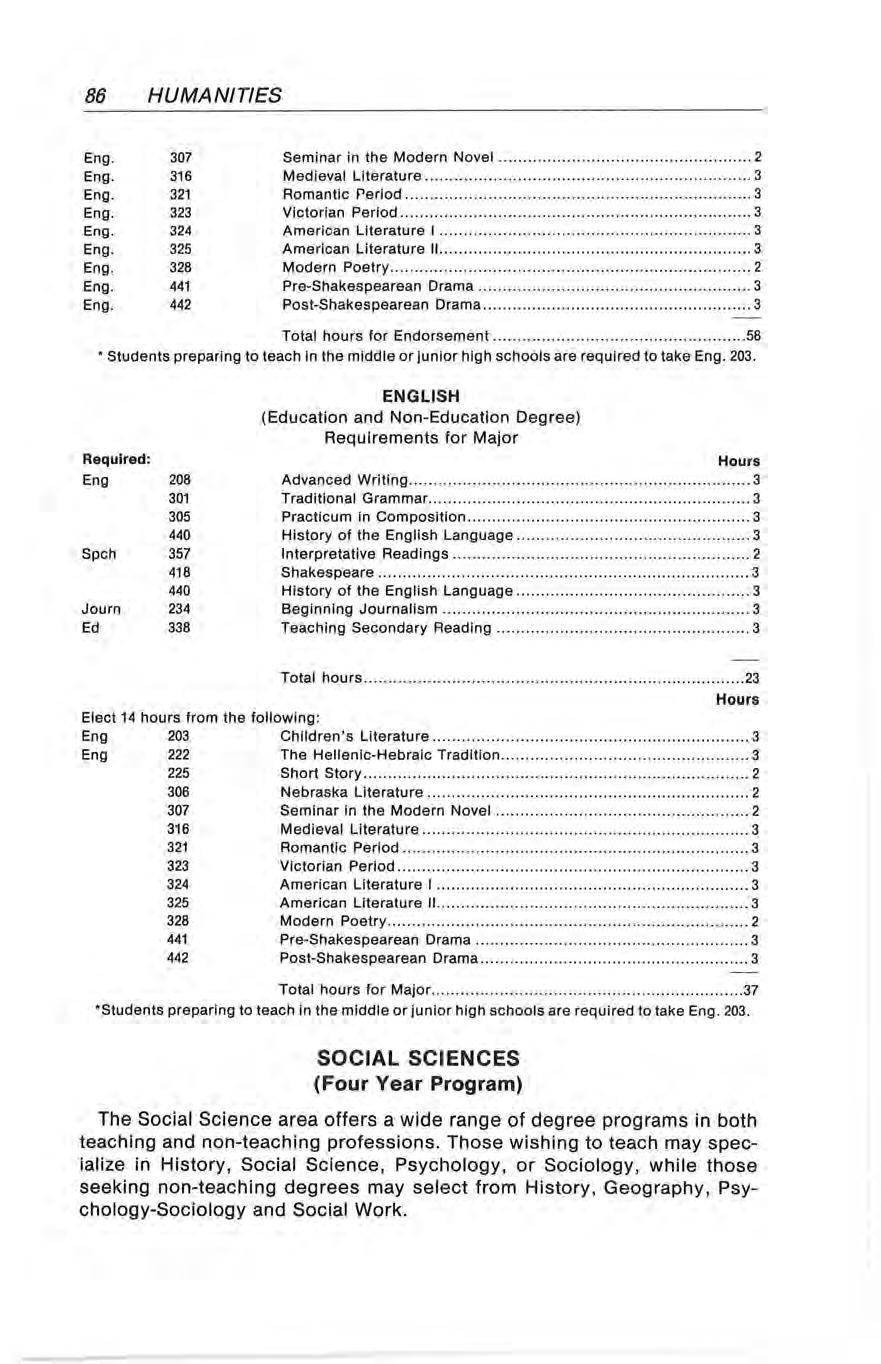
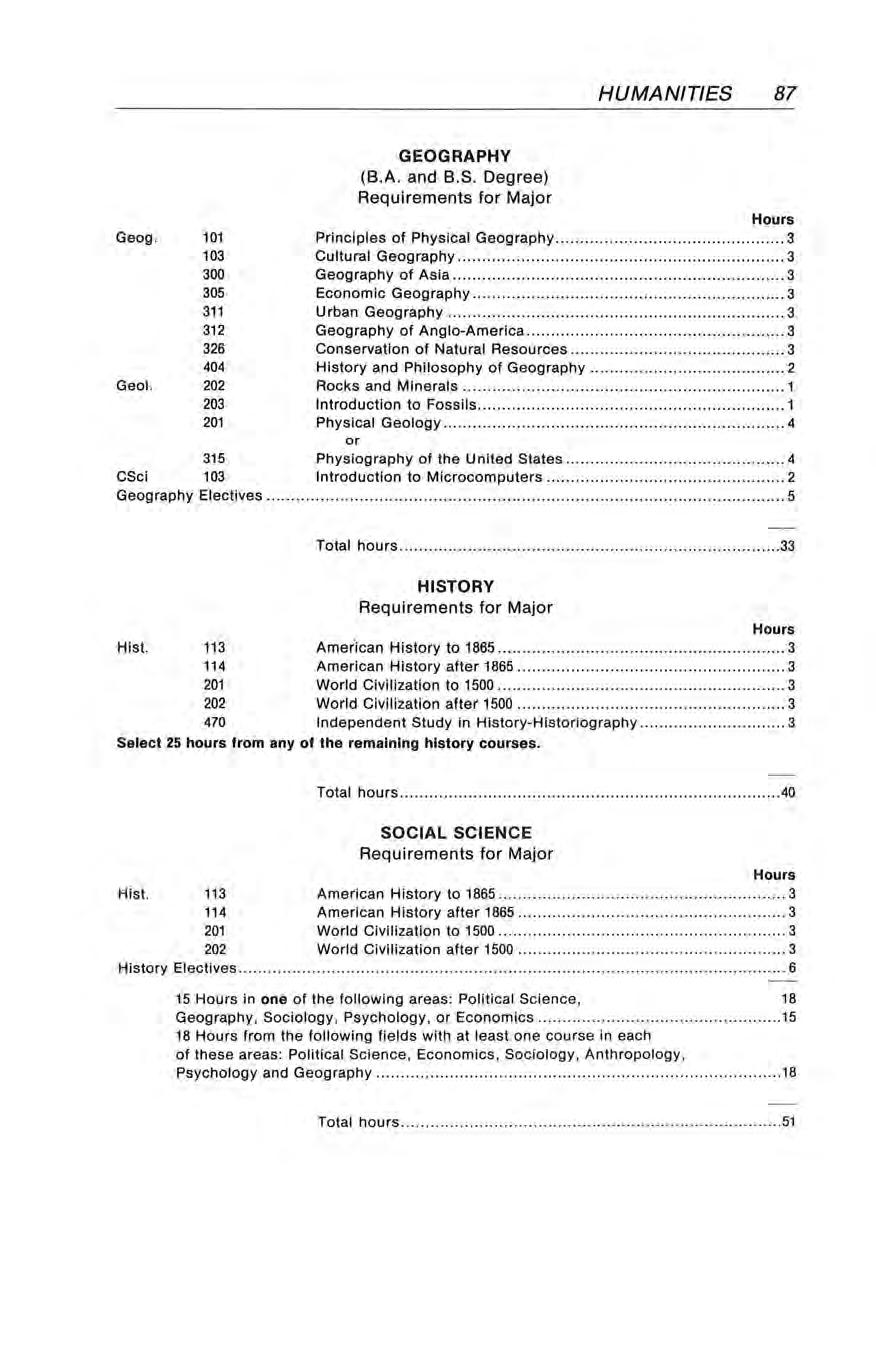
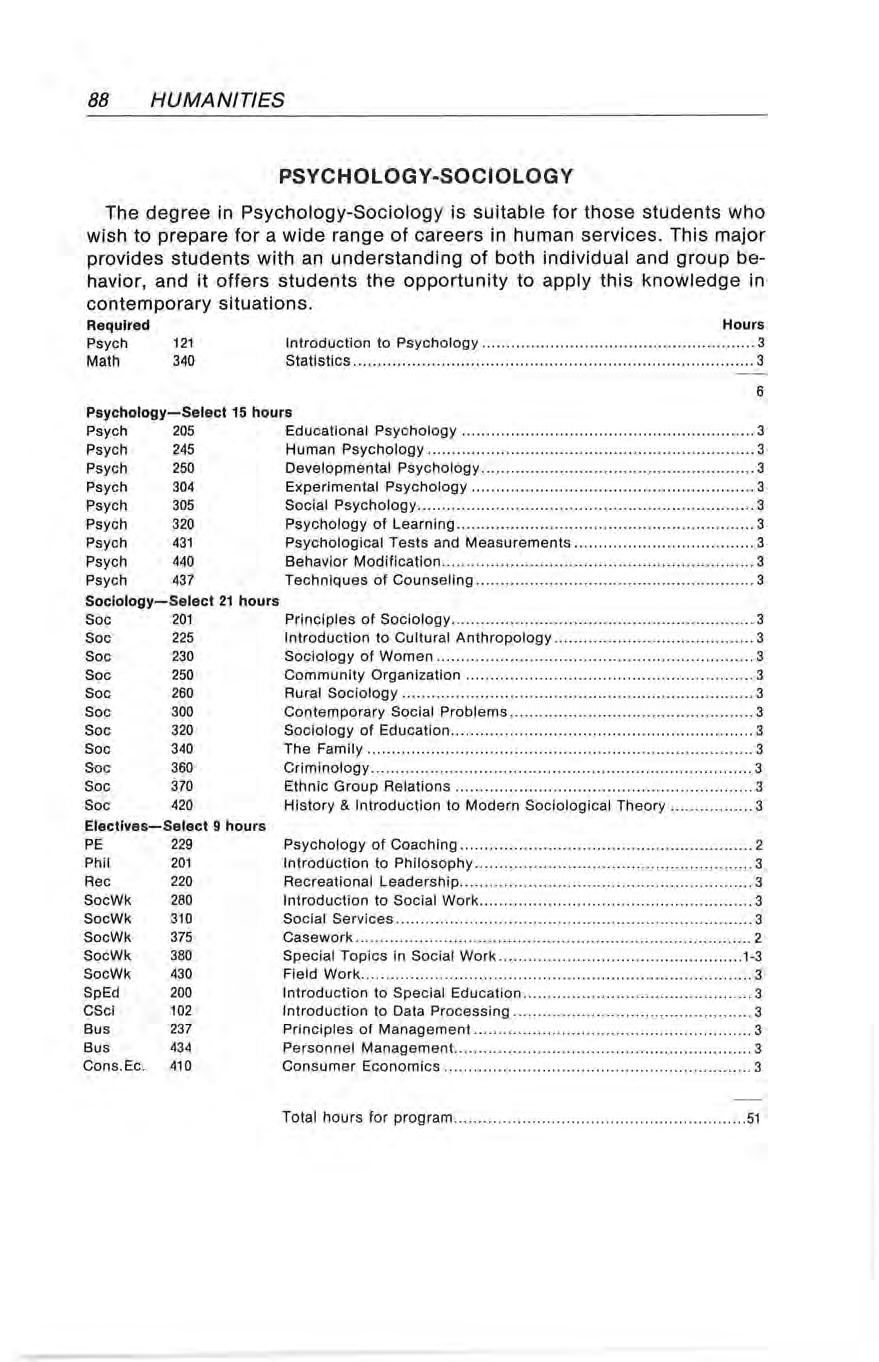
The degree in Psychology-Sociology is suitable for those students who wish to prepare for a wide range of careers in human services This major provides students with an understanding of both individual and group behavior, and it offers students the opportunity to apply this knowledge in
.
Students preparing to teach psychology in the high school are required to fulfill the general educational requirements and the secondary professional educational requirements. Students may obtain a teaching endorsement in psychology by completing 15 semester hours of coursework in psychology in addition to completing all other requirements for a Social Science endorsement. Or, a student may take psychology as a subject endorsement.
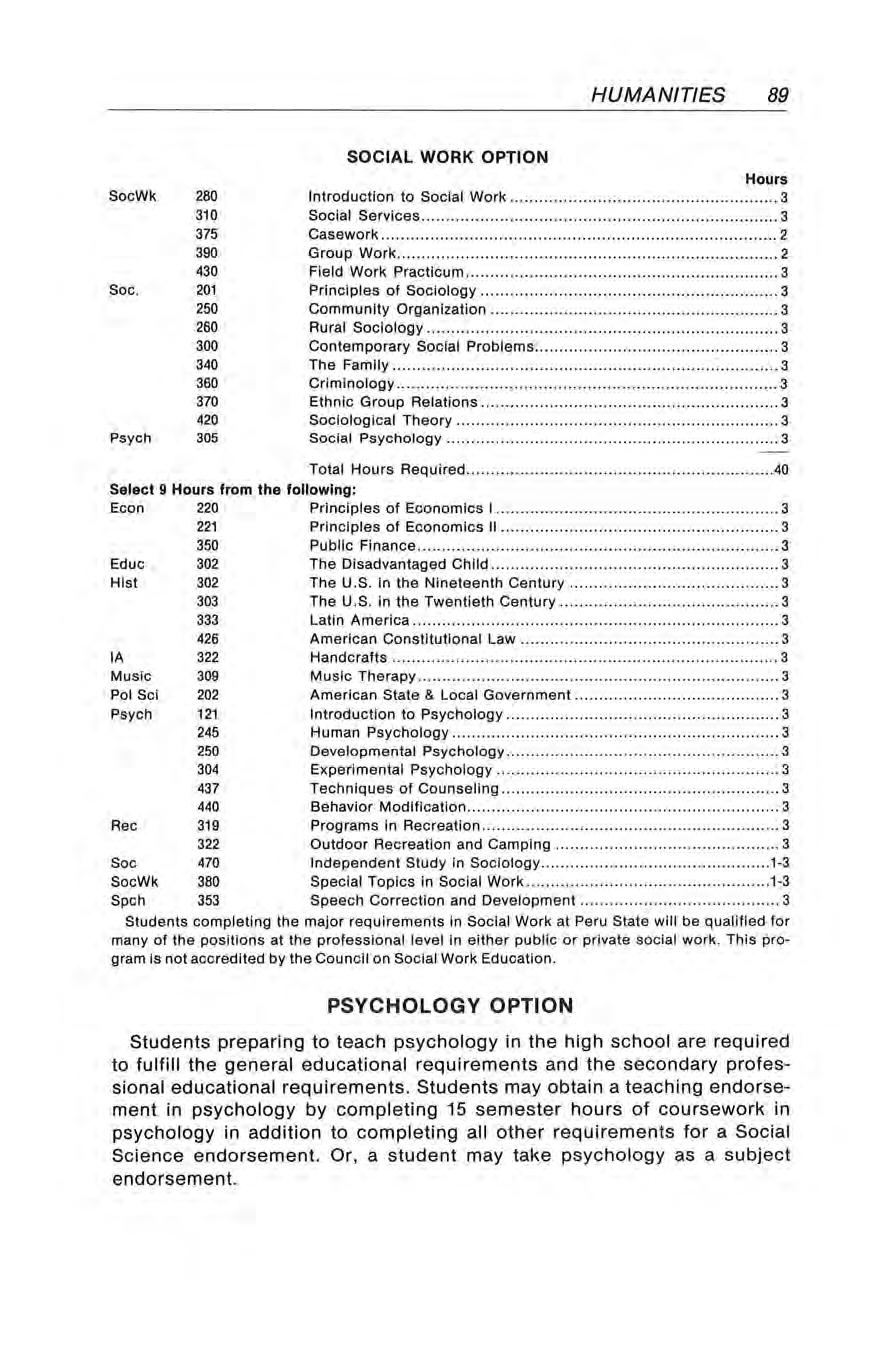
Students preparing to teach sociology in the high school are required to fulfill the general educational requirements and the secondary professional education requirements. Students may obtain a teaching endorsement in sociology by completing 15 semester hours of coursework in sociology in addition to completing all other requirements for a Social Science endorsement. Or, a student may take sociology as a subject endorsement.
Prospective law students are urged to take a Bachelor's degree prior to beginning their legal studies. Application to the law school of the student's choice should be made early in the fourth year of the pre-legal study
Most students interested in law may choose much of their course work from those fields in which he has the most interest.
Some work in English composition is important since the ability to use the English language effectively is highly recommended for law students.
Pre-law students are assigned an advisor who works closely with them in programming the four years of study
Options available through Visual and Performing Arts provide opportunites for students to develop skills in Art, Speech and Drama, or Music. Degrees may vary, depending upon the type of profession one chooses. The Bachelor of Arts in Education Degree is offered in Art and in Speech and Drama while the Bachelor of Fine Arts in Education Degree is offered in Music Each program is designed to provide the student a variety of experiences and means of self expression through the Arts.
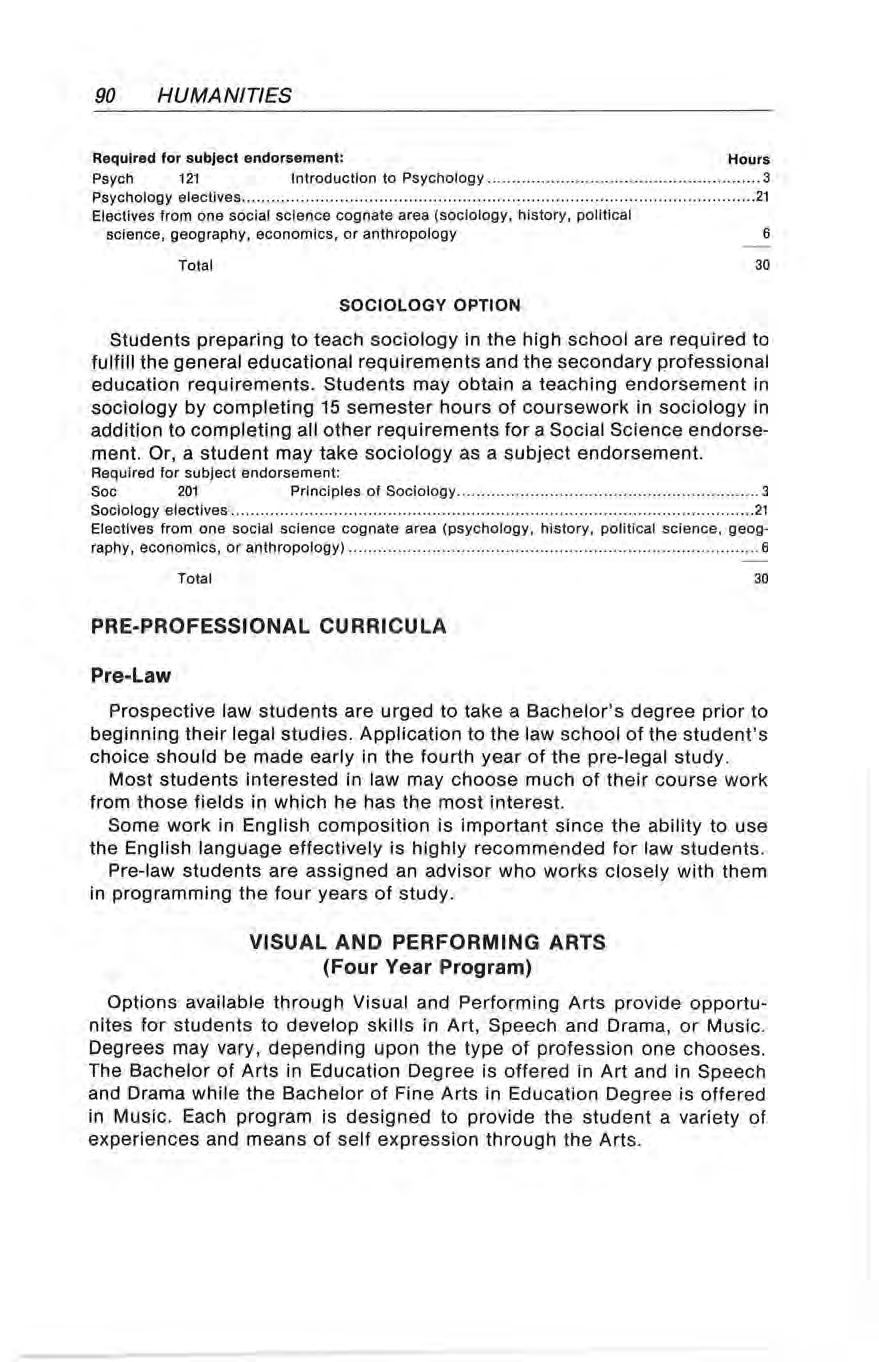
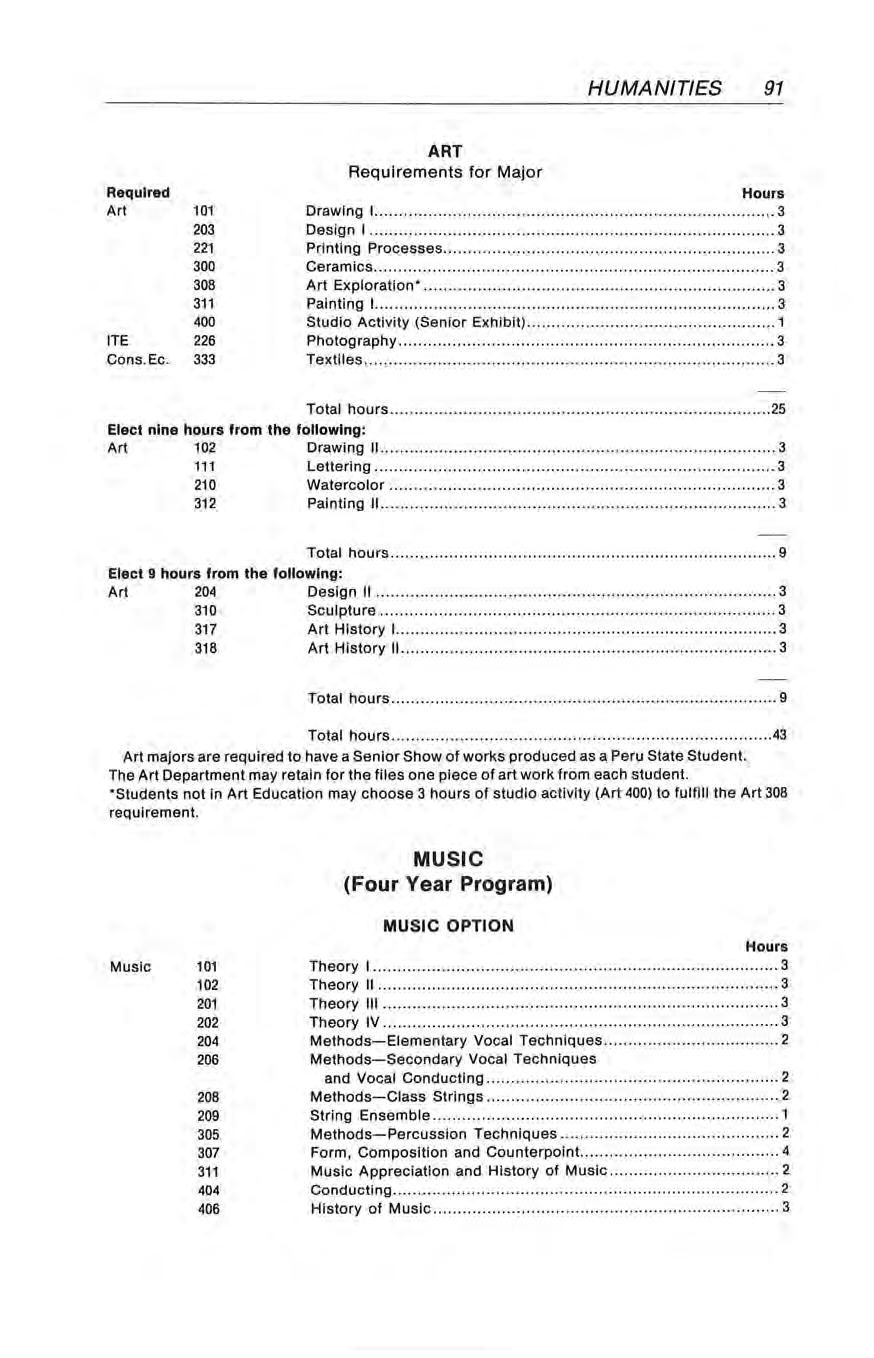
NOTE: It is the policy of the Music Department that all music majors should participate in band and choir each semester as this is a very important part of the student's training During thesemester in which the student presents his or her senior recital , adjustments can be made.
Music students are required to attend recitals and concerts as a partial fulfillment of the graduation requirement. Music majors working toward a Bachelor of Fine Arts degree in Education are required to give a full recital.
Applied Music. Private instruction is provided in voice, piano, organ, strings, woodwinds, brass and percussion There is no charge for private lessons to students within the department Those outside the department may register for lessons at the rate as indicated in the Financial section. Music students are required to show a proficiency in piano to meet the demands of their classroom activities At least one semester of private voice instruction is required of majors.
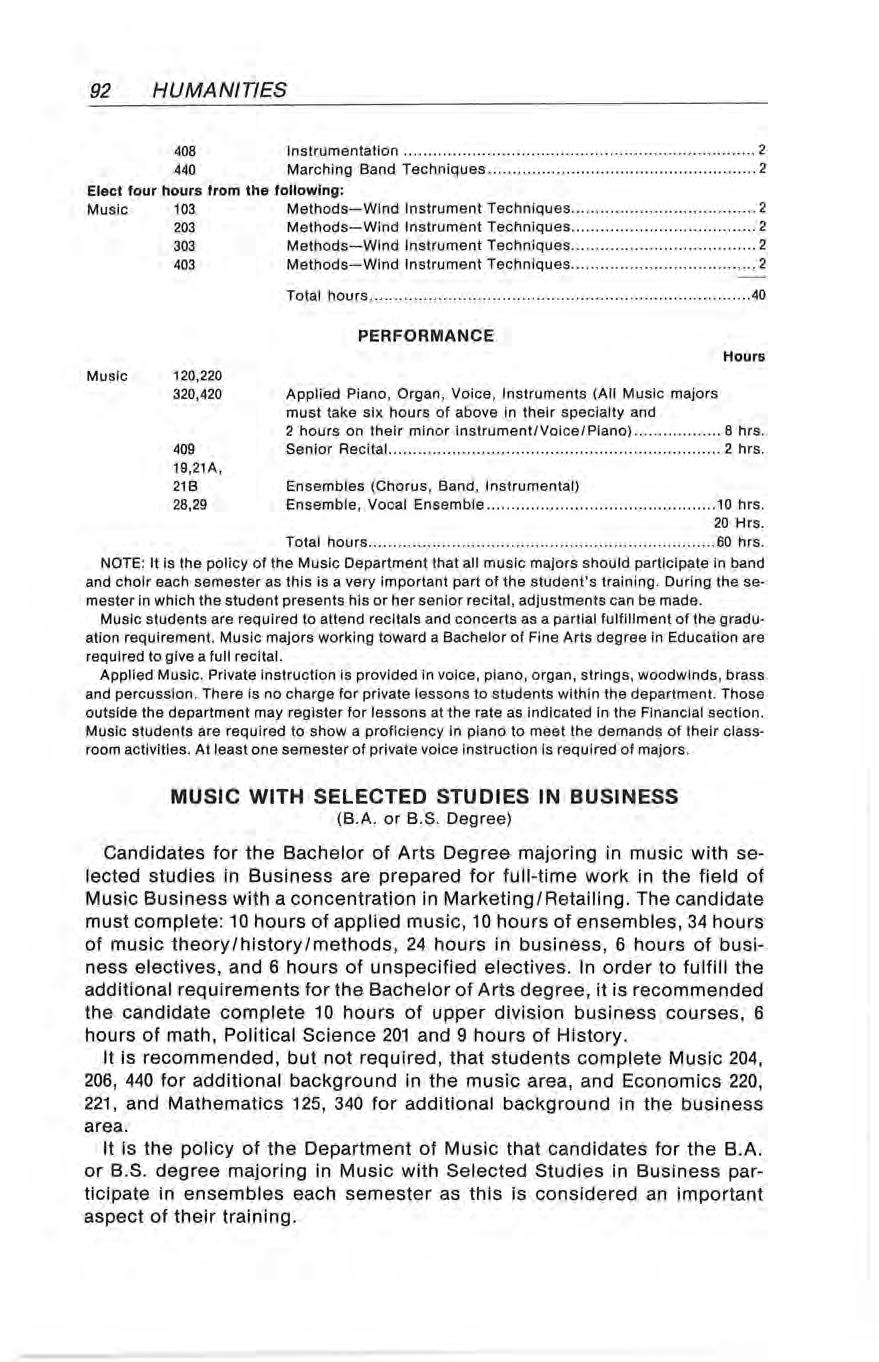
(B A. or B.S Degree)
Candidates for the Bachelor of Arts Degree majoring in music with selected studies in Business are prepared for full-time work in the field of Music Business with a concentration in Marketing/Retailing. The candidate must complete : 10 hours of applied music, 10 hours of ensembles, 34 hours of music theory/history/methods, 24 hours in business, 6 hours of business electives, and 6 hours of unspecified electives In order to fulfill the additional requirements for the Bachelor of Arts degree, it is recommended the candidate complete 10 hours of upper division business courses, 6 hours of math, Political Science 201 and 9 hours of History
It is recommended, but not required, that students complete Music 204, 206, 440 for additional background in the music area, and Economics 220, 221, and Mathematics 125, 340 for additional background in the business area.
It is the policy of the Department of Music that candidates for the B.A . or B.S. degree majoring in Music with Selected Studies in Business participate in ensembles each semester as this is considered an important aspect of their training.
The program of study for candidates for the B . A . or B.S. degree, Music with Selected Studies in Business is outlined as follows :
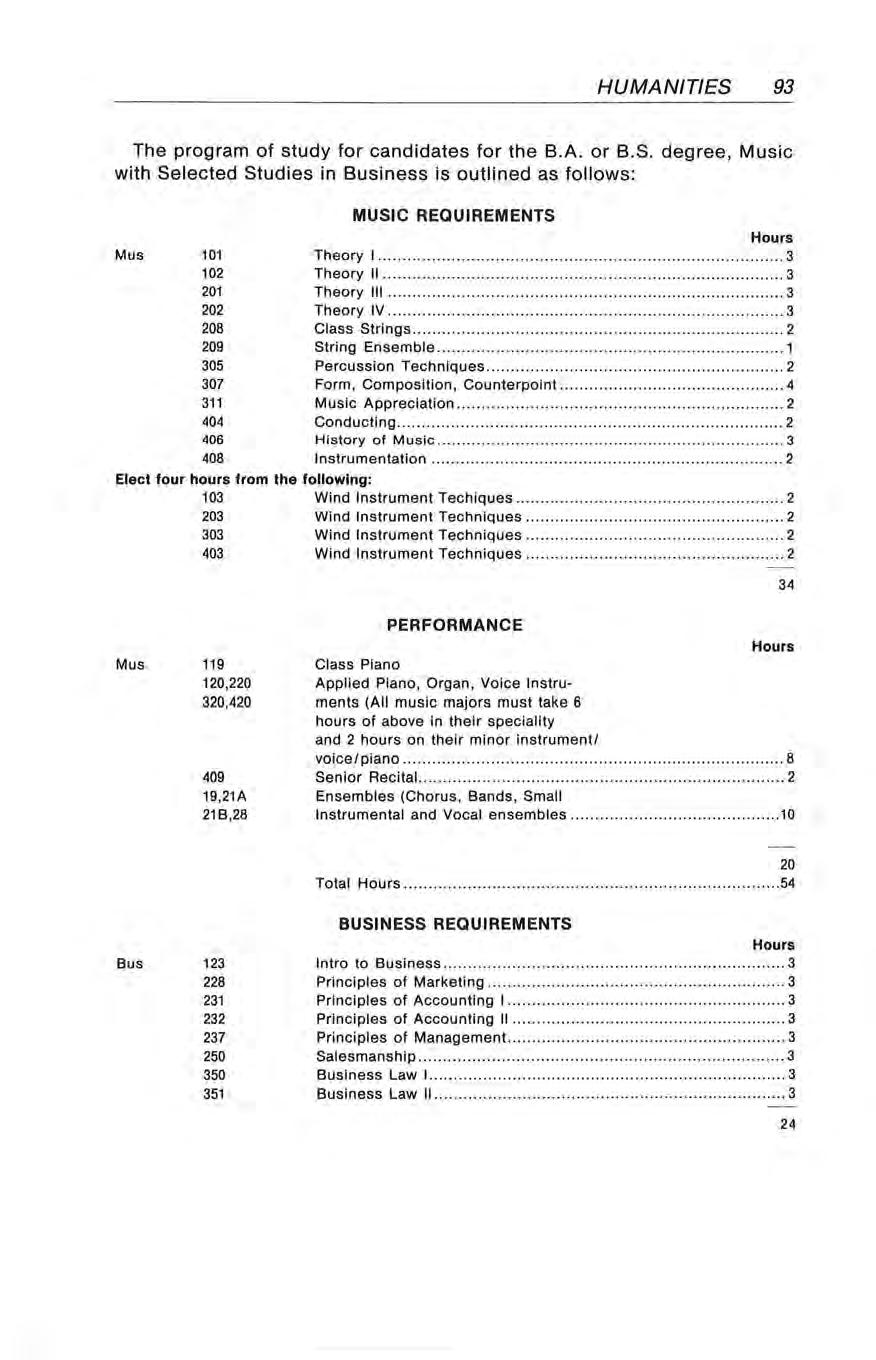
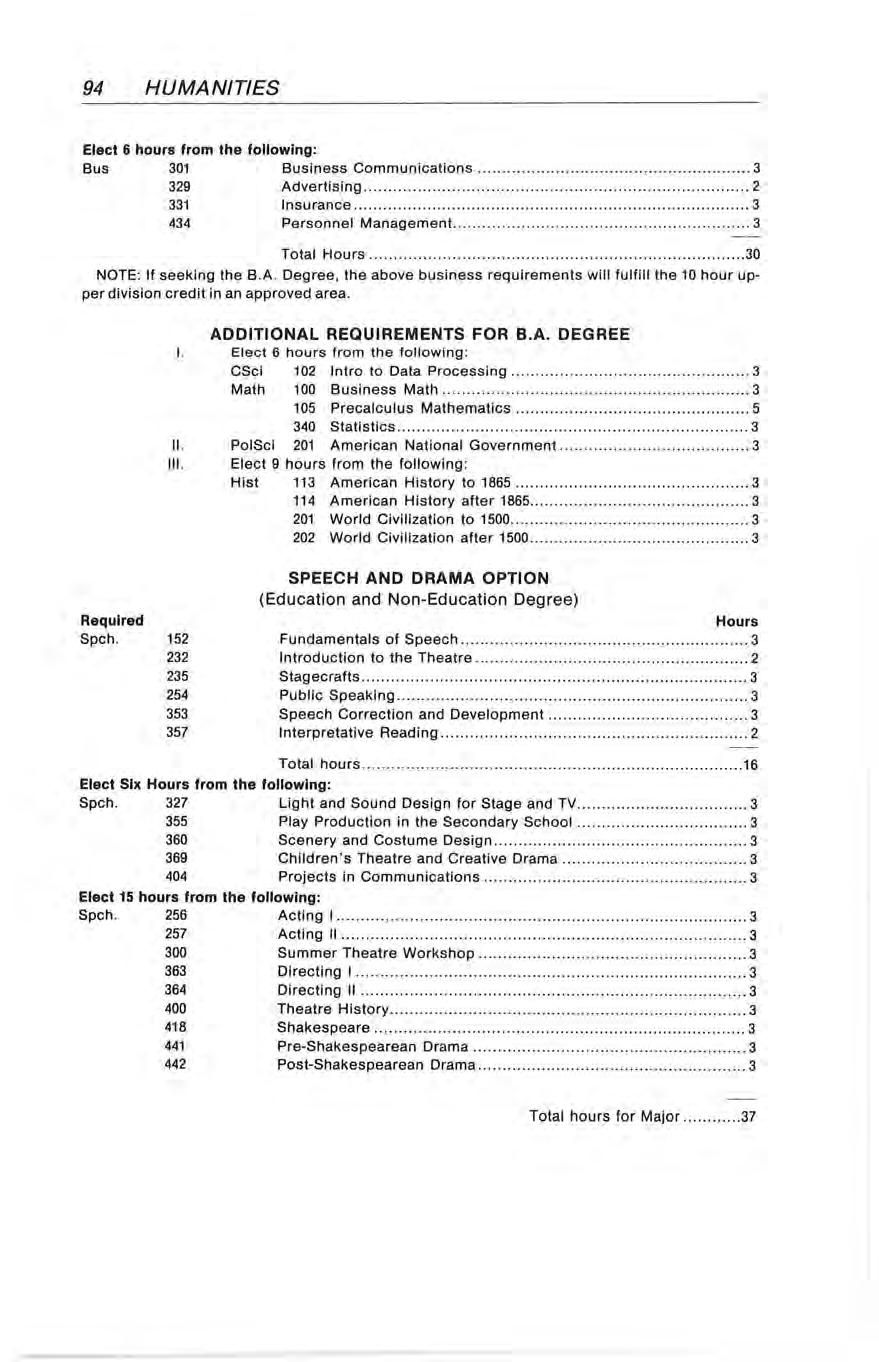
The Division of Military Science offers the Army Reserve Officers Training Corps Program, ROTC , designed to qualify graduates for a Commission as a 2nd Lieutenant in the US Army Reserve while acquiring a baccalaurate degree through Peru State College.
A maximum of 16 semester hours of Mil Sci courses, eight of which must be 300-400 level , is applicable toward the baccalaureate degree A maximum of three hours will be granted for basic camp
Students electing to pursue a commission through ROTC must qualify as full time students of Peru State College and complete the requirements for an academic major. The four-year program consists of a Basic Course taken during the freshman and sophomore years and an Advanced Course taken during the junior and senior years There is no service obligation connected with enrollment in the basic course
Ba s ic Camp -A two year prog ram is avaifabl e f or tho se stud e nt s already enroll e d or t ransferring to Peru State College who have not ta k en th e basi c but des ir e e nrollment in the advanced course. Students enrolling in the two y e ar program must attend and suc c essfully c omplet e a si x w eek basic c amp prior to e ntering the advan ce d c ours e This progra m is availabl e only during the summer, has a limited numb e r of vacancie s a nd must be coo rdinated with th e c ha i rman of the Military Sci e n ce Department.
The ROTC program is normally a four - year program ; however , under a recently instituted option qualified sophomores (those who have successfully completed three years (JROTC or qualified veterans) may immediately begin the advanced course.
Although Military Science courses may be taken for credit by any student, only those students formally enrolled in and who successfully completed the Advanced Course will be eligible for commissioning. If selected
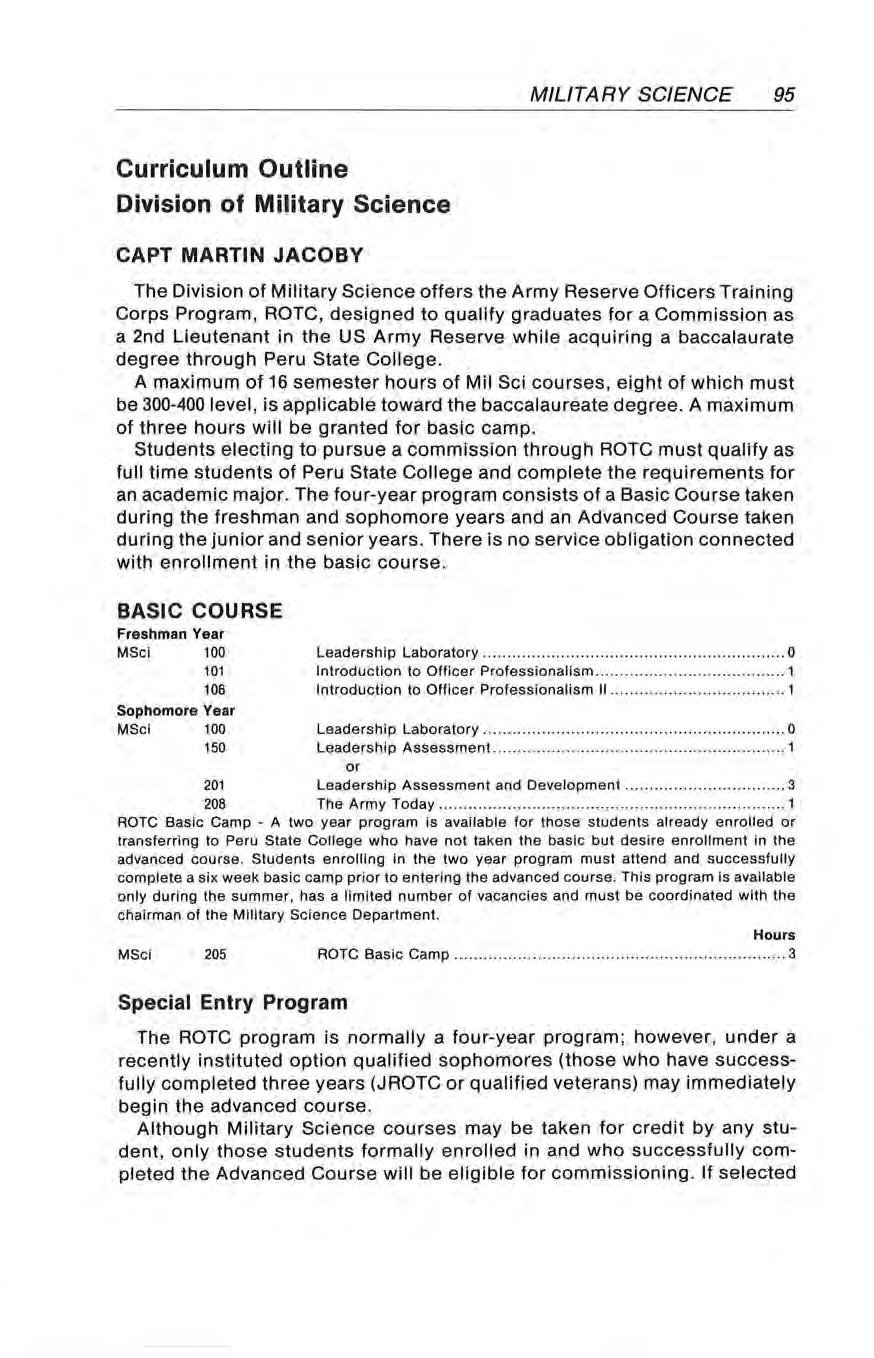
for and enrolled in the Advanced Course the student must agree to complete the remaining two years of ROTC and accept a commission, if offered, upon completion of the course. ROTC graduates may serve in the active Army or in the various reserve components.
Each advanced course student must attend a six week advanced camp, normally at the end of the first year of the advanced course . Advanced camp consists of practical application of the instruction and skills learned at Peru State, with emphasis on leadership Students are paid travel expenses to and from camp In addition, they will earn approximately $600 for the six weeks of training. All accommodations - clothing, food, equipment - are provided . All contracted advanced course students receive a $100 per month subsistence allowance during a 10 month school year.
Members of the Army Reserve/National Guard who have completed basic training and are attending classes at Peru State College can apply for acceptance into the ROTC Simultaneous Membership Program and pursue a commission in the Reserved or National Guard. Participants enter the Advanced Course immediately and are eligible to receive their commission in two years while receiving a $100 a mon t h ROTC subsistence allowance in addition to drill pay as an officer trainee.
Four year scholarships are available to all high-school seniors who plan to attend host institutions offering the four-year Army ROTC program. Peru State College students are eligible to compete for three and two - year scholarships available to students who elect to enroll in the Army ROTC scholarship program. Each scholarship pays for tuition, books, laboratory expenses and in addition $100 per month subsistence for a 10 month school year Applications are available through the division of Military Science.
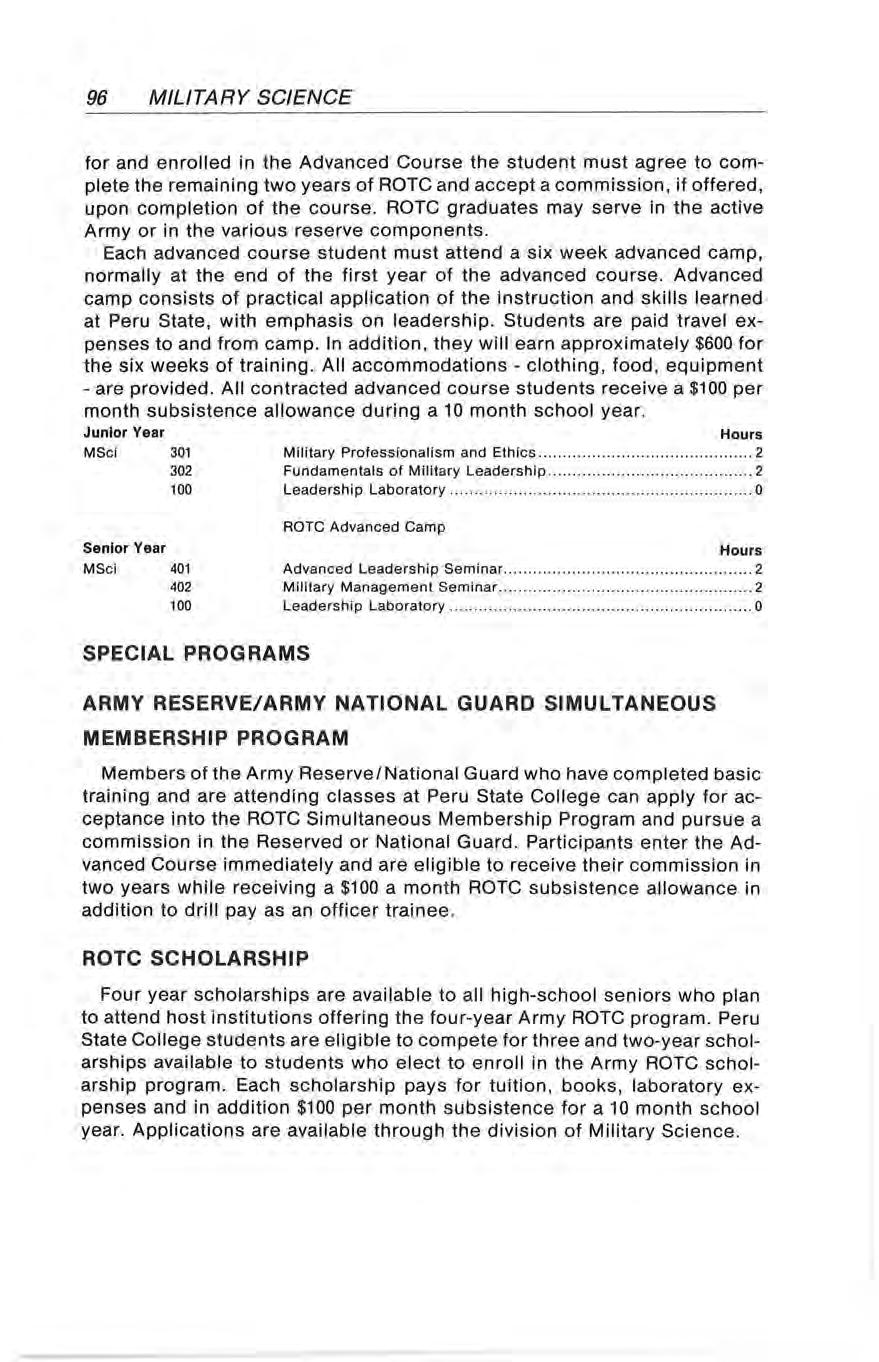
The Division of Natural Science offers course work in Agriculture , Biological Science, Chemistry, Computer Science, General Science, Geology , Mathematics, and Physics Programs in these areas are designed to provide an adequate background for teaching at the secondary level, provide a background for graduate study , and provide for individual enrichment. A wide variety of pre-professional programs are offered for students needing preliminary instruction prior to entry in a professional school.
The Natural Sciences Division offers B A and B S degrees in Biological Science, Business Agricultural Management, Computer Science, Mathematics, Physical Science and Natural Science. Teacher Education programs for endorsement in Biology , Chemistry, Computer Science, Mathematics, Physical and Natural Science are also available. The subject endorsements in Biology and Chemistry do not satisfy the requirements for a majo r unless a second subject endorsement is obtained . The Computer Science endorsement is designed to complement the requirements for one field or two subject endorsements in other areas.
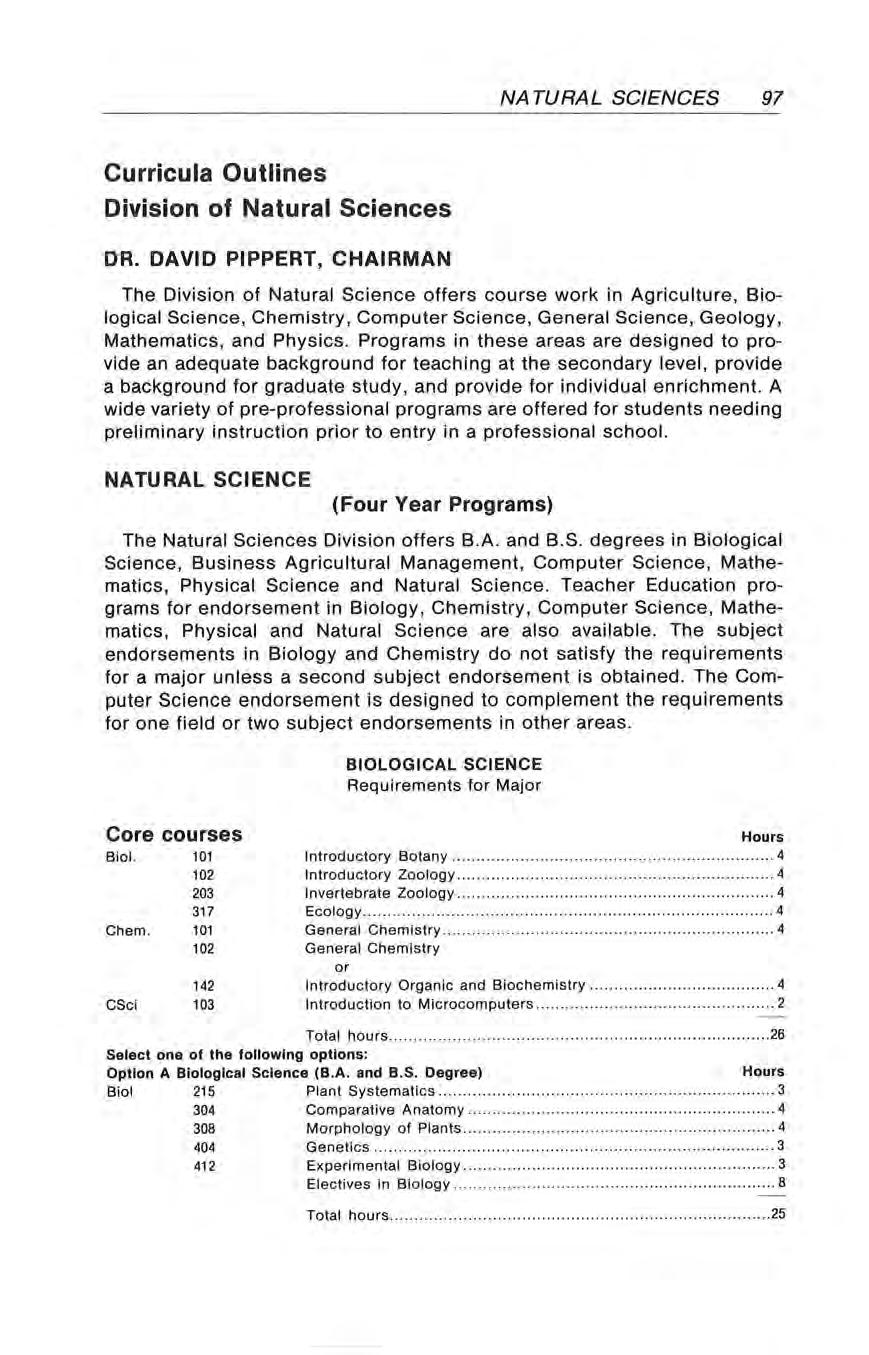
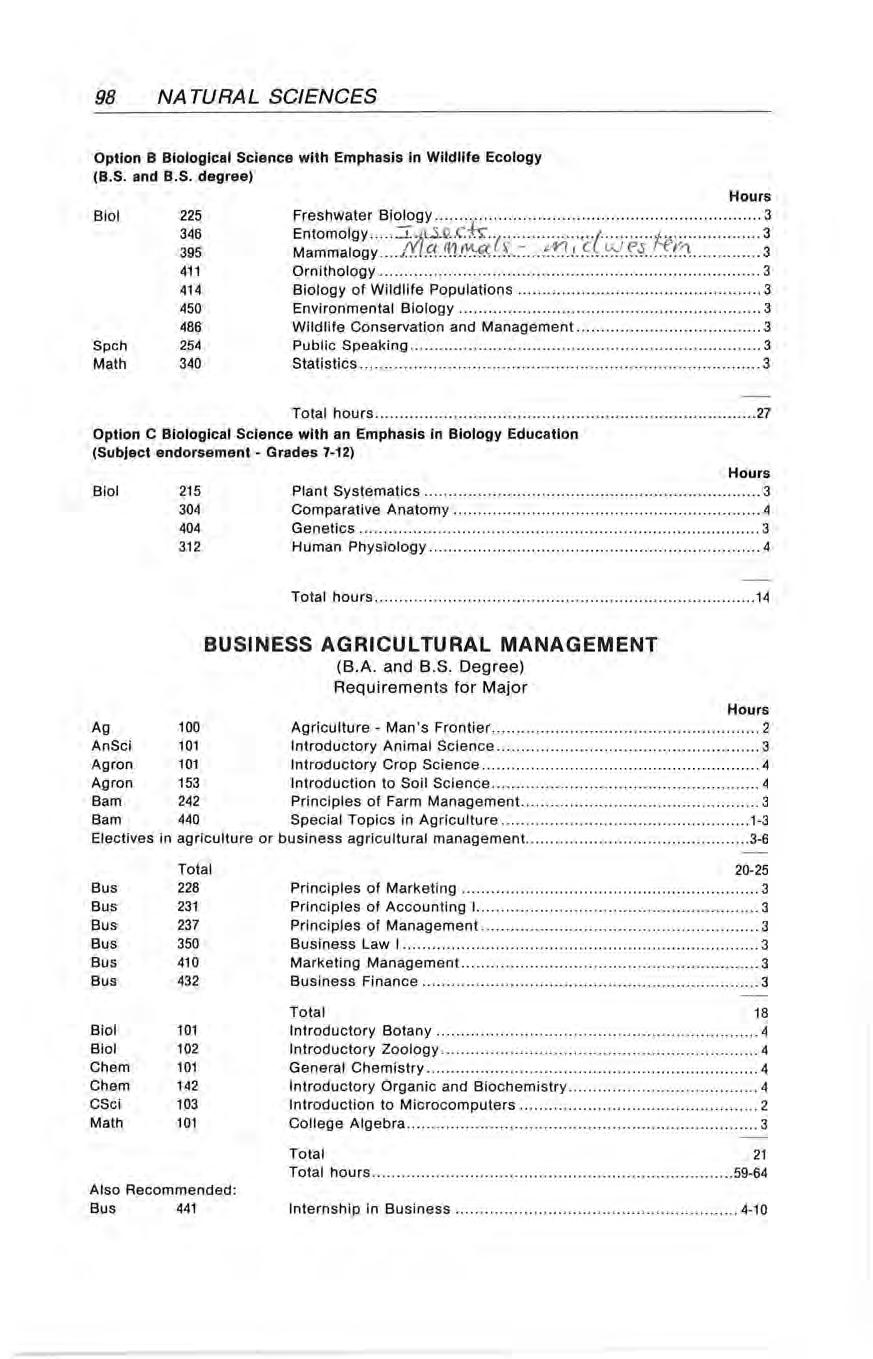
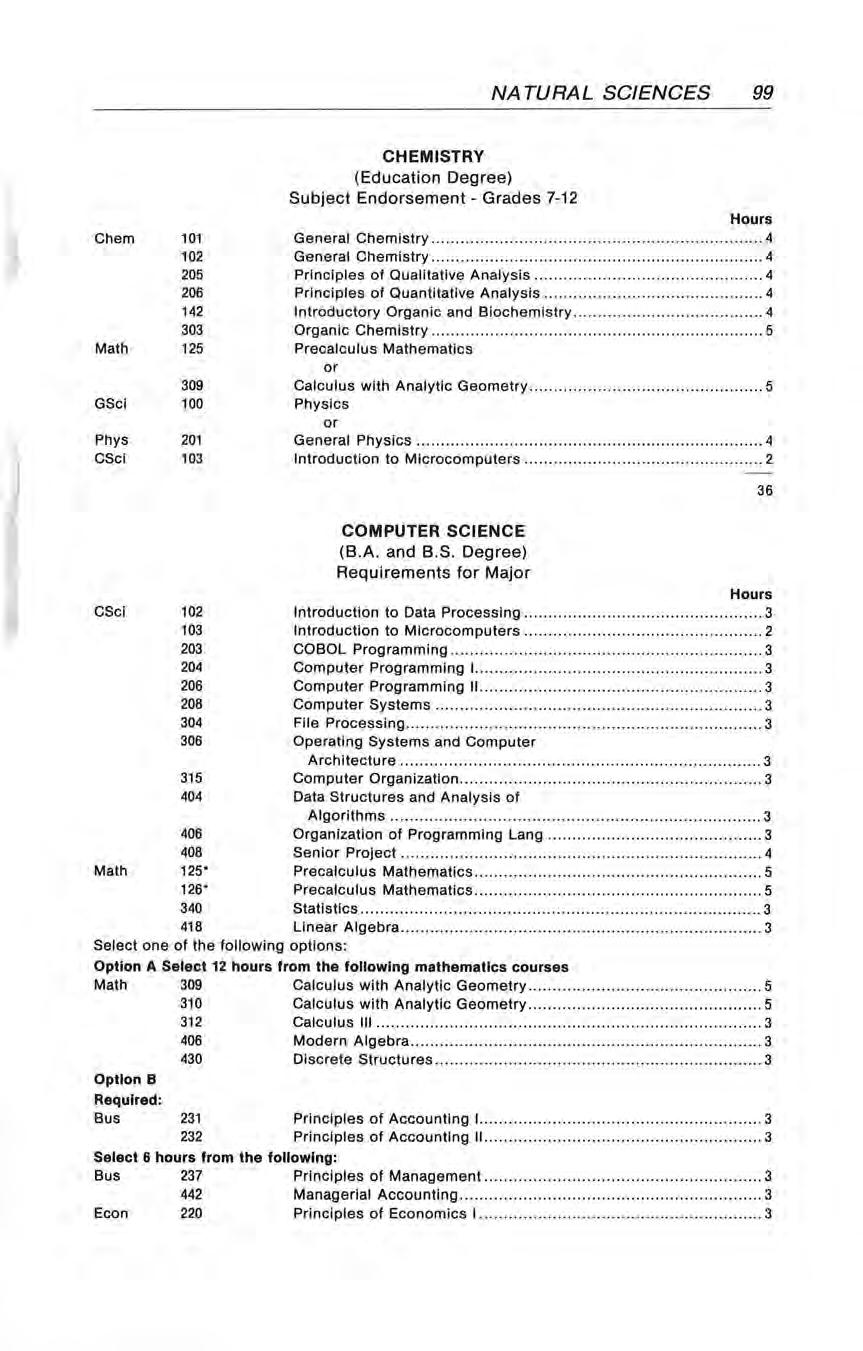
have successfully completed mathematics courses equivalent to Math 125 and Math
may have these courses waived. Consent of Division Chairman is required. If co nsent
required for
To obtain this education endorsement students must also satisfy the requirement of a major in either one field or two subjects. The following courses are proposed as r e quirements for this program
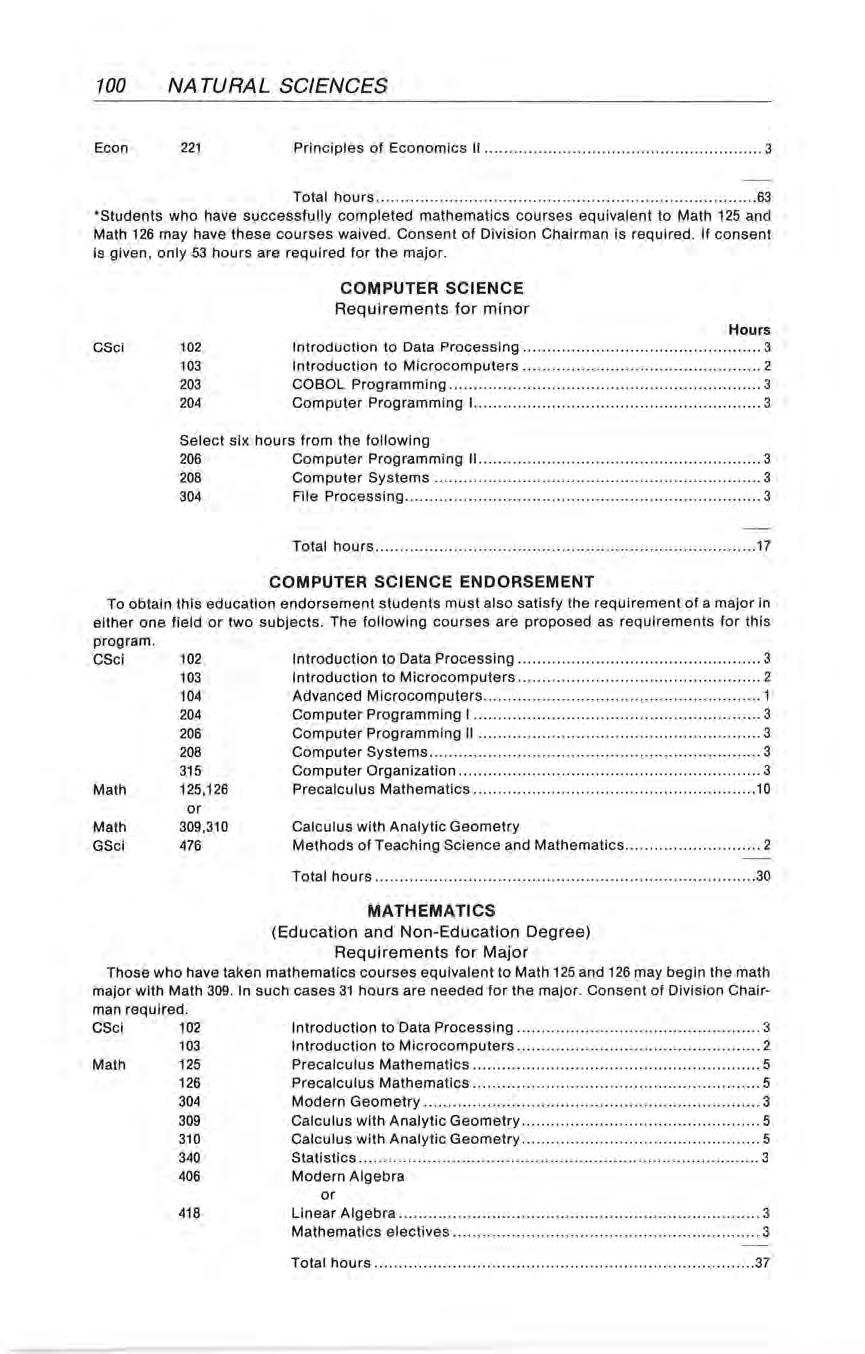
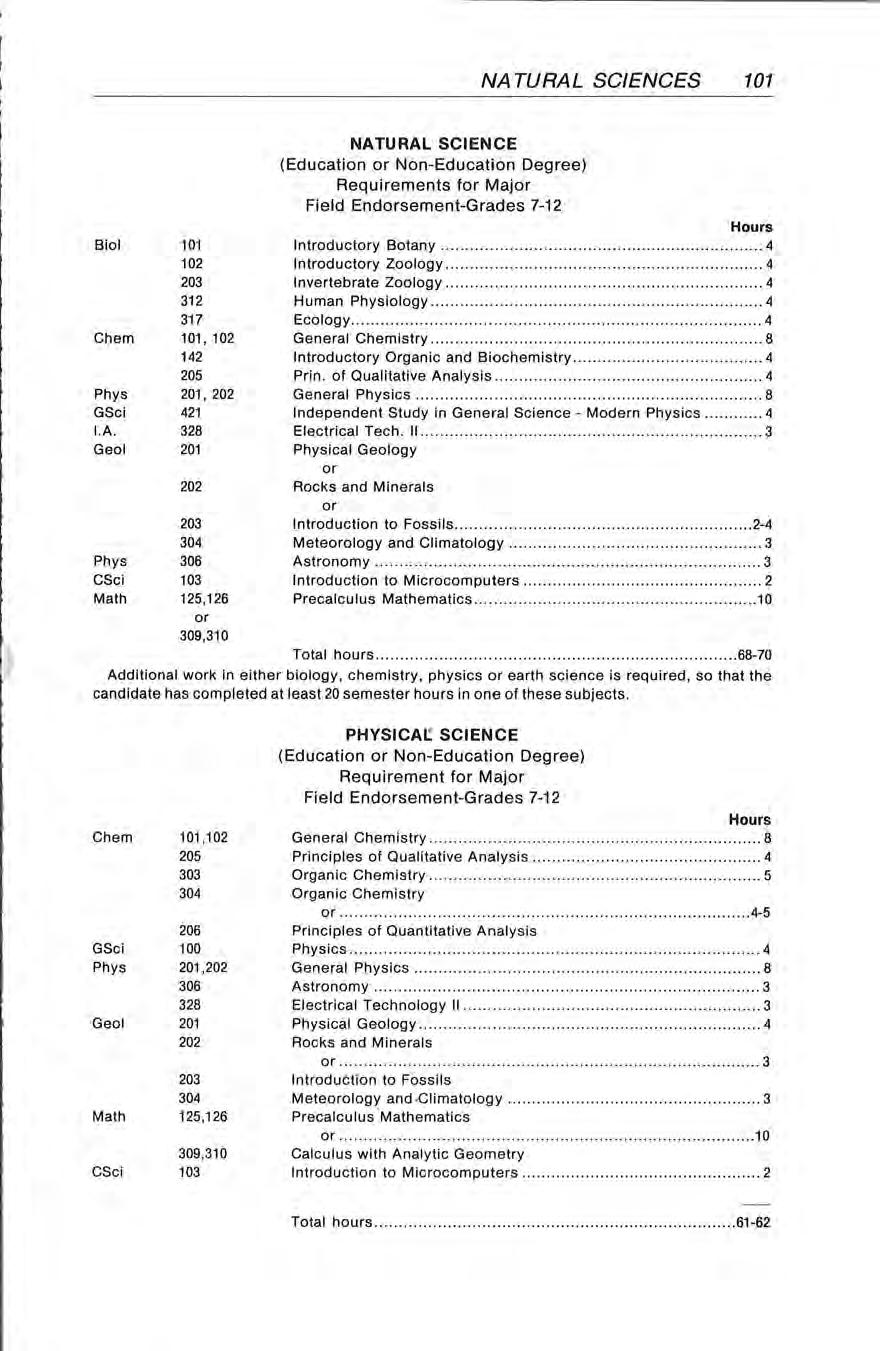
The transfer programs li sted in this section may require from one to four years to complete. They do not represent academic majors. Students planning to complete a degree a t Peru must satisfy the requirements for a specific academic major in addition to completing the requirements for one of these programs
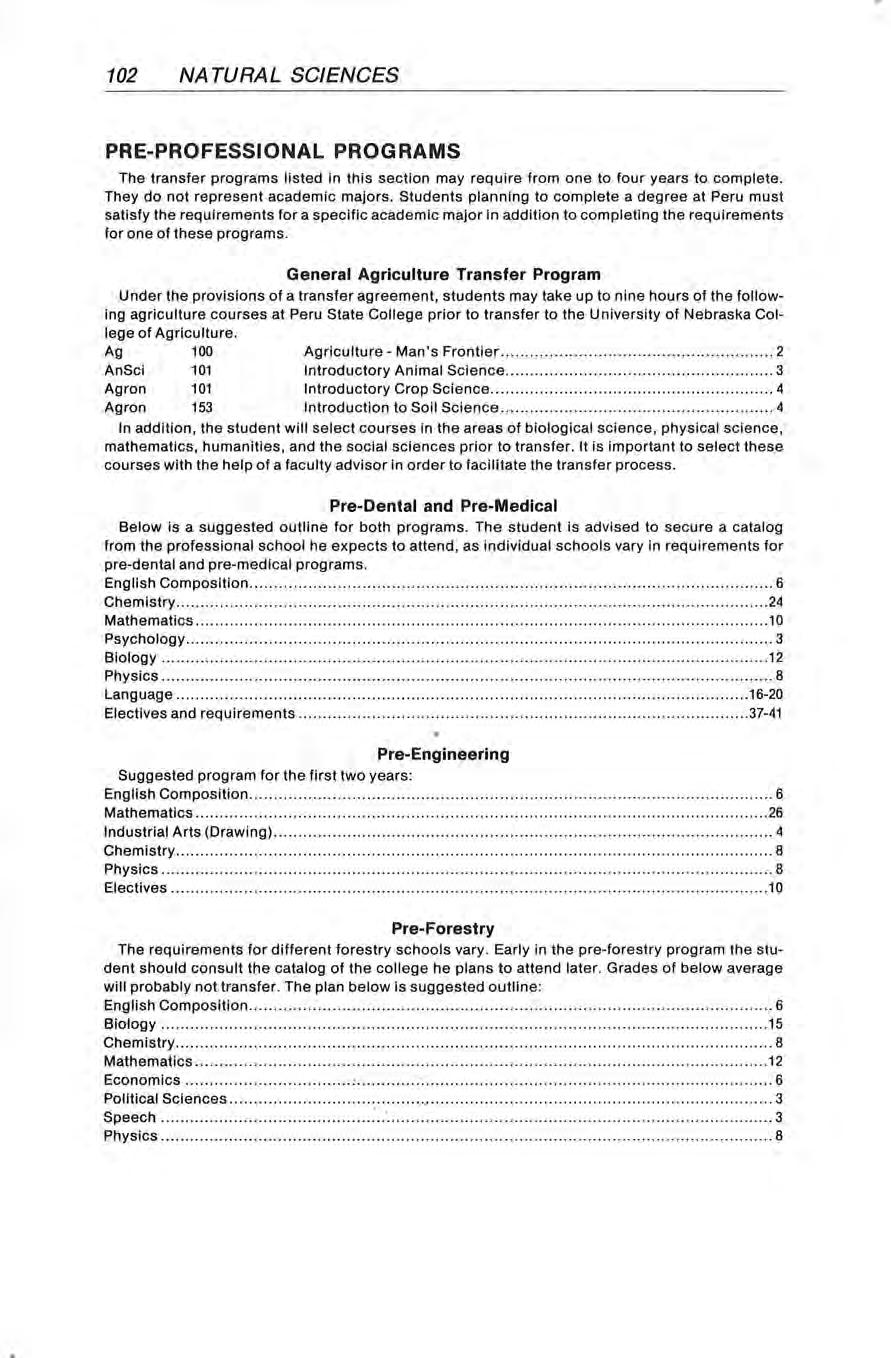
Under the provisions of a transfer agreement , students may take up to nine hours of the following agriculture courses at Peru State College prior to transfer to the University of Nebraska College of
In addition, the student will select courses in the areas of biological science, physical science, mathematics, humanities, and the social sciences prior to transfer. It is important to select these courses with the help of a faculty advisor in order to facilitate the transfer process.
Below is a suggested outline for both programs. The student is advised to secure a catalog from the professional school he expects to attend, as individual schools vary in requirements for pre-dental and pre - medical programs
The requirements for different forestry schools vary. Early in the pre - forestry program the st udent should consult th e catalog of the college he plans to attend later Grades of below average will
not transfer The plan below is suggested outline:
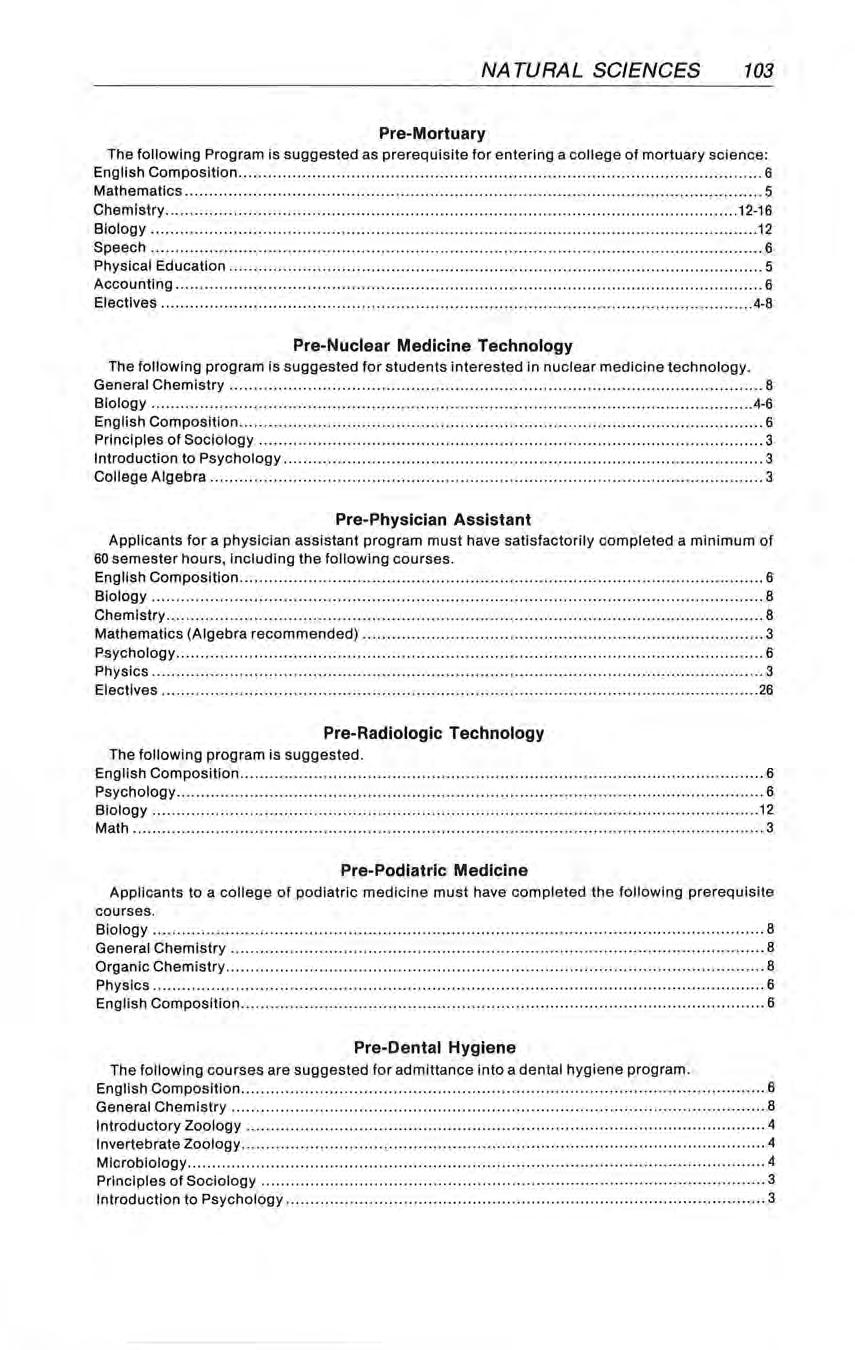
The basic science and humanities requireme nts for nursing programs vary, depending on the school selected a nd the l evel of training offered (i.e. diploma , associate degree or baccalaureate degree program) The pre-nursing student is urged to obtai n a copy of the catalog of the nur sing scho ol selected to in sure proper planning for transfe r The fo ll owing courses are suggested for a one year
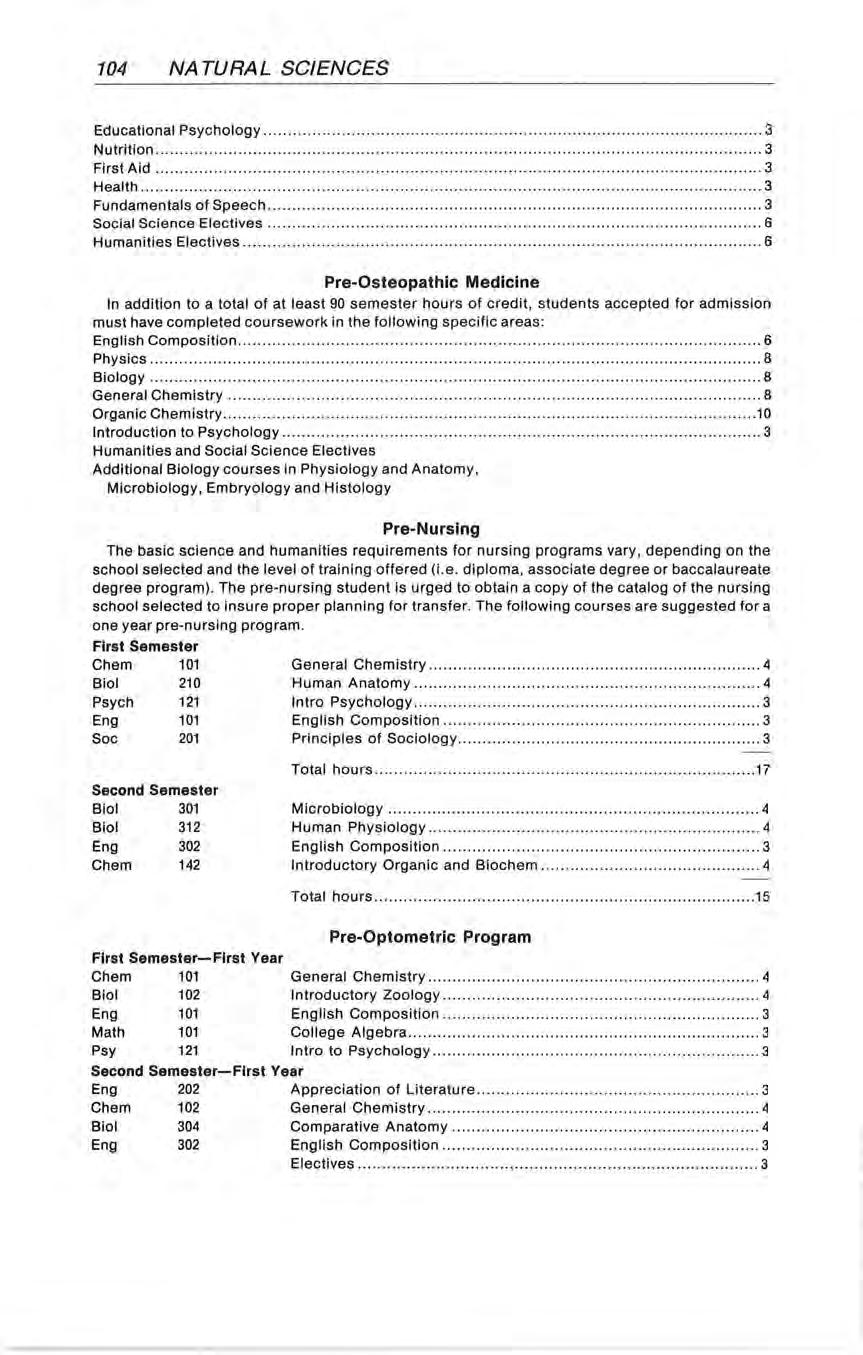
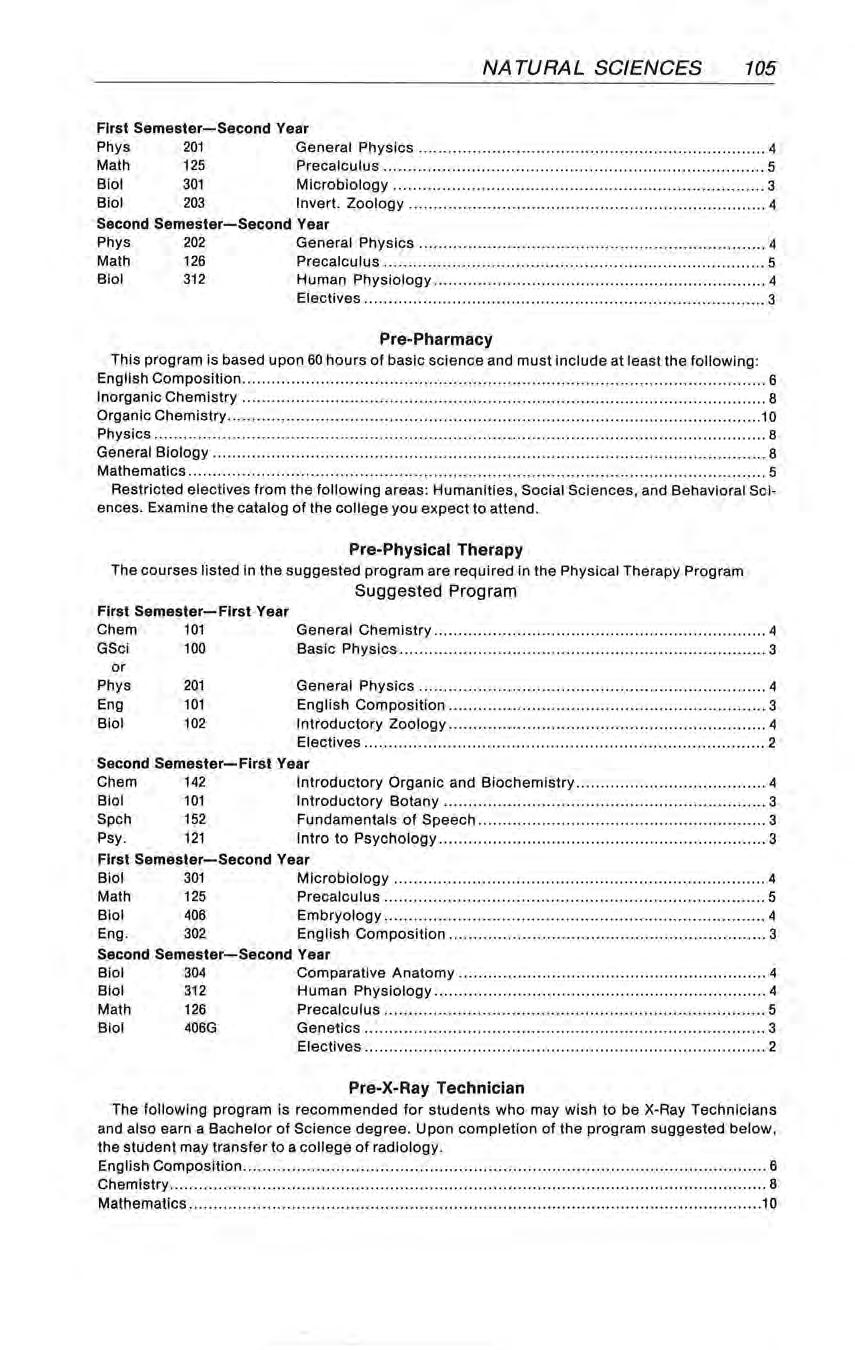
COOPERATIVE PROGRAMS
Medical Technology
Cooperative arrangements have been made between Peru State College and some schools of medical technology whereby a student may complete requirements for a Bachelor of Science degree with a major in Medical Technology. Under this program, the first three years are spent on the Peru campus. During these three years the student must satisfy the General Studies requirement for graduation, complete a minimum of 90 semester hours applicable toward a baccalaureate degree, complete 24 sem ester hours of chemistry, 15 hours of biology, and at le ast one course each in mathematics and physics
The fourth year , which consists of a fu ll twelve-month program, is spent in residence at an approved school of Medical Technology Upon satisfactory completion of this year of training, the student may receive t he baccalaureate degree from Peru State College .
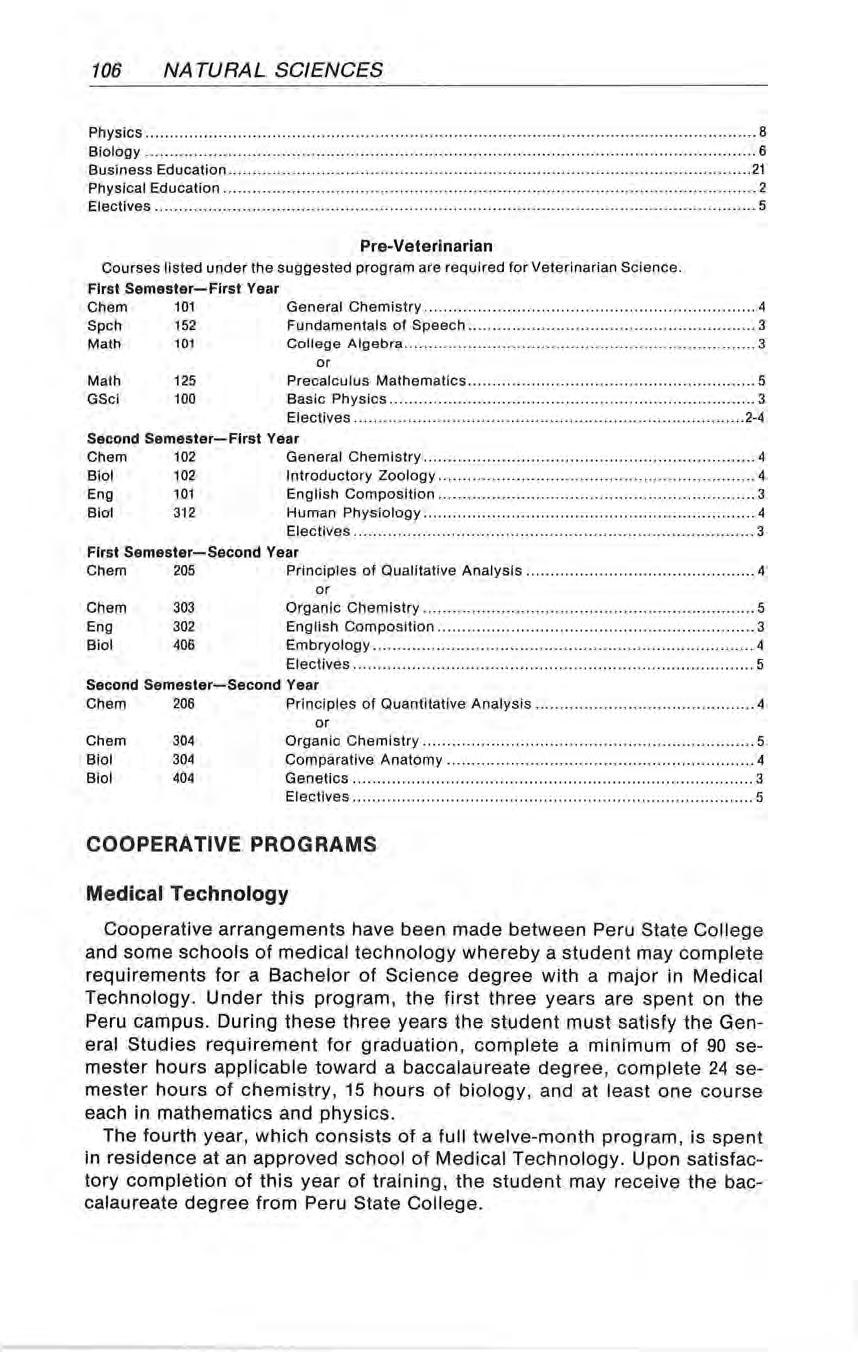
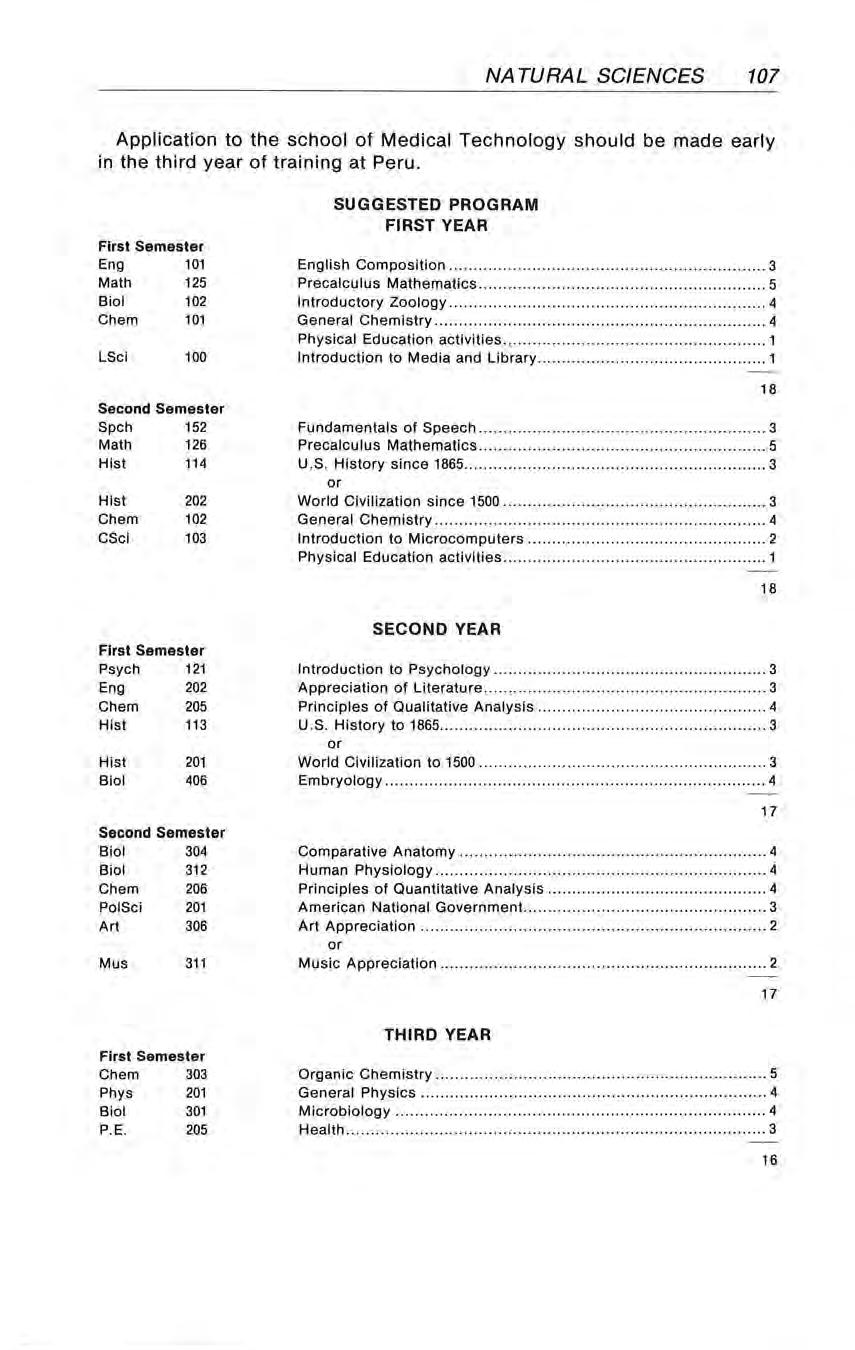
Twelve month program at an approved school of medical technology.
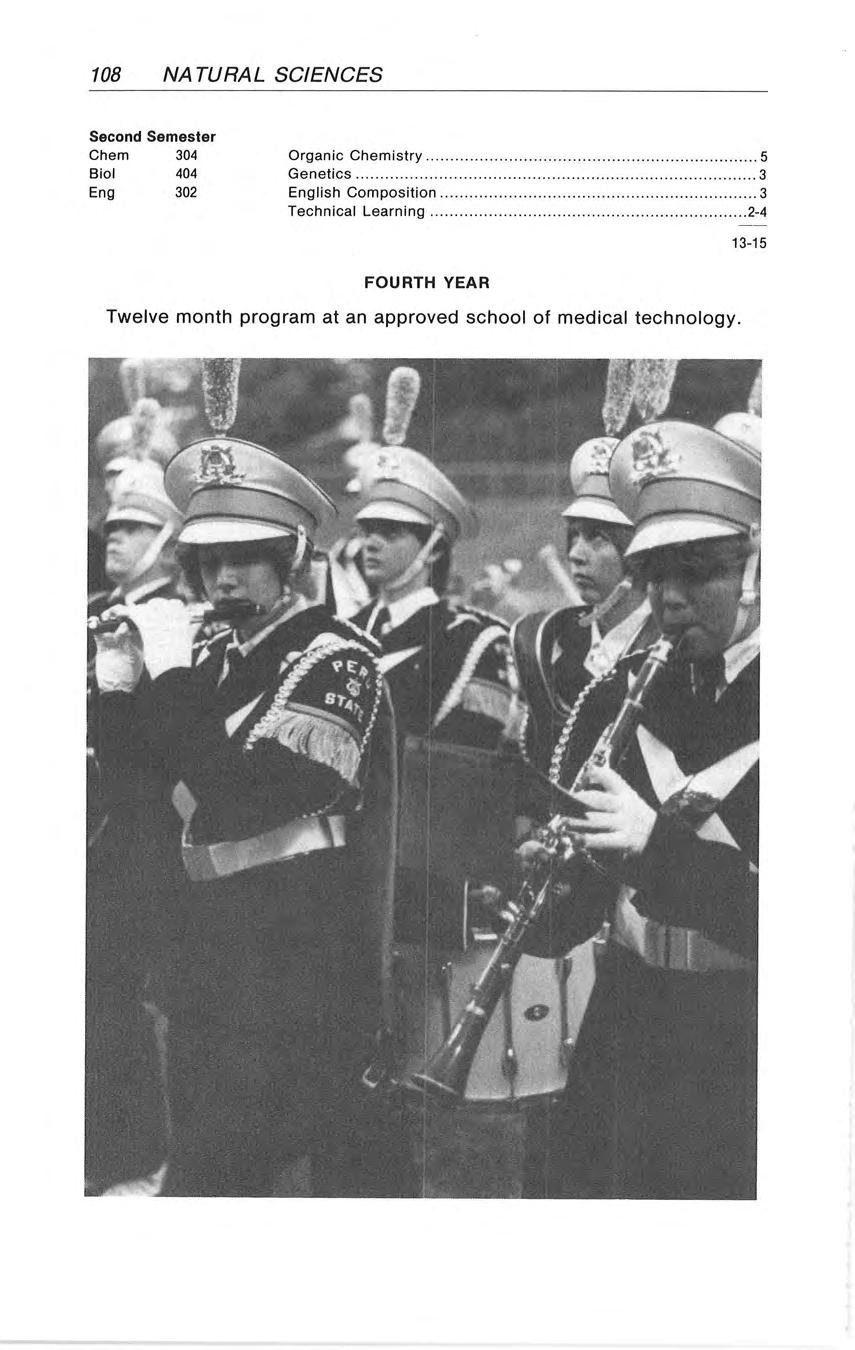
The Division of Physical Education offers programs to prepare students to teach physical education, to coach, and to effectively manage organized activities. The programs are designed to develop active participation in physical activities now, and to encourage continued participation in appropriate activities in later years.
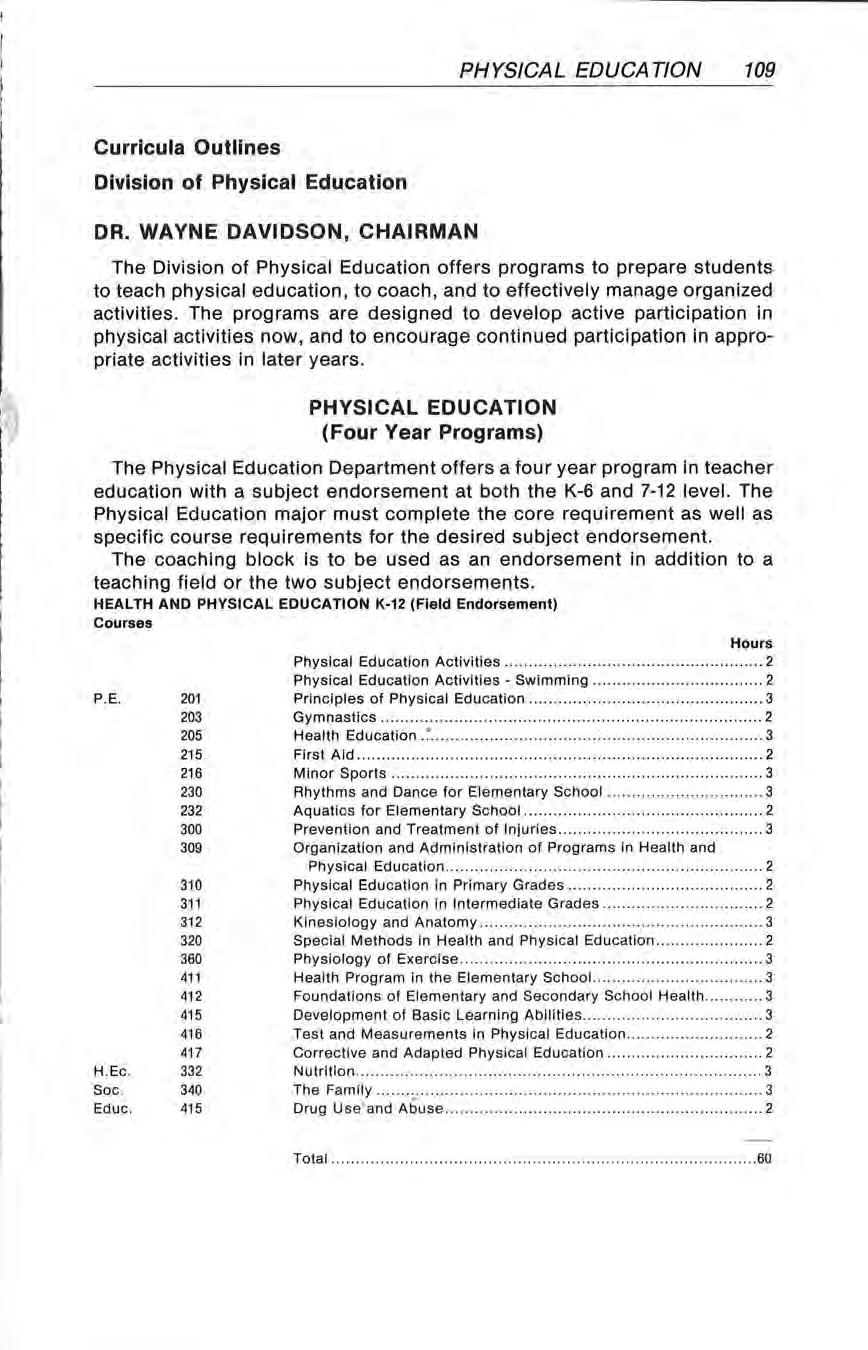
The Physical Education Department offers a four year program in teacher education with a subject endorsement at both the K-6 and 7-12 level. The Physical Education major must complete the core requirement as well as specific course requirements for the desired subject endorsement.
The coaching block is to be used as an endorsement in addition to a teaching field or the two subject endorsements. HEALTH AND PHYSICAL EDUCATION K-12 (Field Endorsement)
The following program is provided for those students interested in the coaching of interscholastic sports It is designed to fit the needs of the high school coach and leads to institutional recommendation for endorsement. Students completing this program are required to have a major in Physical
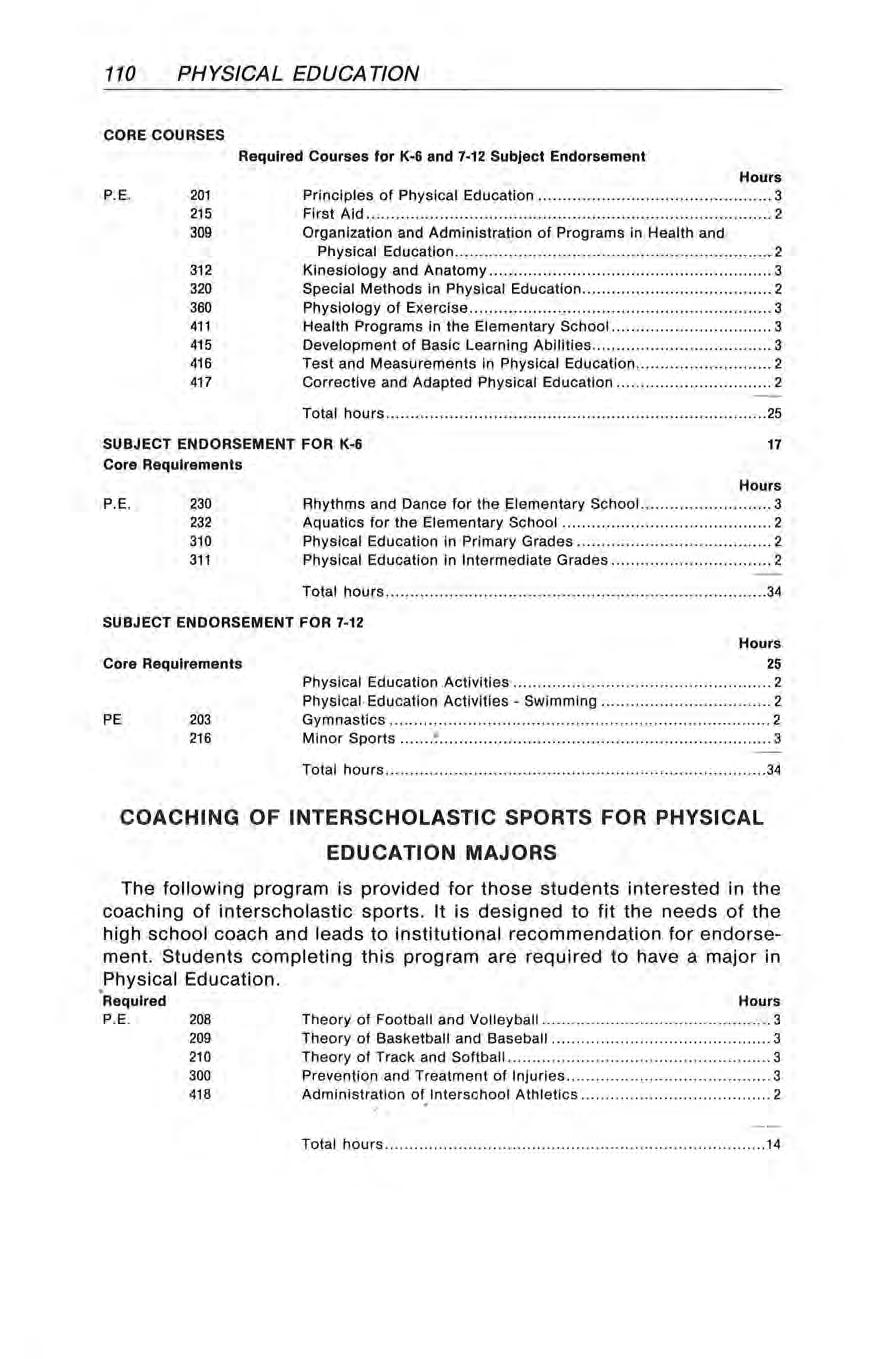
The following program is provided for those students interested in the coaching of interscholastic sports and who do not have a major in physical education. It is designed to fit the needs of the high school coach and leads to institutional recommendation for endorsement. Students completing this program are required to have a major in an area other than physical education.
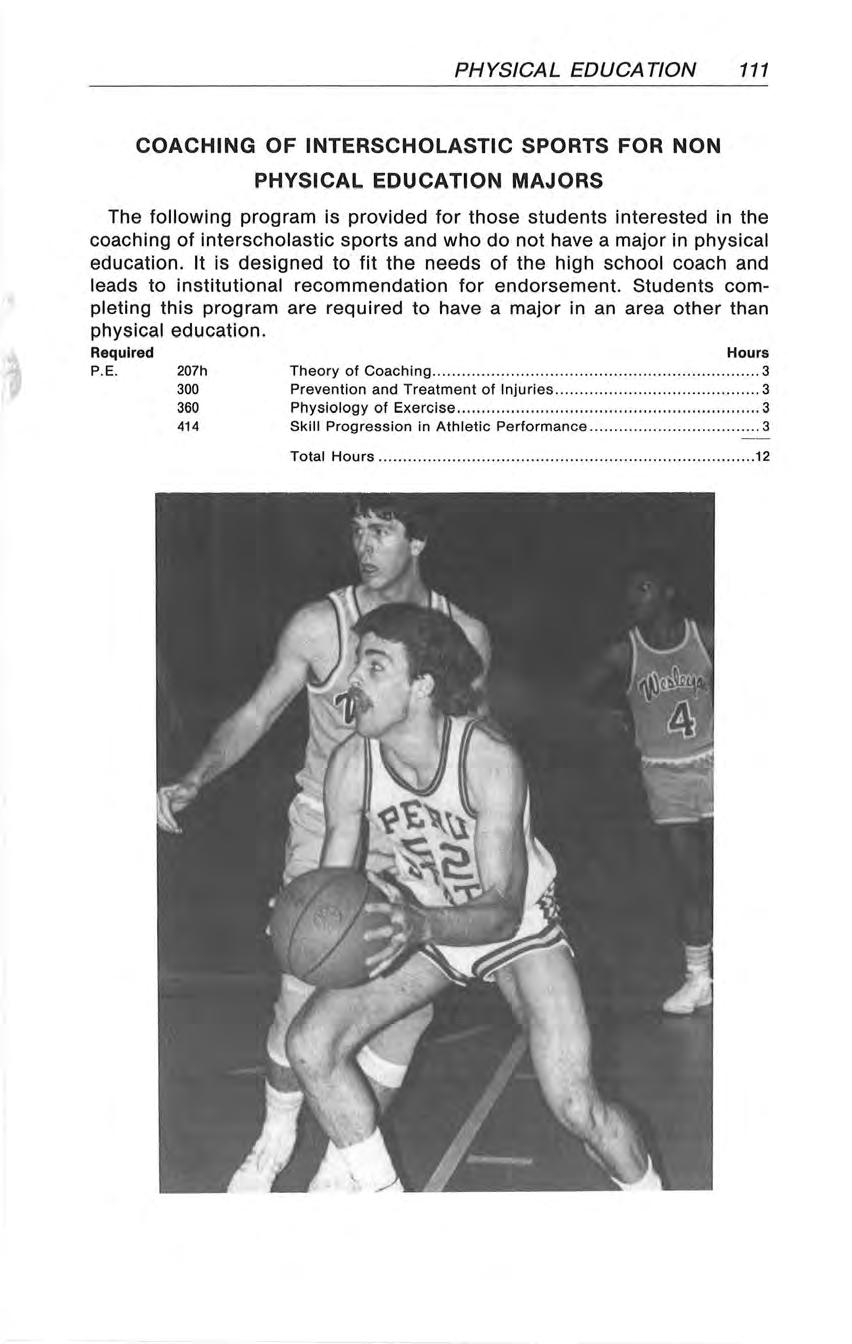
130 Personal Improvement
2 hr. Improvement of the personal image tor business and social success . Professional, visual (personal appearance), and social aspects of self improvement are emphasized
133 Food Purchasing and Preparation
3 hr.
Two hours lecture and discussion ; three hours laboratory Fundamental prin c iples of food selection, purchasing , and preparation. The course also includ e s a study of the nutritional value of foods.
134 Meal Management
3 hr.
Principles of food purchasing , preservation and management procedures as related to family service in the changing American Society. Application of the principle of meal management in a basic study and preparation of different world and American regional cuisines.
141 Cloth ing Selection and Construction
3 hr.
Selection of wearing apparel based on the significance of clothing in American society, and the principles of design as applied t o personal appearance Constructing apparel through the use of a basic pattern and fundamental pattern methods; application of principles of design , basic construction techniques , and good management.
151 Microwave Cooking
1 hr
This course is designed for the individual who either wishes to make more use of or plans to purchase a microwave oven. Many different types of recipes will be prepared from appetizers to desserts. Participants will be charged a lab tee to cover the cost of food used during the course.
205 Selection, Use and Care of Household Equipment
3 hr.
Working principles of larg e and small electrical appliances and housewares in terms of the application of mechanics, heat , and electricity Methods of determining performance and an understanding of common repair problems.
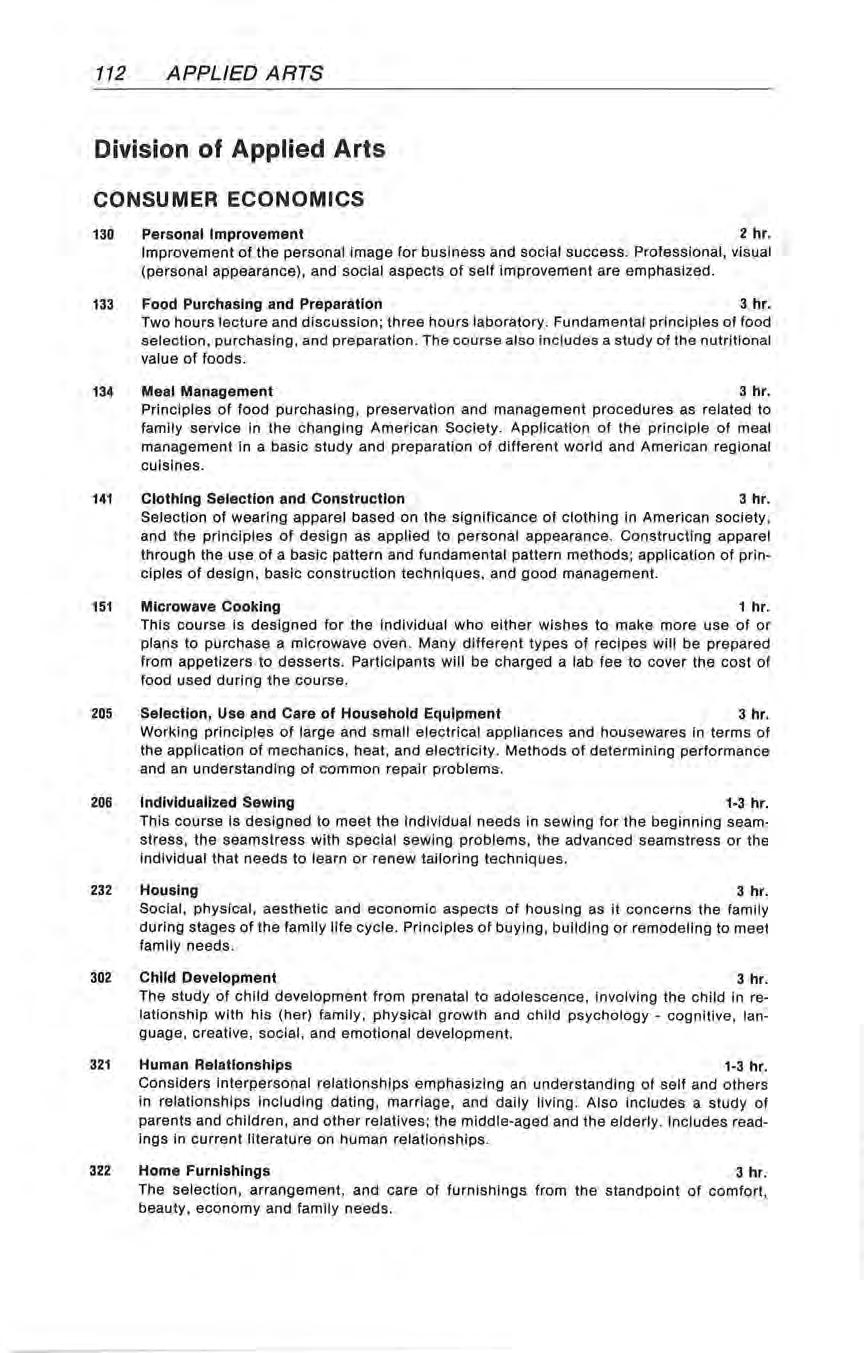
206 Individualized Sewing
1-3 hr
This course is designed to meet the individual needs in sewing for the beginning seamstress, the seamstress with special sewing problems, the advanced seamstress or the individual that needs to learn or renew tailoring techniques.
232 Housing
3 hr .
Social, physical, aesthetic and economic aspects of housing as it concerns the family during stages of the family life cycle. Principles of buying , building or remodeling to meet family needs
302 Child Development
3 hr.
The study of child development from prenatal to adolescence , involving the child in relationship with his (her) family, physical growth and child psychology - cognitive , language, creative, social, and emotional development.
321 Human Relationships
1-3 hr.
Considers interpersonal relationships emphasizing an understanding of self and others in relationships including dating , marriage, and daily living. Also includes a study of parents and ch i ldren, and other relatives; the middle-aged and the elderly includes readings in current literature on human relationships
322 Home Furnishings
3 hr.
The selection, arrangement , and care of furnishings from the standpoint of comfort, beauty , economy and family needs
333
Nutrition
3 hr.
Fundamental principles of human nutrition, its development through research as related to the needs of individuals according to their age, se x , and occupation
Textiles
3 hr.
A study of fabric construction , yarns, fibers and finishes as they affect the selection, use and care of fabrics for clothing , for the home , and for art objects and hand woven fabrics. The course includes the creation of handcrafted fabrics and decorative items
334 Tailoring
3 hr.
A course designed to meet the student's need for the more difficult construction problems which are encountered in tailoring
360 Nutrition, Weight Control, and Exercise
2 hr.
A course designed to provide basic concepts and a background of general information on the interrelationships of sound nutrition, exercise , and weight control for healthful living Students will develop individualized programs to meet a variety of personal needs.
400 Special Problems In Home Economics
1, 2 or 3 hr. Special research or study as needed by the individual. Home economics majors only
410 Consumer Economics
3 hr.
A course dealing with the economic problems and responsibilities of the consumer. The topics of household buying, credit, insurance , savings and investing are covered with emphasis on the best management of personal and family resources.
421 Home Management
3 hr. Emphasis on present day decisions and management problems of families. Application of management techniques for household activities and family living.
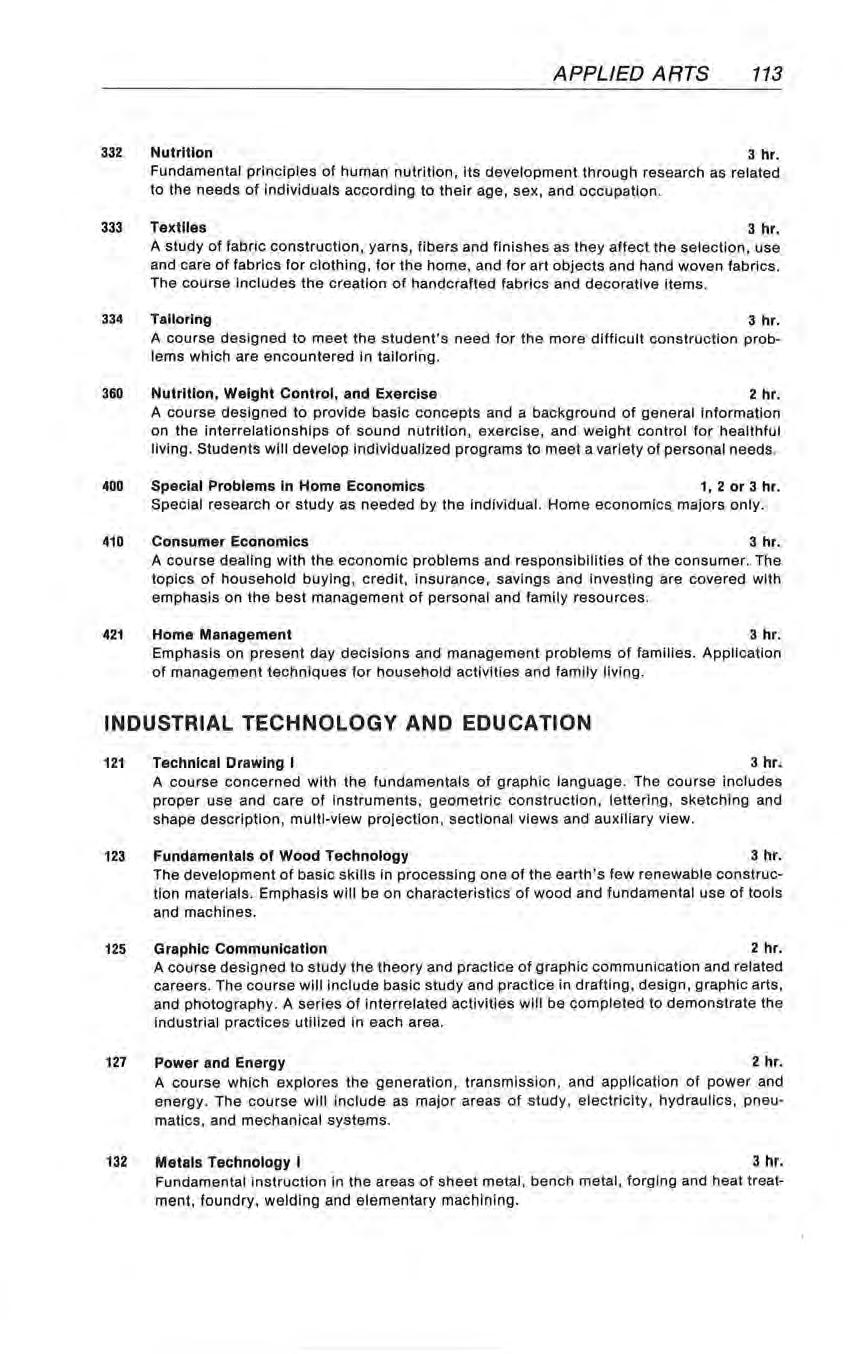
121 Technical Drawing I
3 hr .
A course concerned with the fundamentals of graphic language The course includes proper use and care of instruments , geometric construction , lettering , sketching and shape description, multi-view projection , sectional views and auxiliary view
123 Fundamentals of Wood Technology
3 hr.
The development of basic skills in processing one of the earth's few renewable construction materials. Emphasis will be on characteristics of wood and fundamental use of tools and machines.
125 Graphic Communication
2 hr.
A course designed to study the theory and practice of graphic communication and related careers. The course will include basic study and practice in drafting, design, graphic arts , and photography A series of interrelated activities will be completed to demonstrate the industrial practices utilized in each area.
127 Power and Energy
2 hr.
A course which e x plores the generation, transmission , and application of power and energy The course will include as major areas of study , electricity , hydraulics , pneumatics , and mechanical systems.
132 Metals Technology I
3 hr .
Fundamental instruction in the areas of sheet metal , bench metal , forging and heat treatment , foundry , welding and elementary machining
222 Technical Drawing II
3 hr.
Prerequisite: IA 121. The course includes shop processes , dimensioning, threads and fasteners, design and working drawings, axonometric projection, oblique projection, perspective projection , intersections and developments, gearing and cams , welding representation, graphs and the use of drafting machines.
226 Photography I
2-3 hr.
- Theory and practice in the basic fundamentals of photography including composition, exposure , lighting, developing, contact printing and enlarging. The third hour credit gained by additional assignments Each student must have a camera
233 Electrical Technology I
3 hr.
Prerequisite: I.T.E. 127 or special permission. Basic theory, principles, and applications oi electricity in industry and the home. Areas of instruction include electrical theory , residential wiring , motors and generators , automotive electricity, and appliance repair.
234 Manufacturing and Construction
2 hr.
This course is designed to introduce the student to the broad field of on-site construction and in-factory manufacturing techniques. The study of management, personnel, and production systems will be emphasized.
237 Graphic Arts
3 hr.
Study and practice in basic processes of printing and allied industries , including work in letterpress, silkscreen printing , bookbinding, and photo offset. Beneficial for those interested in journalism.
239 Silk Screening Techniques
A study of the basic theory, materials ; and processes used in silk screen printing
240 Care Care
1-2 hr.
2hr
A course designed to provide the student with a basic knowledge of purchasing, maintaining , insuring, and operating the modern automobile. Consumer information is stressed together with basic knowledge of automotive lubrication, tune-up, and diagnosis This course does not apply on the Industrial Technology and Education major
310
Wood Lathe
1- 2 hr.
A study of the various techniques of spindle and faceplate woodturning Emphasis will be placed on wood preparation, turning techniques, finishing procedures, and duplication techniques .
321 Industrial Equipment Maintenance
322
2 hr.
Managing, maintaining, conditioning , and repairing tools and equipment in industrial shops and laboratories.
Handcrafts
3 hr.
A course designed to develop skills and knowledge in working with ceramics, metals , plastics, wood and other craft materials. Instruction will include specifying and purchasing craft supplies and methods of incorporating these activities into school and community programs. Recommended for elementary school teachers , recreation majors , and for people interested in leisure time craft activities.
323 Metals Technology II
3 hr.
Prerequisite: ITE 132 A second course in metalwork with emphasis on foundry and machine technology, and a study of metallurgy as it relates to the foundry, machine shop , and heat treating processes.
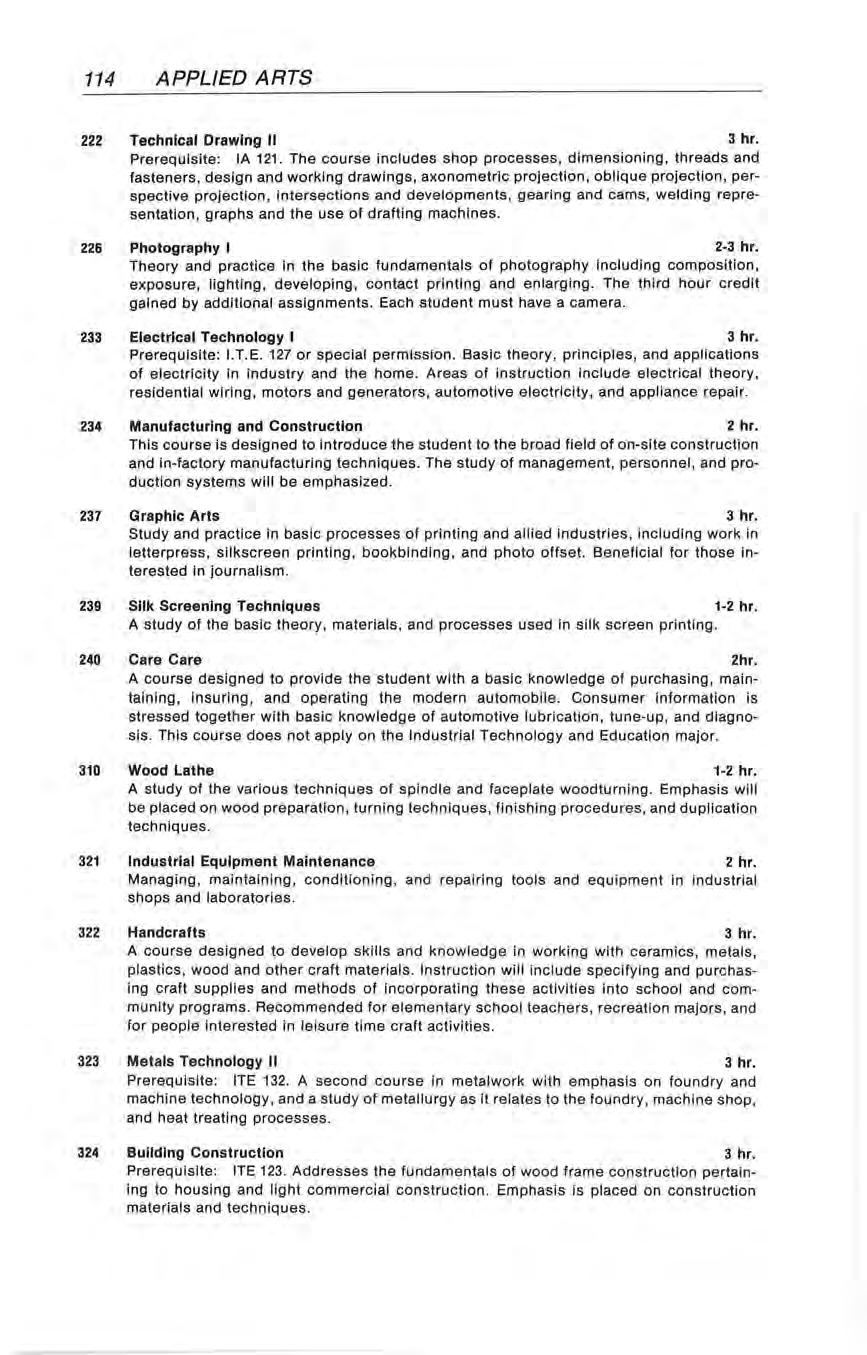
324 Building Construction
3 hr
Prerequisite: ITE 123 Addresses the fundamentals of wood frame construction pertaining to housing and light commercial con struction. Emphasis is placed on construction materials and techniques
325 Photography II
2-3 hr.
Prerequisite : ITE 226 Infra-red photography , high speed photography , portraiture , use of negative and positive color films , color printing, and dark room techniques.
328 Electrical Technology II
3 hr.
Prerequisite: ITE 233 or Phys 202 or by special permission A study of the principles and application of electronics and their applications in circuits, test equipment, vacuum tubes, transistors, radio, and television
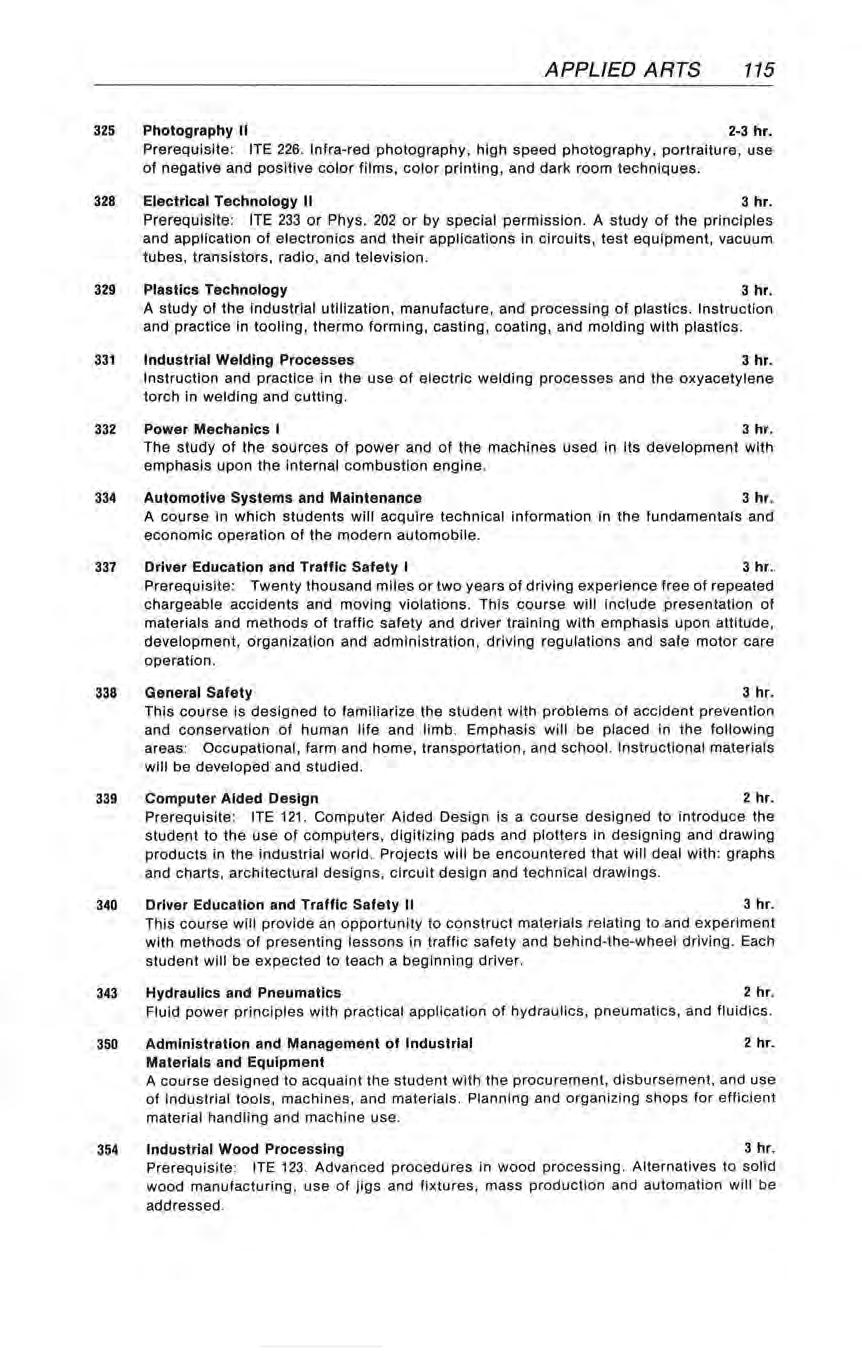
329 Plastics Technology
3 hr.
A study of the industrial utilization, manufacture , and processing of plastics. Instruction and practice in tooling, thermo forming, casting , coating, and molding with plastics
331 Industrial Welding Processes
3 hr
Instruction and practice in the use of electric welding processes and the oxyacetylene torch in welding and cutting.
332 Power Mechanics I
3 hr .
The study of the sources of power and of the machines used in its development with emphasis upon the internal combustion engine
334 Automotive Systems and Maintenance
3 hr.
A course in which students will acquire technical information in the fundamentals and economic operation of the modern automobile.
337 Driver Education and Traffic Safety I
3 hr.
Prerequisite: Twenty thousand miles or two years of driving experience free of repeated chargeable accidents and moving violations This course will include presentation of materials and methods of traffic safety and driver training with emphasis upon attitude, development, organization and administration, driving regulations and safe motor care operation.
338 General Safety
3 hr.
This course is designed to familiarize the student with problems of accident prev e ntion and conservation of human life and limb Emphasis will be placed in the following areas : Occupational, farm and home , transportation , and school. Instructional materials will be developed and studied.
339 Computer Aided Design
2 hr.
Prerequisite: ITE 121. Computer Aided Design is a course designed to introduce the student to the use of computers, digitizing pads and plotters in designing and drawing products in the industrial world. Projects will be encountered that will deal with: graphs and charts, architectural designs , c ircuit design and t ec hnical drawings.
340 Driver Education and Traffic Safety II
3 hr.
This course will provide an opportunity to construct materials relating to and experiment with methods of presenting lessons in traffic safety and behind-the-wheel driving. Each student will be expected to teach a beginning driver.
343 Hydraulics and Pneumatics
2 hr. Fluid power principles with practical application of hydraulics, pneumatics , and fluidics.
350 Administration and Management of Industrial
2 hr. Materials and Equipment
A course designed to acquaint the student with the pro cure ment , disbursement, and use of industrial tools , machines , and mat er ials Planning and organizing shops for efficient material handling and machine use .
354 Industrial Wood Processing
3 hr
Prerequisit e: ITE 123 Advanced procedures in wood processing. Alternatives to so lid wood manufacturing, use of jigs and fixtures, mass production and automation will be addressed.
355 Private Pilot Ground School
3 hr.
This course includes all items needed to pass the written examination required to receive a pilot ' s license. Course content includes basic aerodynamics , weather patterns , types of aircraft , history of flying, government regulation safety, navigation , and the duties and responsibilities of a private pilot.
370 Robotic Applications
400
3 hr.
Instruction in the fundamentals and management of robots in industry The course will introduce the student to the evolution, classification, safety, economics, sociological impact , and future capabilities of industrial robots , as well as developing a familiarization of present uses in a variety of industrial applications.
Individual Studies in Industrial Arts
1-3 hr.
Prerequisite : Approval by department. Independent study of Industrial Arts to meet the needs of the student For majors only
405 Study of Industries Workshop
3 hr
This course is designed to develop an awareness of technological advancem e nts in a variety of contemporary industries . A bro a d-based overview of the organization and ta xonomy of American Industry will be observed. The cluster approach to the study of industry will be engaged; i.e. The Communications Industry, The Power , Energy , and Transportation Industry , and the Manufacturing and Construction Industry
410 Digital Electronics
3 hr.
Prerequisite ITE 328 or permission. The study of digital integrated circuits which will include numbering systems , logic gates , flip flops , registers , clocks, and memories.
412 Microprocessors
425
3 hr.
Prerequisite ITE 410. The fundamental concepts of microprocessor s including software , hardware, and interface techniques Industrial applications will be examined.
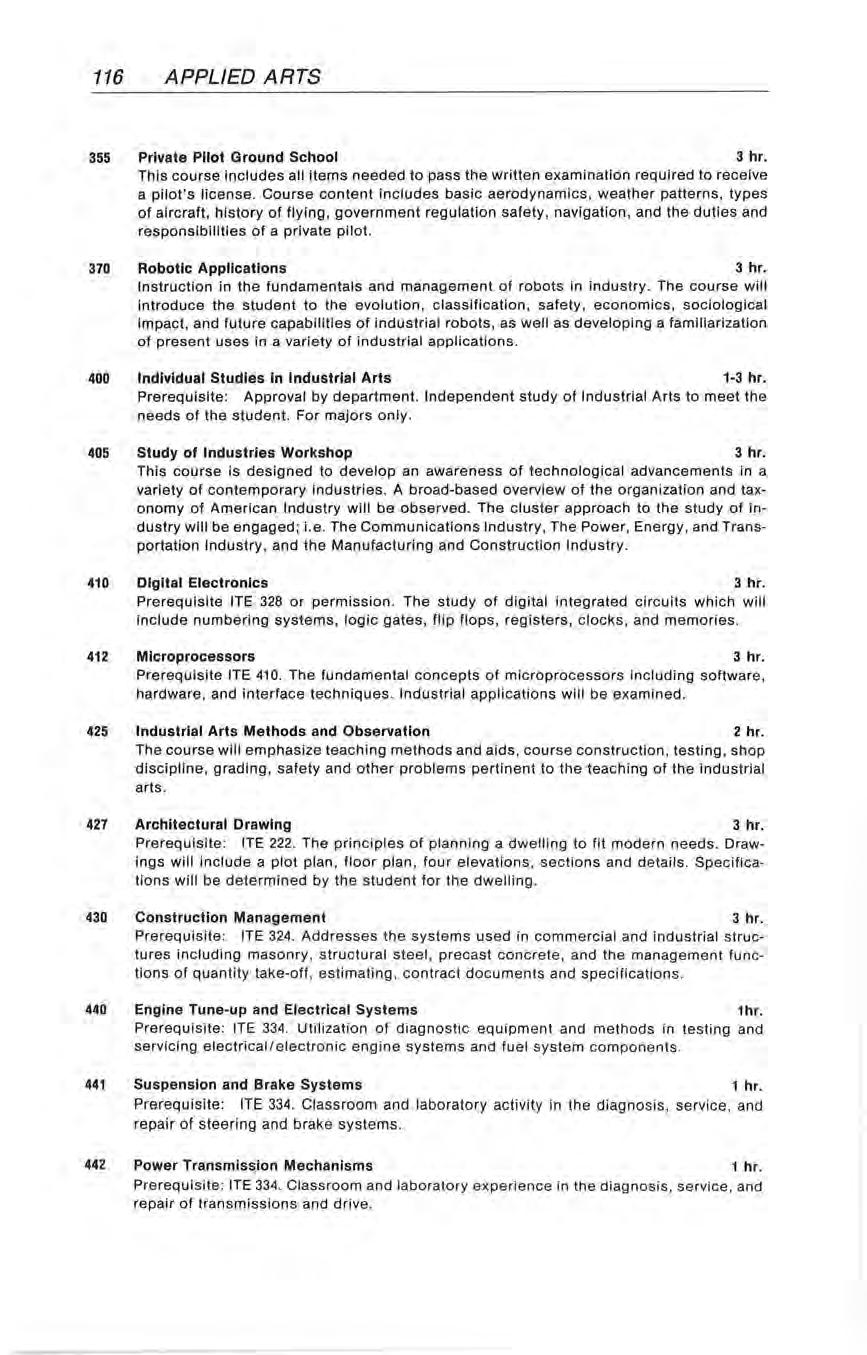
Industrial Arts Methods and Observation
2 hr .
The course will emphasize teaching methods and aids, course construction , testing , shop discipline , grading, safety and other problems pertinent to the teaching of the industrial arts .
427 Architectural Drawing
3 hr
Prerequisite : ITE 222. The principles of planning a dw e lling to fit modern needs. Drawings will include a plot plan , floor plan, four elevations, sections and details Specifications will be determined by the st udent for the dw e lling
430 Construction Management
3 hr.
Prerequisite : ITE 324. Addre sses the systems used in commercial an d industrial structures including masonry , st ructural steel, precast concrete, and the managem ent fun ctions of quantit y tak e-of f , estimating, co nt ract documents and specifications.
440 Engine Tune-up and Electrical Systems
1hr.
Prerequisite : ITE 334. Utilization of diagnostic equipment and methods in testing and servicing electrical/electronic e ngine sys t e ms and fuel sys tem co mpon e nts
441 Suspension and Brake Systems
442
1 hr.
Prerequisite: ITE 334. Classroom and laboratory activity in the diagnosis , service, and repair of steering and brake systems.
Power Transmission Mechanisms
1 hr .
Pr e requisite : ITE 334 Classroom a nd labor ato r y expe rien ce in the diagnosis, service, a nd repair of transmissions and drive
480 Industrial Management Internship
6-12 hrs. Prerequisite : Junior or Senior Industrial Management Technology major with approval of the chairman of the Applied Arts Division A student may enroll in from si x to twelve hours of credit for an approved work e x perience program. A minimum of 40 hours of work experience will be required for every hour of credit awarded The learning experience is organized and supervised by staff from the Applied Arts Division
441/541 History and Philosophy of Vocational Education
3 hr. Origins and philosophy of vocational education and the relationship to the school curriculum. Required for vocational certification and recommended as an elective for school administrators .
442/542 Organization and Administration of Vocational Education
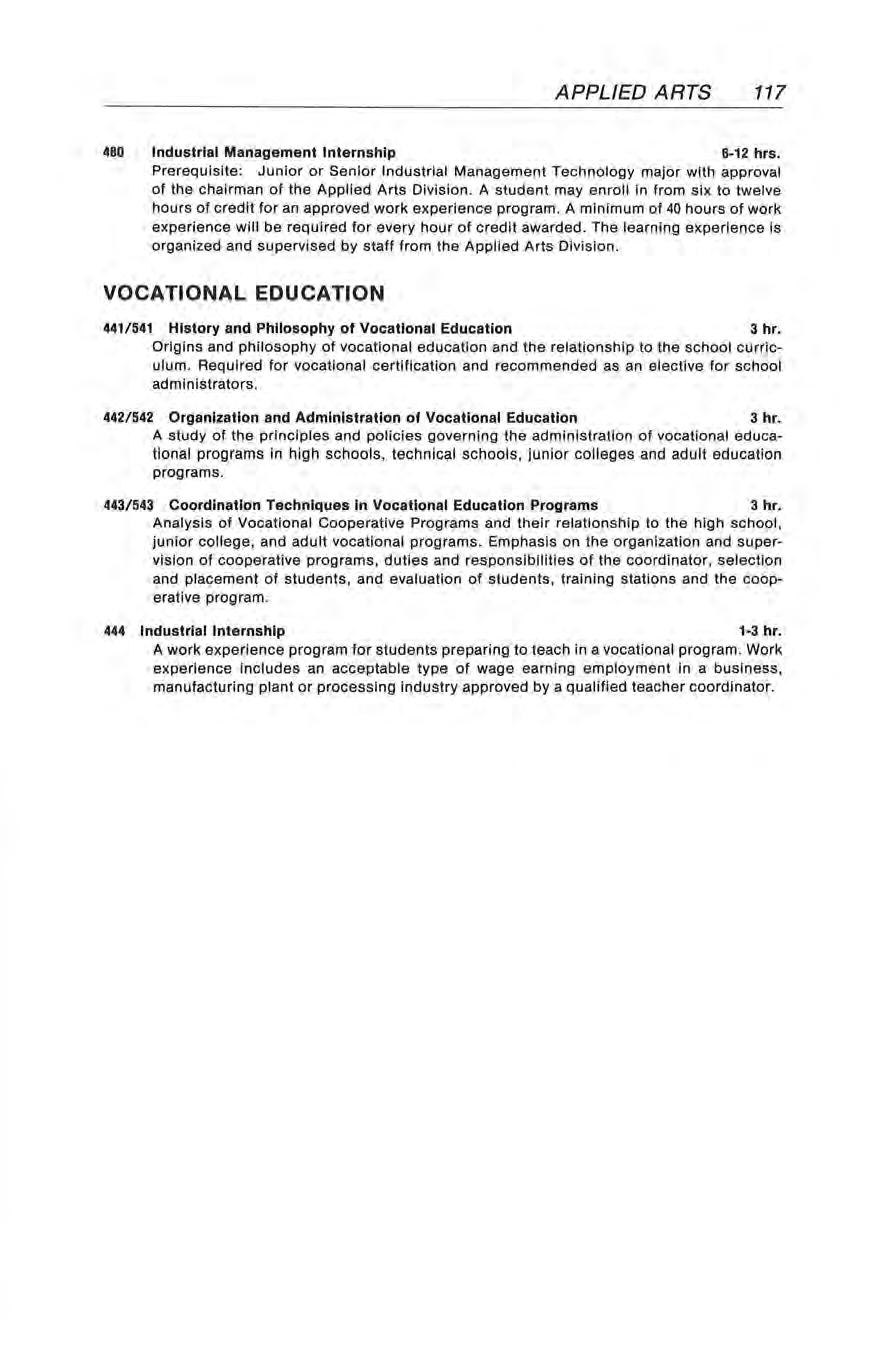
3 hr. A study of the principles and policies governing the administration of vocational educational programs in high schools, technic1;1i schools , junior colleges and adult education programs.
443/543 Coordination Techniques In Vocational Education Programs
3 hr. Analysis of Vocational Cooperative Programs and their relationship to the high school, junior college, and adult vocational programs Emphasis on the organization and supervision of cooperative programs, duties and responsibilities of the coordinator, selection and placement of students, and evaluation of students, training stations and the cooperative program
444 Industrial Internship
1-3 hr. A work experience program for students preparing to teach in a vocational program Work experience includes an acceptable type of wage earning employment in a business, manufacturing plant or processing industry approved by a qualified teacher coordinator.
100
Business Mathematics
3 hr.
A review of the four fundamental operations of arithmetic applied to whole numbers , fractions, and decimals; applications of percentage ; computing interest and discounting notes; consumer credit; cash and trade discount ; computing markup, retail and commission ; marking goods; the arithmetic of payrolls
123
Introduction to Business
3 hr.
A study of business and the environment in which it is conducted; types of business firms, functions they perform, problems confronting them and possible solutions for these problems are considered.
130 Principles of Banking
3 hr.
This course provides the foundation for most AIB courses Also , this course examines nearly every aspect of banking New banking personnel are encouraged to complete this course since it does provide a comprehensive introduction to the diversified services offered by the banking industry today
220 Intermediate Typewriting
3 hr.
Prerequisite: A beginning typing course. Stresses speed and accuracy in typewriting letters, manuscripts, tabulations and other forms.
222 Transcriptions I
3 hr
Prerequisite : Bus 220 or equivalent , and business education major or permission of instructor . Development skills in operating the transcribing unit. Meets five hours a week.
222 Transcriptions V
3 hr.
Prerequisite: Elementary shorthand skills Five hours attendance. A continuation of elementary shorthand, emphasizing the development of skill in dictation and transcriptions
222 Transcriptions VI
3 hr.
Prerequisite : Bus. 222 Transcriptions V or one year of high school shorthand. Five hours attendance. Emphasis is placed on increasing skills in taking dictation and transcribing it into mailable form.
222 Transcriptions VII
3 hr.
Prerequisite: Bus 222 Transcriptions VI. Five hours attendance. Greater increase of speed and accuracy in taking timed dictation
228 Principles of Marketing
3 hr. A study of the buying, selling , transporting and stor i ng functions involved in marketing; the student is introduced to retailing, wholesaling and marketing management.
231 Principles of Accounting I
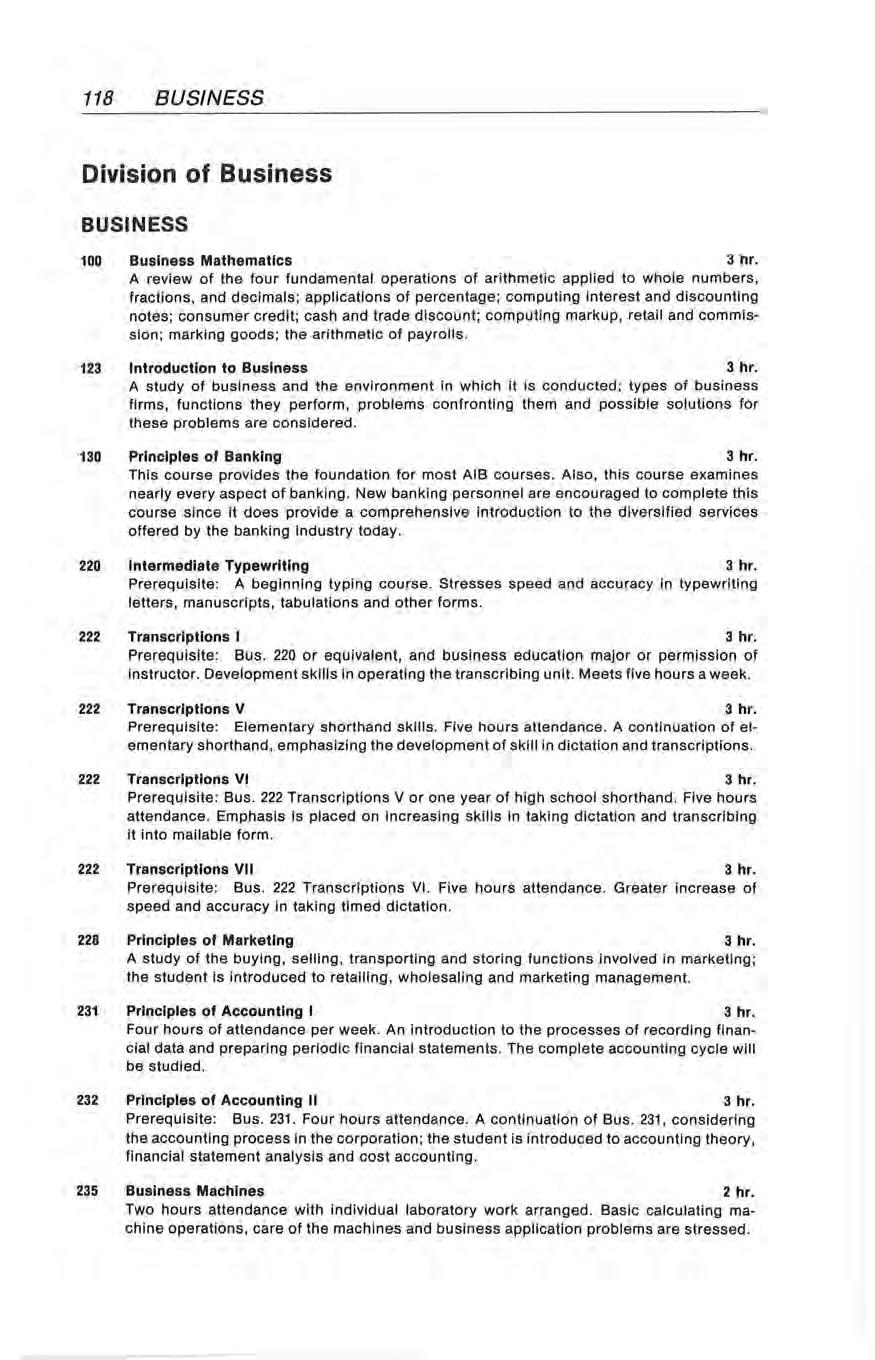
3 hr.
Four hours of attendance per week. An introduction to the processes of recording financial data and preparing periodic financial statements. The complete accounting cycle will be studied.
232 Principles of Accounting II
3 hr .
Prerequisite : Bus. 231 Four hours attendance. A continuation of Bus 231, considering the accounting process in the corporation; the student is introduced to accounting theory, financial statement analysis and cost accounting.
235
Business Machines
2 hr.
Two hours attendance with individual laboratory work arranged Basic calculating machine operations, care of the machines and business application problems are stressed.
237 Principles of Management
3 hr.
A study of the functions of management with an introduction to such areas as organization theory, decision making, leadership, and motivation as they apply to all organized groups, but geared primarily toward the existing business organization.
250 Salesmanship
3 hr.
A study of the skills and techniques used in selling and persuasion The course is designed to help the student learn to sell products and ideas through a study of proven techniques used by successful salespeople.
301 Business Communications
3 hr.
Prerequisite: Ability to type. A study of Business English and communication as well as a study of how to compose and produce the various kinds of letters used in the business world.
325
Secretarial Procedures
4 hr.
Prerequisites: Bus. 220. Five hours of attendance per week. This course is designed to develop competencies in both operational and managerial functions performed by the top-level secretary Operational functions involve an in - depth study of office and secretarial procedures This will include records management, word processing equipment, duplicating machines, and transcribing machines Managerial functions involve the development of a high degree of competency in administrative secretarial skills
329 Advertising
2 hr.
A study of various advertising media, their relative costs, the ethics and regulations involved, and the techniques used
331 Insurance
332
3 hr.
A study of the major types of business risks and the insurance available for the covering of these risks. Personal insurance will also be studied including : Life, Health and Accident Property , Public Liability, and Social Insurance Investment
3 hr.
Prerequisite: Bus. 232. A study of the major uses of investment funds, including saving accounts in banks and other financial institutions, government bonds , corporate stocks and bonds, annuities and real estate.
334 Advanced Typewriting
3 hr .
Prerequisite : Bus 220 Three hours attendance. Stresses the development of a high degree of proficiency in composition, machin e dictation and production typewriting
335 Industrial Management
3 hr.
Prerequisite: Bus. 231 , 237 required and Econ 221 recommended. A study of the evolution of operational management and its relationship to the total enterprise. Decision making, production and plant planning, systems design, manpower planning, and control systems are considered
337 Intermediate Accounting I
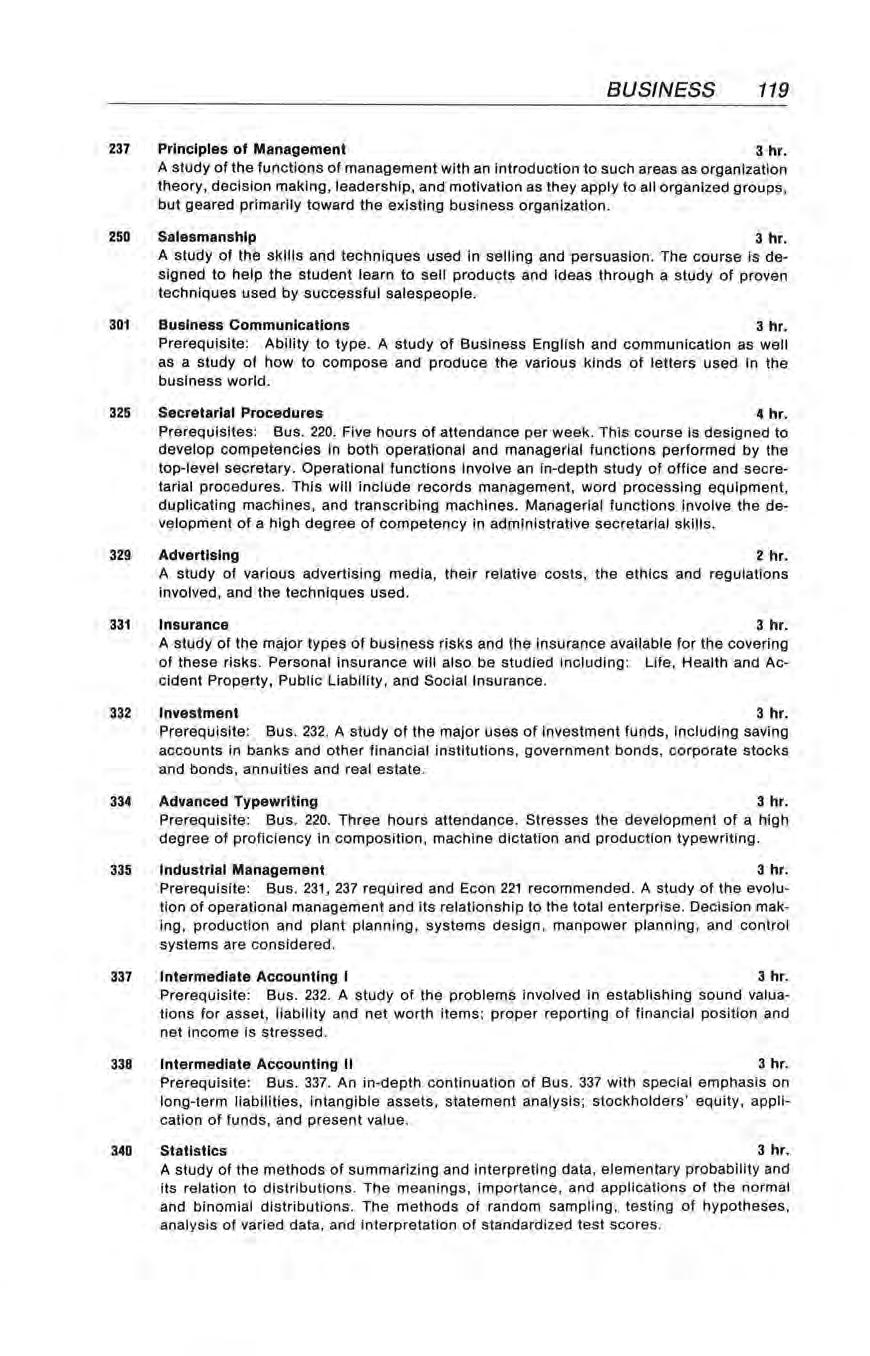
3 hr .
Prerequisite : Bus. 232 . A study of the problems involved in establishing sound valuations for asset, liability and net worth items; proper reporting of financial position and net income is stressed.
338 Intermediate Accounting II
Prerequisite : Bus. 337. An in-depth continuation of Bus 337 with special emphasis on long-term liabilities, intangible assets, statement analysis; stockholders ' equity, application of funds , and present value.
3 hr.
3 hr . 340
A study of the methods of summarizing and interpreting data, elementary probability and its relation to distributions. The meanings, importance, and applications of the normal and binomial distributions. The methods of random sampling, testing of hypotheses, analysis of varied data , and interpretation of standardized test scores.
341 Income Tax Accounting
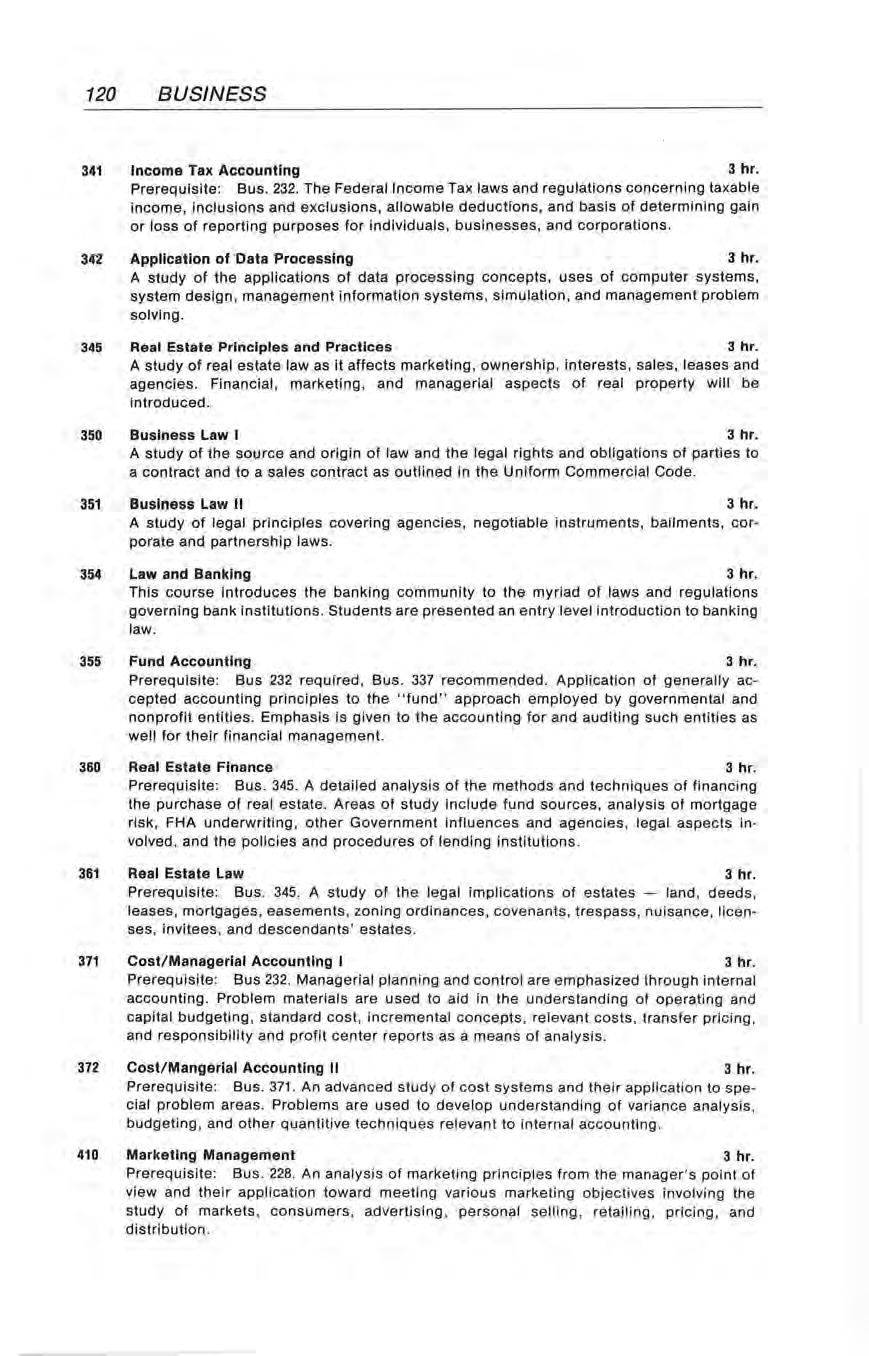
3 hr.
Prerequisite: Bus. 232. The Federal Income Tax laws and regulations concerning taxable income, inclusions and exclusions, allowable deductions, and basis of determining gain or loss of reporting purposes for individuals, businesses, and corporations.
342 Application of Data Processing
3 hr.
A study of the applications of data proc essi ng concepts, uses of computer systems, system design, managem e nt information systems, simulation, and management problem solving.
345 Real Estate Principles and Practices
3 hr.
A study of real estate law as it affects marketing, ownership, inter ests, sales, leases and agencies. Financial, marketing, and managerial aspects of real property will be introduced.
Business Law I
3 hr.
A study of the source and origin of law and the legal rights a nd obligations of parties to a contract and to a sales contract as outlined in th e Uniform Commercial Code.
Business Law II
3 hr.
A study of legal principles covering agencies, negotiable instruments, bailments, corporate and partnership laws
354 Law and Banking
3 hr.
This course introduces the banking community to the myriad of laws and regulations governing bank institutions. Students are presented an entry l evel introduction to banking law 355
3 hr
Prerequisite: Bus 232 required, Bus. 337 recommended. Application of generally accepted accounting principles to the "fu nd" approach employed by governmental and nonprofit entities. Emphasis is given to the accounting for and auditing such entities as well for their financial manag e ment.
3 hr.
Prerequisite: Bus. 345. A detailed analysis of the methods and techniques of financing the purchase of real estate. Areas of study include fund sources, analysis of mortgage risk, FHA underwriting, other Government influences and agencies, legal aspects involved, and the policies and procedures of lending institutions.
3 hr.
Prerequisite: Bus. 345 A study of the lega l implications of estates - land , deeds, leases, mortgages, easements, zoning ordinances, covenants, trespass , nuisance, lic e nses, invitees, and descendants' estates.
371 Cost/Managerial Accounting I
3 hr.
Prerequisite: Bus 232. Managerial planning and con trol are emphasized through internal accounting Problem materials are used to aid in the understanding of operating and capital budgeting, standard cost , incrementa l concepts , relevant costs, transfer pricing, and responsibility and profit center reports as a means of analysis.
372 Cost/Mangerial Accounting II
3 hr.
Prerequisite: Bus. 371 An advanced study of cost systems and their app li cation to special problem areas. Probl e ms are used to develop und erstanding of variance analysis, budgeting , and other quantitive techniques relevant to internal accounting.
410 Marketing Management
3 hr.
Prerequisite: Bus. 228. An analysis of marketing principles from the manager's point of view and their application toward meeting various marketing objectives involving the study of markets, consumers, advertising , personal selling , retailing, pricing, and distribution
415 Credit Management
3 hr.
Prerequisite: Business 237. An in-depth study of the sources of credit information and the legal aspects of credit and collections for businesses.
425 Methods of Teaching Business Subjects
2 hr.
Current methods of teaching typewriting, shorthand, bookkeeping, office practice and basic business are considered; sources and uses of instructional aids are emphasized.
432 Business Finance
3 hr.
Prerequisite : Bus. 232 and Econ 220, Math 101 or Math 340 recommended. A study of the uses of funds to finance assets, internal and external sources of funds and the cost of funds obtained from alternative sources under various conditions.
433 Administrative Management
3 hr
Prerequisite: Business 237. A study of the management of an office. Areas of study include location, layout, equipment, supplies, automation, controlling expenses, measuring efficiency of operation , establishing quantity and quality production standards, and the adminstration of personnel.
434 Personnel Management
3 hr.
Prerequisite: Bus. 237. A study of the management of employees and the efficient use of human resources for both the personnel manager and the operating manager Recruiting, motivating, compensating are considered along with the current laws, career development, unions , and other topics Case studies are used extensively
438 Analysis of Financial Statements
3 hr.
Prerequisite: Bus . 338. A course based on the study of corporation financial statements and their interpretation Statements of corporations will be used and the emphasis will be on the report analyzing the financial position and earnings of various compan ies
440
Independent Study In Business
Prerequisites: Permission of the instructor.
441 Internship In Business
1-4 hr.
1-12 hr.
Prerequisite: Business major and/or permission of instructor This course is to be taken near the ending of formal college courses by students in the areas of management , marketing, accounting , finance, retail merchandising, and secretarial programs. Students may enroll for from 1-12 hours of credit upon the approval of the Division of Business. The learning situation is organized and supervised by the Business Division. A minimum of forty hours of work experience will be required for every hour of credit Internship credit may also be obtained by the student taking a case in the Small Business Institute program. The student is to work in coordination with the Small Business Administration, a college business faculty member, and a job training station provided by the college or Small Business Administration. The student will do e x tensive research in a team effort and will prepare a research paper. College credit for this internship will be from 1 to 3 hours.
A maximum of 15 hours of credit in Bus. 441 is allowed to apply toward a Bachelors degree
443 Quantitative Management
3 hr
Prerequisite: Permission of Instructor The study of systems and management science. The course includes a development of analytical reasoning and logic and set concepts, as well as such topics as decision processes, linear programming , waiting lines , stochastic processes , forecasting methods , inventory control, input/output analysis , and general modeling
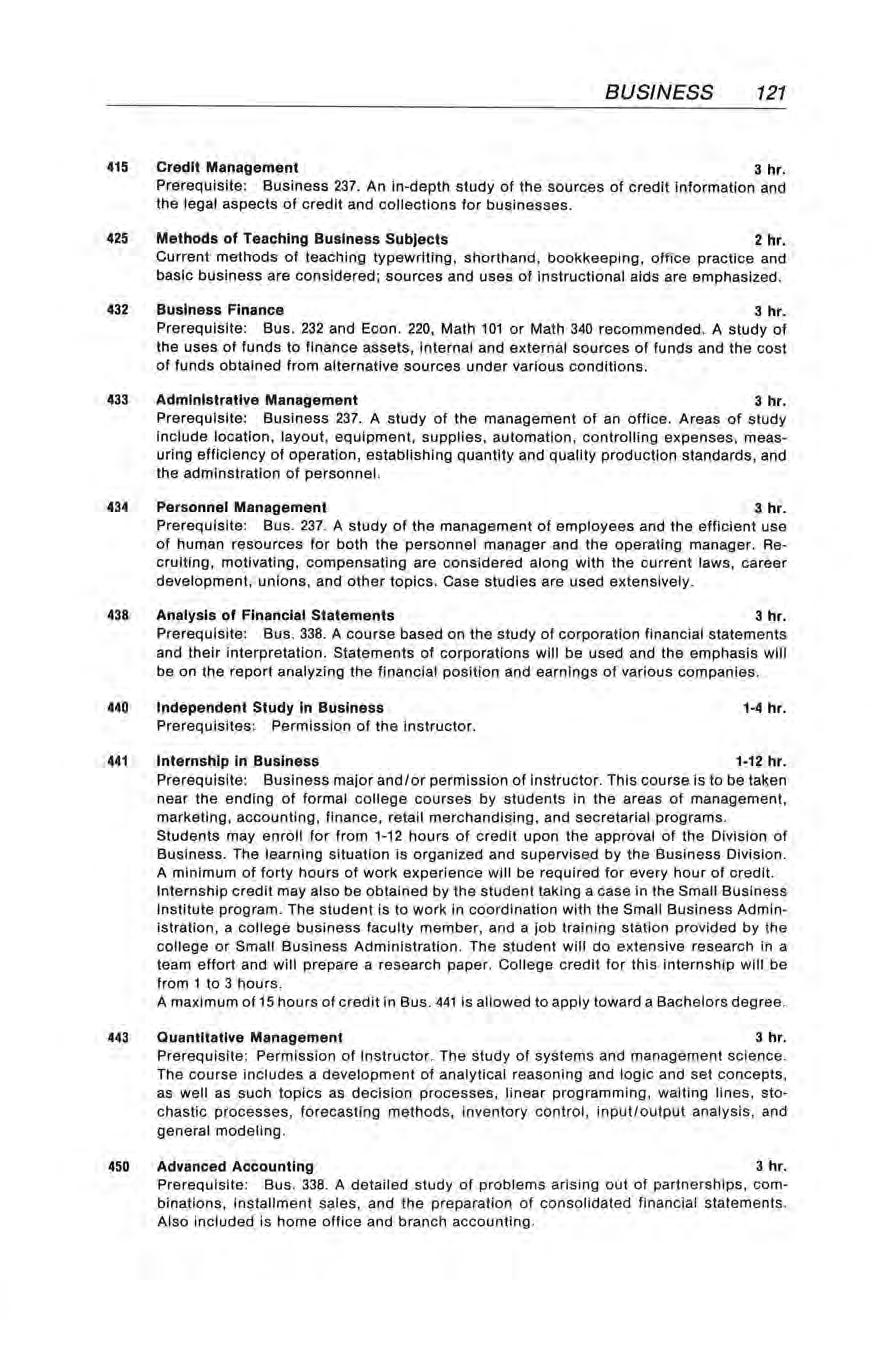
450 Advanced Accounting
3 hr
Prerequisite: Bus. 338. A detailed study of problems arising out of partn e rships, combinations, installment sales , and the preparation of consolidated financial statements . Also included is home office and branch acc ounting.
470 Auditing Principles
490
3 hr.
Generally accepted auditing standards and procedures with philosophy supporting them. Auditing techniques available to the independent public accountant.
Prerequisites: Bus 338 and 339 or by permission
CPA Review
3 hr.
Prerequisite: Bus . 450. Intensive presentation of overall acco unting and related materials summarizing CPA examinations and solutions An in -depth study of APB opinions and financial research bulletins
495 Business Polley
3 hr.
Prerequisite: Senior business major A case-study approach requiring indepth analytical and communication skills. Requirements include a thorough review of all given and acquired data, formulation of well-defined problems, and structured plans of action to be presented in written and oral form
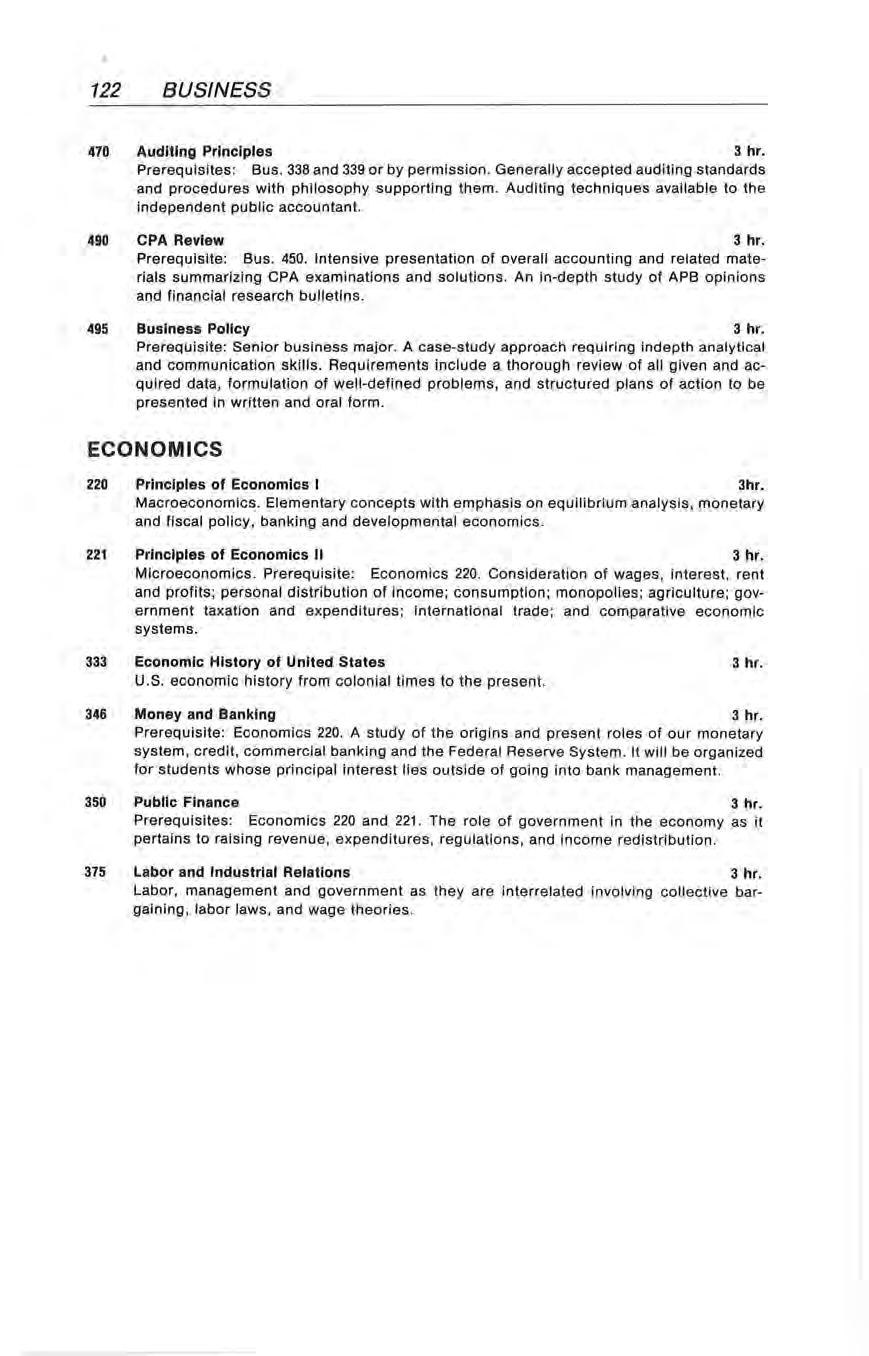
220 Principles of Economics I 3hr. Macroeconomics Elementary concepts with emp hasis on equilibrium analysis , monetary and fiscal policy, banking and developmental economics.
221 Principles of Economics II
3 hr.
Microeconomics. Prerequisit e : Economics 220 Consideration of wages, interest , rent and profits; personal distribution of income; co nsumption ; monopolies; agriculture ; government taxation and expenditures; international trade; and comparative economic systems
3 hr.
Prerequisite : Economics 220 . A study of the origins and present roles of our monetary system , credit, commercial banking and the Federal Reserve System. It will be organized for students whose principal interest lies outside of going into bank management.
Public Finance
3 hr.
Prerequisites : Economics 220 and 221 The role of government in the economy as ·it pertains to raising revenue, e x penditures , regulations, and income redistribution. Labor and Industrial Relations
3 hr. Labor , management and government as they are interrelated involving co ll ective bargaining, labor laws , and wage theories
200 Foundations of Education
3 hr.
A study of the growth and development of American Education in terms of the institutions, philosophy , legislation , court decisions, curriculum, teaching - learning situations and relationship of community and school. One hour of Education 207 - Practi c um must be taken the same time
207
Practicum
1-4 hr
Approval. Laboratory based e x periences with teaching and nonteaching responsibilities Practicum must be taken the sam e semester as ED 200.
302 The Disadvantaged Child
3 hr
Prerequisite: Psych 121 An interdisciplinary study designed to discuss the influences of culture on children in regard to educational and economic participation
305 Principles of Early Childhood
3 hr .
This course is designed to give students theory and practice necessary for teaching and caring for children from infancy through age si x. It is an introduction to professional preparation for pre - schools and child care
310 Kindergarten Education
3 hr.
Prerequisite : Psych 121 . This course deals with curriculum , program plann i ng, materials, and individualization in kindergarten.
325 Methods of Teaching Communication Arts and Social Studies
3 hr. Elementary education majors will have an opportun i ty to consider approaches to instruction and participation in clinical teaching laboratory
326 Methods of Teaching Mathematics and Science
3 hr. El e mentary education majors will have an opportunity t o consider approaches to instruction and participation in clinical teaching laboratory.
334 Teaching Reading
3 hr.
A study of the current methods in teaching of reading in the elementary school. Includes study of reading materials and their uses , reading evaluation procedures , and the relating of developmental reading to an understanding of children.
335 Problems In Reading Seminar
3 hr.
A seminar designed to give a mutual understanding of the problems in reading , grades 1 to 12 inclusive
338 Teaching Secondary Reading
3 hr.
A study of the cur r ent trends and practices in developmental , corrective , and remedial reading in the secondary schools Adolescent literature and re ading needs will be related to the instructional demands in both reading improvement skills and using reading as a tool for learning in the content field.
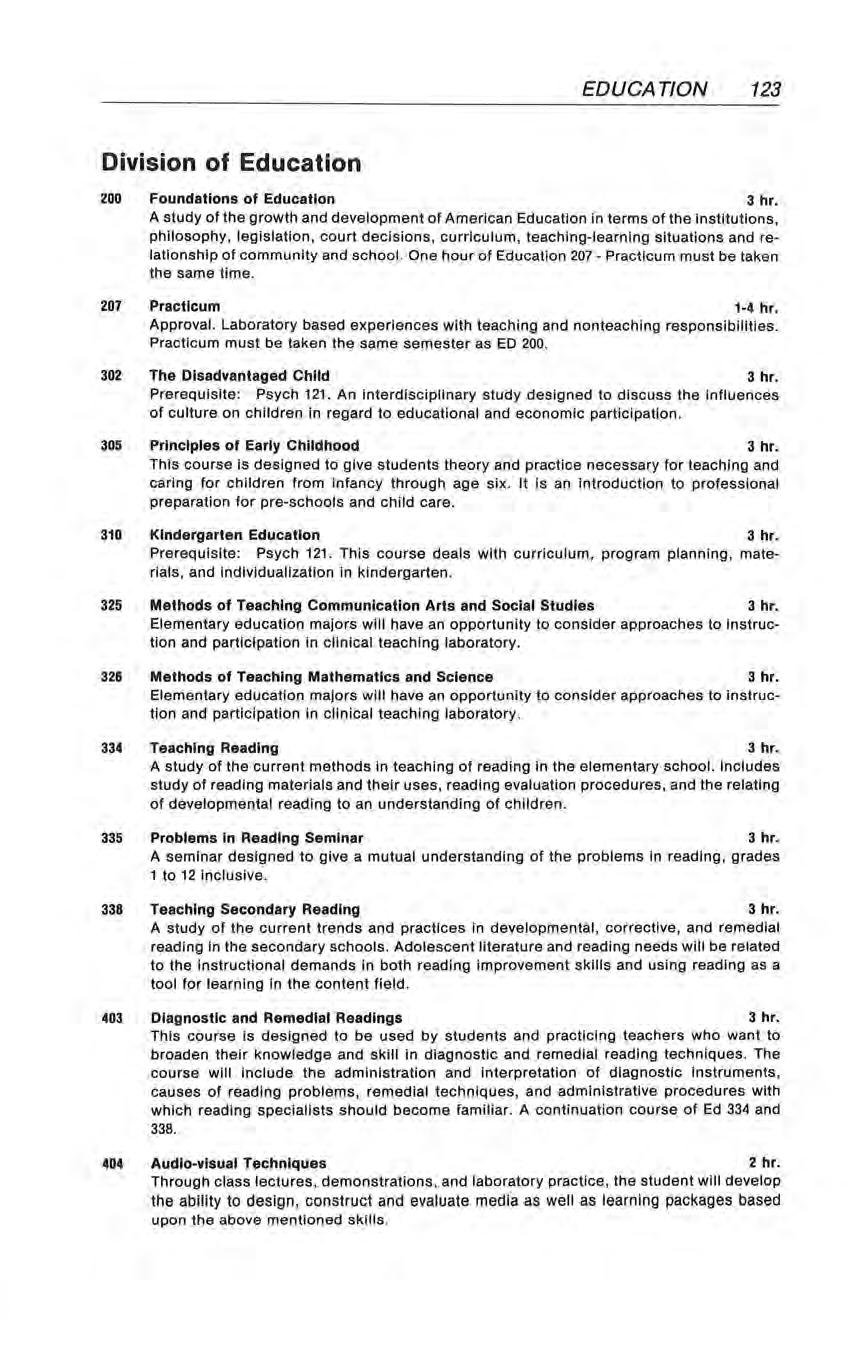
403 Diagnostic and Remedial Readings
3 hr.
This course is designed to be used by students and practicing teachers who want to broaden their knowledge and skill in diagnostic and r emedial reading techniques. The course will include the administration and interpret ation of diagnostic instruments, causes of reading problems , remedial techniques , and administrative procedures with which reading specialists should become familiar A continuation course of Ed 33 4 and 338.
404 Audio-visual Techniques
2 hr
Through class lectures , demonstrations , and laboratory practice, the student will develop the ability to design , construct and evaluate media as well as learning packages based upon the above mentioned skills.
2 hr.
The purpose of this course is to help prepare a prospective teacher in those many areas of school - community relations and related areas not covered in previous classes. Among units to be studied are: Parent-Teacher Conferences, Multi-cultural relationships, Dealing with the mainstreamed youngster in the regular classroom, Drug and alcohol awareness , Job application and interviewing techniques
Tests and Measurements
2 hr.
A study of evaluation procedures which employs self-evaluation, observation, teacher made tests, and standardized tests This course also presents basic statistics which are used in the analysis , interpretation, and use of test results.
Instructional Methods
3 hrs.
A synthesis of teaching competencies invo lving planning , preparation , and presentation
The development of a complete teaching unit containing unit plans, daily lesson plans , calendar of events, objectives, materials for instruction , audio-visuals, various models of teaching , and evaluation procedures are required Students will be videotaped in a microteaching situation
Student Teaching (Elementary)
4 hr , 8 hr.
Prerequisite: Approval for professional semester. A practical application of principles of learning in the classroom Progressive induction into full teaching responsibility at the elementary level. Students teach full-time for nine weeks Application for student teaching must be made at the end of the junior year.
Student Teaching (Secondary)
8 hr.
Prerequisite: Approval for professional semester. Experience in the application of sound educational theory by actually teach i ng students in the secondary school. All students who intend to be certified as secondary teachers are cautioned that the courses in the professional semester are integrated with student teaching and should not be taken in previous semesters Application for student teaching must be made at the end of the junior year.
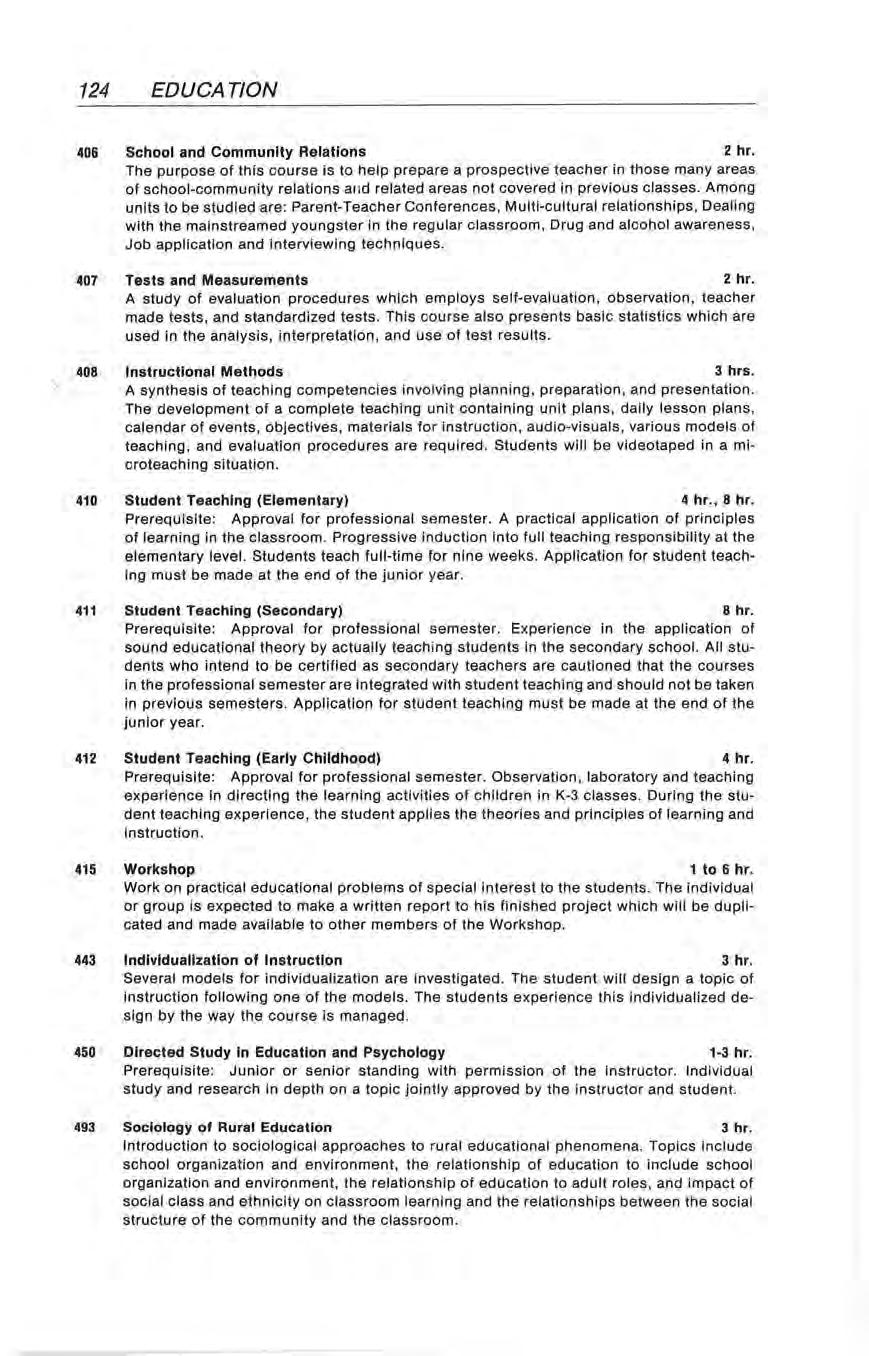
412 Student Teaching (Early Childhood)
4 hr.
Prerequisite: Approval for professional semester. Observation , laboratory and teaching experience in directing the learning activities of children in K-3 classes During the student teaching experience, the student applies the theories and principles of learning and instruction
415 Workshop
443
1 to 6 hr.
Work on practical educational problems of special interest to the students. The individual or group is expected to make a written report to his finished project which will be duplicated and made available to other members of the Workshop.
lndivldualization of Instruction
3 hr .
Several models for individualization are investigated The student will design a topic of instruction following one of the models. The students e x perience this individualized design by the way the course is managed.
450 Directed Study In Education and Psychology
1-3 hr
Prerequisite: Junior or senior standing with permission of the instructor. Individual study and research in depth on a topic jointly approved by the instructor and student.
493 Sociology of Rural Education
3 hr.
Introduction to sociological approaches to r ural educational phenomena Topics include school organization and environment, the relationship of education to include school organization and environment, the relationship of education to adult roles , and impact of social class and ethnicity on classroom learning and the relationships between the social structure of the community and the classroom.
495 Methods of Teaching Social Science for Rural Educators
3 hr.
An examination of trends and issues in social studies curricu lum a nd instruction with particular emphasis on the specific applicability of the " n ew" social studies for ruralbased social science teachers.
200 Introduction to Special Education
240
3 hr.
A survey course designed to acquaint the learn er with etiology , characteristics , and l earning styles of impaired and exceptional students.
Introduction to Retardation
3 hr.
Prerequisites: Spec. Ed 200. A survey course of the characteristics, abilities and needs ; lhe psychological, environmental and cultural factors which contribute to retardation. Teaching strategies and mat er ials are reviewed and evaluated.
260 The Socially, Emotionally Maladjusted Student
331
3 hr.
The causes and symptoms of emotional deviation will be reviewed The cu rrent techniques of classroom management and behavioral intervention will be discussed.
The Gifted Child
3 hr.
Prerequisite: SpEd 200 Definition of giftedness (intellectual) and introdu ct ion to materials and techniques for identifying and helping to understand the specific developmental needs of gifted pupils Types of learning tasks and methods of evaluating achievement are discussed
350 Diagnosis and Remediation
3 hr.
Prerequisite: SpEd 200. A survey course of diagnostic instruments and their uses for appropriate placement and remediation. The student will use and administer the instruments, interpret the results , and develop educational programs based on their asessments.
420 Special Learning Disabilities
3 hr.
Designed to prepare teachers to identify the learning disabled student in the regular classroom. Various assessment instruments will br reviewed in order that the teacher can diagnose the specific strengths and weaknesses the learning disabled student exhibits and the specific intervention strategies which can be implemented to remediate or circumvent the student's educational deficits.
423 Methods and Materials In Special Education-Elementary
3 hr.
Prerequisite: Sp Ed 240 A course in developing appropriate materials in the major area of academic study. Emphasis will be on developing knowledge, skills and techniques for successfully teaching in the special education classroom.
424 Methods and Materials of Special Education
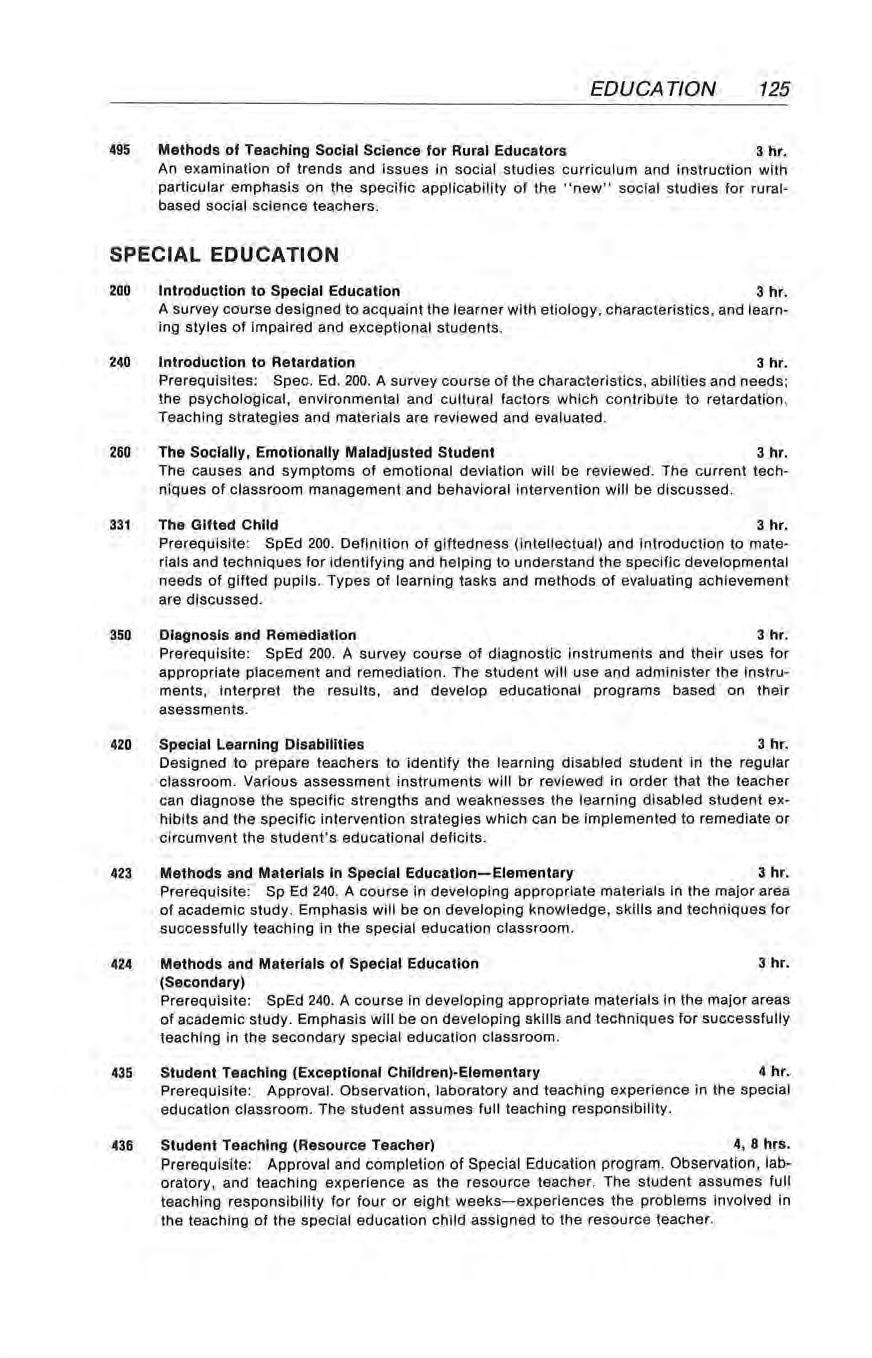
3 hr. (Secondary)
Prerequisite: SpEd 240. A course in developing appropriate materials in the major areas of academic study. Emphasis will be on developing skills and techniques for successfully teaching in the secondary special education c lassroom
435 Student Teaching (Exceptional Children)-Elementary
4 hr.
Prerequisite : Approval. Observation, laboratory and teaching expe rien ce in the special education classroom The student assumes full teaching responsibility.
436 Student Teaching (Resource Teacher)
4, 8 hrs.
Prerequisite : Approval and completion of Special Education program. Observation, laboratory, and teaching experience as the resource teacher The student assumes full teaching responsibility for four or eight weeks-experiences the problems involved in the teaching of the special education child assigned to the resource teacher.
437 Student Teaching (Exceptional Children)
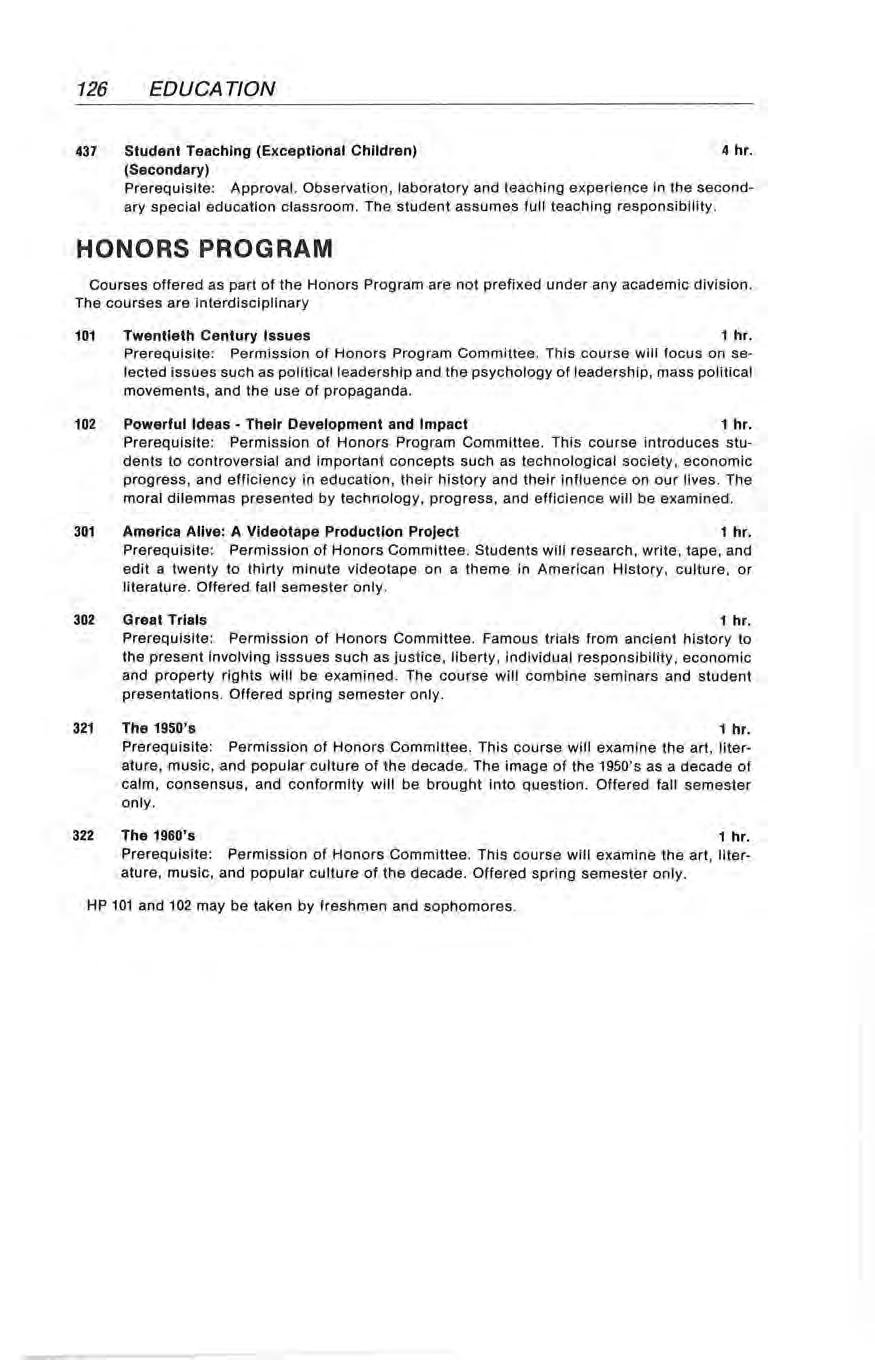
4 hr. (Secondary)
Prerequisite : Approval. Observation, laboratory and teaching e x perienc e in the secondary special education classroom The student assumes full teaching responsibility.
Courses offered as part of the Honors Program a re not prefixed under any academic division. The courses are interdisciplinary
101 Twentieth Century Issues
1 hr.
Prerequisite : Permission of Honors Program Committee This course will focus on selected issues such as political leadership and the psychology of lead e rship, mass political movements , and the use of propaganda
102 Powerful Ideas • Their Development and Impact
1 hr.
Prerequisite : Permission of Honors Program Committee. This course introduces students to controversial and important concepts such as technological society, economic progress, and efficiency in education, their history and their influence on our lives The moral dilemmas presented by technology , progress , and efficience will be e x amined
301 America Alive: A Videotape Production Project
1 hr.
Prerequisite : Permission of Honors Committee Students will research , write , tape , and edit a twenty to thirty minute videotape on a theme in American History , culture, or literature. Offered fall semester only
Great Trials
1 hr.
Prerequisite: Permission of Honors Committee. Famous trials from ancient history to the present involving isssues such as justice , liberty , individual responsibility, economic and property rights will be examined. The course will combine seminars and student presentations. Offered spring semester only
The 1950's 1 hr.
Prerequisite: Permission of Honors Committee. This cours e will examine the art, literature, music, and popular culture of the decade. The image of the 1950's as a decade of calm , consensus, and conformity will be brought into question Offered fall semester only
The 1960's 1 hr
Prerequisite: Permission of Honors Committee This course will examine the art, literature , music, and popular culture of the decade Offered spring semester only.
HP 101 and 102 may be taken by freshmen and sophomores
90 Study Skills - Reading 1 hr.
This one hour lab course is designed to improve reading skills Students (first time freshmen) scoring below the 12th grade level on the Nelson-Denny Reading Test will be required to successfully complete the c ourse.
This lab course is presented as an e x tension of English 101. Students scoring 14 or below on the English subtest of the ACT or equivalent score in the SAT are required to enroll. If those scores are not available , the Missouri Test will be administered, and students scoring below the 30th percentile on that test will be required to e nroll. The class is to be taken in conjunction with English 101. Added emphasis will be placed on communication skills.
hr A course presented to allow students an opportunity to improve their general study skills.
A study of the principles of c lear and effective e x pression as appl i ed to the sentence, paragraph, and the whole composition A review of grammar , me c hanics, and correct usage . Training i n organization, and the writing of short and long pap e rs . Required course for all freshmen. (Note : Students who rank at the 85th perc entile or higher on the English portion of the ACT may be excused from Eng. 101.)
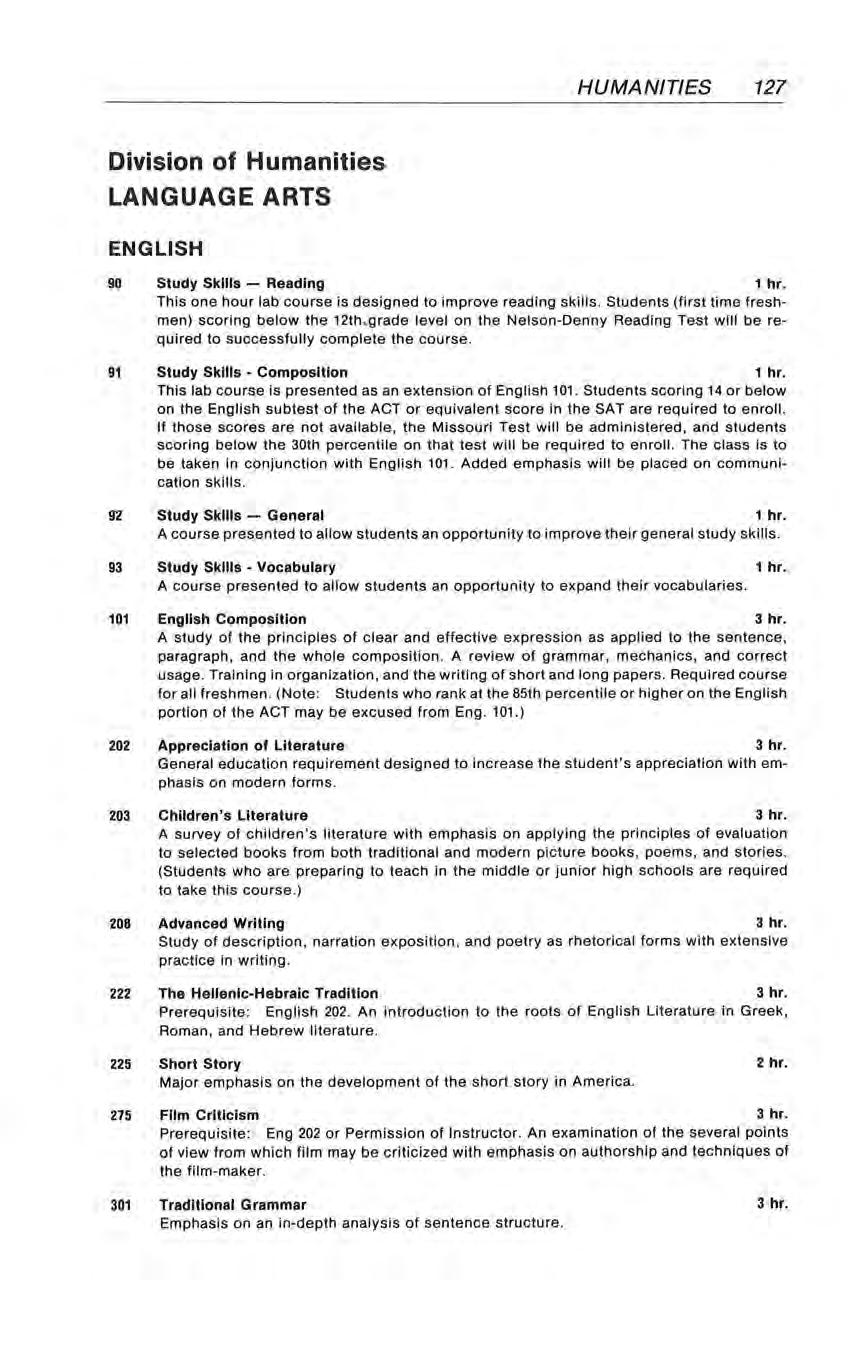
3 hr
A survey of children's literature with emphasis on applying the principles of evaluation to selected books from both traditional and modern picture books , poem s , and stories (Students who are preparing to teach in the middle or junior high schools are required to take this cour se. )
of description , narration e x pos i tion , and poetry as rhetorical forms with e xtensive pract i ce in
English 202 An introduction to the roots of English Literature in Greek , Roman, and Hebrew lit e rature
3 hr . Prerequisite: Eng 202 or Permission of Instructor An examination of the several points of view from which film may be criticized with emphasis on authorship and techniques of the film-maker.
on an in-depth analysis of sentence structure
302 English Composition
3 hr.
Prerequisite: Eng. 101 and junior standing. Furth e r training in theme writing, with emphasis on organization and research, practice in the use of logic , and evidence to support generalizations Required course for all juniors.
305 Practicum In Composition
1-3 hr.
An investigation of the relationship between such factors as the study of rhetorical theory, grammar, reading level, and listening skill in determining a student's ability to communicate effectively. 306 Nebraska Literature
2 hr .
Prerequisite : Consent of the department. An introduction to the works of Nebraska writers and literature about Nebraska
Seminar In the Modern Novel
2 hr
The study of modern fiction as it mirrors the philosophical, sociological, psychological , and scientific thought of the twentieth century.
Medieval Literature
3 hr
The twelfth through fourteenth centuries with special emphasis upon Chaucer as central figure and the development of the Romance . 321 Romantic Period
3 hr
A study of the major Romantic Poets Some attention is given to the novel and preromantics such as Blake.
Victorian Period
3 hr.
Nineteenth century England as seen by her major poets and novelists; some attention given to prose writers.
American Literature I
3 hr.
An historical survey of s ig nifi cant American writ in g from the Colonial Period to 1865. Major writers receive chief emphasis.
American Literature II
A continuation of English 324 from 1865 to the present
328 Modern Poetry
3 hr.
2 hr .
A study of British and American poetry of this century and its relevance to contemporary literature and life.
405 Teaching English and Speech
2 hr.
A study of the basic obje c tives and the scope of English, speech, and debate in the secondary curriculum. Current techniques used in teaching the three areas are examined and evaluated.
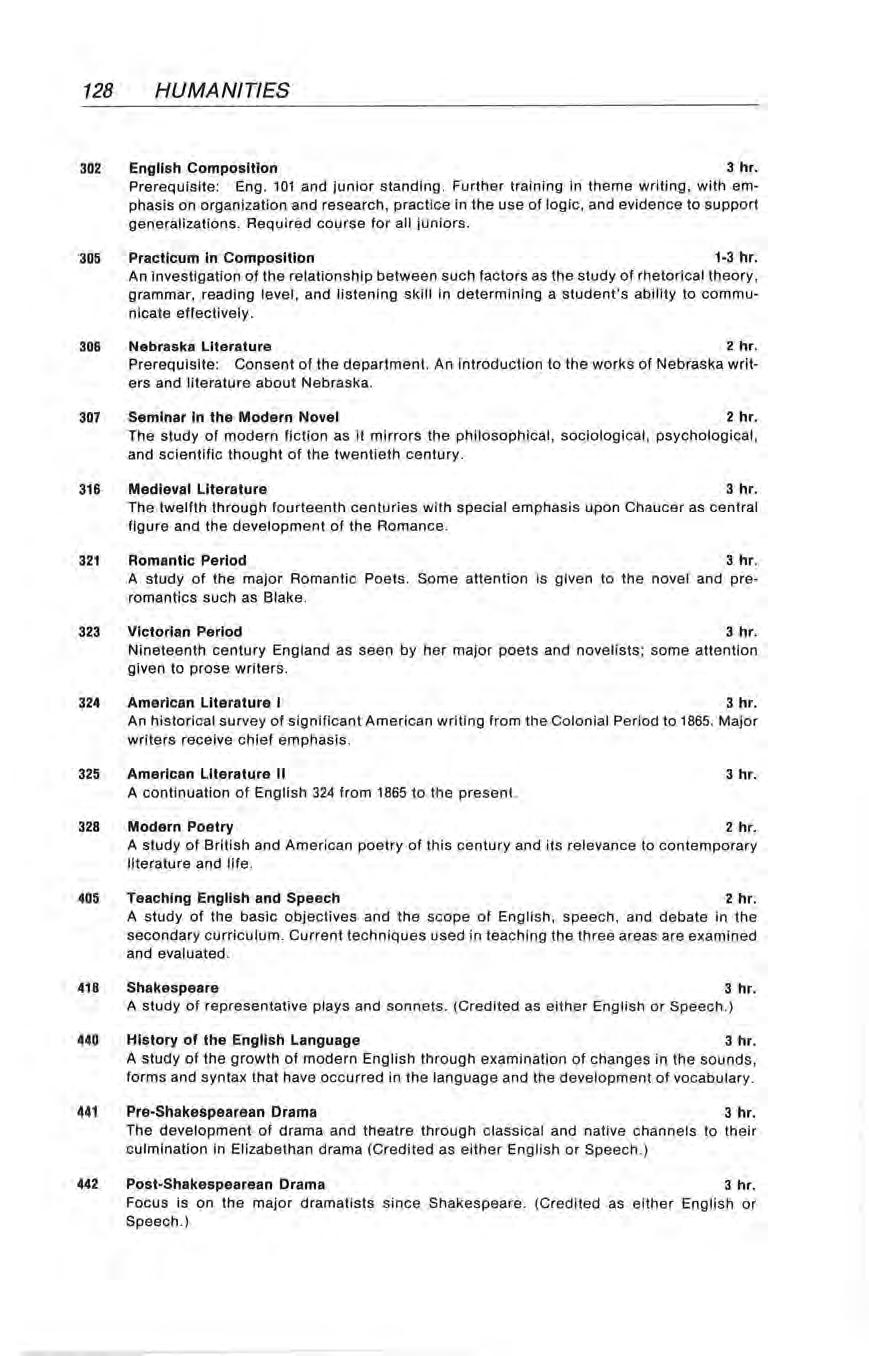
418 Shakespeare
3 hr.
A study of representative plays and sonnets. (Credited as either English or Spee c h .)
440 History of the English Language
3 hr
A study of the growth of modern English through examination of changes in the sounds , forms and syntax that have occurred in the languag e and the development of vocabulary.
441 Pre-Shakespearean Drama
442
3 hr.
The development of drama and theatre through classical and native channels to their culmination in Elizabethan drama (Credited as either English or Speech.)
Post-Shakespearean Drama
3 hr.
Focus is on the major dramatists since Shakespeare (Credited as either English or Speech )
450 Directed Studies In English
1-3 hr. Open to juniors and seniors. Des ig ned to enable the student to independently investigate a particular area of interest, especially when the area is not covered by one of the formal courses
100 Introduction to Mass Communications
2- 3 hr. The nature, function, and responsibilities of communications agencies, in c luding newspapers, radio and television , film, and advertising; the services that the mass media perform for society and the role of the media in censorship persuasion, and propaganda
226 Photography I
2-3 hr.
Two hours classwork and two hours of laboratory per week Theory and practice in the basic fundamentals of photography including composition , exposure, lighting , developing , contract printing , and e nlarging The third hour cred it ga i n ed by add itional assig nments. Each student must have a camera
234 Beginning Journalism
3 hr.
Prerequisite: Ability to type The fundamental principles of gath er ing and writing news; practice in reporting ca mpus news; work on The Pedagogian, College newspaper
235 Newspaper Editing
2 hr.
Prerequisite: Journ 234. Credit not to exceed a total of four hours. An intensive course in journalistic desk work that includ es copy preparation, headlin e writing , page layout; extensive work on The Pedagogian desk
237 Graphic Arts
260
300
3 hr.
Six hours laboratory Study and practice in basic processes of printing and allied industries, including work in letterpress, silkscreen printing , bookbinding, rubberstamp making, and goldleaf stamping
Broadcast Journalism
3 hr
An introduction to radio and television as communication media. Introduction to modern facilities and practices Laboratory projects related to both media.
Communications Law
3 hr.
The laws regarding media responsibility, placing the l e gal pr ob l ems of media work in a practical context; libel, contempt, constitutional guarantees, access to public records ; the invasion of privacy , criticism, and copyright
325 Photography II
2-3 hr.
Lens, testing, infra - red photography , high speed photography, portraiture, use of negative land positive color films , color printing, and oil coloring of prints .
329 Advertising
2 hr.
A study of advertisements and media from three viewpoints ; management-marketing , communications-creativity, and consumer-citizen.
400 Internship in Journalism
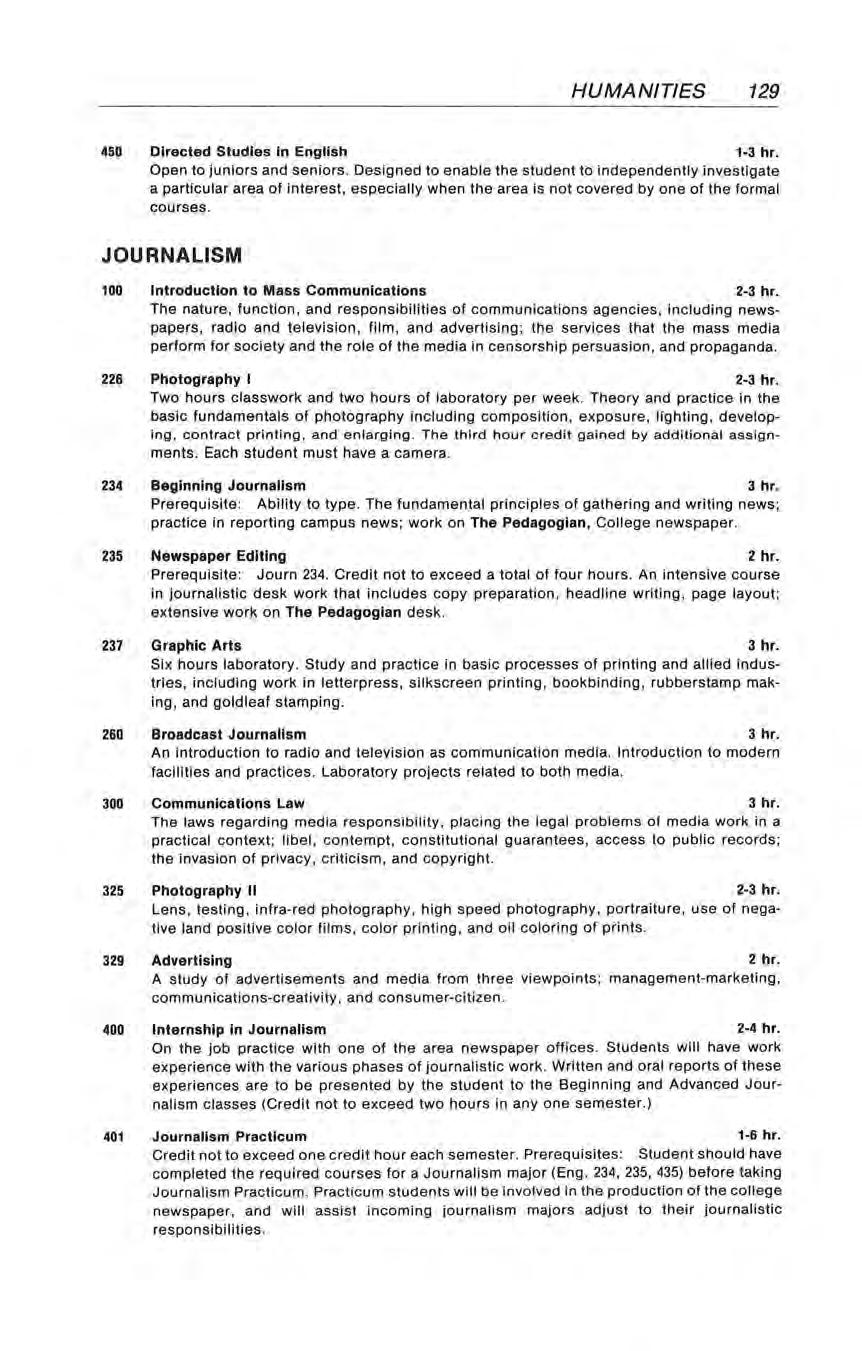
2-4 hr.
On the job practice with one of the a rea newspaper offices. Students will have work experience with the various phases of journalistic work Written and oral reports of these experiences are to be presented by the student to the Beginning and Advanced Journalism classes (Credit not to exceed two hours in any one semester.)
401 Journalism Practicum
1-6 hr
Cred i t not to exceed one credit hour each semester. Prerequisites: Student should have completed the required courses for a Journalism major (Eng. 234 , 235 , 435) before taking Journalism Practicum Practicum students will b e involv ed in the production of the college newspaper, and will assist incoming journalism majors adjust to their journalistic responsibilities.
435 Advanced Journalism
3 hr.
Prerequisite : Journ 234. Advanced principles of reporting, with emphasis on feature writing and depth reporting; continued work on College newspaper , The Pedagogian
100 Introduction to Media and Library
1 hr. This course shall furnish an introduction to the utilization of the library equipment and services
101 Principles of Physical Geography
3 hr.
An introductory study of the relationships of man and environment, with emphasis placed upon climatic regions of the world Two hours lecture , two-hour laboratory
103 Cultural Geography
3 hr.
The study of the cultural elements of the landscape , with emphasis on the origin of man, migration, settlement , and the economics of man
300 Geography of Asia
3hr.
Prerequisites: Geog. 101. A regional study of the major countries of Asia , with emphasis on relief, climate, resources , government, and industrial development.
305 Economic Geography
3 hr.
Prerequisites : Geog 101 and 103. An analysis of world land resources, agricultural products, forest and marine resources, basic mining industrie s, manufacturing, trade patterns, and transportation routes.
310 Geography of Africa
3 hr.
Prerequisites: Geog 101 A geographical analysis of the continent. Emphasis is placed upon recent spirit of nationalism and the economic and physical base selected nations
311 Urban Geography
3 hr. Study of the origin, distribution, internal structure and functions of urban developments , with emphasis on location features of economics and cultural phenomena
312 Geography of Anglo-American
3 hr.
Prerequisite: Geog 101 or senior standing. A study of the United States and Canada by natural regions. In each case an evaluation of the physical and eco nomic base will be made in the light of present economic development.
313 Geography of South America
326
3 hr.
Prerequisite : Geog 101 The geographic regions of South America analyzed in their natural, political and economic settings. The economic relations between South America and the United States.
Conservation of Natural Resources
3 hr.
An evaluation of soil , water, mineral, forestry , fish , air, and recreation resources in order to develop an appreciation of their importance and the seriousness of the problem.
404 History and Philosophy of Geography
2 hr .
Prerequisites: Geog. 101 and 103 A study of the basic philosophies of geography including the study of the history of geographic thought from ancient to modern times Independent study through readings and research paper
470 Independent Study Geography/Geology
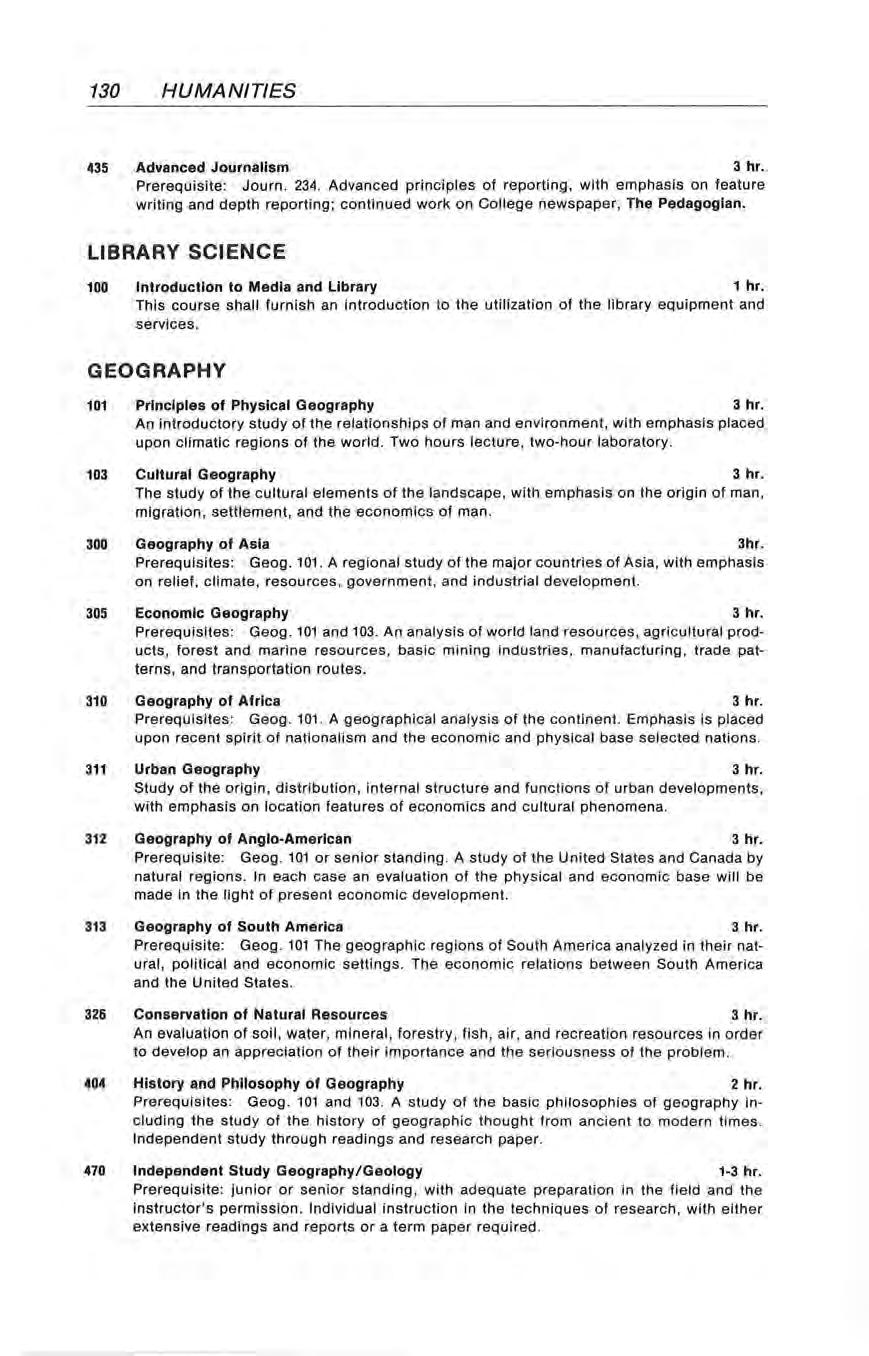
1-3 hr.
Prerequisite: junior or senior standing, with adequate preparation in the field and the instructor's permission. Individual instruction in the techniques of research , with either extensive readings and reports or a term paper required
494 Current Topics In Geography
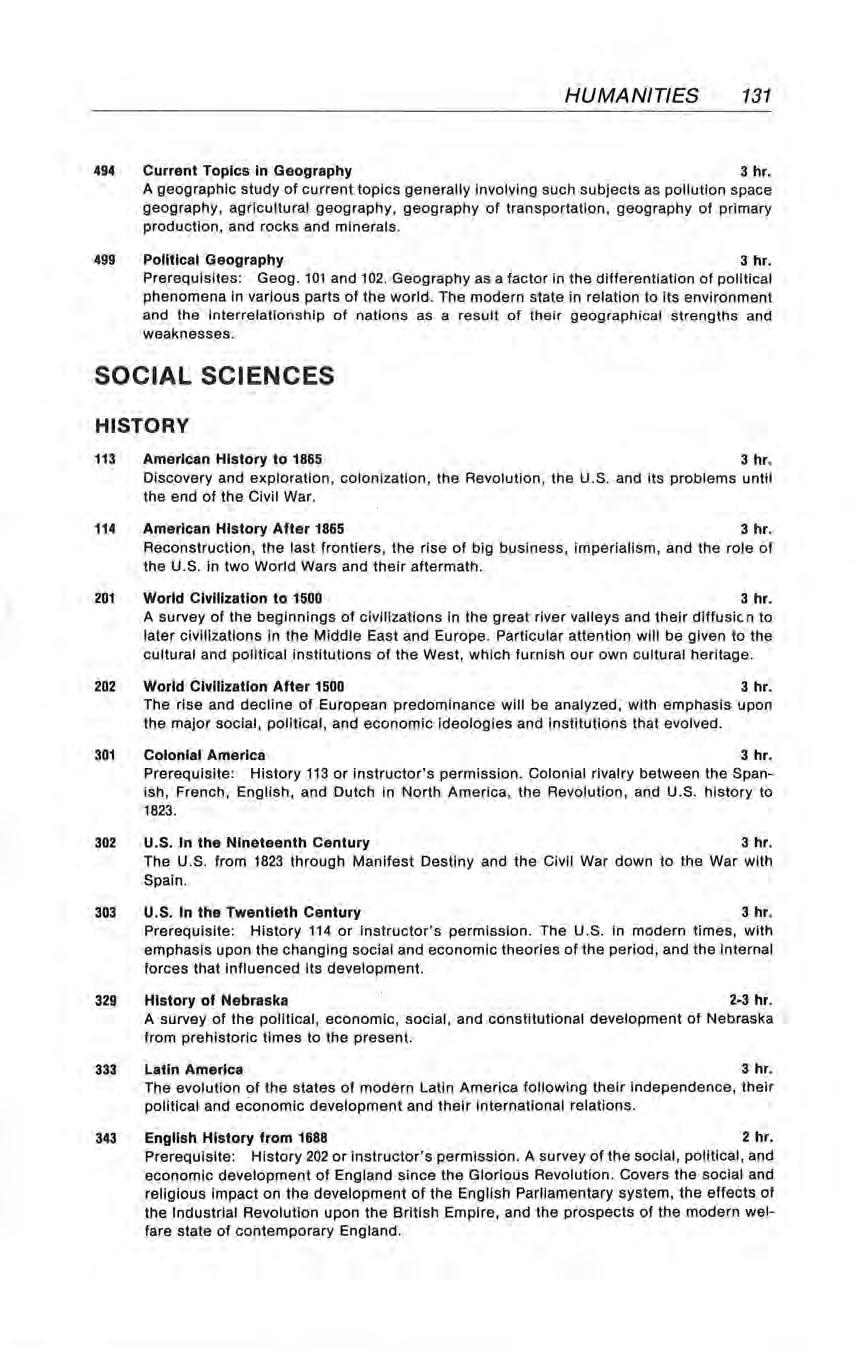
3 hr.
A geographic study of current topics generally involving such subjects as pollution space geography, agricultural geography, geography of transportation, geography of primary production , and rocks and minerals
499 Political Geography
3 hr.
Prerequisites : Geog. 101 and 102 Geography as a factor in the differentiation of political phenomena in various parts of the world. The modern state in relation to its environment and th e interrelationship of nations as a result of the i r geographical strengths and weaknesses.
HISTORY
113 American History to 1865
3 hr. Discovery and exploration, colonization, the Revolution , the U S. and its problems until the end of the Civil War
114 American History After 1865
201 202
301
3 hr.
Reconstruction, the last frontiers , the rise of big business , imperialism, and the role of the U.S in two World Wars and their aftermath
World Civilization to 1500
3 hr.
A survey of the beginnings of civilizations in the great river valleys and their diffusic n to later civilizations in the Middle East ~nd Europe Particular attention will be given to the cultural and political institutions of the West , which furnish our own cultural heritage
World·Civilization After 1500
3 hr. The rise and decline of European predominance will be analyzed, with emphasis upon the major social, political , and economic ideologies and institutions that evolved
Colonial America
3 hr.
Prerequisite : History 113 or instructor's permission. Colonial rivalry between the Spanish, French , English, and Dutch in North America , the Revolution, and U S history to 1823.
302 U. S. In the Nineteenth Century
3 hr. The U.S. from 1823 through Manifest Destiny and the Civil War down to the War with Spain
303 U.S. In the Twentieth Century
3 hr.
Prerequisite: History 114 or instructor's permission The U S. in modern times , with emphasis upon the changing social and economic theories of the period, and the internal forces that influenced its development.
329 History of Nebraska
333
2-3 hr.
A survey of the political, economic, social , and constitutional development of Nebraska from prehistoric times to the present.
Latin America
3 hr. The evolution of the states of modern Latin America following their independence, their political and economic development and their international relations
343 English History from 1688
2 hr.
Prerequisite: History 202 or instructor's permission. A survey of the social, political , and economic development of England since the Glorious Revolution. Covers the social and religious impact on the development of the English Parliamentary system, the effects of the Industrial Revolution upon the British Empire, and the prospects of the modern welfare state of contemporary England
345 Modern Europe
Prerequisite: History 202 or instructor's permission A comparative historical analysis of the ongoing process of modernization in Europe Emphasis on movements and institutions such as Liberalism, Co nservatism , Romanti c ism, So c ialism , Imperialism , and Totalitarianism from 1815 to the present.
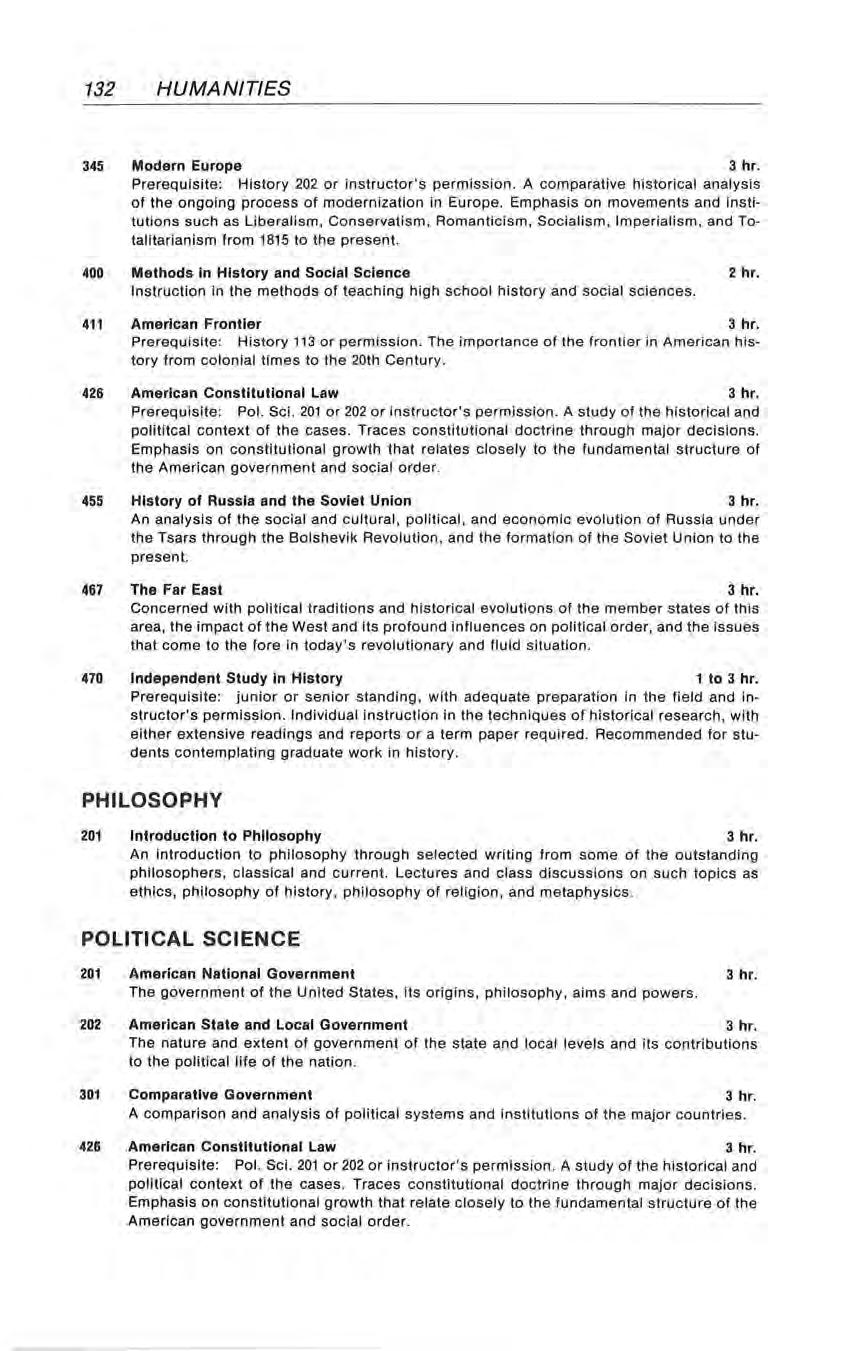
Methods in History and Social Science
2 hr. Instruction in the methods of teaching high school history and social sciences.
American Frontier
3 hr.
Prerequisite: History 113 or permission The importance of the frontier in American history from colonial times to the 20th Century.
American Constitutional Law
3 hr.
3 hr. 400 411 426
Prerequisite: Pol. Sci. 201 or 202 or instru c tor ' s p e rmission A study of the historical and polititcal conte x t of the cases Traces constitutional doctrine through major decisions. Emphasis on constitutional growth that relates closely to the fundamental structure of the American government and social order
455 History of Russia and the Soviet Union
467
3 hr.
An analysis of the social and cultural , political , and economic evolution of Russia under the Tsars through the Bolshevik Revolution, and the formation of the Soviet Union to the present.
The Far East
3 hr
Concerned with political traditions and historical evolutions of the member states of this area , the impact of the West and its profound influences on political order , and the issues that come to the fore in today's revolutionary and fluid situation
470 Independent Study In History
1 to 3 hr.
Prerequisite : junior or senior standing , with adequate preparation in the field and instructor's permission Individual instruction in the techniques of historical research, with either extensive readings and reports or a term paper required Recommended for students contemplating graduate work in history.
201 Introduction to Philosophy
3 hr.
An introduction to philosophy through selected writing from some of the outstanding philosophers , classical and current. Lectures and class discussions on such topics as ethics , philosophy of history , philosophy of religion , and m e taphysi c s.
201
202
American National Government
The government of the United States , its origins, philosophy , aims and powers.
American State and Local Government
3 hr.
3 hr.
The nature and extent of government of the state and local levels and its contributions to the political life of the nation
301 Comparative Government
426
3 hr
A comparison and analysis of political systems and institutions of the major countries
American Constitutional Law
3 hr.
Prerequisite : Pol. Sci. 201 or 202 or instructor's permission. A study of the historical and political context of the cases Traces constitutional doctrin e through major decisions
Emphasis on constitutional growth that relate closely to the fundamental structure of the American government and social order.
467
The Far East
3 hr.
Concerned with political traditions and historical evo lution s of the member states of this area , the impact of the West and its profound influences on political order, and the issues that come to the fore in today's revolutionary and fluid situation.
470 Research Topics in Political Science
1 - 3 hr .
Prerequisites: junior or senior standing , with adequate preparation in political science and history, and instructor ' s permission, individual research into a chosen aspect of government or political theory, with either extensive readings and reports or a term paper required. On demand.
280 310
375
Introduction to Social Work
3 hr. An introduction to the profession of social work with emphasis on the history, philosophy, methods, a nd processes of social work
Social Services
3 hr .
Prerequisite: Soc Wk. 280. The study of the public and private social services agencies; e mphasis on specialized social welfare agencies and services.
Casework
2 hr.
Prerequisite : Soc Wk. 280 The art, theory, and practice of the dynamics of casework with emphas is on current social work techniques used in meeting group and individual needs
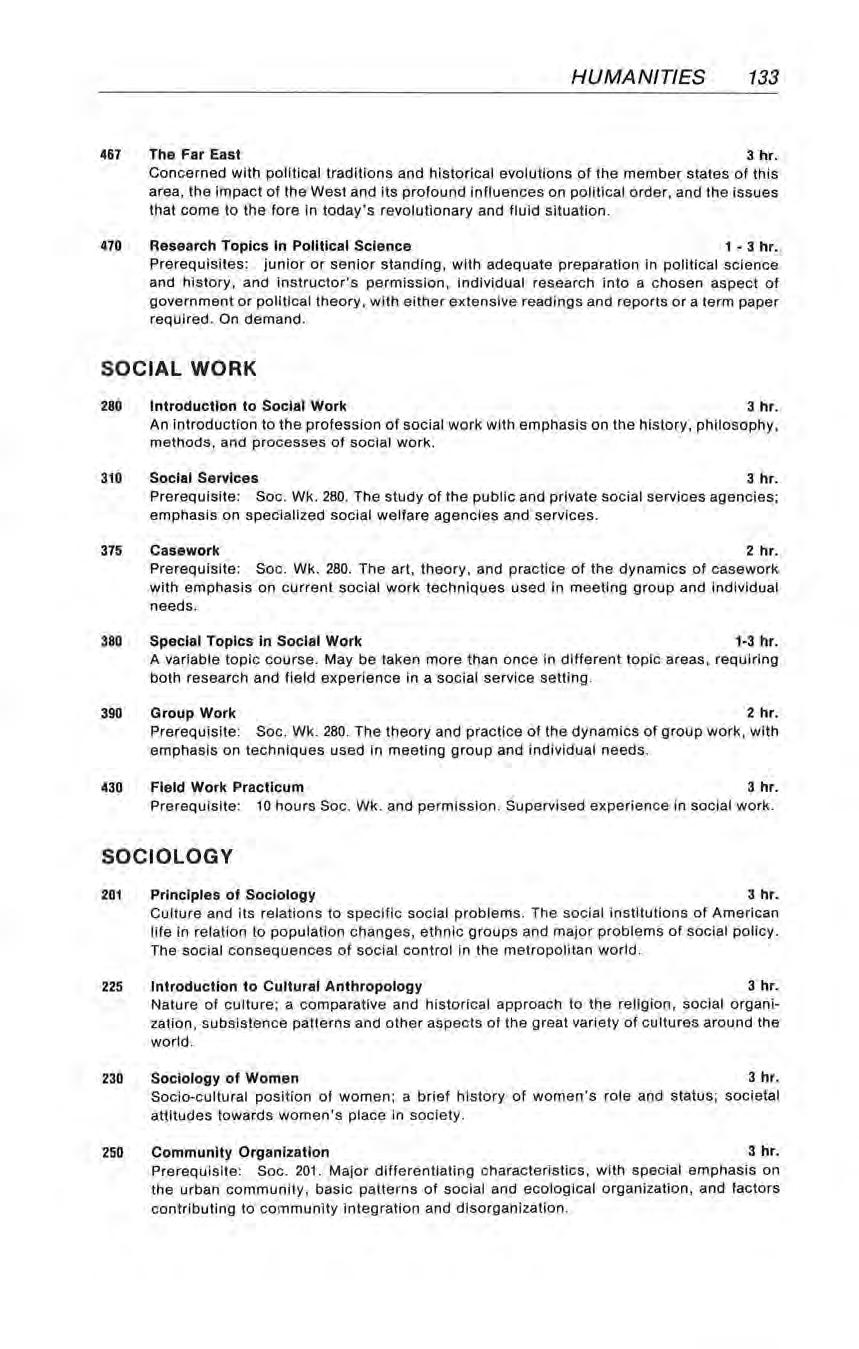
380 Special Topics in Social Work
1-3 hr. A variabl e topic co urs e. May be taken more than once in different topic areas , r equiring both research and field experience in a social service setting.
390 Group Work
430
2 hr
Prerequisite: Soc. Wk. 280. The theory and practice of the dynamics of group work , with emphasis on techniques used in meeting group and individual needs. Field Work Practicum
3 hr.
Prerequisite : 10 hours Soc Wk and permission Supervised experience in social work.
201 Principles of Sociology
3 hr. Culture and its relations to specific social problems. The socia l institutions of American life in relation to population changes, ethnic groups and major problems of social policy. The social consequences of social control in the metropolitan world
225 Introduction to Cultural Anthropology
3 hr. Nature of culture; a comparative and historical approach to the religion , social organization, s ub sistence patterns and other aspects of the great variety of cu ltures around the world.
230 Sociology of Women
3 hr. Socio-cultural position of women; a brief history of women's role and status; societal attitudes towards women's place in society
250 Community Organization
3 hr.
Prerequisite : Soc 201. Major differentiating characteristics, with specia l emphasis on the urban community, bas i c patterns of socia l and ecologica l organization, and factors cont ributing to community integration and disorganization
260 Rural Sociology
3 hr.
Prerequisite : Soc 201. An examination of rural societies , rural background and characteristics; an analysis of rural groups, institutions and · changes and problems of rural urban relations.
300 Contemporary Social Problems
3 hr.
An introduction to the causes , extent, treatment , and prevention of selected social problems with particular emphasis on problems of conflict and inequality and problems of human progress.
320 Sociology of Education
3 hr.
Prerequisite : Soc 201. An application of sociological principles to the education process. The relationship b e tw ee n s tratificat io n and education, the importan ce of interaction patterns on the educational process, the effect of other institutions on education, and the role of education as a dynamic institution i n a changing society.
340
The Family
3 hr .
Prerequisite: Soc 201. The role of the family in contemporary society, factors influencing trends in family structure, functions , roles, stability, and their implications for both the community and individuals at varying s tages of the family life cycle.
360 Criminology
3 hr.
Nature and causes of crime as a social phenomenon. Th e processes of making laws , breaking laws , and reaction toward the breaking of laws Cultural sig nifican ce of th e processes of determining the reactions of the community to offenders of the law
370 Ethnic-Group Relations
3 hr.
Prerequisite : Soc 201. The nature of minority groups and their distribution in American society; and an examination of the melting pot concept vs. the pluralistic society.
420 History and Introduction to Modern Sociological Theory
3 hr.
Prerequisite : Soc. 201 and permission An overview of the earlier sociological theorists and their contributions to current sociological theories
470 Independent Study In Sociology
1-3 hr.
Prerequisite : Soc 201 and permission Topics to be chose n and investigated in consultation with individual instructor
121 Introduction to Psychology
3 hr
The course is a general introduction to contemporary psychology focusing on basic concepts, principles, and terminology ; trend s in psychological researc h and the application of this knowledge.
205 Educational Psychology
3 hr.
Prerequisite: Psych 121 Th e course will focus upon the psychologi ca l prin c iples underlying learning and effective teaching; the affect of social and personality factors on the learning process , measurement of le a rn i ng, variables and their interpretation , and application of learning theory to the teaching situation.
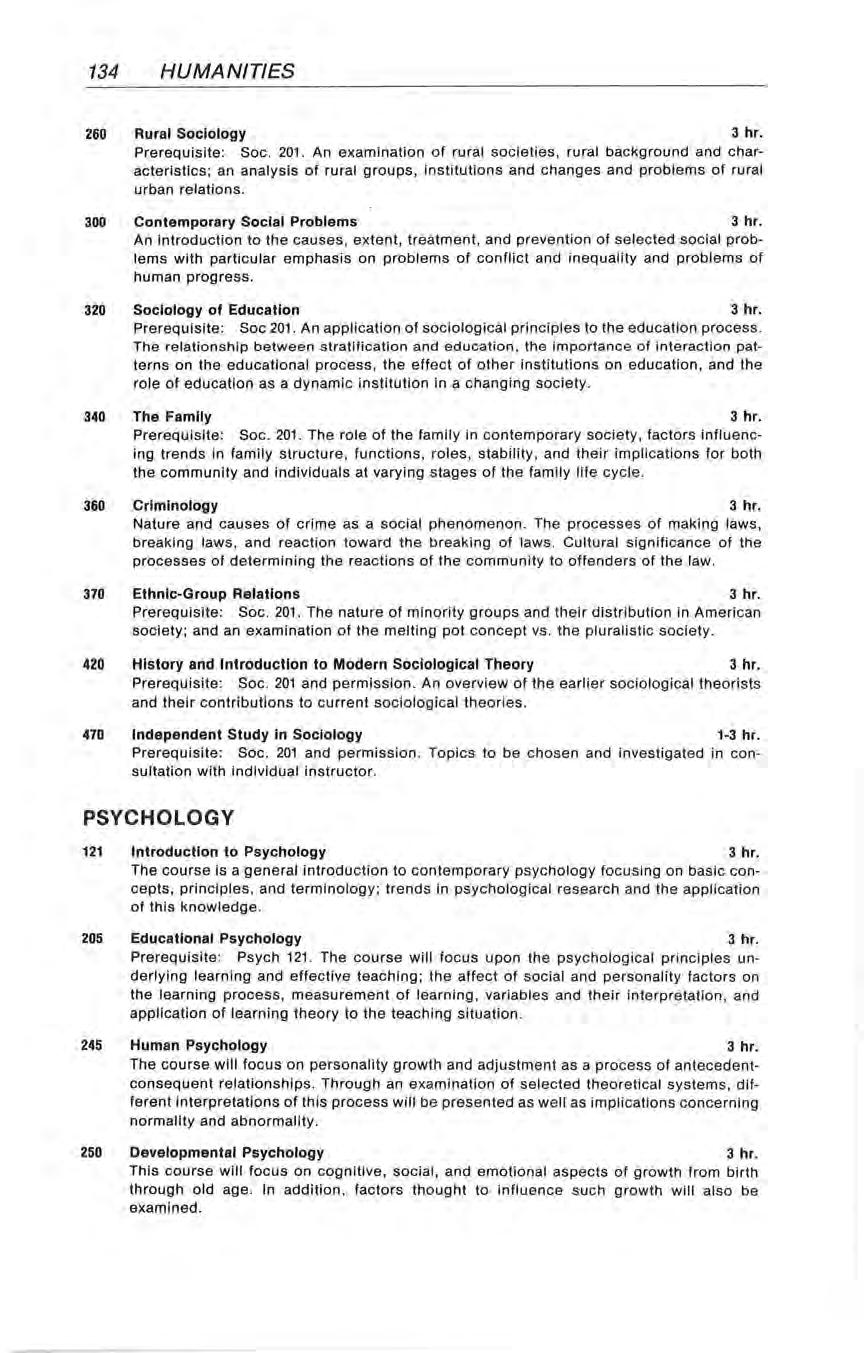
245 Human Psychology
3 hr.
The course will focus on personality growth and adjustment as a pro cess of antecedentconsequent relationships. Through an examination of selected theoretical systems, different interpretations of this process will b e pres e nted as well as implications concerning normality and abnormality.
250 Developmental Psychology
3 hr.
This course will focus on cognitive, social, and emotional aspects of growth from birth through old age In addition , factors thought to influen ce such growth will also be examined.
304 Experimental Psychology
3 hr.
Prerequisite: Psych 121 and Math 340. The course is designed to assist students in the comprehension and use of e x perimental methods, basic statistical analysis , and e x perimental literature . Research exercises are provided to illustrate course content.
305 Social Psychology
3 hr.
Prerequisite: Psych 121 or Soc. 201. The course will focus on effects of culture , society, social institutions, and social learning on social attitudes and the behavior of individuals within groups
320 Psychology of Learning
431
3 hr.
Prerequisite: Psych 121. The course will provide students with a broad , eclectic coverage of the expanding field of learning and memory by addressing the wide range of issues and problems within the fi ~ ld from stimulus - response to cognitive psychology.
Psychological Tests and Measurements
3 hr.
Prerequisites : Psych 121 and Math 340 or permission of In structor. The cour se will fo c us on issues and problems surrounding psychological testing Topics to be discussed include reliability, validity , construction , administration , norms, and interpretation ; as well as a survey of current psychological tests.
437 Techniques of Counseling
440
3 hr.
Prerequisite : Psych 121. The content , pro c ess , and practice of various counseling techniques will be examined in terms of their applicability in education, psychology , and social work. Practical experience in the use of these techniques will also be provided
3
Prerequisite: Psych 121 The course will focus on basic principles of behavior modification as well as survey some of the uses/practical applications of this general approach to behavior change
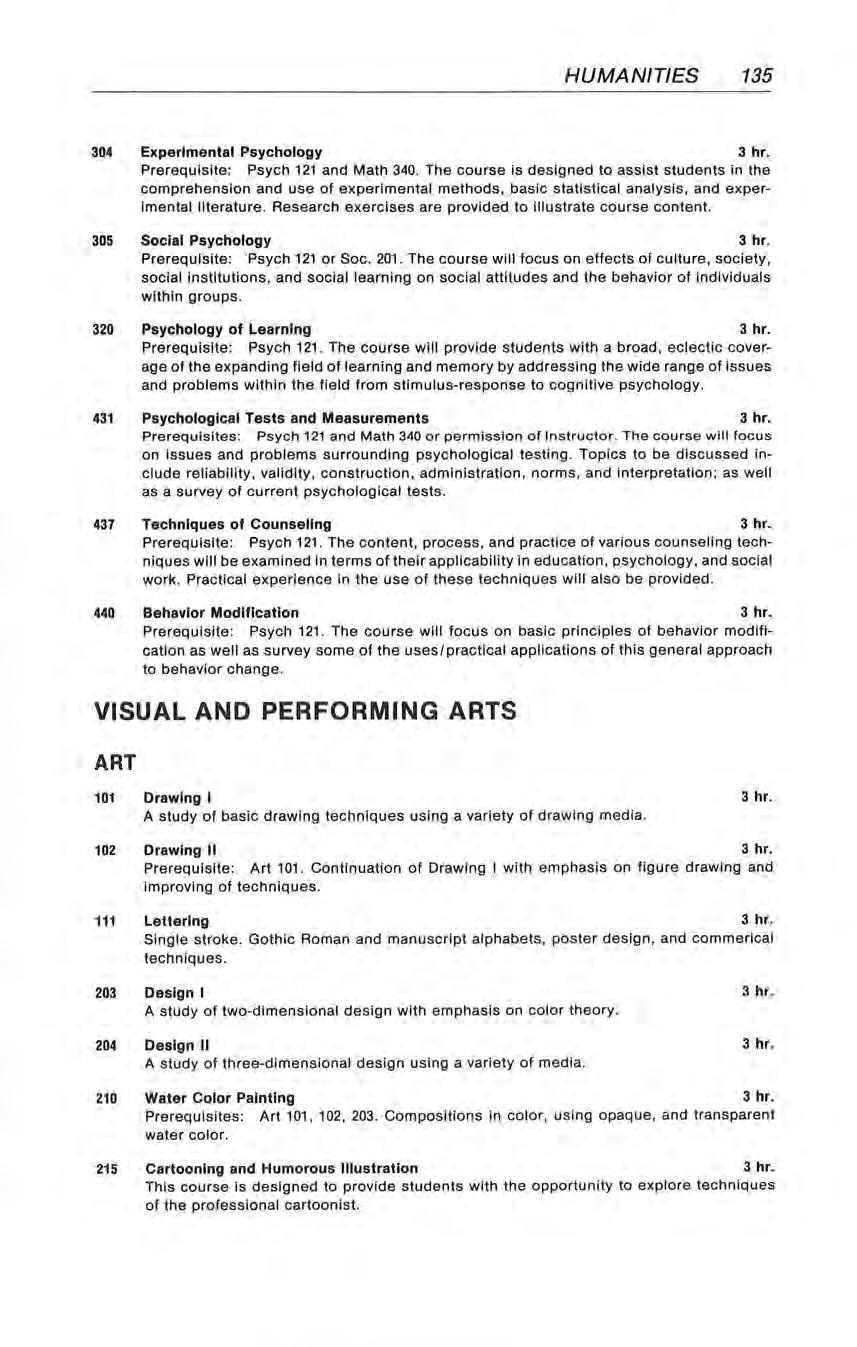
221 Printing Processes
3 hr.
History of the graphic arts of block printing, etching, litography, and silk screen printing. Reading on the techniques of each process, followed by the making of prints in three or more of the methods.
300 Ceramics
3 hr.
Experiences in hand built and thrown projects. Includes a basic study of glaze preparation and clay analysis.
305 Methods and Supervision
2 hr.
Prerequisites : Art 101, 103, and 203 or 204. Study of relation of art educat ion to other school subjects; and contemporary art education teaching techniques, lesson plans, teaching experiences, and the ordering of materials. Emphasis is also placed upon the use of materials in the school a rt program
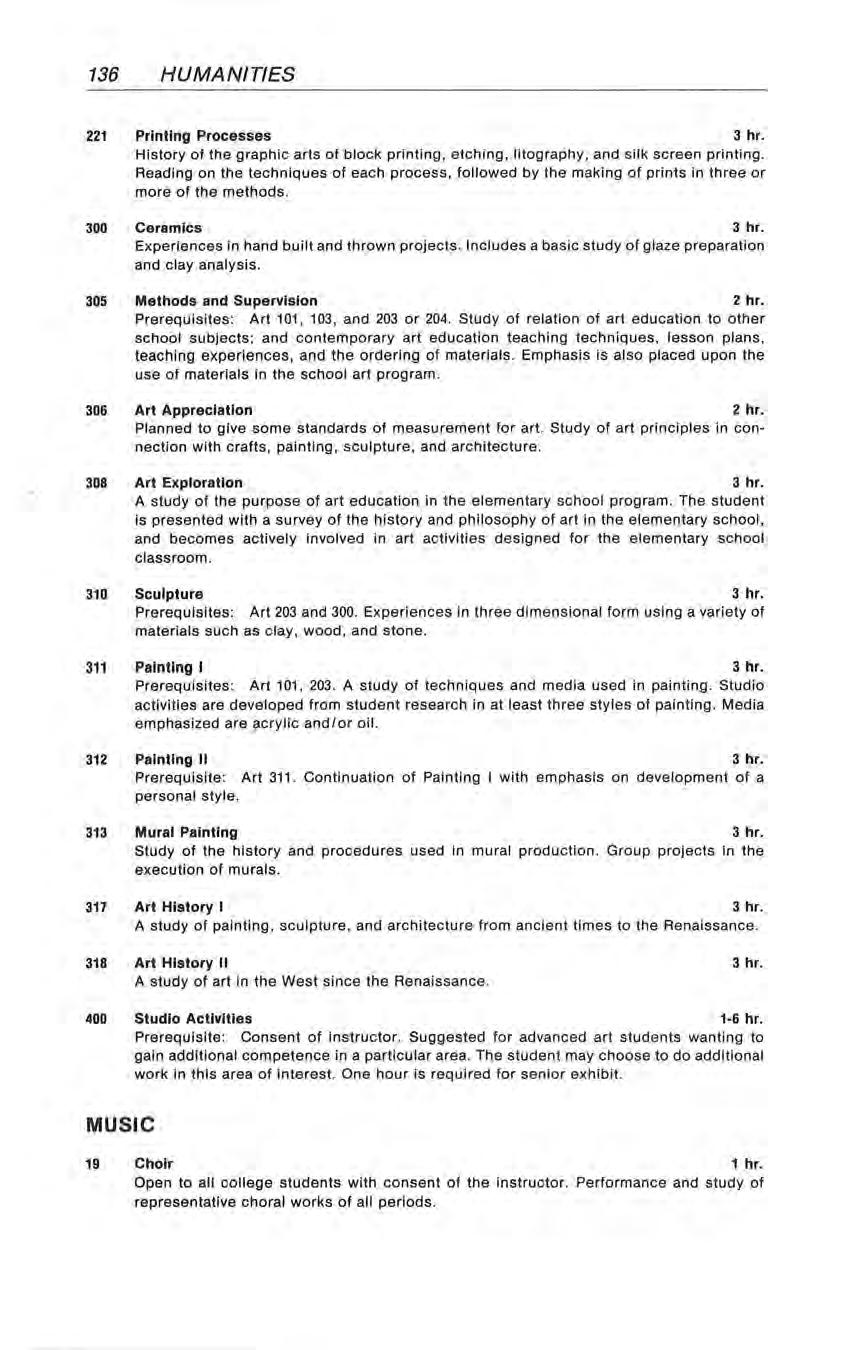
306 Art Appreciation
2 hr.
Planned to give some standards of measur ement for art. Study of art principles in connection with crafts, painting, sculpture, and arch ite ct ur e.
308 Art Exploration
3 hr.
A study of the purpose of art education in the elementary school program. The student is presented with a survey of the history and philosophy of art in the e l e mentary school, and becomes actively involved in art activities designed for the e l ementary school classroom
310 Sculpture
311
3 hr.
Prerequisites: Art 203 and 300. Experiences in three dimensional form using a variety of materials such as clay , wood, and stone.
Painting I
3 hr
Prerequisites: Art 101, 203. A study of techniques and media used in painting. Studio activities are developed from student research in at least three styles of painting. Media emphasized are acrylic and/or oil.
312 Painting II
3 hr.
Prerequisite : Art 311. Continuation of Painting I with emphasis on development of a personal style.
313 Mural Painting
3 hr.
Study of the history and procedures used in mural production. Group projects in the execution of murals.
317 Art History I
318
400
3 hr.
A study of painting, sculpture, and architecture from ancient times to the Renaissance.
Art History II
A study of art in the West since the Renaissance.
Studio Activities
3 hr.
1-6 hr.
Prerequisite: Consent of instructor. Suggested for advanced art students wanting to gain additional competence in a particular area. The student may choose to do additiona l work in this area of interest . One hour is required for senior exhibit.
19 Choir
1 hr.
Open to all college students with consent of the instructor. Performance and study of representative choral works of all periods.
21A Band 1 hr.
Open to all college students with consent of the director, this organization is primarily a marching band. It functions at pep rallies, parades and football games during the fall semester. Four days attendance.
Open to all college students with consent of the director, this organization is primarily a concert band During the spring semester concerts are presented both on and off campus. Three days attendance.
Choral Ensemble 1 hr.
21B Band 1 hr. 28
A select membership for the study and performance of choral work for small groups.
29 Instrumental Ensembles 1 hr. 29B Brass Choir, 29W Woodwind Choir, 29S Stage Band. Open to all college students with consent of the director, this organization studies music in all popular idioms and performs concerts on and off campus.
Fundamentals and Elementary Music Materials
3 hr.
The rudiments of music, including letter and syllable names of notes, time values of notes and rest, time, and key signatures, chromatic, intervals, chords, keyboard experience, and the writing of original melodies. Study of children's musical literature and of their tonal and rhythmic problems
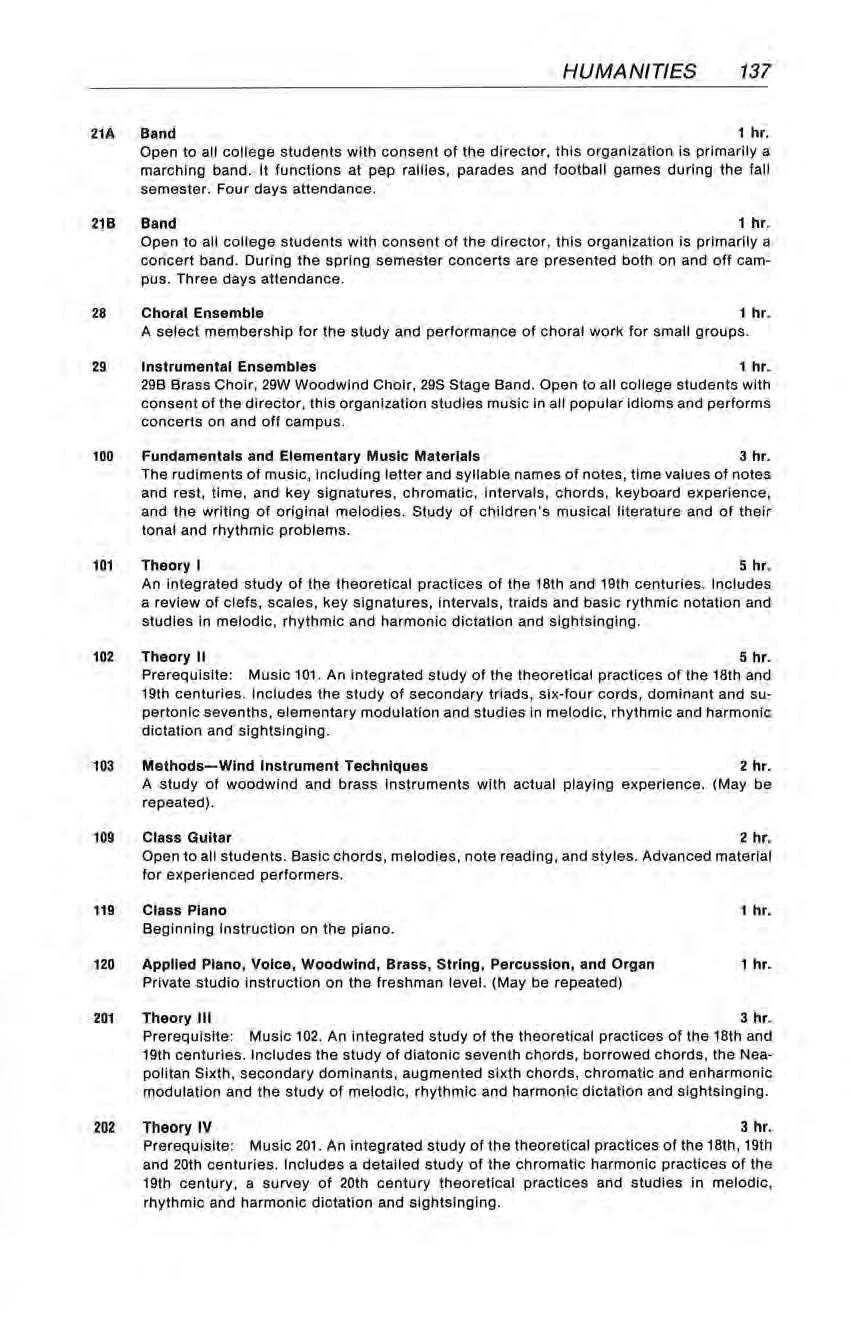
101 Theory I 5 hr.
An integrated study of the theoretical practices of the 18th and 19th centuries Includes a review of clefs, scales, key signatures, intervals, traids and basic rythmic notation and studies in melodic, rhythmic and harmonic dictation and sightsinging. 102 Theory II
5 hr.
Prerequisite: Music 101. An integrated study of the theoretical practices of the 18th and 19th centuries Includes the study of secondary triads, six-four cords, dominant and supertonic sevenths, elementary modulation and studies in melodic, rhythmic and harmonic dictation and sightsinging.
2 hr.
A study of woodwind and brass instruments with actual playing experience. (May be repeated).
Class Guitar
2 hr. Open to all students. Basic chords, melodies, note reading, and styles. Advanced material for experienced performers.
Class Piano
Beginning instruction on the piano.
Applied Piano, Voice, Woodwind, Brass, String, Percussion, and Organ Private studio instruction on the freshman level. (May be repeated)
1 hr.
hr.
Prerequisite: Music 102. An integrated study of the theoretical practices of the 18th and 19th centuries. Includes the study of diatonic seventh chords, borrowed chords, the Neapolitan Sixth , secondary dominants, augmented sixth chords, chromatic and enharmonic modulation and the study of melodic , rhythmic and harmonic dictation and sightsinging.
Theory IV
3 hr.
3 hr. 202
Prerequisite: Music 201. An integrated study of the theoretical practices of the 18th, 19th and 20th centuries. Includes a detailed study of the chromatic harmonic practices of the 19th century, a survey of 20th century theoretical practices and studies in melodic, rhythmic and harmonic dictation and sightsinging
study of woodwind and brass instrument with actual playing experience. (May be repeated).
of modern teaching techniques for children ' s music literature
of vocal materials and vocal conducting as presented in the secondary schools.
Strings Basic study of the violin, viola, violoncello, and string bass. Alternate years.
study of woodwind and brass instruments with actual playing experience. (May be repeated)
study of percussion instruments with actual playing experience.
hr
Theory 101, 102. Analytical study of the different forms and styles in music and their application, including two and three part eighteenth century style, descant and invention 308
Vocal or Instrumental Pedagogy
hr. Practical experience in teaching applied music to the individual for piano, voice, or instruments. (May be repeated.) 310 Independent Study in Music
hr. This course is presented to permit students to do independent projects in Music beyond the described areas. Permission of the instructor is required.
Various forms and styles of music, ranging from folk songs to opera, oratorio and symphony , analyzed and discussed through the use of records
Voice, Woodwind, Brass, String, Percussion, and Organ Private studio instruction on the junior level. (May be repeated)
hr. A study of woodwind and brass instruments with actual playing experience. (May be repeated.)
Knowledge of baton technique, reading and interpretation of a musical score and the presentation of techniques in rehearing instrumental organizations.
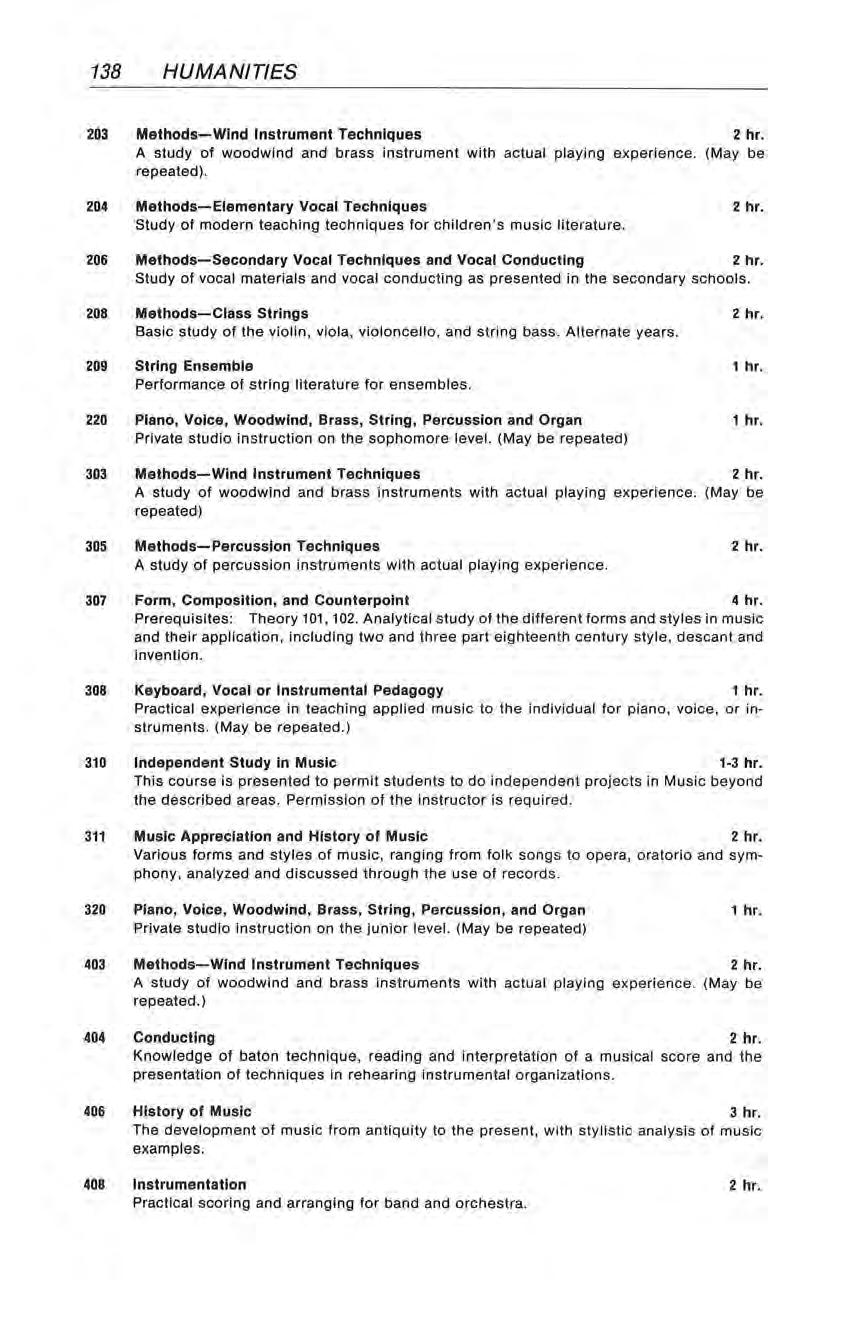
The development of music from antiquity to the present, with stylistic analysis of music examples.
Practical scoring and arranging for band and orchestra
Senior Recital
A public recital is required for all students major i ng in music
Plano, Voice, Woodwind, Brass, String , Percussion, and Organ Private studio instruction on the senior level. (May be repeated)
Marching Band Techniques
hr. Study of techniques and problems of planning marching band shows and other public appearances.
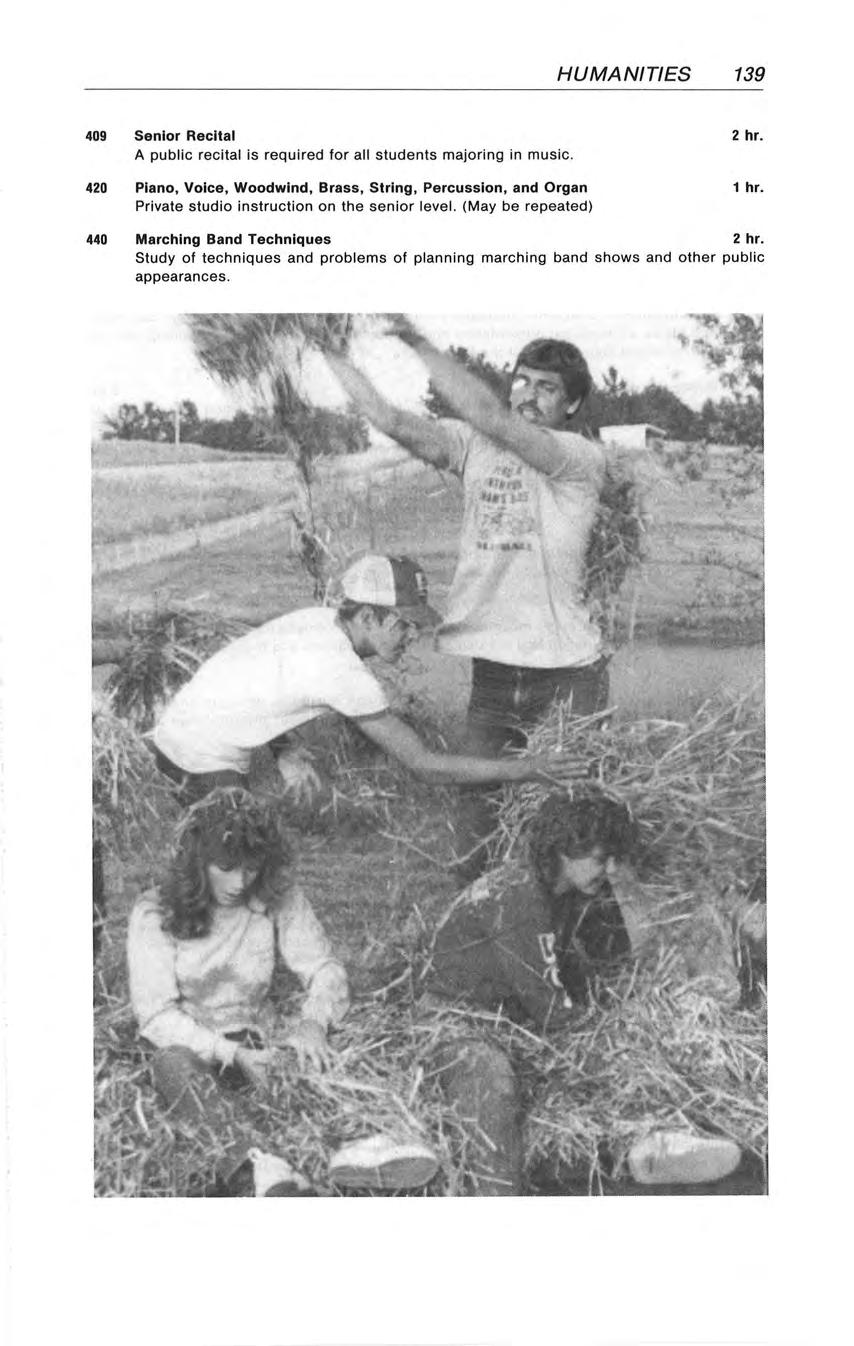
152 Fundamentals of Speech
232 234
3 hr. Each semester and summer
The principles of speech. Development of bodily freedom, distinct utterance, and improved oral communication Includes fundamental process of speech correction and development, with emphasis on the development of excellent speech habits and the diagnosis and treatment of elementary speech defects
Introduction to the Theatre
2 hr.
An introduction to all forms of drama from ritual to contemporary, and the various forms and styles of theatrical presentation and production as a means of developing the student's crit ical appreciation of the theatre arts.
Public Speaking
3 hr.
Training is given in using effective methods of adapting composition and delivery to various types of audiences in person and through the electronic media A study is made of the forms of address , speech organization, composition, delivery , and Parliamentary rules Practice is required in various public speaking situations inc lu ding: public meetings and group discussions, radio and television broadcasting , interviewing and role-playing and debate techniques.
235 Stagecrafts
3 hrs.
An introduction to the study and practic e of the basic aspects of techni ca l theatre production including: sets, lighting, costuming , sound , properties, and make-up.
256 Acting I
257
3 hr.
A concentration on stage movement , pantomime with emphasis on the development of the creative imagination and the use of stage conventions and techniques.
Acting II
3 hr
Prerequisite : Speh 256. Intensive training in stage business, dialogue and c hara c terization, analyzation of character and the principles of dramatic interpretation as used in historic periods and styles of acting.
300 Summer Theatre Workshop
3 hrs.
Practical training in all aspects of theatre production; acting set design, lighting , costuming, make-up , improvisation , music , and dancing No pr ereq uisites Workshop runs for six weeks .
327 Light and Sound Design for Stage and Television
3 hr
Prerequisite: Speh 235. Theory and practice of stage and television light ing and sound systems. Study of instruments and control systems employed in li ght and sound in various media situations. Study of color in light , its effect upon costumes , scenery and makeup Accoustical problems analyzed Planning of light and sou nd plots.
353 Speech Correction and Development
3 hr.
A survey co urse identifying the unique educational problem s of children with speech deficiencies Emphasis is on identification and ancillary re m e diation.
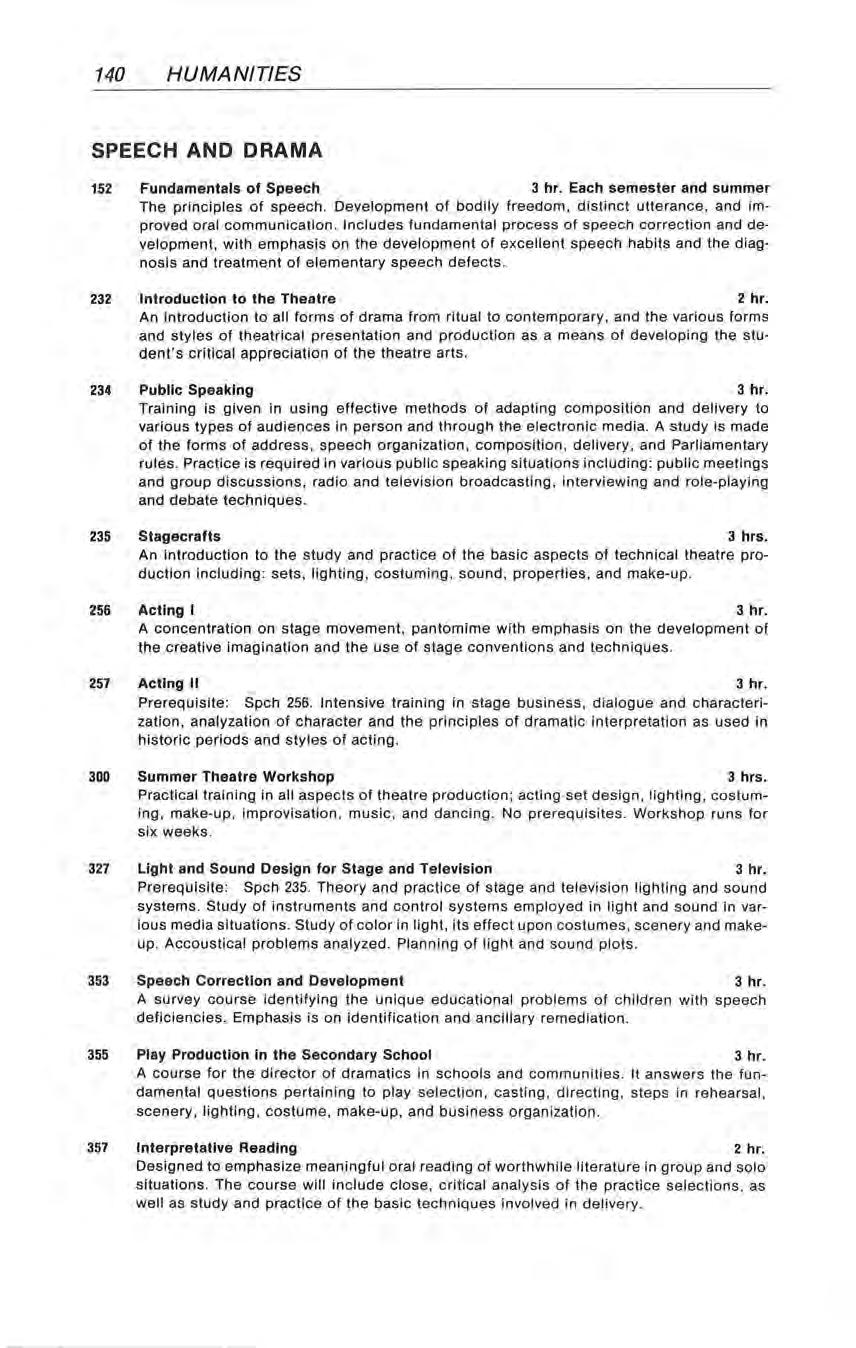
355 Play Production In the Secondary School
3 hr.
A course for the director of dramatics in schoo l s and communities It answers the fundamental questions pertaining to play se l ection , casting, directing, steps in rehearsal , scenery, lighting , costume, make-up, and busin ess organization
357 Interpretative Reading
2 hr
Designed to emphasize meaningful oral r ead ing of worthwhile literature in group and solo situations. The course will include close, critical analysis of the practice selections , as well as study and practice of the basic techniques invo l ved in delivery.
360 Scenery and Costume Design
3 hr.
Prerequisite : Speh 235. Theory and practice of Costume and Scenery Design. Application of the principles of design as they apply to Scenery and Costumes and the interrelationship of the two design areas. Development of the scenery and costume designs through drawings , sketches , co lor plates and models.
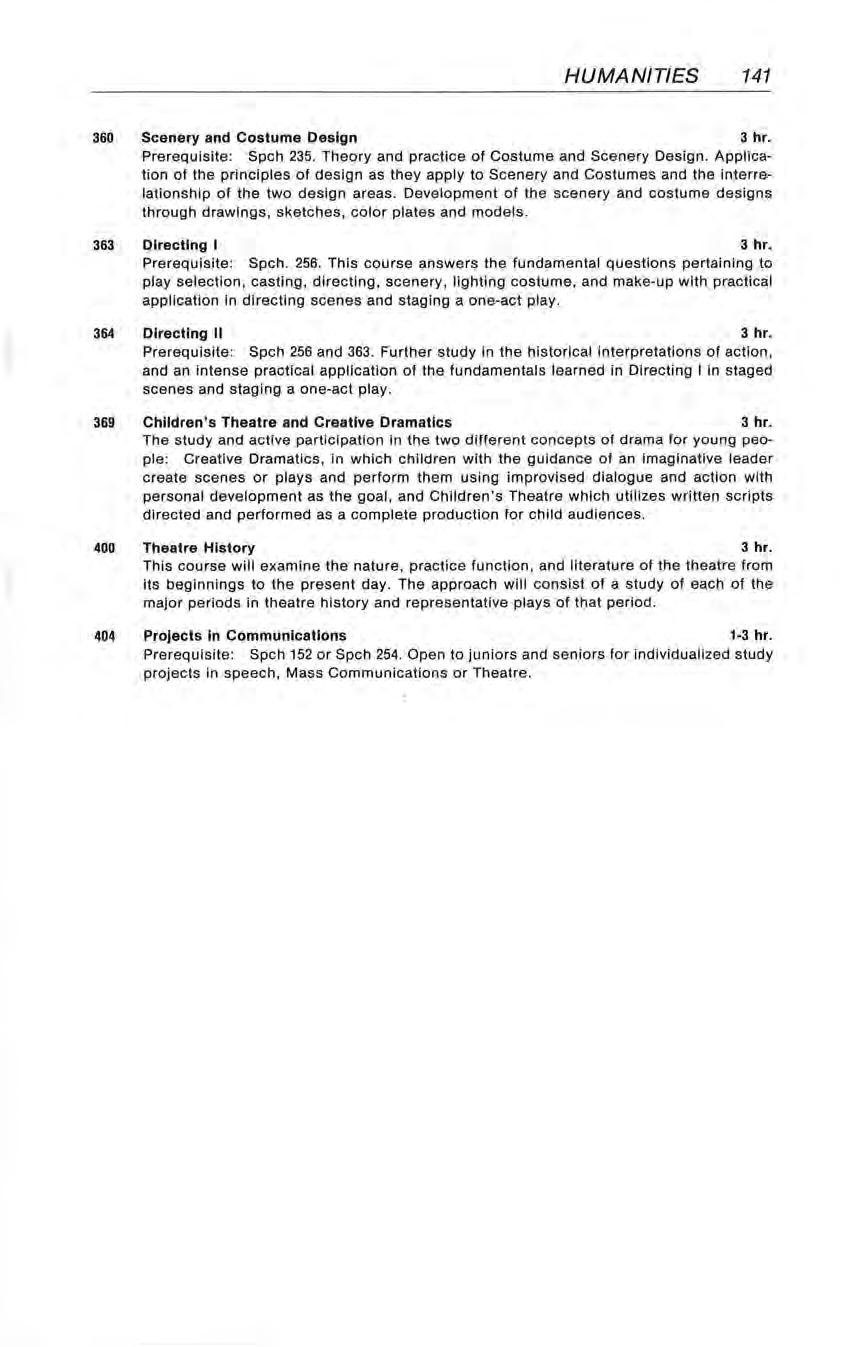
363 Directing I
3 hr.
Prerequisite: Speh. 256. This course answers the fundamental questions pertaining to play selection, casting , directing, scenery, lighting costume , and make-up with practical application in directing scenes and staging a one-act play
364 Directing II
369
3 hr.
Prerequisite: Speh 256 and 363. Further study in the historical interpretations of action, and an intense practical application of the fundamentals learned in Directing I in staged scenes and staging a one-act play.
Children's Theatre and Creative Dramatics
3 hr. The study and active participation in the two different concepts of drama for you ng people : Creative Dramatics, in which children with the guidance of an imaginative leader create scenes or plays and perform them using improvised dialogue and action with personal development as the goal, and Children's Theatre which utilizes written scripts directed and performed as a complete production for child audiences.
400 Theatre History
3 hr.
This course will examine the nature, practice function, and literature of the theatre from its beginnings to the present day The approach will co nsi st of a study of each of the major periods in theatre history and representative plays of that period.
404 Projects in Communications
1-3 hr
Prerequisite: Speh 152 or Speh 254. Op en to juniors and seniors for individualized study projects in speech, Mass Communications or Theatre.
100 Leadership Laboratory
101 106
O hr .
Leadership Laboratory provides initial and advanced military leadership experience in military courtesy, drill and ceremonies, and practical field training exercises. Functions and responsibilities of leadership positions are developed through cadet battalion staff actions and command positions
Introduction to Officer Professionalism
1 hr. Ex amines the role of the commissioned officer in the United States Army. Discussion focuses upon officer career specialities, leadership responsibilities and moral ethics within the profession.
Introduction to Officer Professionalism II
1 hr .
Continuation of MilSci 101. Exami nes the role of the commissioitned officer in the United States Army Discussion focuses on customs of the service; role of the Army , Army Reserve, and Army National Guard; organization of the Army ; branches of the Army ; and leadership principles for the junior officer.
150 Leadership Assessment
1 hr.
A series of Managerial simulations exercises designed to assess leadership and managerial potential. Students are evaluated in communications , personal-motivational , problem-solving, decision - making , administrative and general supervisory skills. Individual strengths and weaknesses are identified and the student is provided r eco mmended courses of action to more fully develop his/her potential.
201 Leadership Assessment and Development
3 hr. Course initially begins with Leadership Assessment, MilSci 150 , then proceeds into a detailed analysis of the principles and techniques of effective leadership Management simulation modules emphasize practical u se of the skills and techniques assessed in the course.
205 ROTC Basic Camp
3 hr.
Six weeks of preparatory officer training at Fort Knox, Kentucky. Travel pay and salary stipend provided through the Military Science Departm en t. The student is not obligated to any military service as a result of attending Basic Camp. Camp graduates are eligible to enroll in Advanced Military Science courses Students are also e ligible to complete for full-tuition 2 year scholarships. This is a credit/no credit course.
206 SMP Basic Camp
3 hr.
Under the Simultaneous Memb e rship Program (SMP) , students e ntering Pe ru State who have completed Basic Training may receive credit for the first two years of Army ROTC and enter the Advanced Program culminating in the awarding of a co mmi ss ion as a Second Lieutenant in the Army Reserves or National Guard in two years. Contact th e Professor of Military Sc ience for details at (402) 872-3815. This is a cred it/ no credit course.
208 The Army Today
1 hr. Military Qualification Skills in land navigation are introduced along with a detailed examination of Officer Career specialities and the role of the Reserve Officer Training Corps in the academic community. Structured interviews and Offi ce r Selection Battery testing will also be offered for advancement into the Ad va nced ROTC Program
301 Military Professionalism and Ethics I
2 hr Seminar on contemporary problems facing junior officers dealing with ethics and militar y professionalism. Standards of co nduct are expla ined and applied to practical s imulation s. An ethical decision making process is developed for each student.
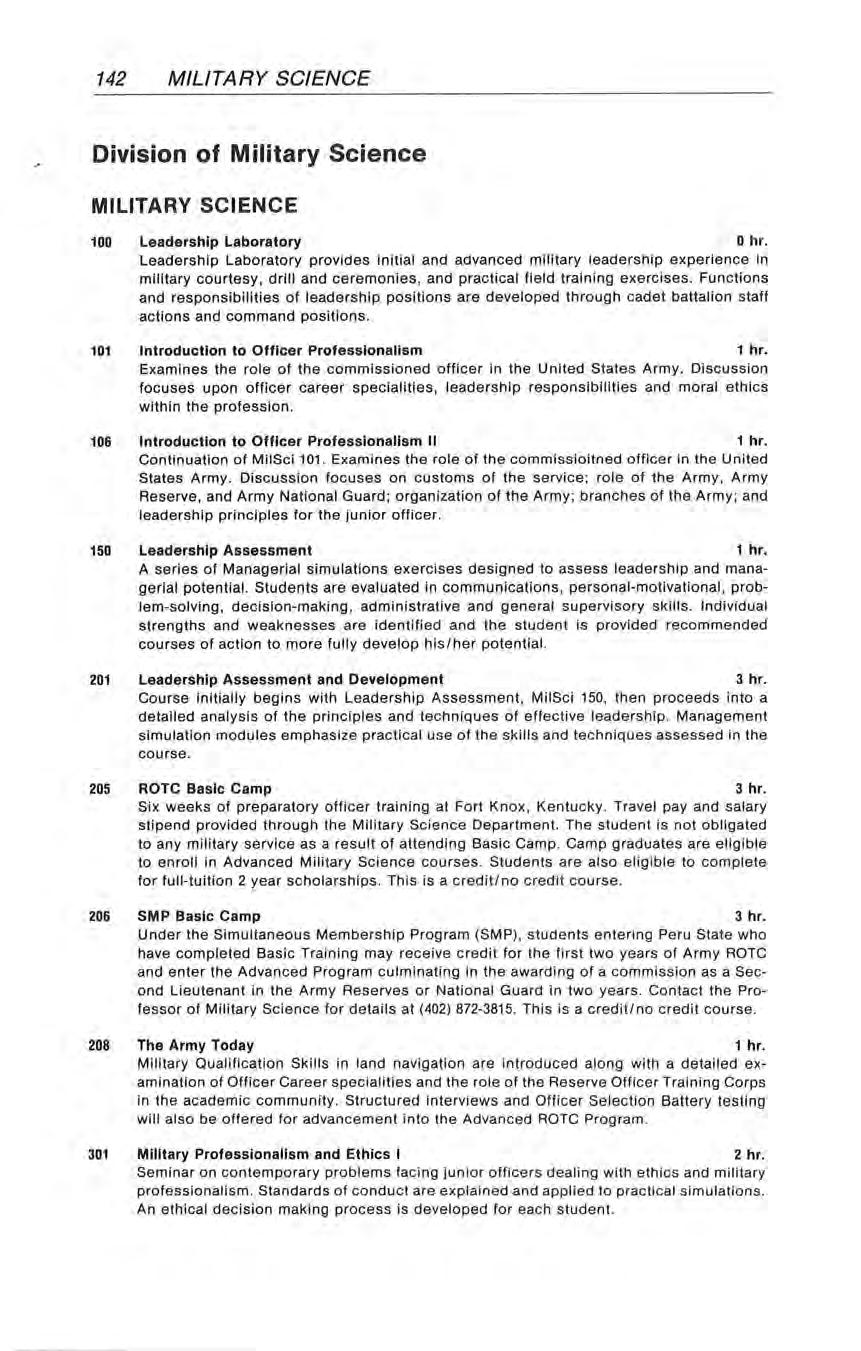
302 Fundamentals of Mllltary Leadership II
2 hr. Study and application of small unit tactics and personnel management at the junior office r level. Prepares the student for Advanced Camp Includes a deta i led study and application of military topographic maps and symbols, terrain analysis , land navigation and position location.
351 ROTC Advanced Camp Training S
3 hr . The ROTC cadet attends six weeks of intensive leadership and management training . The training is conducted during the summer months at Fort Lewis , Washington The student's ability to lead his unit and to plan and conduct military small unit operations is thoroughly evaluated. Travel pay and salary stipend provided through the Department of Military Science
401 Advanced Leadership Seminar
2 hr. Military correspondence, both oral and written , common to the junior officer. Study of Military Supply Management at the company level. Leadership seminar on the unique responsibilities of the military officer.
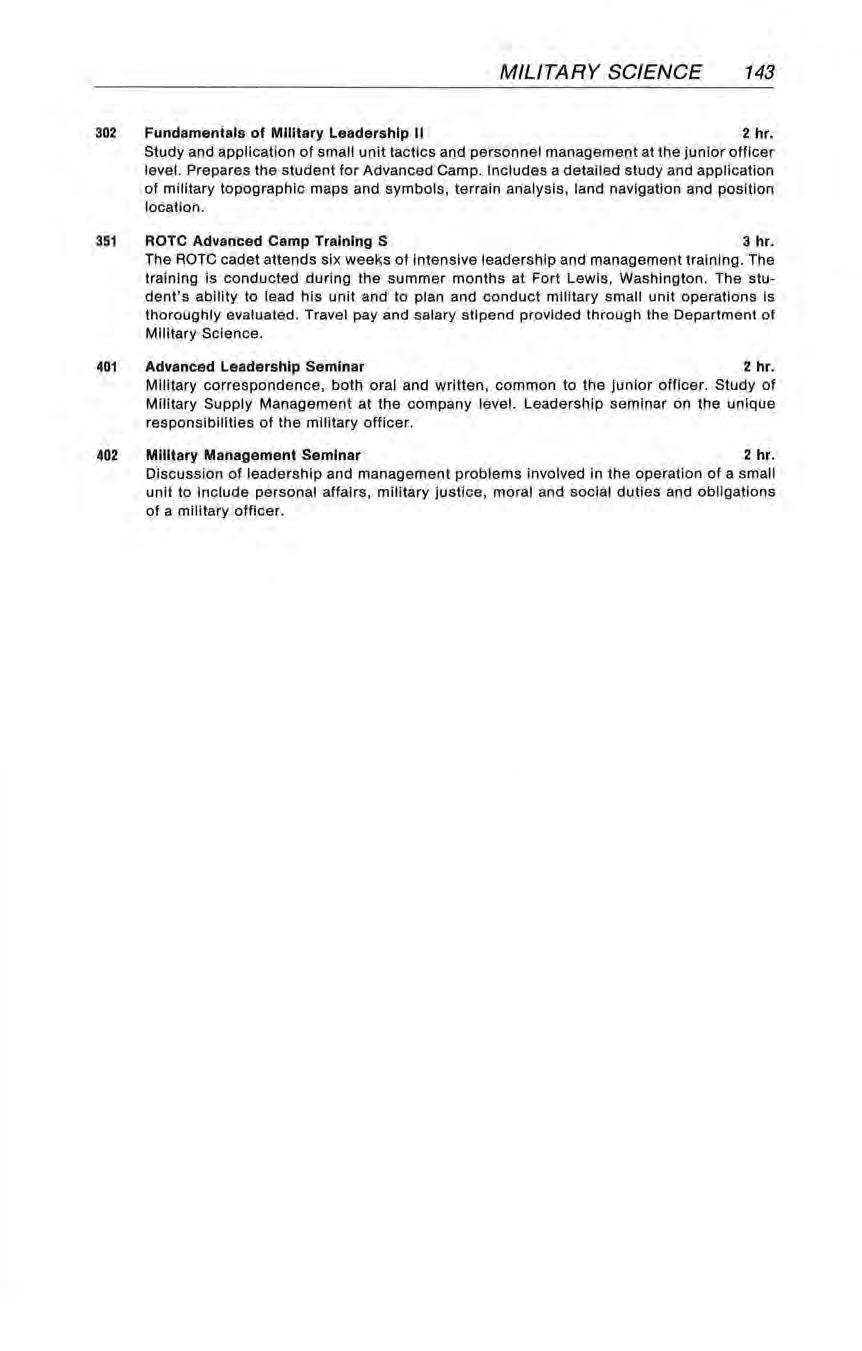
402 Mllltary Management Seminar
2 hr. Discussion of leadership and management problems involved in the operation of a small unit to include personal affairs, military justice , moral and social duties and obligations of a military officer
100 Agriculture - Man's Frontier
2 hr. A survey course looking at the development of today's agriculture and the challenges that lie ahead and the relationship of the land-grant institutions in education , research, and e x tension programs serving agriculture. Suggested methods of study will be presented Educational and career opportunities in agriculture will be studied, and students will develop educational objectives and proposed programs of study
101 Introductory Animal Science and Livestock Evaluation
3 hr. (AmSci) The role of the livestock industry in food production. The biological basis of variation in livestock, including poultry , and their products The application of the sciences in improving livestock production. A comparison and evaluation of various types, classes, grades, and breeds of livestock Subje c tive and objective methods of evaluating live animals and their products with emph a sis on carcass (meat) , milk , wool, eggs, and performance are studied.
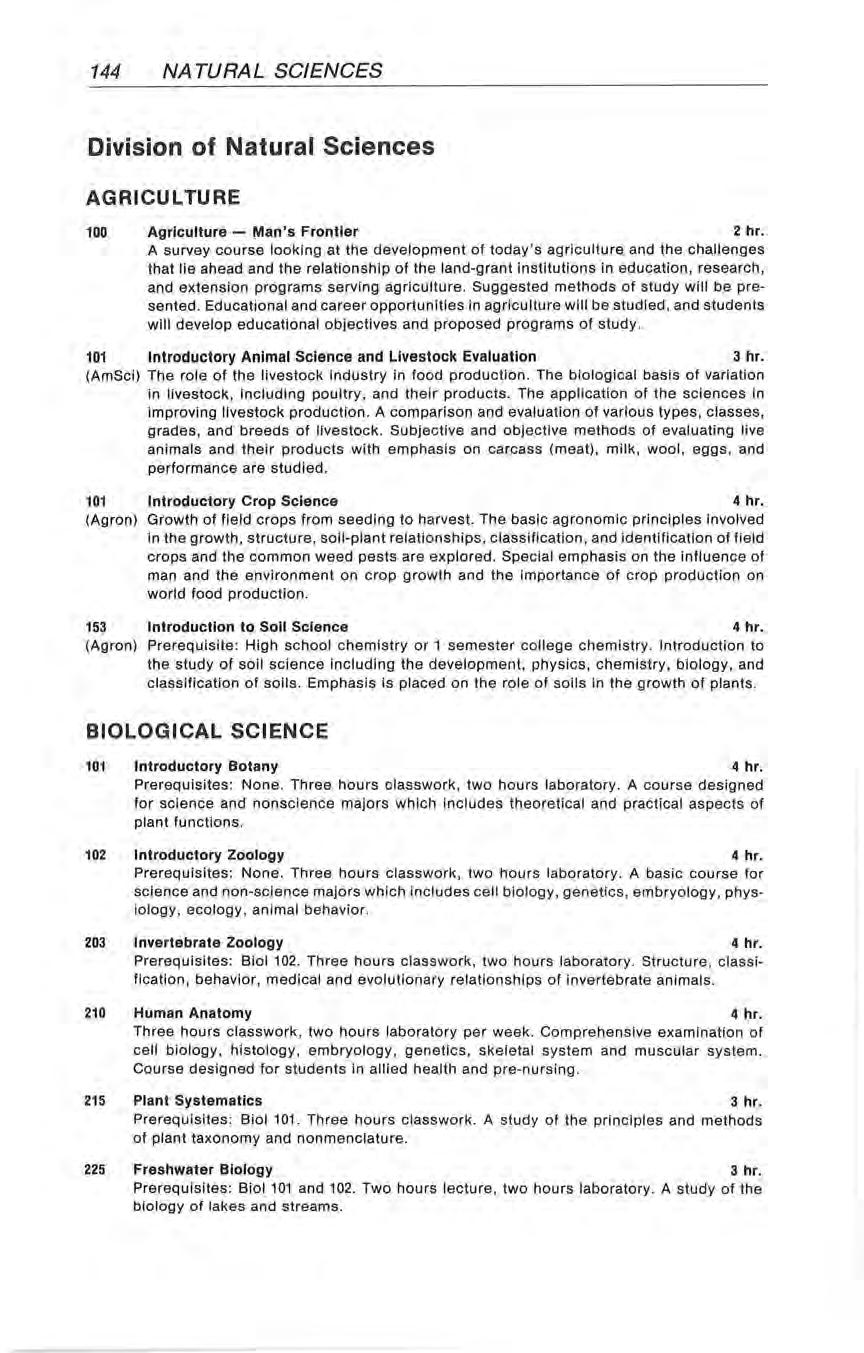
101 Introductory Crop Science
4 hr. (Agron) Growth of field crops from seeding to harvest The basic agronomic principles involved in the growth, structure , soil-plant relationships , classification , and identification of field crops and the common weed pests are e xplored. Special emphasis on the influence of man and the environment on crop growth and the importance of crop production on world food production.
153 Introduction to Soil Science
4 hr. (Agron) Prerequisite: High school chemistry or 1 semester college chemistry Introduction to the study of soil science includ i ng the development, physics , chemistry, biology, and classification of soils. Emphasis is plac e d on the role of soils in the growth of plants
101 Introductory Botany
4 hr.
Prerequisites : None. Three hours classwork , two hours laboratory. A course designed for science and nonscience majors which includes theoretical and practical aspects of plant functions
102 Introductory Zoology
4 hr.
Prerequisites : None. Three hours classwork, two hours la boratory. A basic course for science and non-science majors which includes cell biology , genetics , embryology, physiology, ecology, animal behavior.
203
Invertebrate Zoology
4 hr .
Prerequisites: Biol 102 Three hours classwork , two hours laboratory Structure, classification , behavior, medical and evolutionary relationships of invertebrate animals.
210 Human Anatomy
4 hr. Three hours classwork , two hours laboratory per week. Comprehensive examination of cell biology, histology, embryology , genetics , skeletal s y stem and muscular system. Course designed for students in allied health and pre-nursing
215 Plant Systematics
3 hr.
Prerequisites : Biol 101. Three hours classwork A study of the principles and methods of plant taxonomy and nonmenclature
225 Freshwater Biology
3 hr.
Prerequisites : Biol 101 and 102 Two hours lecture , two hours laboratory A study of the biology of lakes and streams
301 Microbiology
4 hr.
Prerequisites : Biol 101 or 102, Chem 101 and 102. Two hours classwork , four hours laboratory. An introduction to the field of microbiology, with em phasis on medical laboratory skills and microbiology technique.
304 Comparative Anatomy
4 hr.
Prerequisites: Biol 102. Three hours classwork, two hours laboratory. Evolutionary relationships of vertebrates are studied anatomically.
308 Morphology of Plants
4 hr.
Prerequisites: Biol 101 and 215 Two hours lecture, four hours laboratory. A study of the structure, anatomy and form of plants.
312 Human Physiology
4 hr.
Prerequisites : Biology 102 or Biology 210. Three hours classwork, two hours laboratory per week. Examination of the function of the human body . Topics covered include nervous, cardiovascular, respiratory, endocrine, urinogenital, digestive and immune systems. Emphasis is placed on homeostatic control mechanisms
317 Ecology
4 hr.
Prerequisites : Biol 101 and 102 Three hours classroom work , two hours laboratory. A study of organisms, including their interactions with each other and their environment.
346 Entomology
3 hr.
Prerequisites: Biol 102 Two hours lecture, two hours laboratory. The study of the biology of insects
395 Mammalogy
404
3 hr.
Prerequisite: Biol 102. Two hours lecture, two hours laboratory A study of mammals with emphasis on midwestern species. Genetics
3 hr.
Prerequisites: Biol 101 and 102. Three hours lecture. A study of mendelian principles of heredity with special emphasis on current advances.
405 Histology
4 hr.
Prerequisites : Biol 102. Three hours classwork, two hours laboratory. Microscopic anatomy of mammalian tissue and organ systems with medical emphasis.
406 Embryology
4 hr .
Prerequisites: Biol 101, 102 Three hours classwork , two hours laboratory Developmental biology of vertebrate and selected invertebrate animals.
409 Plant Physiology
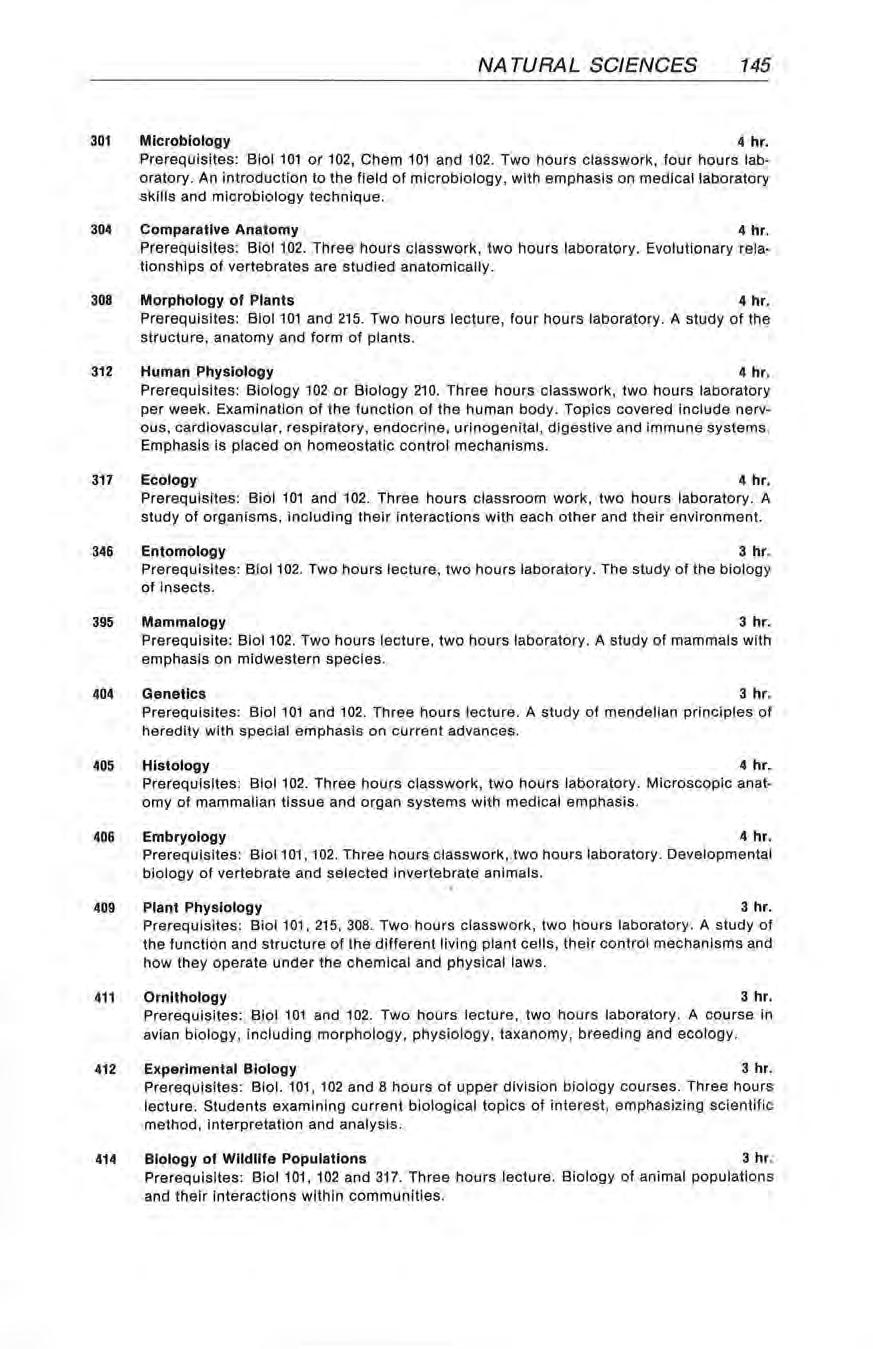
3 hr.
Two hours classwork, two hours laboratory A study of the function and structure of the different living plant cells, their control mechanisms and how they operate under the chemical and physical laws
Prerequisites : Biol 101, 215, 308
411 Ornithology
3 hr.
Two hours lecture , two hours laboratory. A course in avian biology, including morphology , physiology, taxanomy , breeding and ecology.
Prerequisites : Biol 101 and 102
412 Experimental Biology
3 hr.
Prerequisites: Biol. 101, 102 and 8 hours of upper division biology courses. Three hours lecture Students examining current biological topics of interest , emphasizing scientific method, interpretation and analysis.
414 Biology of Wildlife Populations
3 hr .
Prerequisites: Biol 101 , 102 and 317. Three hours lecture Biology of animal populations and their interactions within communities.
450 Environmental Biology
3 hr.
Prerequisites : Biol 101 , 102 and 317 plus six hours of biology. Three hours classwork A study of the effects of population growth on the earth's resources and environment. An overview of the needs of man to adapt to changes resulting from biotic and abiotic factors
486 Wildlife Conservation and Management
3 hr.
Prerequisites: Biol 317 and 414. Three hours lecture. A study of contemporary techniques of conservation and management of wildlife
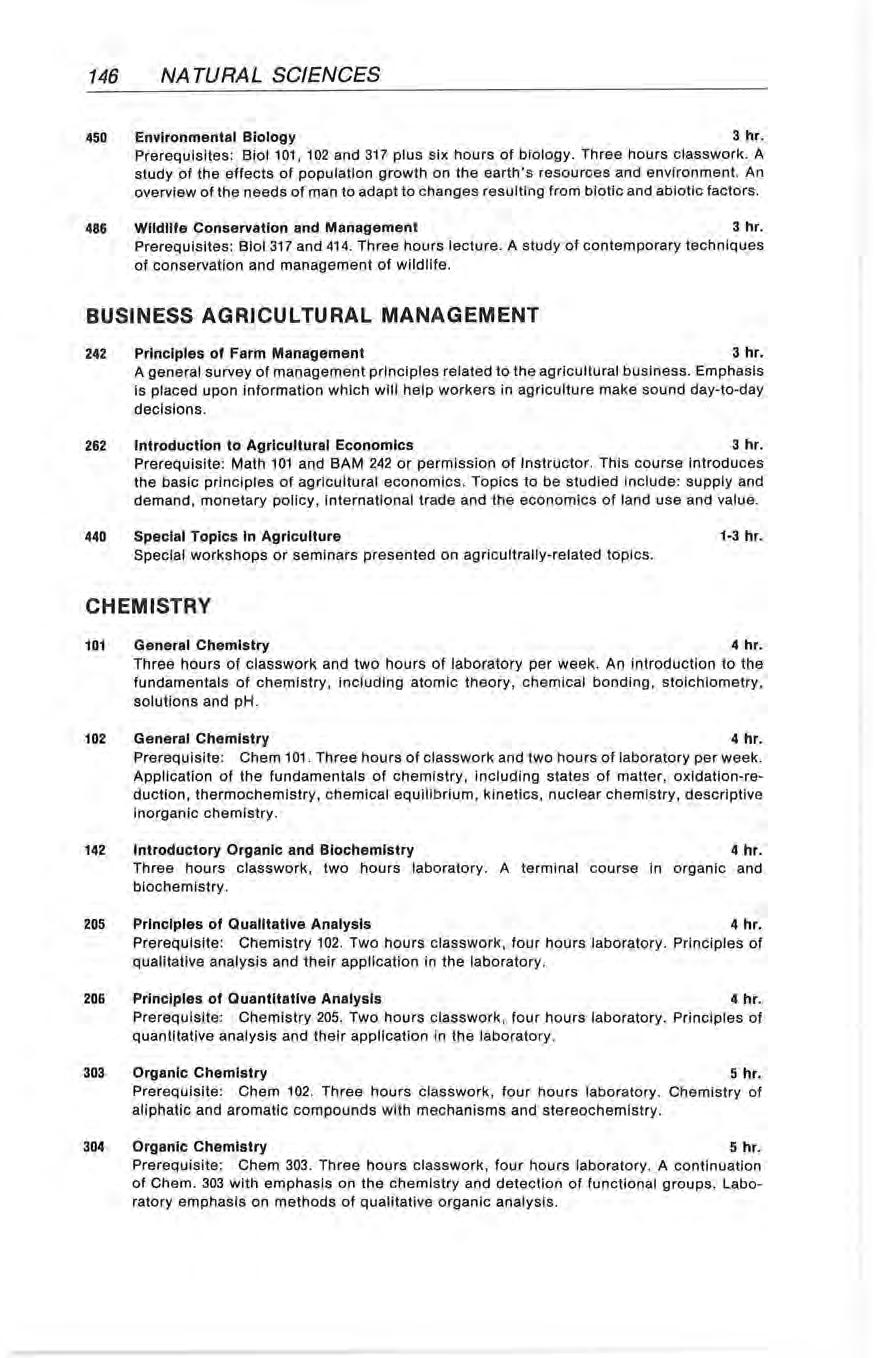
242 Principles of Farm Management
3 hr. A general survey of management principles related to the agricultural business. Emphasis is placed upon information which will help workers in agriculture make sound day- to - day decisions.
262 Introduction to Agricultural Economics
440
3 hr.
Prerequisite: Math 101 and BAM 242 or permission of Instructor This course introduces the basic principles of agricultural economics . Topics to be studied include: supply and demand, monetary po l icy, international trade and the economics of land use and value.
Special Topics in Agriculture
1-3 hr. Special workshops or seminars presented on agricultrally-related topics.
101 General Chemistry
4 hr.
Three hours of classwork and two hours of laboratory per week. An introduction to the fundamentals of chemistry , including atomic theory , chemical bonding, stoichiometry, solut i ons and pH.
102 General Chemistry
4 hr.
Prerequisite : Chem 101. Three hours of classwork and two hours of laboratory per week. Application of the fundamentals of chemistry, including states of matter, oxidation-reduction , thermochemistry , chemical equilibrium , kinetics, nuclear chemistry , descriptive inorganic chemistry
142 Introductory Organic and Biochemistry
4 hr.
Three hours classwork, two hours laboratory. A terminal course in organic and biochemistry
205 Principles of Qualitative Analysis
4 hr.
Prerequisite : Chemistry 102. Two hours classwork, four hours laboratory Principles of qualitative analysis and their application in the laboratory
206 Principles of Quantitative Analysis
4 hr.
Prerequisite: Chemistry 205 Two hours classwork, four hours laboratory Principles of quantitative analysis and their application in the laboratory
303 Organic Chemistry
5 hr.
Prerequisite : Chem 102. Three hours classwork, four hours laboratory Chemistry of aliphatic and aromatic compounds with mechanisms and stereochemistry
304 Organic Chemistry
5 hr.
Prerequisite: Chem 303. Three hours classwork, four hou r s laboratory A continuation of Chem. 303 with emphasis on the chemistry and detection of functional groups. Laboratory emphasis on methods of qualitative organic analysis
431 Biochemistry
4 hr.
Prerequisite : Chem 304. Three hours classwork, two hours laboratory. The chemical foundations of molecular biology with emphasis on the molecular aspects of intermediary metabolism
90 Microcomputer Software
1 hr
This course is designed to introduce the student to the use of the microcomputers in a variety of situations : i.e. business, banking , education. Students will have hands-on experience in using a variety of software. (This course cannot be substituted for any requirement with a major field. Although it cannot be substituted for a required course, it can count as one credit hour toward graduation )
100 Computer Awareness
1 hr.
An overview of computer technology Topics include hi story and evolution of computers , terminology , hardware, word processing and elementary programming concepts Issues such as the future of computers, their social impact and ethics of computer use are considered
102 Introduction to Data Processing
3 hr.
An introduction to the concepts and basic features of electronic computers An overview of the makeup of computer systems and of the structure and usage of computer languages is presented. FORTRAN IV is used to illustrate the course and give the student direct computer experience
103 Introduction to Microcomputers
2 hr. One hour of classwork and two hours of laboratory per week The BASIC language and its application to problem solving in mathematics , science , and business will be studied using the Apple II m i crocomputer.
104 Advanced Microcomputers
1 hr.
Prerequisite: Csci 103. A more in-depth study of BASIC on the Apple microcomputer. Topics covered include subroutines, graphics, and disk text file manipulation.
203 COBOL Programming
3 hr.
Prerequisite: Csci 102 or permission. An introduction to ANS COBOL and its application to business computing. This course emphasizes structured analysis and design of programs illustrating business applications
204 Computer Programming I
3 hr.
An introduction to programming and algorithm development using Fortran. The representation of data and instructions is studied Elements of program structure , and subprogram usage are developed. Problem solving techniques including stepwise refinement are applied to problems in mathematics and business. Algorithms for searching, merging , and sorting are introduced
206 Computer Programming II
3 hr.
Prerequisite: Csci 204. Programming and algorithm dev e lopment using Pascal. The study of stepwise refinement and top-down programming, testing , and debugging is continued, with emphasis on string processing, internal searching and s orting , and recursion. Data structures including stacks, queues , deques , linked lists are built and manipulated
208 Computer Systems
3 hr.
Prerequisites: Csci 206. Principles of operation and assembly programming of IBM 370. Topics studied include computer structure and machine language , assembly language, addressing techniques , macros , program segmentation and linkage conventions, file i nput-output , assemblers and interpreters.
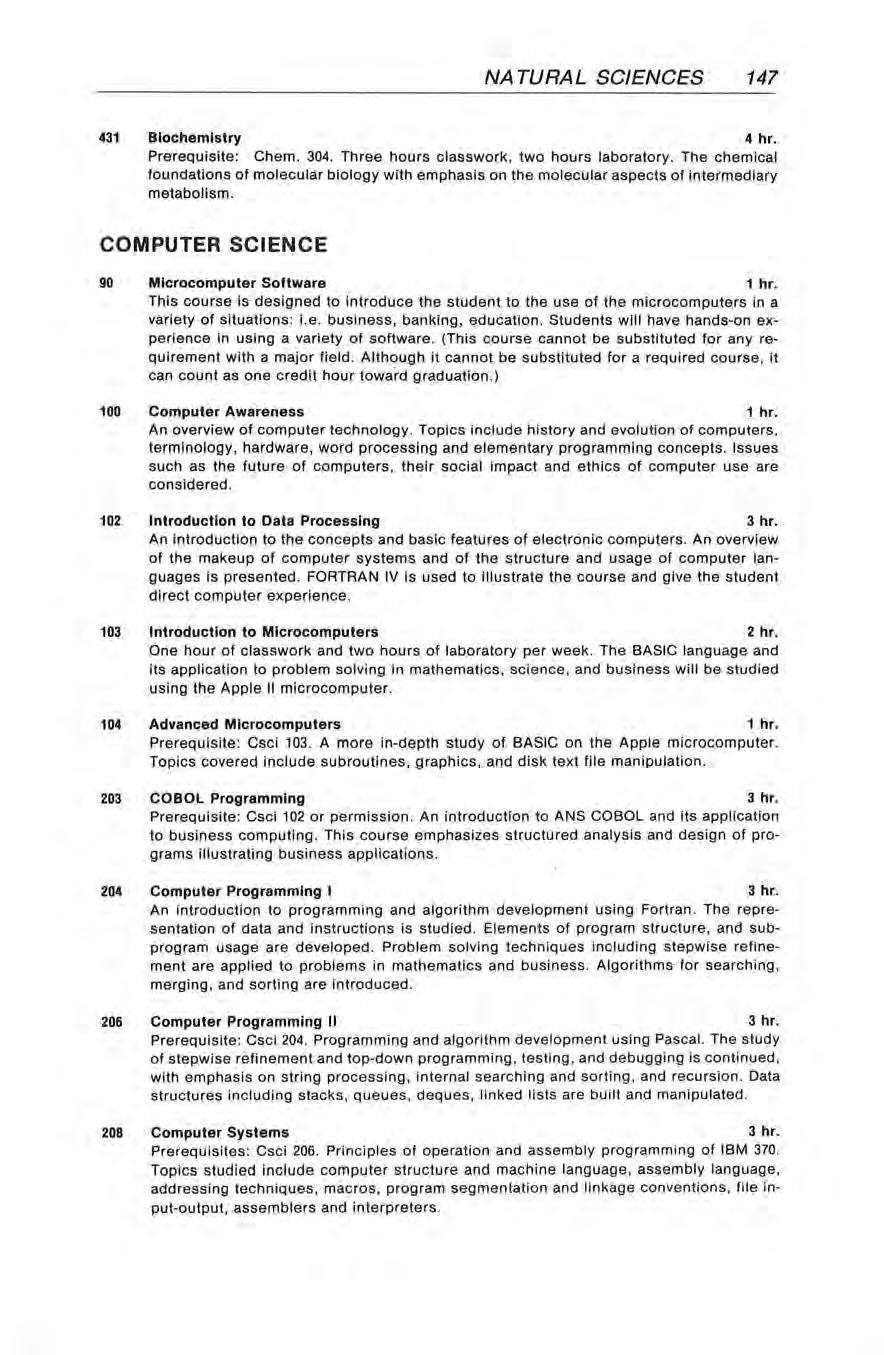
304 File Processing
3 hr.
Prerequisite: Csci 203. A study of methods used to process data files Sequential file techniques studied include sort , merge , insertion , deletion and update Random acc ess file methods studied include inverted lists, inde xed -sequential and hiera c hical structures and database concepts. Programming examples and exercises will stress applications of COBOL.
306 Operating Systems and Computer Architecture
3 hr.
Prerequisite: Csci 208. Operating systems principles and relationships between operating systems and computer architecture Topics studied include procedure activation, system structure, system modeling and evaluation , memory manag e ment, process management , Interrupts , scheduling, and recovery procedure s
315 Computer Organization
3 hr .
Prerequisites : Csci 206 Organization and structure of hardware components of computers. Among topics covered are logic design, number representation and arithmetic , computer architecture, and interfacing. De tailed laboratory study of a representative micro-processor system constitutes a major portion of the course.
404 Data Structures and Analysis of Algorithms
3 hr.
Prerequisite: Csci 206, Csci 304. A study of internal representation and manipulation of data Topics include stacks , queues , lists , trees , graphs and graph and tree algorithms, design and analysis of sorting , merging, and searching algorithms, memory allocation and deallocation, and detabase managem e nt systems.
406 Organization of Programming Languages
3 hr
Prerequisite: Csci 208. A study of the structure and implementation of computer languages. Topics include language definition and structure , data types and structure, control structures, run time considerations, compilers and interpreters, and lexical analysis and parsing.
408 Senior Project
4 hr
Prerequisite: 15 hours of computer science (200 or above). Analysis , design, implementation, testing, and documentation of a complete system. This project is chosen in consultation with the intructor to apply skills and intergrate knowledge acquired in undergraduate studies.
100 Physics
4 hr .
Three hours of classwork and two hours of laboratory per week. This course is designed to acquaint the student with physics The areas of energy, mechanics, heat, electricity, sound, and light are surveyed
130 Health Careers Internship
3 hr
Prerequisites : Prior approval of the Chairman of th e Natural Science Division to insure that appropriate arrangements have been made for the int ernship. The co urse is designed to provide students in the preprofessional programs with ex perience in the medicallyrelated professions A minimum of 40 hours of work experience will be required for every hour of credit.
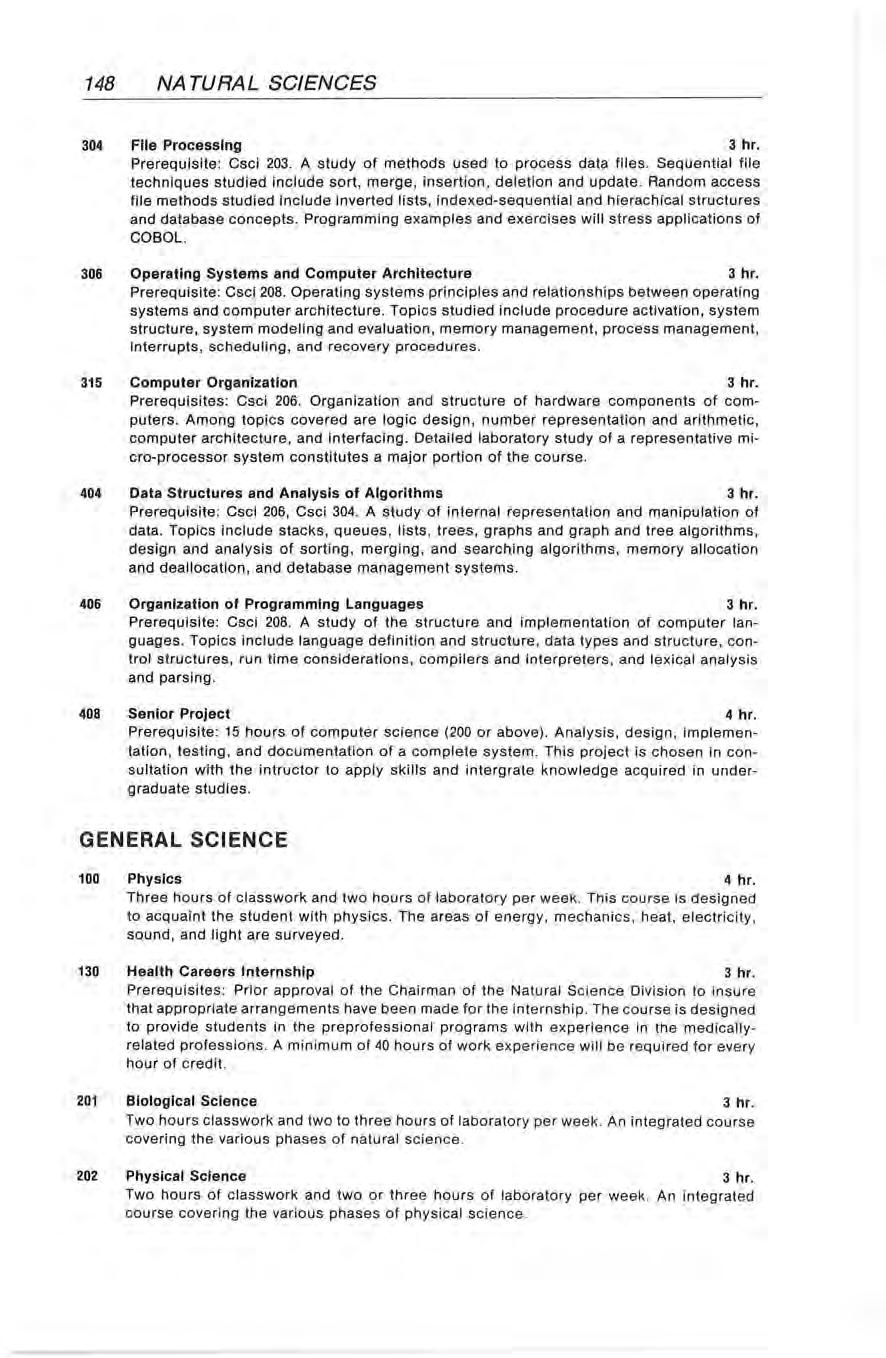
201 Biological Science
3 hr .
Two hours classwork and two to thr ee hour s of laborator y per week. An integrated course cove ring the various phases of natural science.
202 Physical Science
3 hr
Two hours of classwork and two or three hours of lab oratory per week An integrated course cover ing the various phases of ph ysica l science.
205 Introductory Biology
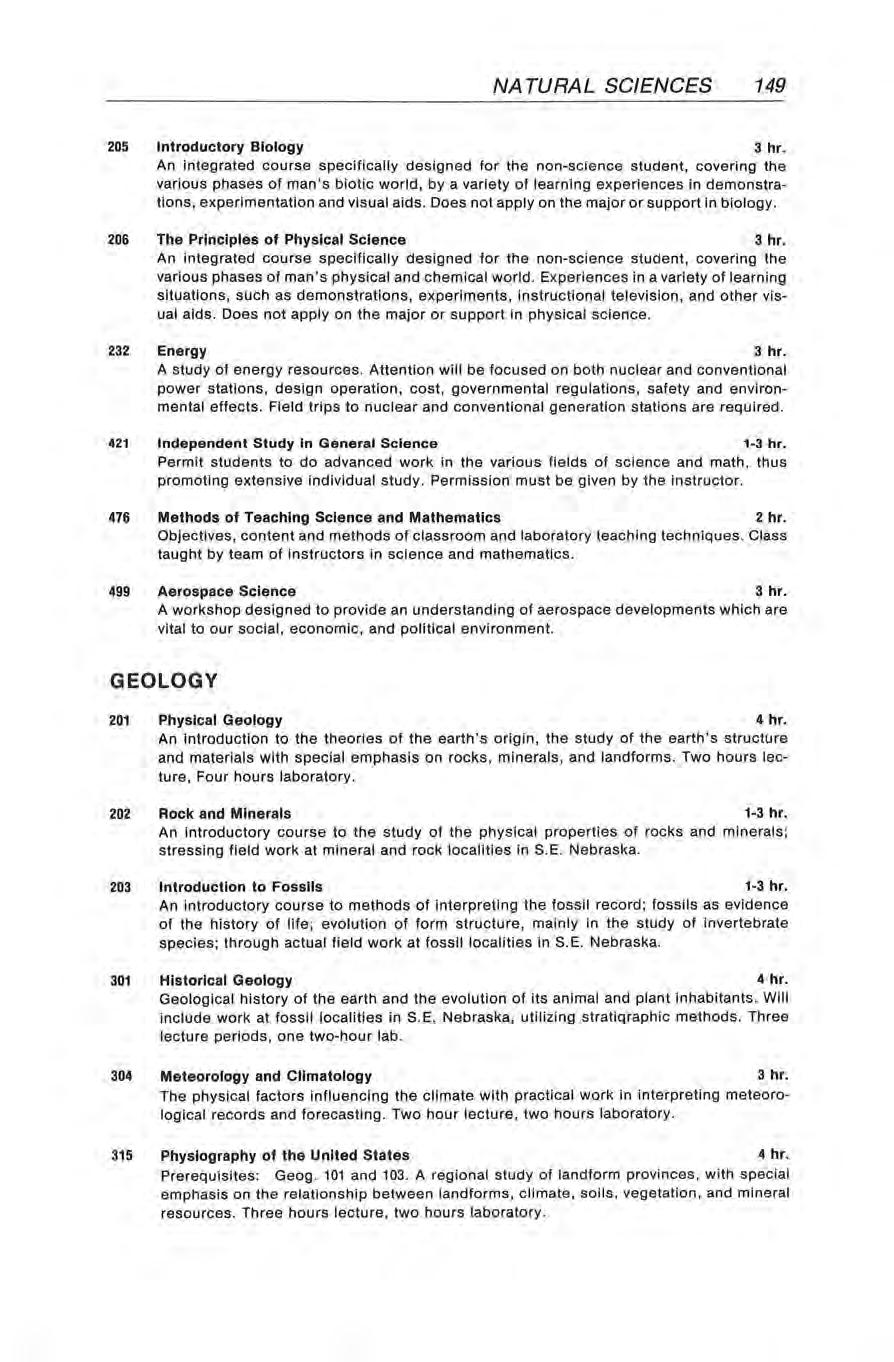
3 hr .
An integrated course specifically designed for the non-sci e nce student, covering the various phases of man's biotic world , by a variety of learning experiences in d e monstrations, experimentation and visual aids. Does not apply on the major or support in biology.
206 The Principles of Physical Science
3 hr.
An integrated course specifically designed for the non-science student, covering the various phases of man's physical and chemical world. Experiences in a variety of learning situations , such as demonstrations, experiments, instructional television , and other visual aids. Does not apply on the major or support in physical science.
232 Energy
3 hr.
A study of energy resources. Attention will be focused on both nuclear and conventional power stations, design operation, cost, governmental regulations, safety and environmental effects. Field trips to nuclear and conventional generation stations are required.
421 Independent Study In General Science
1-3 hr. Permit students to do advanced work in the various fields of science and math, thus promoting extensive individual study. Permission must be given by the instructor
476 Methods of Teaching Science and Mathematics
2 hr. Objectives, content and methods of classroom and laboratory teaching techniques. Class taught by team of instructors in science and mathematics
499 Aerospace Science
3 hr.
A workshop designed to provide an understanding of aerospace developments which are vital to our social , economic, and political environment.
201 Physical Geology
202
203
4 hr.
An introduction to the theories of the earth's origin, the study of the earth's structure and materials with special emphasis on rocks, minerals, and landforms. Two hours lecture, Four hours laboratory.
Rock and Minerals
1-3 hr.
An introductory course to the study of the physical properties of rocks and minerals ; stressing field work at mineral and rock localities in S. E. Nebraska.
Introduction to Fossils
1·3 hr.
An introductory course to methods of interpreting the fossil record ; fossils as evidence of the history of life ; evolution of form structure, mainly in the study of invertebrate species; through actual field work at fossil localities in S.E Nebraska.
301 Historical Geology
4 hr.
Geological history of the earth and the evolution of its animal and plant inhabitants. Will include work at fossil localities in S E Nebraska, utilizing stratiqraphic methods. Three lecture periods , one two- hour lab
304 Meteorology and Climatology
3 hr.
The physical factors influencing the climate with practical work in interpreting meteorological records and forecasting. Two hour lecture , two hours laboratory
315 Physiography of the United States
4 hr
Prerequisites : Geog 101 and 103. A regional study of landform provinces , with special emphasis on the relationship between landforms, climate, soils , vegetation, and mineral resources. Three hours lecture, two hours laboratory
50 Practical Trigonometry
1 hr.
Prerequisite : Non-Mathematics major or minor. Right triangle trigonometry, law of sines, law of cosines , and applied problems .
Prerequisite: Math 50 or equivalent Fundamental theory and practice, use of transit , U.S Public Land Surveys and field office work. Will be counted toward a math major or minor
A study of the development, advantages , and use of the metric system.
A review of the four fundamental operations of arithmetic applied to whole numbers , fractions, and decimals; applications of percentage; computing interest and discounting note s; co nsumer credit ; cash and trade discount; computing markup , retail and comm ission; marking goods; the arithmetic of payrolls.
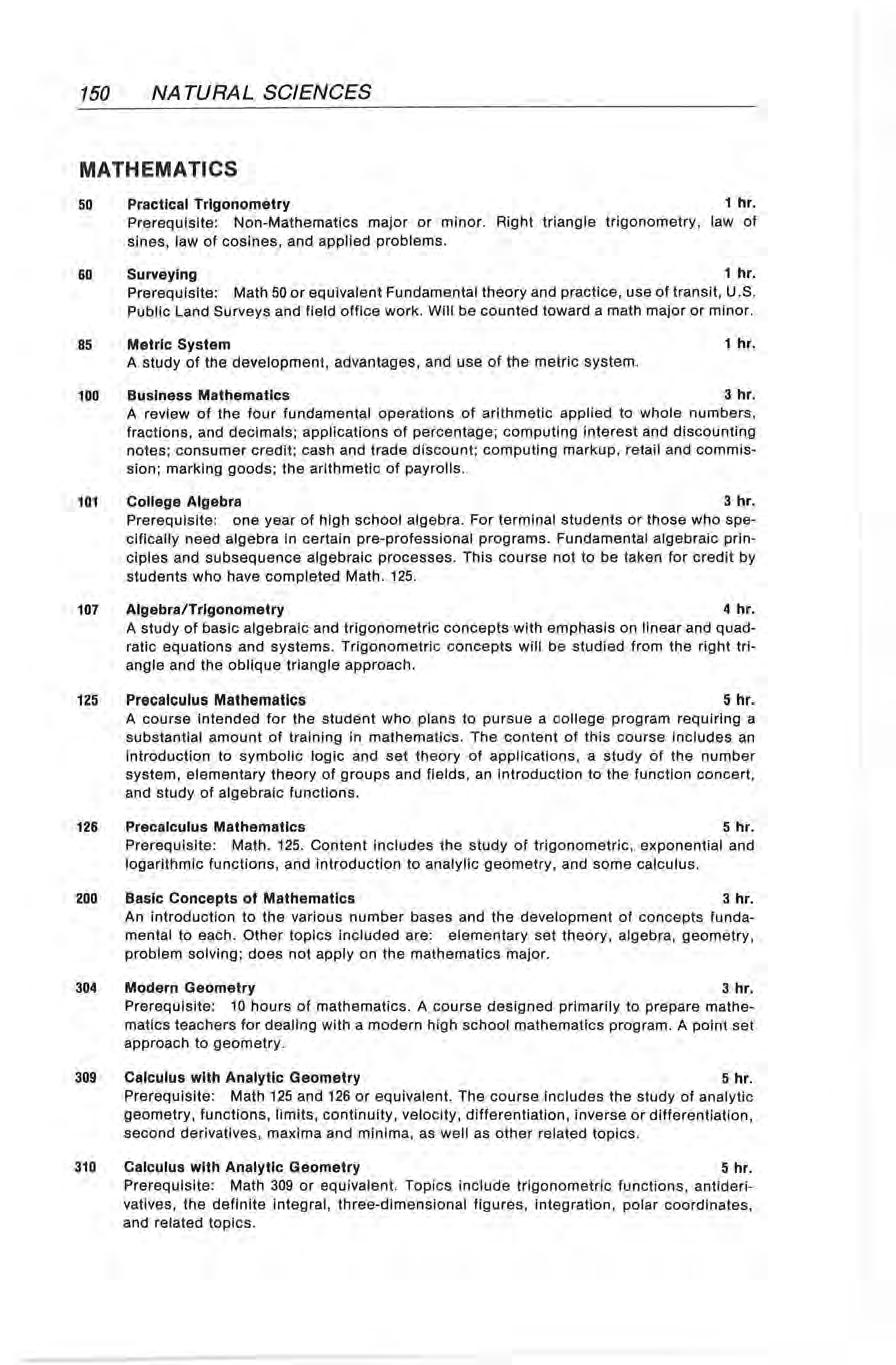
Prerequisite: one year of high school algebra. For terminal students or those who specifically need algebra in certain pre-professional programs Fundamental algebraic principles and subsequence algebraic processes This course not to be taken for credit by students who have completed Math. 125.
A study of basic algebraic and trigonometric concepts with emphasis on linear and quadratic equations and systems Trigonometric concepts will be studied from the righ t triangle and the oblique triangle approach.
A course intended for the student who plans to pursue a col lege program requiring a substantial amount of training in mathematics. The co ntent of this course includ es an introduction to symbolic logic and set theory of applications , a study of the numb er system, elementary theory of groups and fields, an introduction to the function concert , and study of algebraic functions
5 hr.
Prerequisite: Math. 125 Content includes the study of trigonometric , expo n e ntial and logarithmic functions , and introduction to analylic geometry , and some calculus.
200 Basic Concepts of Mathematics
3 hr
An introduction to the various number bases and the development of concepts fundamental to each Other topics included are: elementary set theory, algebra, geometry, problem solving; does not apply on the mathematics major.
304 Modern Geometry
3 hr .
Prerequisite: 10 hours of mathematics A course designed primarily to prepare mathematics teachers for dealing with a modern high school mathematics program. A point set approach to geometry .
309 Calculus with Analytic Geometry
5 hr.
Prerequisite: Math 125 and 126 or equivalent. The course in cl udes the study of analytic geometry, functions, limits, continuity, velo c ity, differentiation, inverse or differentiation , second derivatives, ma x ima and minima, as well as other related topics.
310 Calculus with Analytic Geometry
5 hr.
Prerequisite : Math 309 or equ i valent. Topics include trigonometric functions , antiderivatives, the definite integral , three - dimensional figures, integration , polar coordinates, and related topics.
340
Calculus Ill
3 hr.
Prerequisites : Math. 309 and 310 or equivalent. Designed to give the student a review of calculus and applying it for complex problems in mathematics
Statistics
3 hr.
A study of the methods of summarizing and interpreting data, elementary probability, and its relation to distributions The meanings, importance , and applications of the normal and binomical distributions The methods of random sampling , testing of hypotheses , analysis of paired data, and interpretation of standardized test scores
406 Modern Algebra
3 hr.
Prerequisites: 10 hours of mathematics A study of various algebraic systems arising in modern mathematical computations. Course includes a study of sets, mappings and operations, relations, development of real numbers systems , integral domains and fields, polynomial domains, and complex number field
418 Linear Algebra
3 hr.
The theory of linear transformations in ve ctor spaces , the represe ntation of linear spaces in matrices, linear functionals, and the application of these concepts.
419 Topology
3 hr
A modern treatment of topology with emphasis on fundamental concepts and principal results of homology theory, topological spaces , linear graphs , set theory, metric interpretation, as well as other related topics.
430
Discrete Structures
3 hr.
Prerequisite : Math 126 A study of some of the mathematical concepts useful to computer sciences Topics include number systems , logi c, truth tables , sets and relations , boolean algebra, logic circuits, vectors, matrices , determinants , graphs , directed graphs , finite state machines and automata .
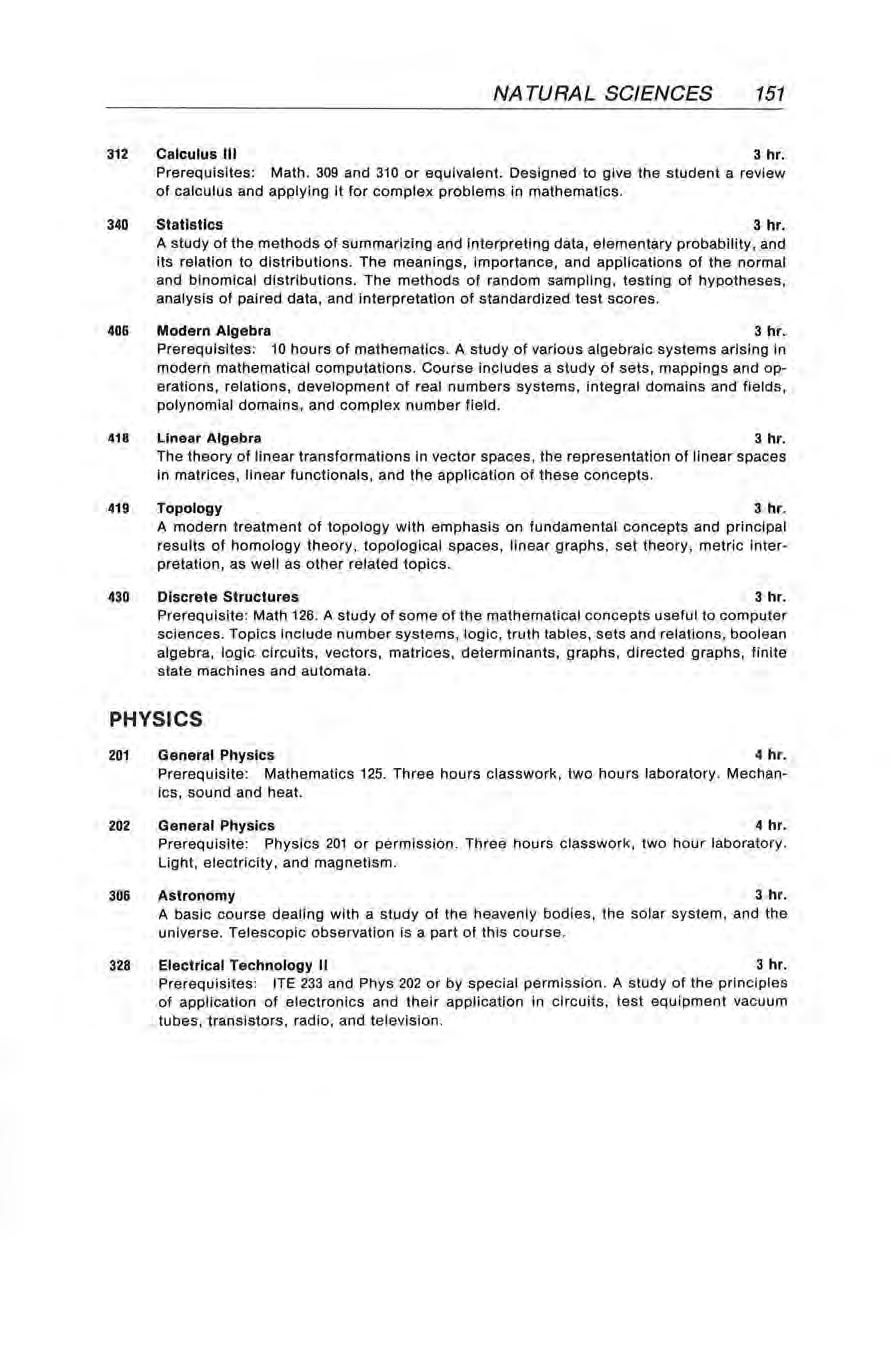
201 General Physics
202
4 hr .
Prer equ isite : Mathematics 125 . Three hours classwork, two hours laboratory . Mechanics, sound and heat
General Physics
4 hr.
Prerequisite: Physics 201 or permission. Three hour s classwork , two hour laboratory Light, electricity, and magnetism
306 Astronomy
3 hr.
A basic course dealing with a study of th e heavenly bodies , the solar system, and the universe. Telescopic observation is a part of this course
328 Electrical Technology II
3 hr .
Prerequisites : ITE 233 and Phys 202 or by special permission . A study of the principles of application of electronics and their application in circuits, test equipment vacuum tubes, transistors, radio, and television
A maximum of four cred i ts of varsity sports may be included to meet the 125 semester hours of course credit required for degree purposes. Physical Education activity courses (P.E. 1 through 22) requ i re two hours attendance.
No prerequisites. Equips the individual with basic swimming sk ill s and basic water sa fety information to help insure reasonable safety in, on , and around the water
Prerequis i tes: Advanced Beginn er and B as ic Water Safety ce rtificat e. Teac h es the elements of good swimming. Increases endurance by the coord inati on of whole st rok es and skills versatility by mastery of th e basic strokes. Enabl es individuals to acq uire correct responses in aquatic emergencies
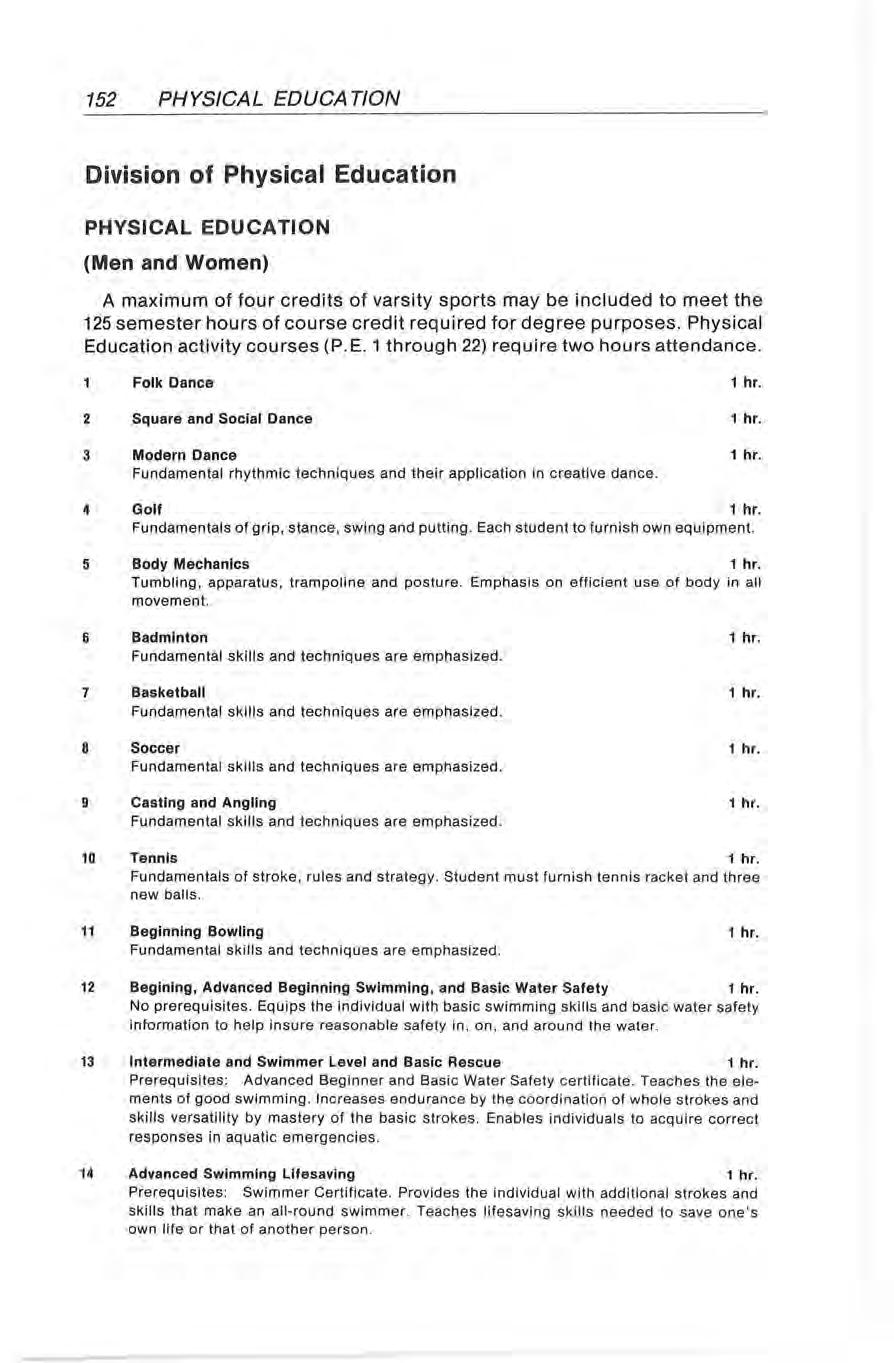
14 Advanced Swimming Lifesaving 1 hr
Prerequisites: Swimmer Certificate Provides the individual with additional strokes and skills that make an all-round swimmer. Teac hes lif esaving skills needed to save one 's own life or that of another person
15 Water Safety Instructor
1 hr.
Prerequisites: Advanced Lifesaving Certificate (current). General content to cover physical laws governing body movements in the water, stroke analysis, practice teaching.
16 Volleyball
1 hr.
The purpose of this course is to assist the student or player in acquiring the knowledge and skills that are necessary for playing power volleyball.
17 Weight Training
18
1 hr.
Activity designed to have students participate in a variety of strength building programs.
Softball
1 hr.
The purpos e of this course is to assist the student or player in acquiring the knowledge and skills that are necessary for playing fast or slow-pitch softball.
19 Restricted Activities
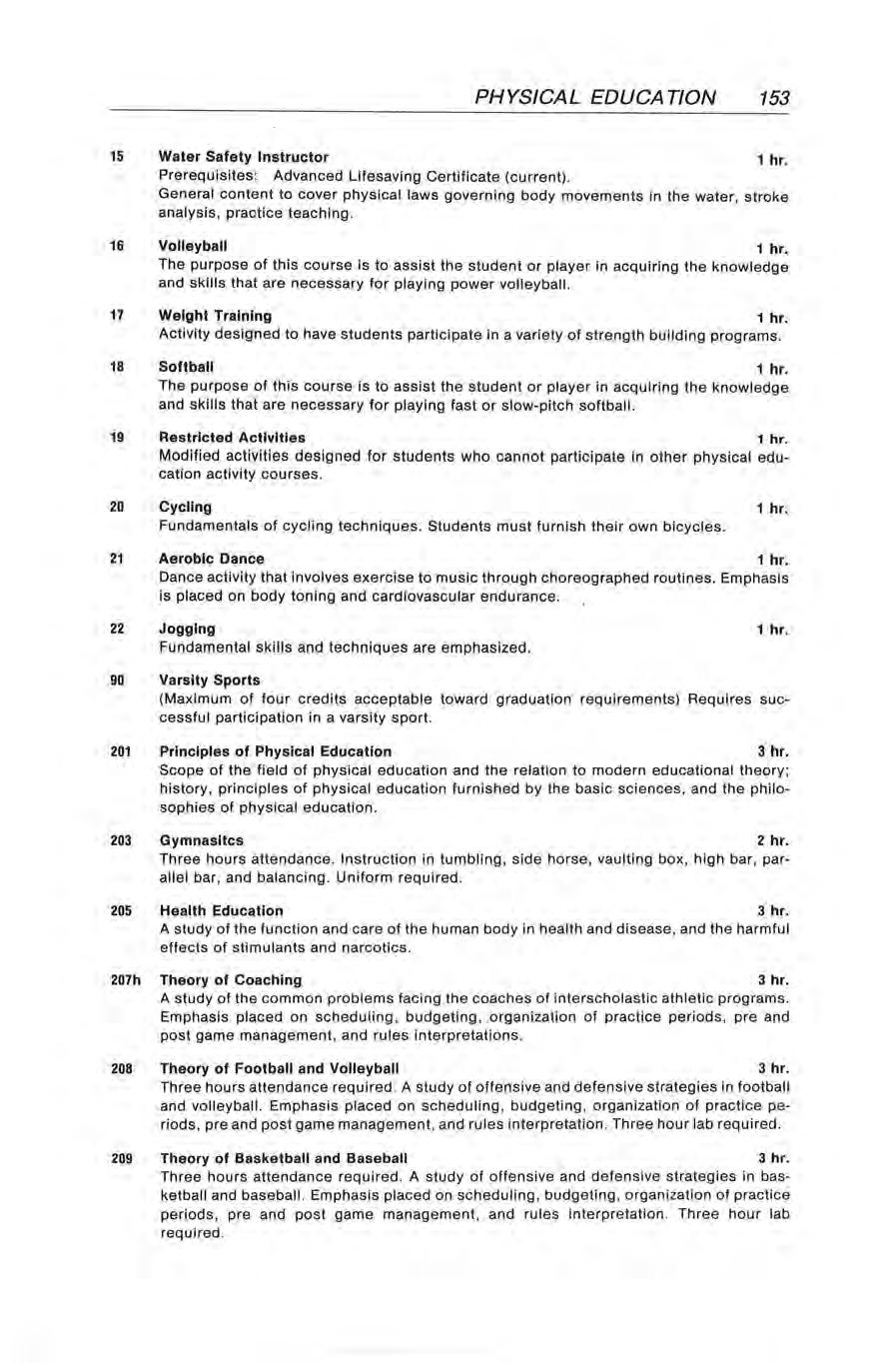
Modified activities designed for students who cannot participate in other physical education activity courses.
Cycllng
Fundamentals of cyc ling techniques. Students must furnish their own bicycles.
1 hr.
1 hr. Dance activity that involves exercise to music through choreographed routines. Emphasis is placed on body toning and cardiovascular endurance.
Aerobic Dance
Jogging
Fundamental skills and techni ques are emphasized.
90 Varsity Sports
1 hr.
1 hr. 20 21 22
(Maximum of four credits acceptable toward graduation requ irements) Requires successful participation in a varsity sport.
201 Principles of Physical Education
3 hr.
Scope of the field of physical education and the relation to modern educational theory; history , principles of physical education furnished by the basic sciences, and the philosophies of physical educat ion.
203 Gymnasltcs
205
2 hr.
Three hours attendance. Instruction in tumbling, side horse, vaulting box, high bar, parallel bar, and balancing. Uniform required.
Health Education
3 hr.
A study of the function and care of the human body in h ea lth and disease, and the harmfu l e ffects of stimulants and narcotics.
207h Theory of Coaching
3 hr
A study of the co mmon problems facing the coaches of int ersc hola stic at hl etic programs. Emphasis placed on scheduling, budgeting, organization of practice periods , pre and post game management, and rules int erpretat ions
208 Theory of Football and Volleyball
3 hr.
Three hours attendance required A study of offensive and defensive strategies in football and volleyball. Emphasis placed on scheduling, budgeting, organization of practice periods , pre and post game management, and rules interpr etation. Three hour lab required.
209 Theory of Basketball and Baseball
3 hr.
Three hours attendance required. A study of offensive and defensive strategies in basketball and baseball. Emphasis placed on scheduling , budgeting , organization of practice periods, pre and post game management , and rules interpretation Three hour lab required .
Three hours attendance required. A study of techniques and skills required for events, organization of practice periods management of meets, and rules interpretation. Three hours lab
Red Cross First Aid course and Medical Self Help course.
study of strategy and techniques involved in teaching selected physical education activities 229
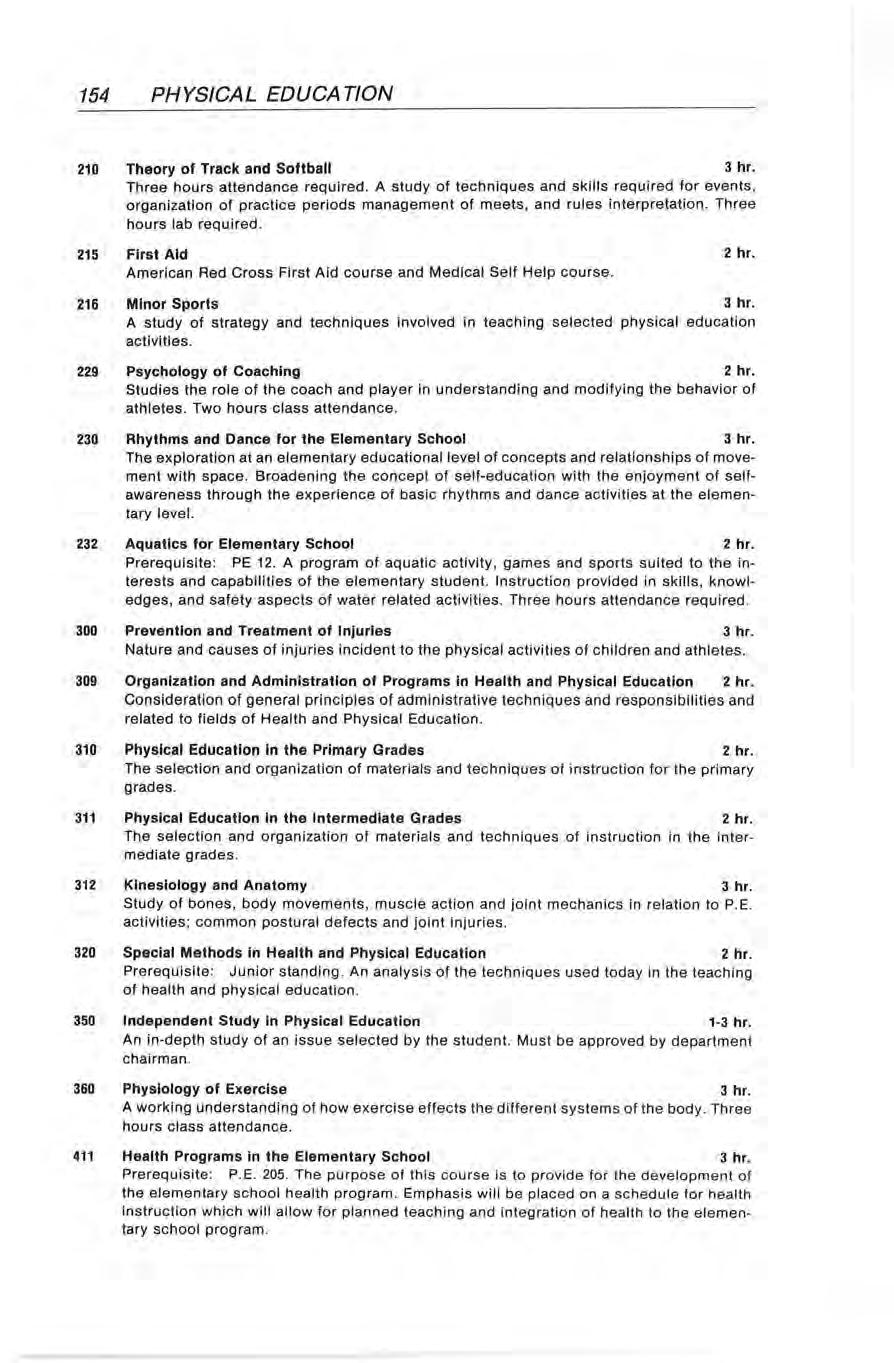
Studies the role of the coach and player in understanding and modifying the behavior of athletes. Two hours class attendance
exploration at an elementary educational level of concepts and relationships of movement with space. Broadening the concept of self-education with the enjoyment of selfawareness through the experience of bas ic rhythms and dance activities at the elementary level.
Prerequisite : PE 12 A program of aquatic activity , games and sports suited to the interests and capabilities of the elementary student. Instruction provided in skills, knowledges , and safety aspects of water related activities. Three hours attendance required
of instruction for the primary grades
311 Physical Education In the Intermediate Grades 2 hr
The selection and organization of materi a ls and techniques of instruction in the intermediate grades.
312 Kinesiology and Anatomy 3 hr.
Study of bones, body movements , muscle action and joint m ec hanics in relation to P.E activities ; common postural defects and joint injuries.
320 Special Methods in Health and Physical Education
2 hr .
Prerequisite: Junior standing. An analysis of the techniques used today in the teaching of health and physical education.
350 Independent Study in Physical Education
1-3 hr. An in-depth study of an issue selected by the stud e nt. Must be approved by department chairman.
360 Physiology of Exercise 3 hr .
A working understanding of how exercise effects the diff e rent systems of th e body Thre e hours class attendance
411 Health Programs in the Elementary School 3 hr
Prerequisite: P E. 205. The purpose of th i s course is t o provide for th e development of the elementary school health program Emphasi s will be placed on a sc hedule for h ea lth instruction which will allow for planned teaching and integration of health to the elementary school program
412 Foundations of Elementary and Secondary School Health 3 hr.
The purpose of the course is to provide a foundation for the implementing of an effective elementary and secondary health instruction plan. Emphasis will be placed on materials essential to health instruction
Skill Progression In Athletic Performance 3 hr.
A study of physical, psychological and sociological factors governing the development of athletic skills from the time of birth to the utilization of these skills in interscholastic athletic competition. 415 The Development of Basic Learning Abilities 3 hr.
Introduction to screening and remedial techniques and activities involving basic learning abilities in the areas of (1) Gross-motor Development, (2) Sensori-motor Integration, (3) Perceptual-motor skills and (4) Social Skills.
A study is made of the various tests and measurements in the field of physical education.
An overview of corrective and preventive physical education in relation to the whole program. Consideration of adaptations necessary to provide satisfying and effective programs
Includes a history of the development of athletic programs, a study of various national and state athletic organizations, the role of athletics in education , and the responsibilities of the athletic director
A course designed to provide students with a background of activities and games , which could be utilized in recreat i onal programs. 319 Programs in Recreation
hr. A principles course to encompass industrial, social , youth organizations and community recreation 322 Outdoor Recreation and Camping
This course investigates all aspects of outdoor recreation. Camping theory and experience in a camping situtation are a part of this cou r se
assignments made by the instructor relative to new areas in recreation.
Prerequisite: P E 405 Investigation of legal, financial, personnel, public relations, political, and philosophical problems of management of federal, state, and local government agencies in the field of recreation
i t given for working in any of the disciplines involved with the outdoor education program Students must have approval of the appropriate Division Chairperson.
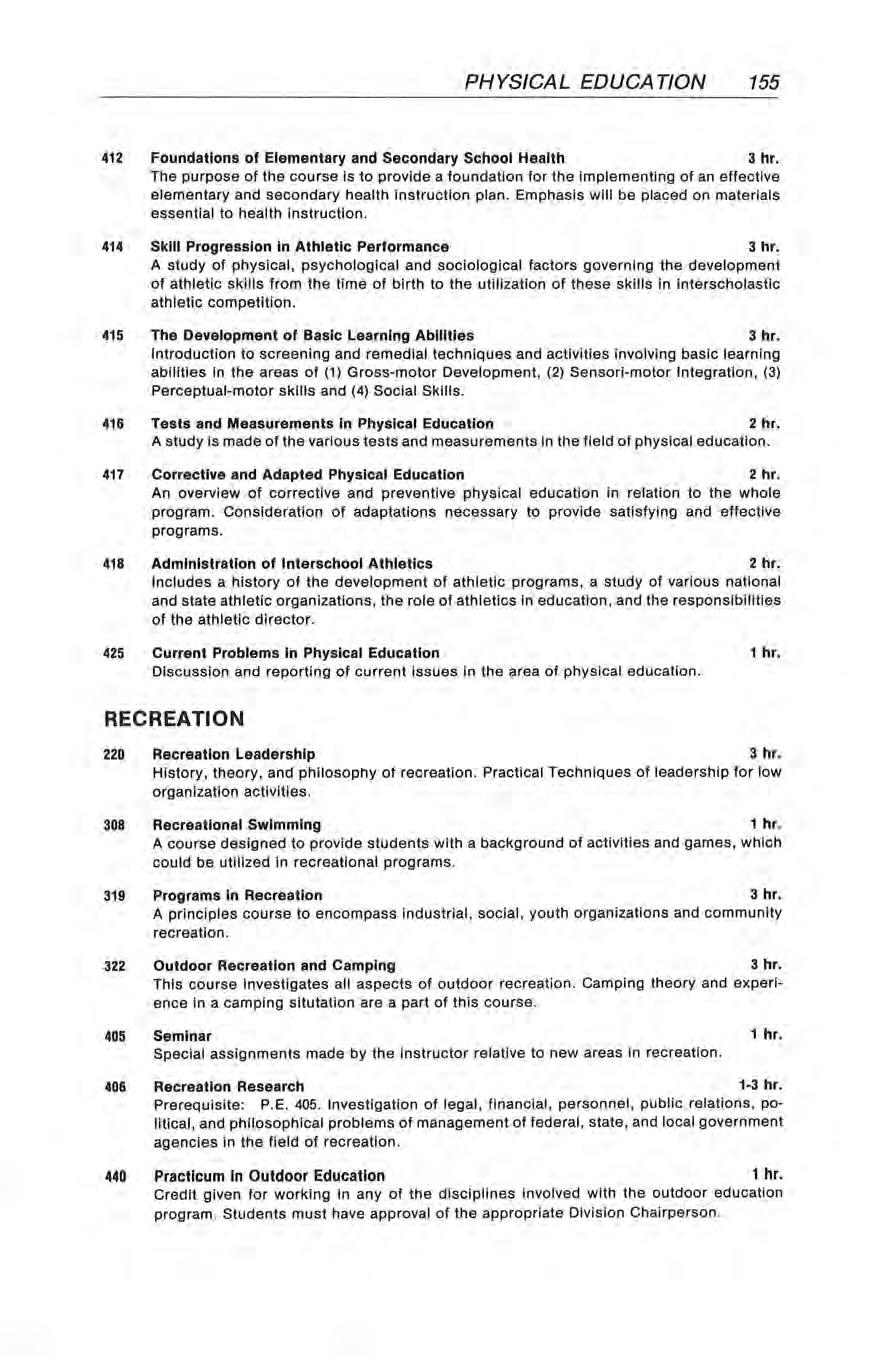
460 Recreation Internship
6-8 hr.
Prerequisites: all required Rec. courses A practical application of the principles of recreation The internship will be offered during the summer. Students will be placed in public or industrial recreation programs to work with leaders , directors, and supervisors.
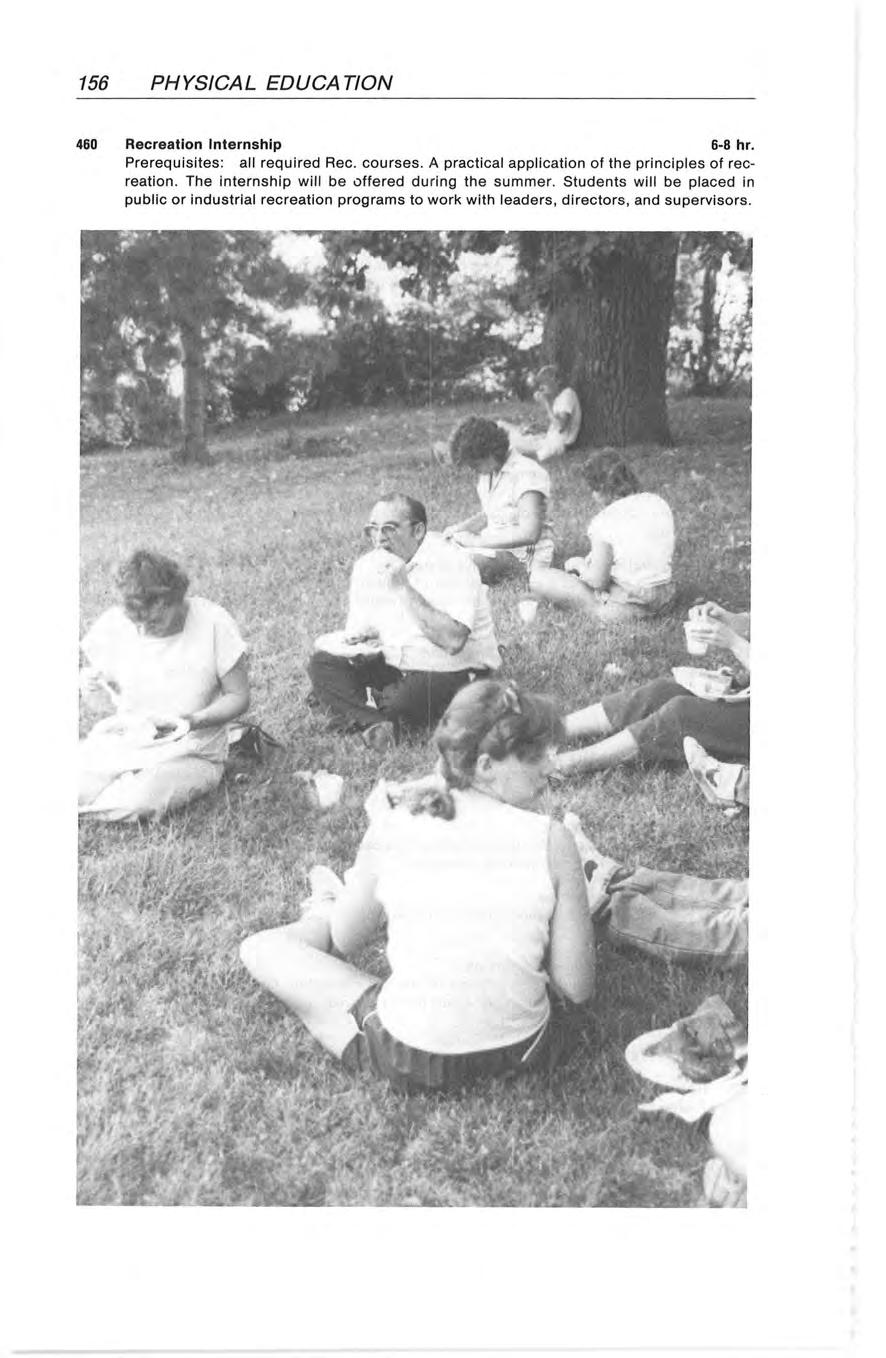
Boa rd of T ru stees o f th e Ne br as ka Sta t e Co ll eges
George Rebensdorf.
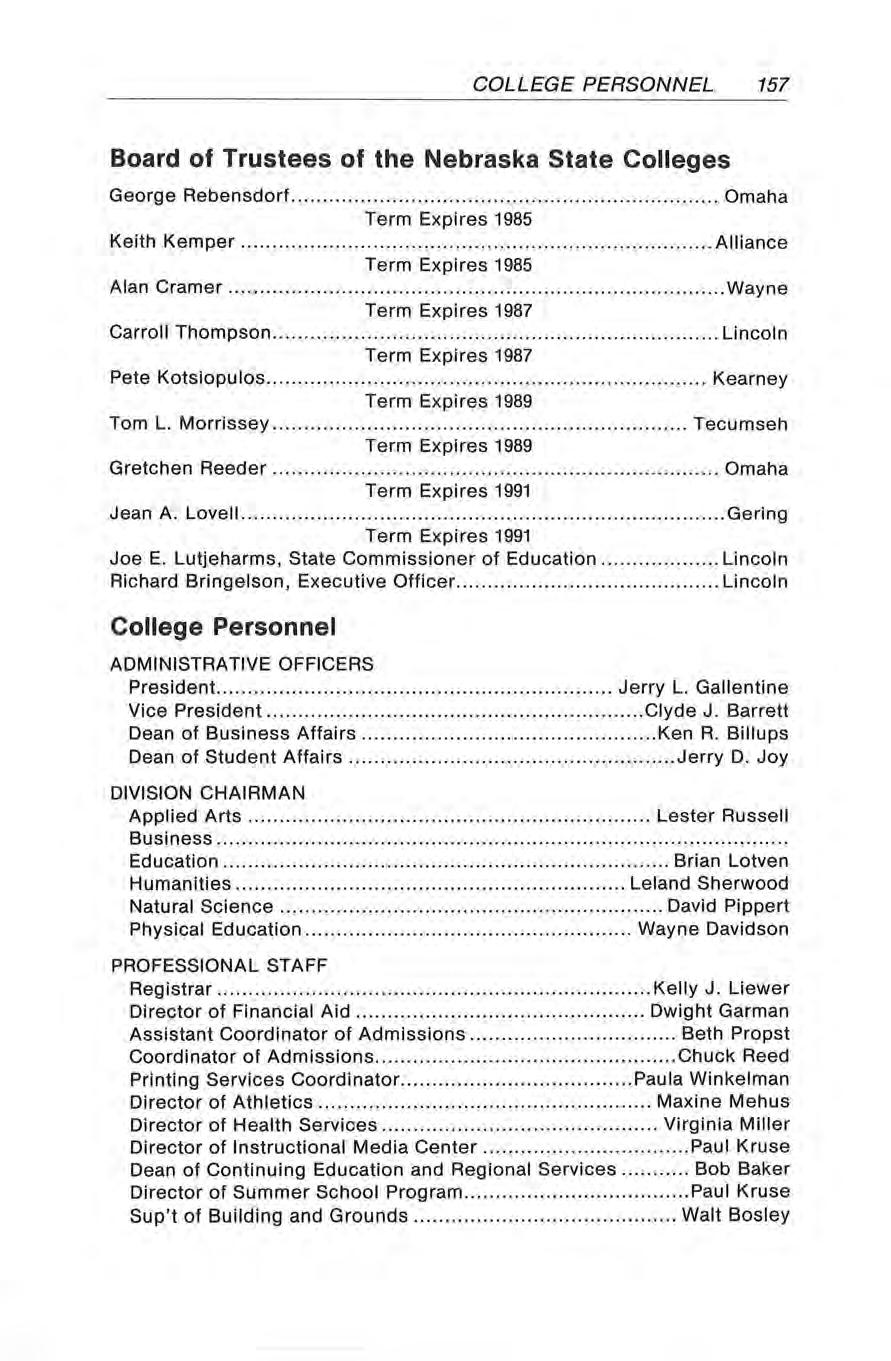
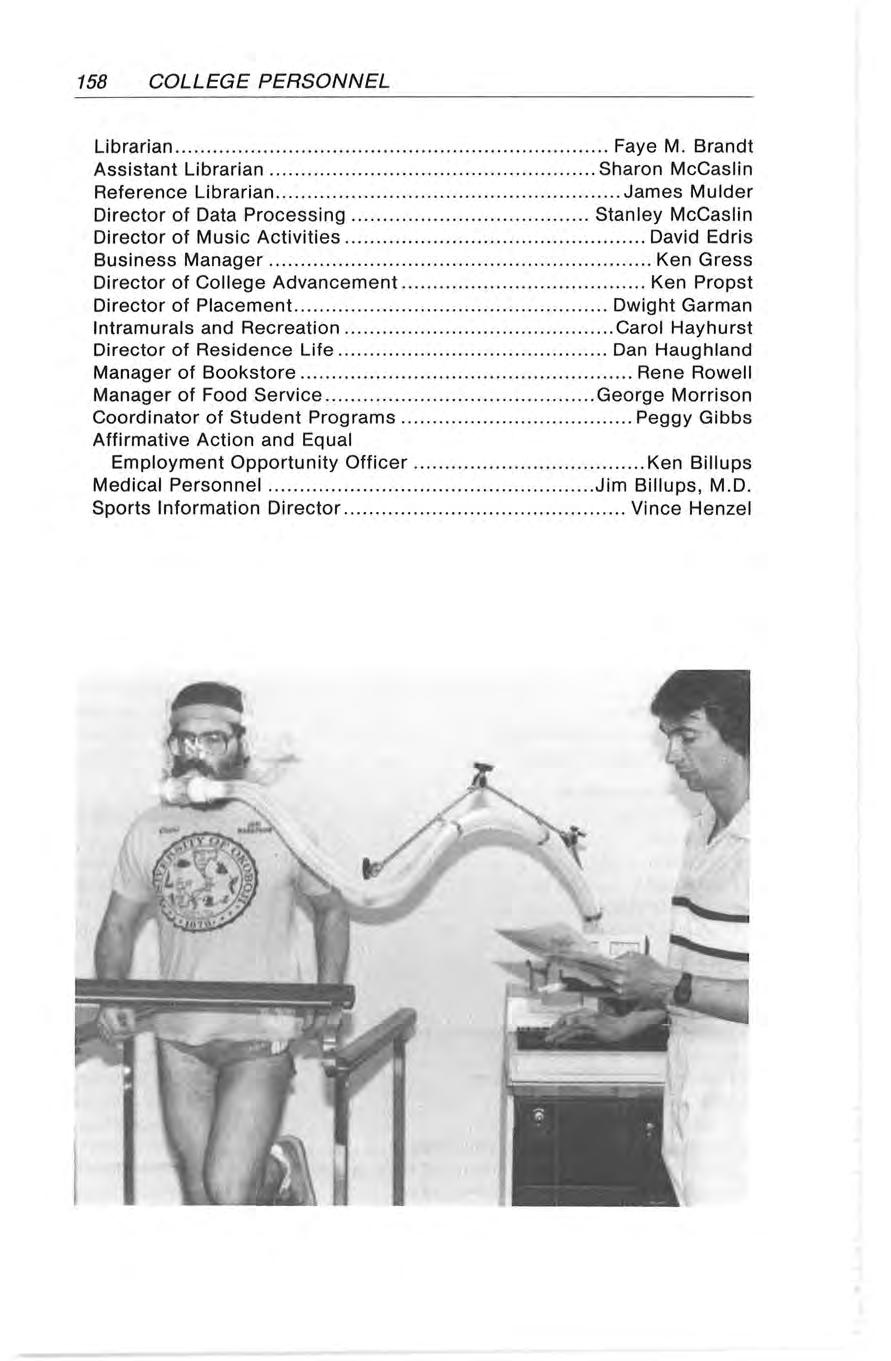
Librarian Faye M. Brandt
Assistant Librarian Sharon Mccaslin
Reference Librarian James Mulder
Director of Data Processing Stanley Mccaslin
Director of Music Activities
Business Manager
David Edris
Ken Gress
Director of College Advancement Ken Propst
Director of Placement. Dwight Garman
lntramurals and Recreation Carol Hayhurst
Director of Residence Life Dan Haugh land
Manager of Bookstore Rene Rowell
Manager of Food Service George Morrison
Coordinator of Student Programs Peggy Gibbs
Affirmative Action and Equal Employment Opportunity Officer Ken Billups
Medical Personnel
Sports Information Director
Jim Billups, M.D.
Vince Henzel
(Date indicates year in which service at Peru Began . )
Jay Adcox (1983)
M.S., Northwest Missouri State, Maryville, Instructor of Physical Education
Ken Anderson (1984)
B F.A. , University of Nebraska - Omaha,lnstructor of Art
Robert Baker (1982)
M Ed , University of Chattanooga , Director of Continuing Education
Clyde J. Barrett (1965)
Ed D. , University of Arkansas, Fayetteville, Vice President, Associate Professor of English
Russell C. Beldin (1970)
M S , Mankato State University, Minnesota, Assistant Professor of Business Education
Ken Billups (1983)
J D., Washburn Law School, Topeka, Title Ill Project Director / Acting Dean of Business Affairs
Walt Bosley (1983)
Superintendent of Buildings and Grounds
Faye M. Brandt (1960)
M A L.S , Denver University , Colorado , Librarian, Associate Professor of Library Science
Everett W. Browning (1969)
M S., Kansas State University, Manhattan , Assistant Professor of English and Journalism
Larry Caldwell (1983)
Ph.D., University of Nebraska, Lincoln, Assistant Professor of English
Moon Chang (1983)
Ed D , University of Tennessee, Knoxville , Assistant Professor of Education
Wayne Davidson (1982)
Ed D. , University of Missouri , Columbia , Associate Professor and Chairman of the Division of Physical Education.
Spencer Davis (1983)
Ph.D., University of Toronto , Ontario , Assistant Professor of History
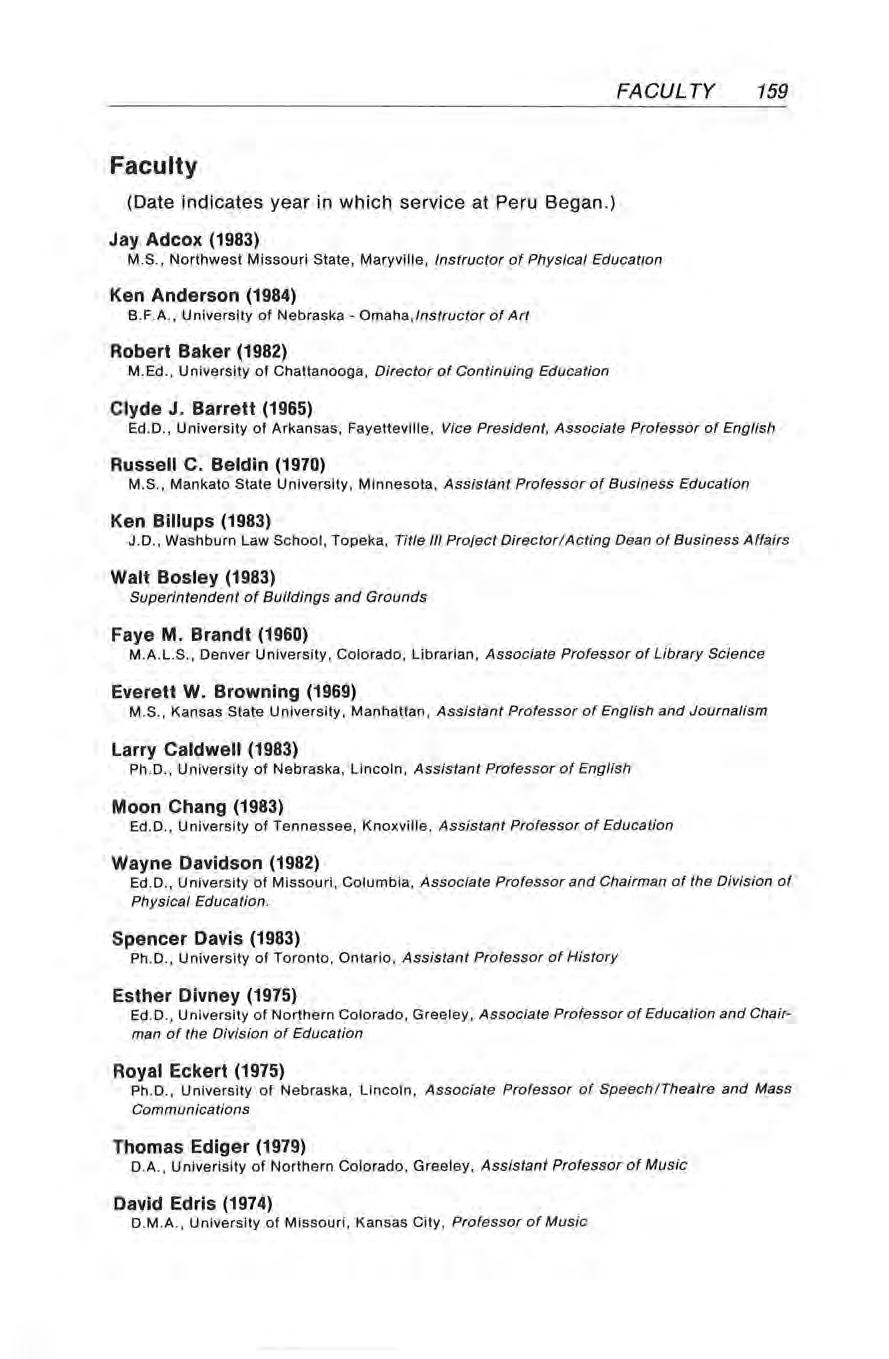
Esther Divney (1975)
Ed.D , University of Northern Colorado , Greel e y , Associate Professor of Education and Chairman of the Division of Education
Royal Eckert (1975)
Ph D., University of Nebraska , Lincoln, Associate Professor of Speech / Theatre and Mass Communications
Thomas Ediger (1979)
D A ., Univerisity of Northern Colorado , Greeley, Assistant Professor of Music
David Edris (1974)
D M A ., University of Missouri, Kansas City, Professor of Music
Paul Egan (1980)
Ph D., State University of New York at Buffalo , Assistant Profes so r of Psychology
Nancy Emerson (1977)
M.S. , Pittsburg State University , Kansas, Instructor of Social Work
David Evans (1982)
M M., Indiana University , Instructor of Music
Robley Evans (1978)
M.S., Indiana Univer sity, Bloomington , Assistant Profe ssor of Industrial Arts
Victor Ferre (1978)
Ed D., New Mexico State University , Las Cruces, Associate Professor of Education
Thomas J. Fitzgerald (1967)
Ed D. , University of Nebraska , Lincoln , Associate Professor of Physical Education
Donald Freed (1983)
M.M., University of Nebraska , Lincoln, Instructor of Music
Jerry L. Gallentine (1982)
Ph D., University of Toledo , President
Dwight Garman (1980)
M .A ., University of Nebraska , Lincoln, Director of Pla ceme nt
Peggy Gibbs (1982)
B.A., Baylor Un iversity , Coordinator of Student Programs
John Gibbs (1981)
M S ., Central Missouri State University , Instructor of Physical Edu catio n
Kenneth T. Gress (1969)
B.A., Peru State College , Nebraska, Business Manager
John Gray (1984)
M.S., Northwest Missouri State University,lnstructor of Industrial Arts
Kevin Gundy (1984)
B.S., Missouri Southern State College, Assistant Football Coach/Student Services Assistant
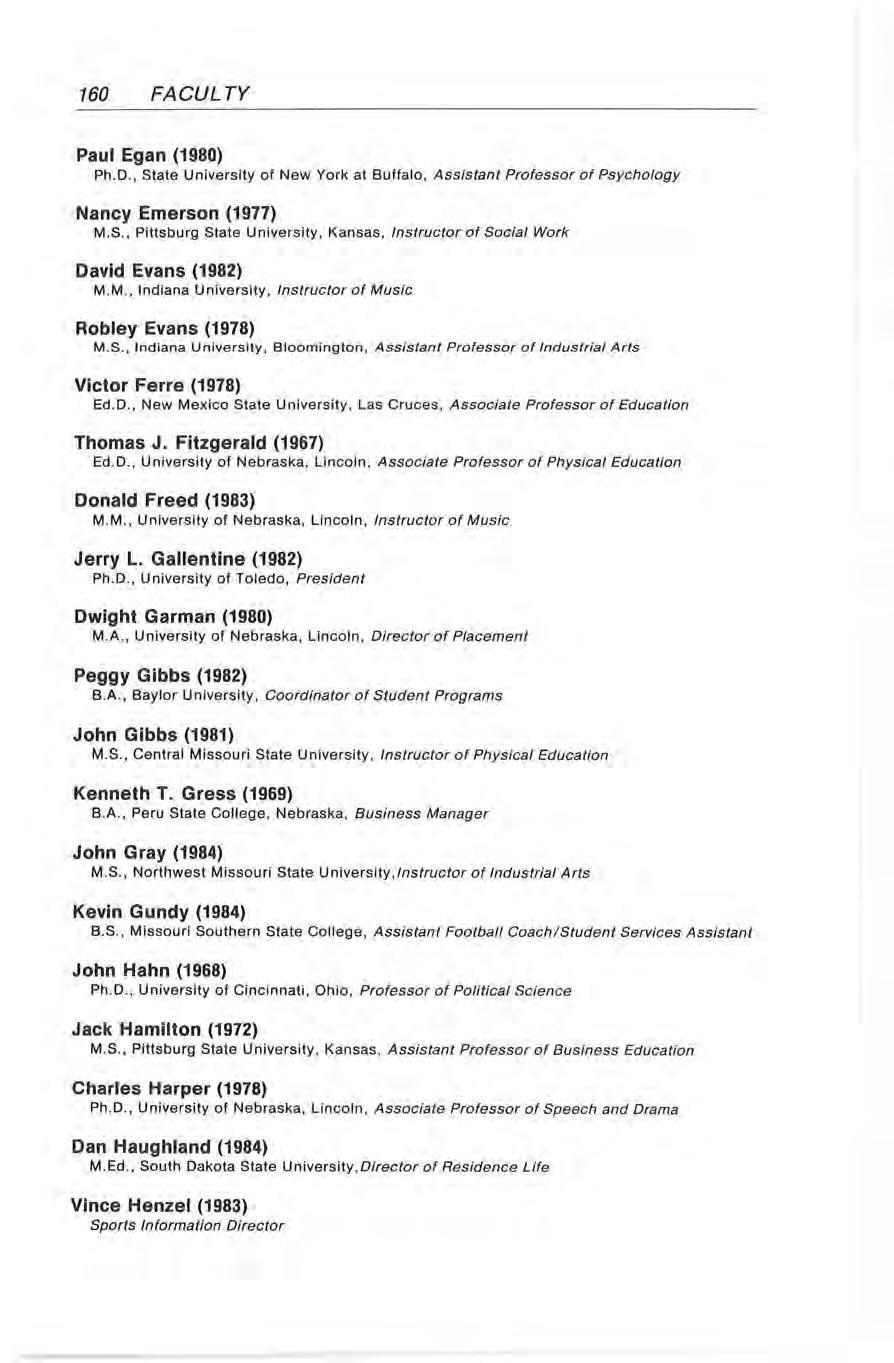
John Hahn (1968)
Ph D., University of Cincinnati, Ohio , Professor of Political Science
Jack Hamilton (1972)
M S ., Pittsburg State University, Kansas , Assistant Professor of Business Education
Charles Harper (1978)
Ph.D., University of Nebraska , Lincoln , Associate Professor of Speech and Dra ma
Dan Haughland (1984)
M.Ed., South Dakota State University Director of Residence Life
Vince Henzel (1983)
Sports Information Director
Wreathea Hicks (1968)
M.A., Emporia Kansas State University , Emporia, Assistant Professor of English
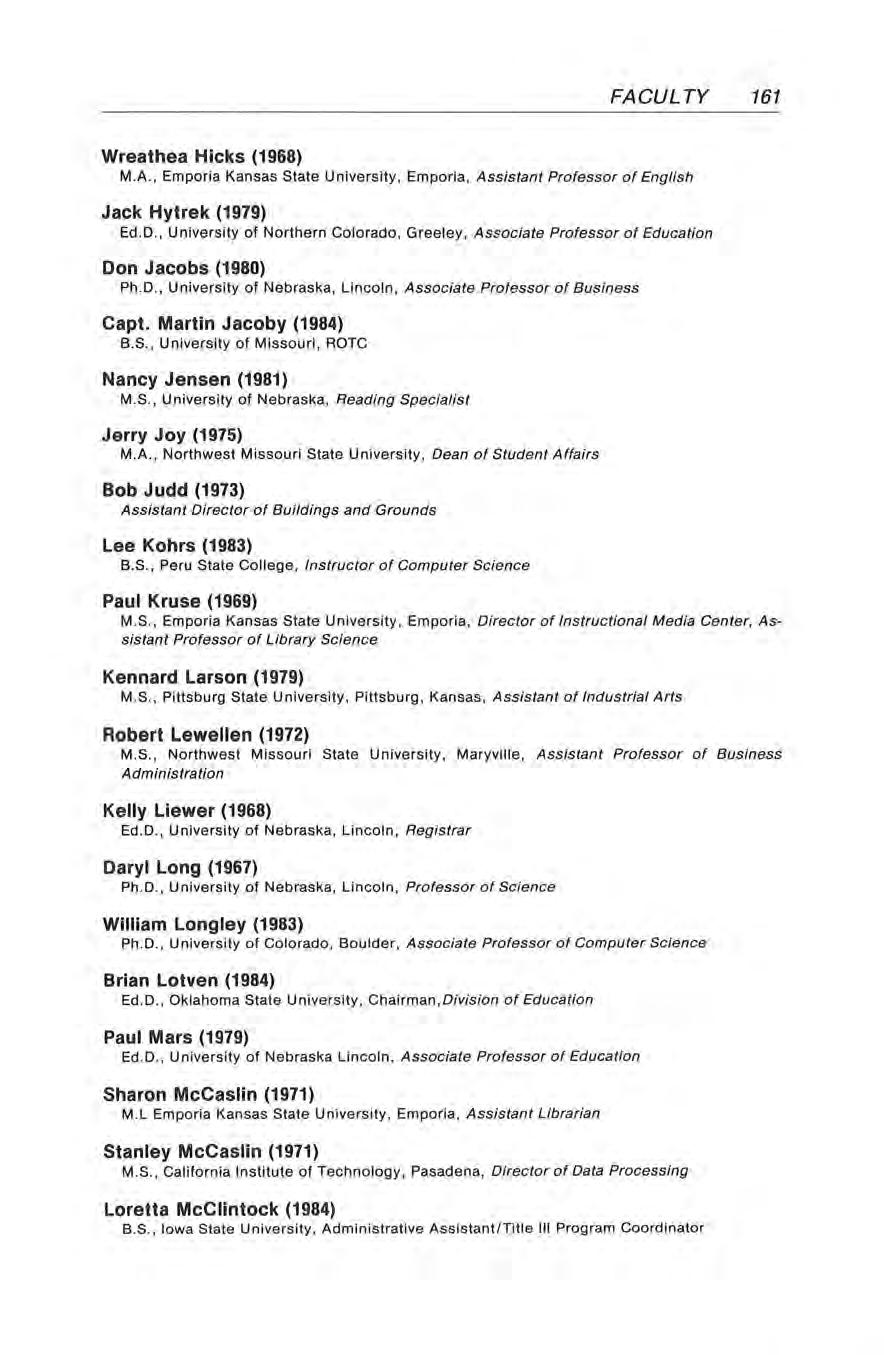
Jack Hytrek (1979)
Ed.D., University of Northern Colorado, Greeley, Associate Professor of Education
Don Jacobs (1980)
Ph.D., University of Nebraska, Lin co ln , Associate Professor of Business
Capt. Martin Jacoby (1984)
B.S., University of Missouri, ROTC
Nancy Jensen (1981)
M.S ., University of Nebraska , Reading Specialist
Jerry Joy (1975)
M.A. , Northwest Missouri State University , Dean of Student Affairs
Bob Judd (1973) Assistant Director of Buildings and Grounds
Lee Kohrs (1983)
B .S., Peru State College, Instructor of Computer Science
Paul Kruse (1969)
M.S., Emporia Kansas State University , Emporia, Director of Instructional Media Center, Assistant Professor of Library Science
Kennard Larson (1979)
M.S. , Pittsburg State University, Pittsburg, Kansas, Assistant of Industrial Arts
Robert Lewellen (1972)
M .S. , Northwest Missouri State University, Maryville, Assistant Professor of Business Administration
Kelly Liewer (1968)
Ed D., University of Nebraska, Lincoln, Registrar
Daryl Long (1967)
Ph D ., University of Nebraska, Lincoln , Professor of Science
William Longley (1983)
Ph.D., Univer sity of Colorado, Boulder, Associate Professor of Computer Science
Brian Lotven (1984)
Ed D., Oklahoma State University, Chairman.Division of Education
Paul Mars (1979)
Ed.D., Univer sity of Nebraska Lincoln , Associate Professor of Education
Sharon Mccaslin (1971)
M.L Emporia Kansas State Univer s it y, Emporia, Assistant Librarian
Stanley Mccaslin (1971)
M.S. , California Institut e of Technology, Pasadena, Director of Data Processing
Loretta McClintock (1984)
B.S., Iowa State Univ ers ity , Administrative Assistant/Title Ill Progr am Coordinator
Lyle C. McKercher (1959)
M S., University of Iowa, Iowa City, Associate Professor of Mathematics
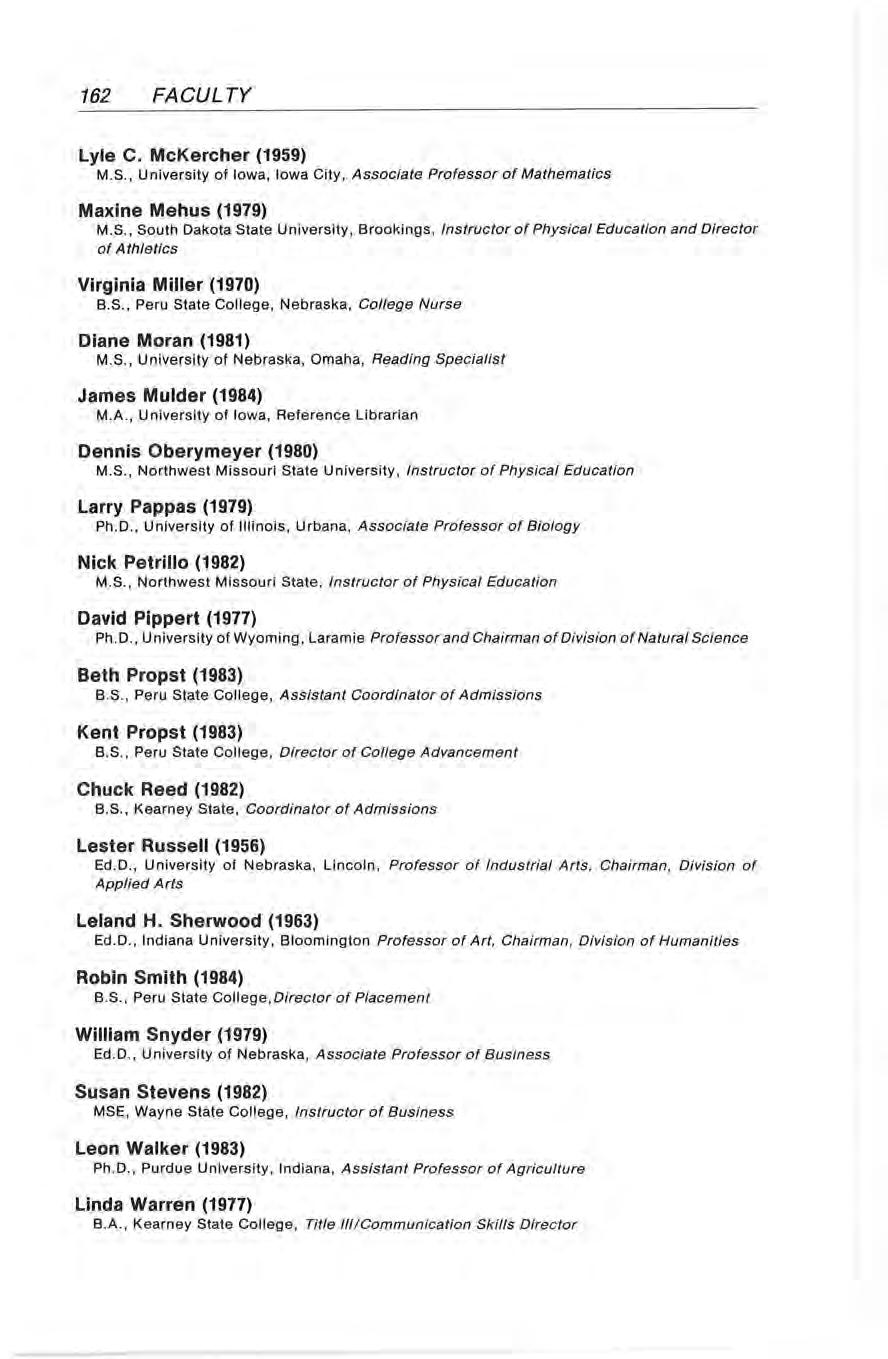
Maxine Mehus (1979)
M.S. , South Dakota State University , Brookings , Instructor of Physical Education and Director of Athletics
Virginia Miller (1970)
B . S., Peru State College , Nebraska , College Nurse
Diane Moran (1981)
M S. , University of Nebraska , Omaha, Reading Specialist
James Mulder (1984)
M A. , University of Iowa , Reference Librarian
Dennis Oberymeyer (1980)
M S , Northwest Missouri State University, Instructor of Physical Education
Larry Pappas (1979)
Ph D., University of Illinois , Urbana, Associate Professor of Biology
Nick Petrillo (1982)
M S., Northwest Missouri State , Instructor of Physical Education
David Pippert (1977)
Ph.D ., University of Wyoming, Laramie Professor and Chairman of Division of Natural Science
Beth Propst (1983)
B.S., Peru State College , Assistant Coordinator of Admissions
Kent Propst (1983)
B S. , Peru State College , Director of College Advancement
Chuck Reed (1982)
B S., Kearney State, Coordinator of Admissions
Lester Russell (1956)
Ed.D., University of Nebraska , Lincoln , Profe ssor of Industrial Arts , Chairman, Division of Applied Arts
Leland H. Sherwood (1963)
Ed.D., Indiana University , Bloomington Professor of Art, Chairman, Division of Humanities
Robin Smith (1984)
B S , Peru State College,Director of Placement
William Snyder (1979)
Ed.D. , University of Nebraska, Associate Professor of Business
Susan Stevens (1982)
MSE, Wayne State College, Instructor of Business
Leon Walker (1983)
Ph.D., Purdue University , Indiana , Assistant Professor of Agriculture
Linda Warren (1977)
B A ., Kearney State Col l ege, Title Ill / Communic ation Skills Direc tor
Scott J. Williams (1966)
M.A., Arizona State University, Tempe, Assistant Professor of Geography
Paula Winkelman (1984)
S . S. , Peru State College, Printing Services Coordinator
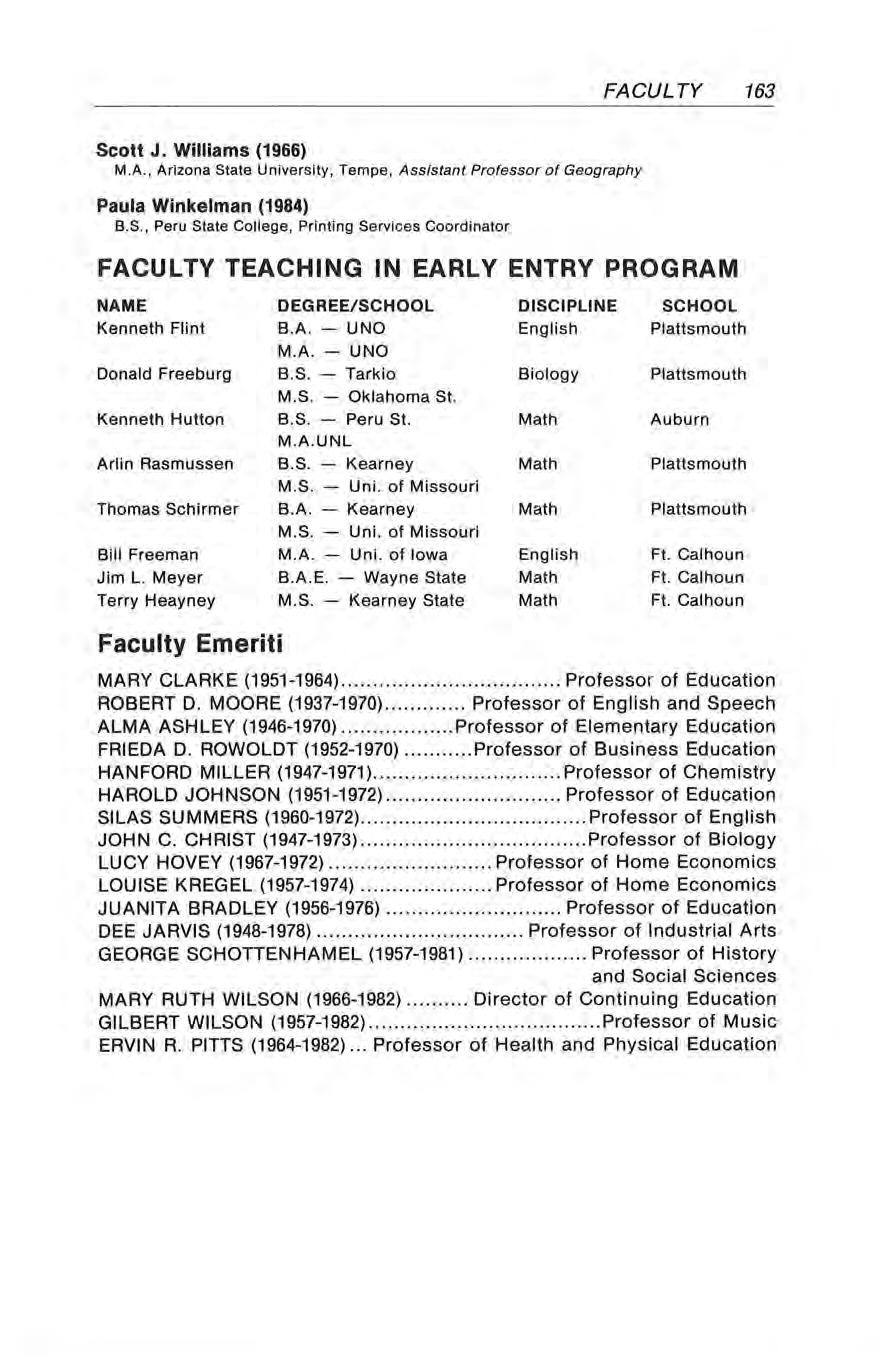
NAME DEGREE/SCHOOL DISCIPLINE SCHOOL
Kenneth Flint
B.A. - UNO English Plattsmouth
M . A . - UNO
Donald Freeburg B.S. - Tarkio Biology Plattsmouth
M.S - Oklahoma St.
Kenneth Hutton B S. - Peru St. Math Auburn
M.A.UNL
Arlin Rasmussen B S - Kearney Math Plattsmouth
M.S . - Uni. of Missouri
Thomas Schirmer B.A. - Kearney Math Plattsmouth
M.S. - Uni. of Missouri
Bill Freeman M A - Uni. of Iowa English Ft. Calhoun
Jim L. Meyer B.A E - Wayne State Math Ft. Calhoun
Terry Heayney M.S - Kearney State Math Ft. Calhoun
MARY CLARKE (1951-1964)
ROBERT D. MOORE (1937-1970)
ALMA ASHLEY (1946-1970)
Professor of Education
Professor of English and Speech
Professor of Elementary Education
FRIEDA D. ROWOLDT (1952-1970) Professor of Business Education
HANFORD MILLER (1947 -1971 ) .. ............ .... .......... .. Professor of Chemistry
HAROLD JOHNSON (1951 -1972) Professor of Education
SILAS SUMMERS (1960-1972) Professor of English
JOHN C. CHRIST (1947-1973) .. . .. .. .... . .... . .. . ....... ... . . . . .. Professor of Biology
LUCY HOVEY (1967-1972) .. ... . ........ . .... ... .... Professor of Home Economics
LOUISE KREGEL (1957-1974) ... . .. . .......... . ... Professor of Home Economics
JUANITA BRADLEY (1956-1976) ........ .... .... .. .... ...... Professor of Education
DEE JARVIS (1948-1978) Professor of Industrial Arts
GEORGE SCHOTTENHAMEL (1957- 1981) Professor of History and Social Sciences
MARY RUTH WILSON (1966-1982) Director of Continuing Education
GILBERT WILSON (1957-1982) Professor of Music
ERVIN R. PITTS (1964-1982) ... Professor of Health and Physical Education
The council is the representative of the professional staff of the College and is concerned with the general welfare of the professional staff and the students. It establishes and revises all policies related to the internal affairs of the college.
The Commission carries on a continuous study of the instructional program and recommends policy to the College Affairs Council. It is concerned with inter-school and interdepartmental coordination and relationships . The various instructional programs are evaluated in terms of accrediting standards and guidelines of national academic association. It evaluates the work and responsibility of its various committees
The Committee works on a continuing basis for the enhancement of the public image of Peru State College. All public relations related matters are a concern of this Committee .
The Committee reports regularly to the Academic Affairs Commission and recommends policy to the Commission. It serves in a liaision capacity between the Library and the faculty-student bodies. It advises in regard to the administration of the policies and regulations related to the Library , and makes suggestions regarding the services, the budget, purchases, allocation of funds, accreditation standards, and over- all needs.
The Teacher Education Committee explores and identifies areas needing policy statements . Since the responsibility of the Committee is chiefly in academic affairs, the Commission on Academic Affairs is advised on all recommendations that will be made to the College Affairs Council. It formulates these policies and recommends them to the College Affairs Council. The Committee is authorized to delegate some of its responsibilities , such as Admission to Teacher Education, to a subcommittee
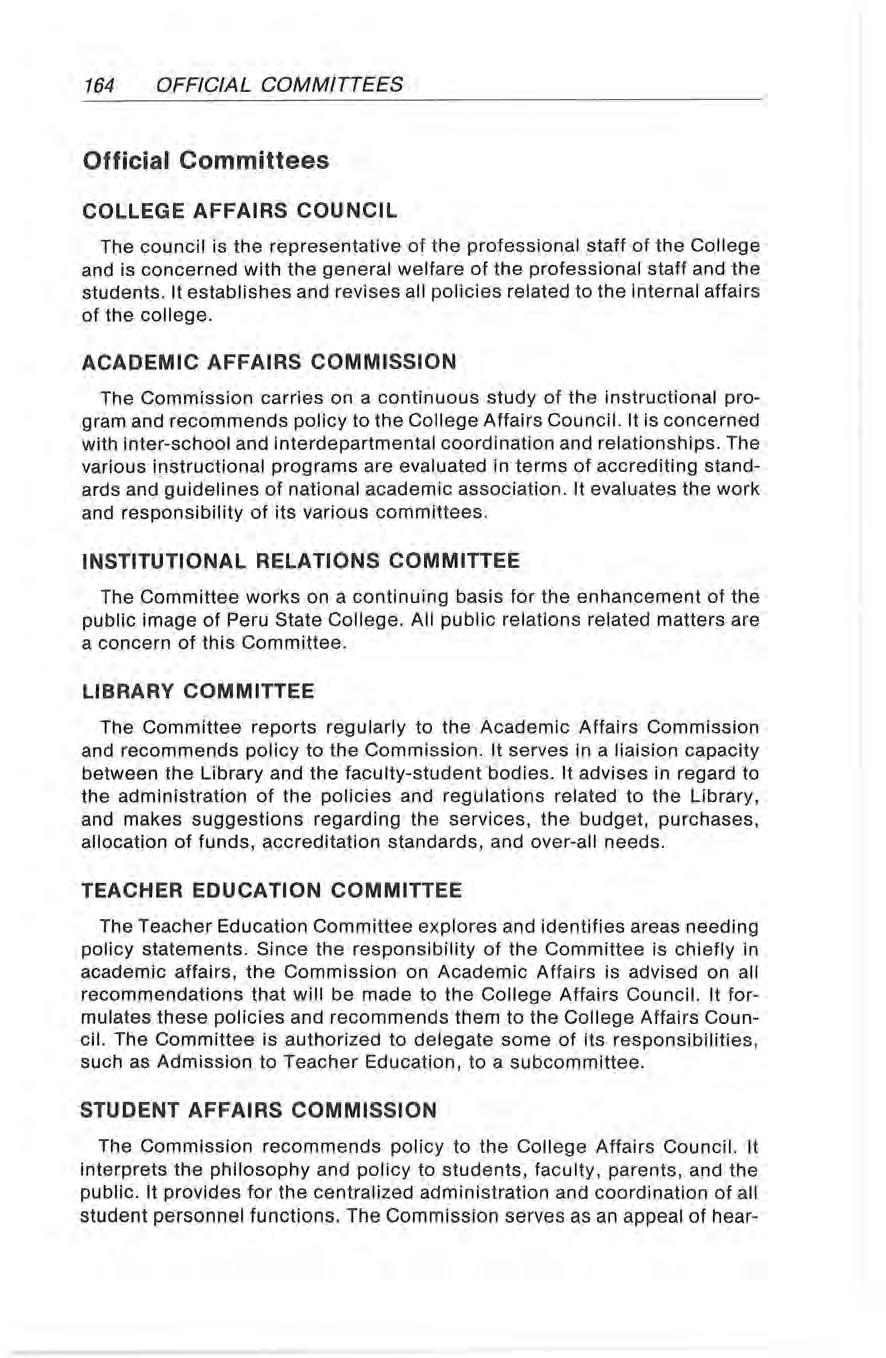
The Commission recommends policy to the College Affairs Council. It interprets the philosophy and policy to students, faculty, parents, and the public It provides for the centralized administration and coordination of all student personnel functions. The Commission serves as an appeal of hear-
ing body on decisions related to non-academic matters of the student. The Commission shall advise the Director of Financial Aid, as he requests , in the administration of Financial Aids and awards scholarships which are available .
The membership of the committee representing the Faculty Association consists of the Executive Committee of the Association The Chairman of the Executive Council is the chairman of this committee. The Committee concerns itself with both academic and personnel matters of the faculty and reports to either the Academic Affairs Commission or the College Affairs Council. The Faculty Association has the responsibility of assisting with the orientation of new faculty members, and assisting in the evaluation of objectives , policies, and with the professional growth and development of faculty members
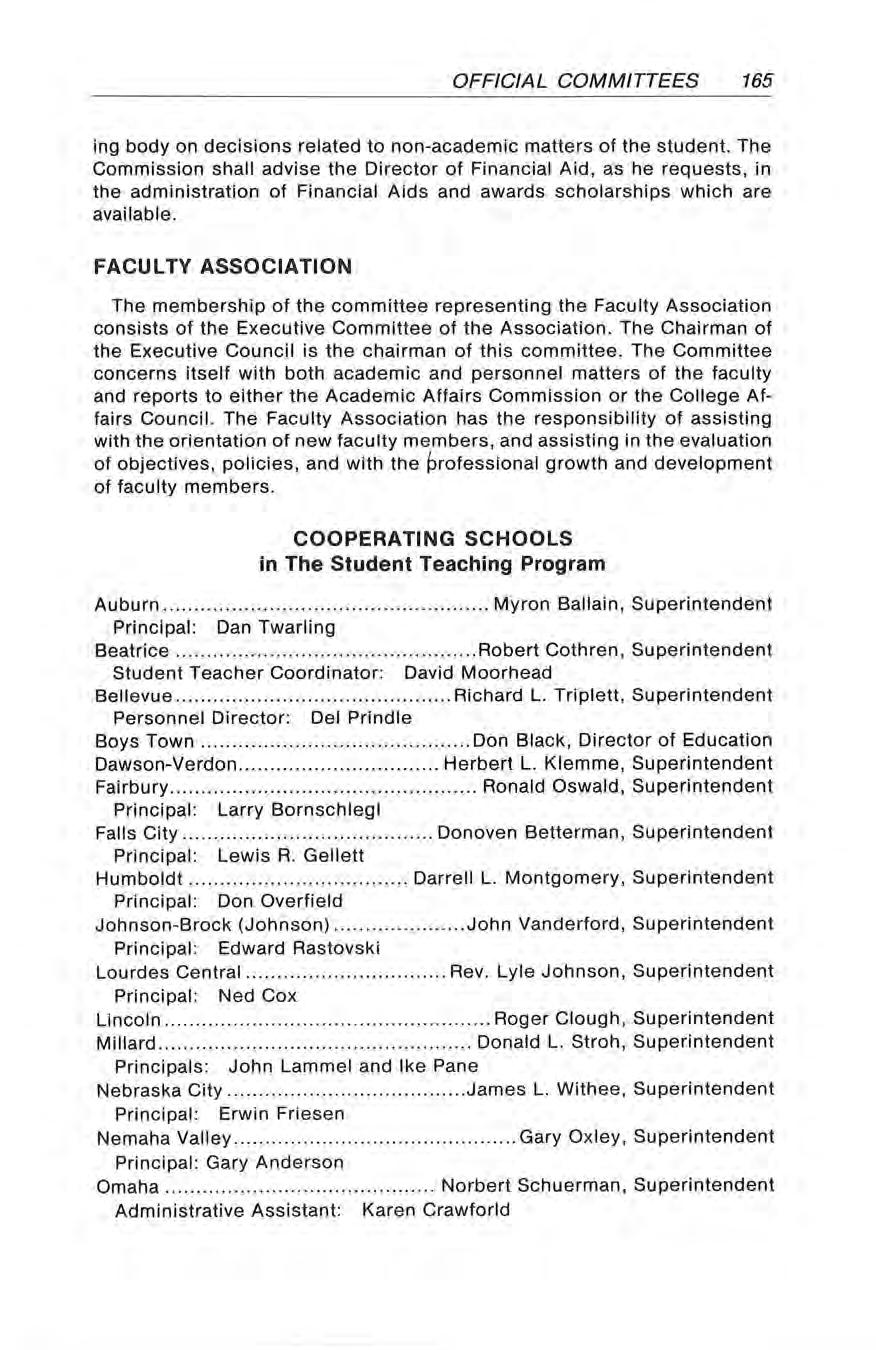
Auburn Myron Ballain, Superintendent
Principal : Dan Twarling
Beatrice Robert Cothren, Superintendent
Student Teacher Coordinator : David Moorhead
Bellevue
Personnel Director : Del Prindle
. Richard L. Triplett, Superintendent
Boys Town Don Black, Director of Education
Dawson-Verdon Herbert L. Klemme , Superintendent
Fairbury Ronald Oswald, Superintendent
Principal : Larry Bornschlegl
Falls City
Principal : Lewis R . Gellett
Donoven Betterman, Superintendent
Humboldt Darrell L. Montgomery , Superintendent
Principal: Don Overfield
Johnson-Brock (Johnson)
Principal : Edward Rastovski
John Vanderford, Superintendent
Lourdes Central . .... . .. . . .. . . . . ... . . . .. .. . . .. . . Rev . Lyle Johnson , Superintendent
Principal : Ned Cox
Lincoln Roger Clough, Superintendent
Millard . .. . .. ..... ... . . . ... . . . . . . .. . ...
... . . .. ... . .... . Donald L . Stroh, Superintendent
Principals : John Lammel and Ike Pane
Nebraska City James L. Withee , Superintendent
Principal : Erwin Friesen
Nemaha Valley Gary Oxley, Superintendent
Principal : Gary Anderson
Omaha Norbert Schuerman, Superintendent
Administrative Assistant: Karen Crawforld
Papillion . ... . . . . . . . .. .. . . .. .... ... ... . ......... . .. ... . . .. Paul D . Basler , Superintendent
Principal: Dennis Smith
Pawnee City
Principal : Gene Neddenriep
Larry Harnish, Superintendent
Plattsmouth .. ... . . .. . . .. . .. .. ... .... ..... . ..... ... . . .. . .. Jack Herweg , Superintendent
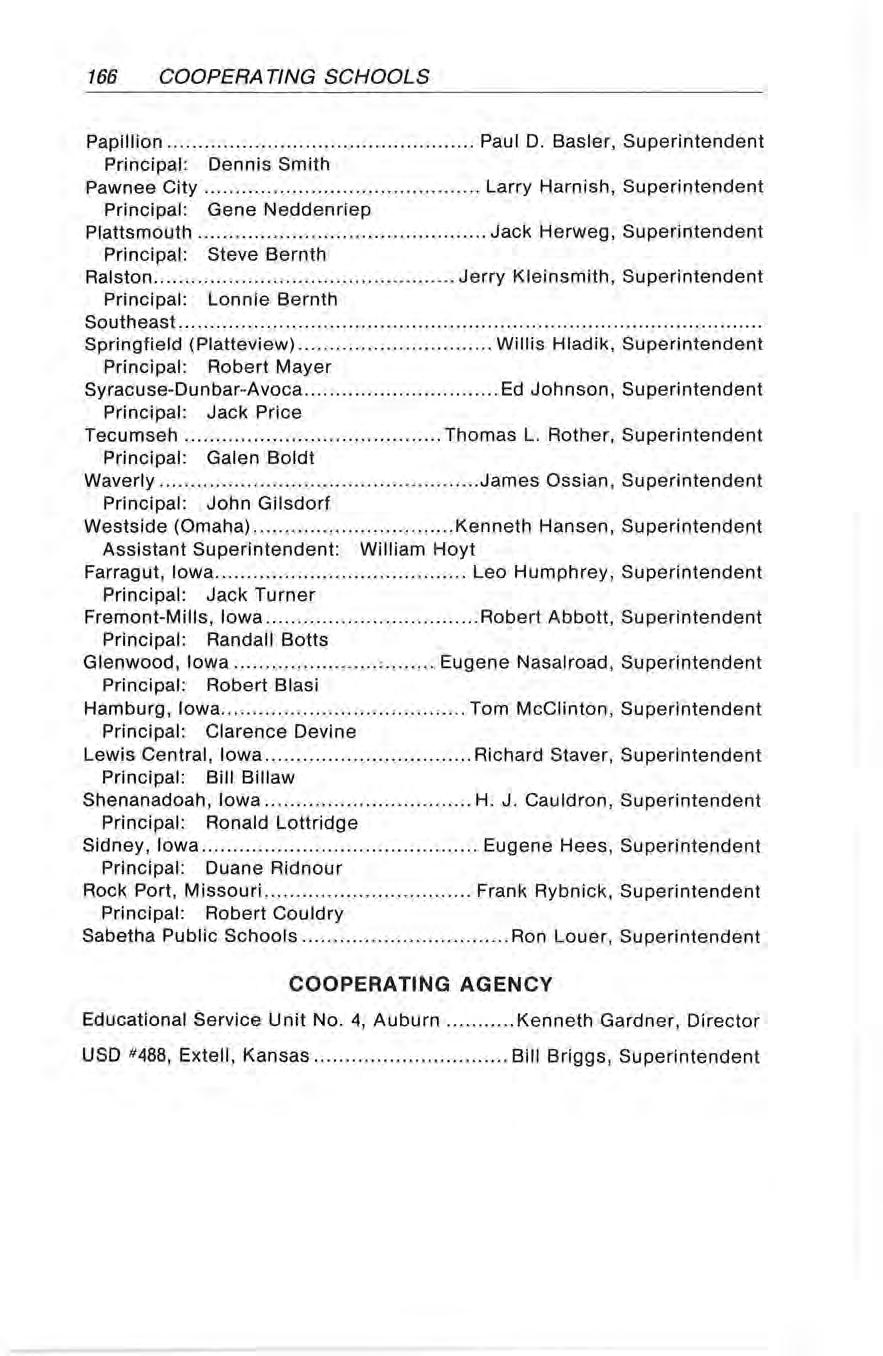
Principal: Steve Bernth
Ralston Jerry Kleinsmith, Superintendent
Principal: Lonnie Bernth
Southeast
Springfield (Platteview) ..... . . ..... . . .. . ... . .. ..... . . . Willis Hladik , Superintendent
Principal: Robert Mayer
Syracuse-Dunbar-Avoca
Principal: Jack Price
Ed Johnson, Superintendent
Tecumseh .. . ... .. . . .. . .... .. ..... ... , . ..... . .... . . Thomas L. Rother, Superintendent
Principal: Galen Boldt
Waverly
Principal : John Gilsdorf
Westside (Omaha)
James Ossian , Superintendent
Kenneth Hansen , Superintendent
Assistant Superintendent: William Hoyt
Farragut , Iowa
Principal: Jack Turner
Fremont - Mills , Iowa
Principal: Randall Botts
Glenwood, Iowa ....... . .. . .. .. .. .. . . .. , .. . .. . ..
Principal: Robert Blasi
Hamburg, Iowa
Principal: Clarence Devine
Lewis Central , Iowa
Principal: Bill Billaw
Leo Humphrey, Superintendent
Robert Abbott, Superintendent
Eugene Nasalroad, Superintendent
Tom McClinton , Superintendent
Richard Staver , Superintendent
Shenanadoah , Iowa .......... ....... . . . ..... . .......
Principal : Ronald Lottridge
H . J . Cauldron, Superintendent
Sidney, Iowa ... ...... ........... . .. . .... . . .. ... .. ... ... . Eugene Hees, Superintendent
Principal: Duane Ridnour
Rock Port, Missouri
Principal: Robert Couldry
Frank Rybnick, Superintendent
Sabetha Public Schools ... .. .. ..... . . . . ..... . . . ......... Ron Louer , Superintendent
Educational Service Unit No 4, Auburn
Kenneth Gardner, Director
USO #488, Extell, Kansas .... . . .. .. . .. . ... . . ... . ...... .. Bill Briggs, Superintendent
Freshman Welcome and Orientation Faculty Meeting
Registration (Late Registration after this date)Orientation
Tuition and Fee Payment Classes begin
Labor Day (no classes)
Final Date for adding full semester course(s)
Applications due for mid-year Certification of Completion
Homecoming
End of First Half of Semester
NSEA Convention (no classes)
Pre-registration for Spring Semester 1986
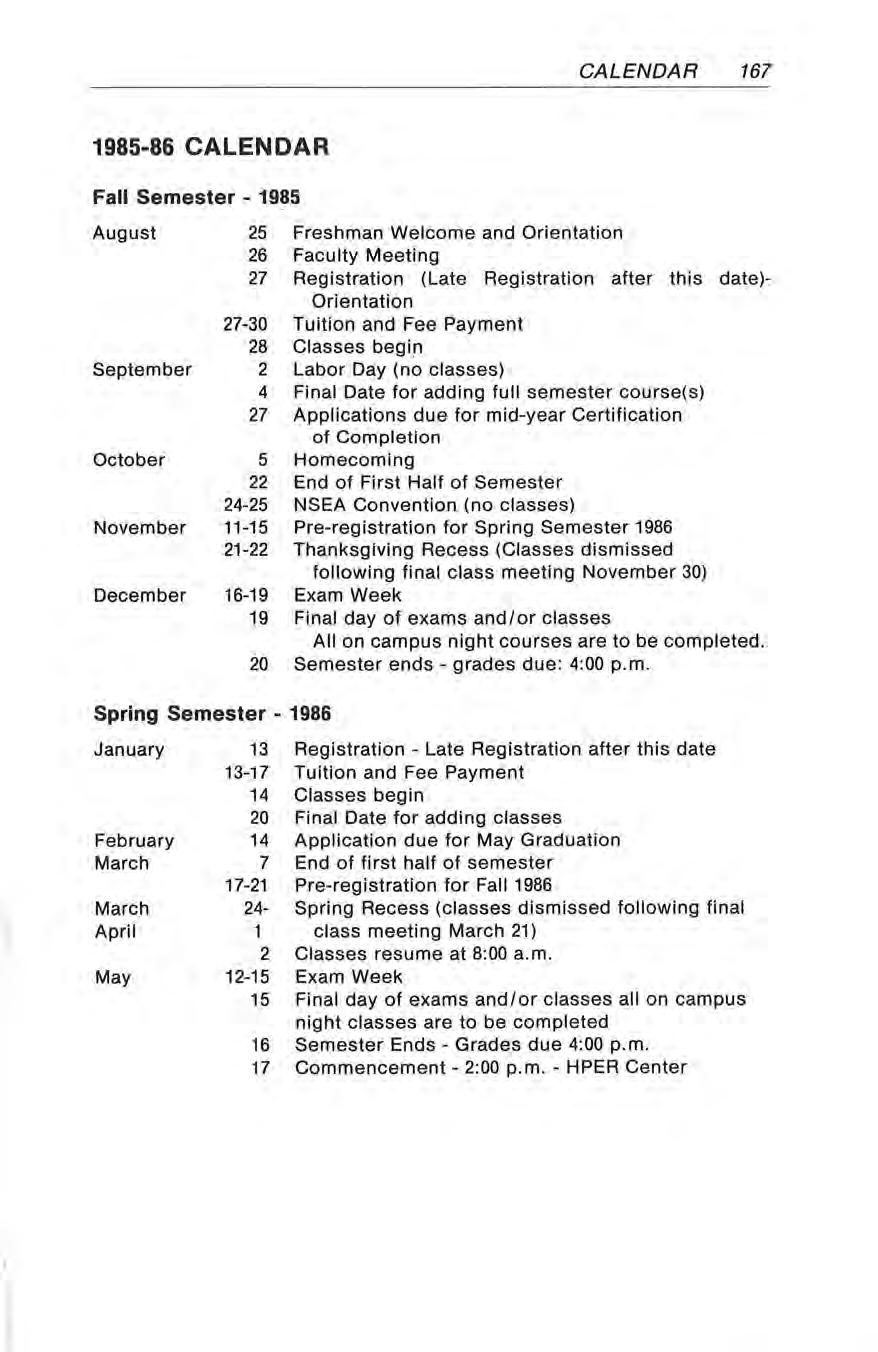
Thanksgiving Recess (Classes dismissed following final class meeting November 30)
Exam Week
Final day of exams and/or classes
All on campus night courses are to be completed. Semester ends - grades due: 4:00 p.m.
Spring Semester - 1986
January
13 Registration - Late Registration after this date 13-17
Tuition and Fee Payment Classes begin
Final Date for adding classes
Application due for May Graduation
End of first half of semester
Pre-registration for Fall 1986
Spring Recess (classes dismissed following final class meeting March 21)
Classes resume at 8:00 a m.
Exam Week
Final day of exams and/or classes all on campus night classes are to be completed
Semester Ends - Grades due 4: 00 p.m .
Commencement - 2: 00 p.m . - HPER Center
